vendredi, 20 mai 2022
Empire et praxis
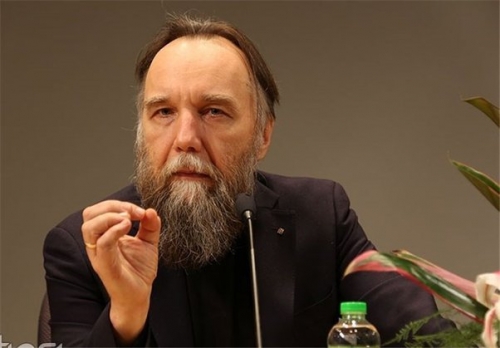
Empire et praxis
par Aleksandr Dugin
Source: https://www.ideeazione.com/impero-e-prassi/
Quels sont les facteurs décisifs pour la restauration d'un véritable Empire en Russie ?
Cette question a été posée très sérieusement par le Père Vladimir Tsvetkov, prieur de l'Ermitage de Sofronie près d'Arzamas (ci-dessous), dans une formulation très profonde : pour quoi devons-nous prier ? En fait, la même question a été posée à Konstantin Malofeev lors de la présentation de son livre Empire : Où est l'Empire aujourd'hui ?
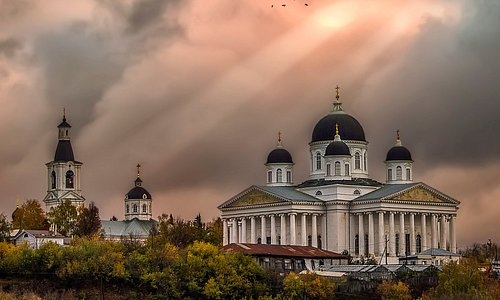
Je viens d'achever un nouveau livre, Genèse et Empire, une sorte d'"Encyclopédie de l'idée impériale", dans lequel j'expose le thème de l'ontologie impériale, de la figure archétypale du Roi de la Paix, des diverses formes de monarchie sacrée, en passant par une vue d'ensemble des empires historiques - y compris la mission de Katechon et la dialectique de la Russie impériale - et les simulacres d'"Empire", tels que l'Empire britannique et l'"Empire" américain moderne.
Il s'agit de thèmes et de théories profonds et fondamentaux, dont on ne peut toutefois pas tirer directement de conclusions pratiques. C'est pourquoi j'ai décidé de traiter la question du Père Vladimir de manière systématique et j'ai proposé une série de thèses. Il s'agit d'une ébauche, je serais reconnaissant pour tous ajouts et commentaires.
- L'empire peut être restauré en Russie à la suite d'un miracle divin. Tout empire a une origine surnaturelle. Si ce n'est pas un miracle de Dieu, alors c'est un "miracle noir" du diable. Les êtres humains ne sont pas capables de créer un empire. C'est toujours quelque chose de sacré. S'il n'y a pas de miracle, il n'y a pas d'empire, mais notre foi est dans le Dieu vivant, dans le Dieu qui fait des merveilles.
- L'Empire vit dans l'Église. L'enseignement religieux et eschatologique sur l'empire et la monarchie orthodoxe, ainsi que sur le rôle du tsar russe en tant que Katechon, a été développé en détail dans l'Église orthodoxe russe hors de Russie. La glorification des martyrs royaux et de tous les nouveaux martyrs de Russie fait partie de cet enseignement. Après la réunion du Patriarcat de Moscou et de l'Eglise orthodoxe russe hors de Russie dans les années 1990, cet enseignement a été généralement accepté par l'Eglise orthodoxe russe dans son ensemble, et aucune autre doctrine normative de la théologie politique de l'orthodoxie n'a été créée dans l'EOR elle-même pendant la période soviétique (et elle ne pouvait l'être après l'échec des rénovateurs). Par conséquent, la monarchie orthodoxe est le seul modèle normatif du christianisme orthodoxe russe. Les "libéraux d'église" bruyants et insistants ne comptent pas, ils ne sont que des "agents étrangers".
- L'empire (comme la monarchie) est une institution. La restauration de l'Empire peut se faire par une réforme politique à grande échelle, en révisant le cadre juridique russe dans l'esprit de l'autocratie. Le travail politico-philosophique et juridique est important ici.
- L'empire peut être fondé par une dynastie. Bien qu'aucune ligne de succession strictement directe du dernier empereur russe n'ait survécu, il y a les Romanov et, au 18e siècle, le trône russe a été occupé par des parents plus éloignés. C'est ici que la ligne Kirillovich, quelle que soit la façon dont elle est traitée en Russie aujourd'hui, a la plus solide base.
- Un empire peut être créé par de véritables succès militaires et l'expansion d'une zone de contrôle. Le pouvoir interne devient alors évident. L'agrégation même des terres russes - avec sa dépendance à la fois de la puissance militaire et de l'économie, de la diplomatie et de la culture - renforce le potentiel impérial.
- L'empire peut vivre selon la volonté du peuple. Dans ce cas, l'empire n'est pas établi du haut vers le bas, mais est exigé par le peuple, depuis la base vers le haut. C'est le scénario Zemsky. Le Zemsky sobor prend la décision historique que l'empire est et restaure la monarchie. Le culte moderne de Staline, répandu dans le peuple, d'un point de vue sociologique, n'est rien d'autre qu'une forme de "monarchisme par le bas", une demande de tsars.
- Un empire peut être déclaré par un dirigeant fort. Dans l'histoire romaine, le passage de la République à l'Empire s'est fait par la dictature de Jules César. Le nom "César" est ensuite devenu synonyme d'empereur, de roi. Bien qu'Auguste soit devenu empereur de plein droit, en réalité Jules César l'était déjà.
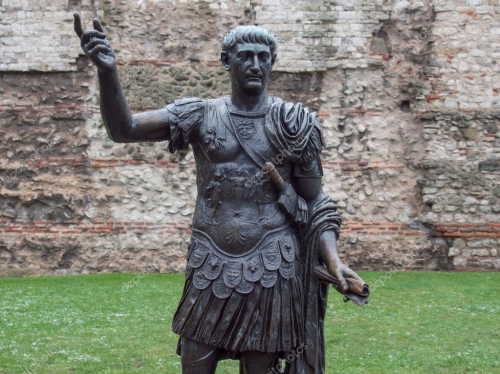
Il est difficile de dire à l'avance quel est le point principal. Actuellement, toutes ces conditions préalables sont présentes sous une forme ou une autre, mais aucune d'entre elles n'est encore clairement dominante. On peut supposer une combinaison de plusieurs points ou la sélection de certains au détriment d'autres ; on ne peut même pas exclure leur complète synergie. Si l'Empire est notre objectif (et s'il ne l'est pas, nous sommes perdus), nous savons maintenant ce pour quoi nous devons prier, ce pour quoi nous devons nous battre et ce que nous devons faire.
Le plus important est de ne jamais perdre de vue l'essentiel : l'Empire est un phénomène d'ordre spirituel, ce qui signifie que sans la volonté divine et sa providence, il ne sera qu'un simulacre. La chose principale dans l'Empire est un miracle. Ce n'est donc qu'au nom d'un miracle, dans l'attente d'un miracle, qu'il est possible de vivre. Sans lui, tout cela n'a pas de sens. Le miracle est le sens de notre vie. Un miracle impérial.
19 mai 2022
15:59 Publié dans Définitions, Nouvelle Droite | Lien permanent | Commentaires (0) | Tags : empire, définition, alexandre douguine, nouvelle droite, nouvelle droite russe, russie, impérialité |  |
|  del.icio.us |
del.icio.us |  |
|  Digg |
Digg | ![]() Facebook
Facebook
mercredi, 04 mai 2022
Le Nouvel Ordre Mondial dans le contexte des théories des relations internationales
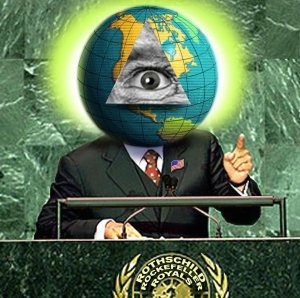
Le Nouvel Ordre Mondial dans le contexte des théories des relations internationales
Alexandre Douguine
Source: https://www.geopolitika.ru/en/article/nwo-context-international-relations-theories
Nous devons comprendre ce qui se passe pour nous et autour de nous. Pour ce faire, le bon sens ne suffit pas, il faut des méthodologies. Considérons donc l'OMS (Opération militaire spéciale) dans le contexte d'une discipline comme les relations internationales (RI).
Il existe deux grandes écoles de pensée en relations internationales: le réalisme et le libéralisme. Nous allons discuter de celles-ci, bien qu'il en existe d'autres, mais ces deux-là sont les principales. Si vous n'êtes pas familier avec ces théories, n'essayez pas de deviner ce que l'on entend ici par "réalisme" et "libéralisme", la signification des termes serait tirée du contexte.
Ainsi, le réalisme en RI repose sur la reconnaissance de la souveraineté absolue de l'État-nation; cela correspond au système westphalien de relations internationales qui a émergé en Europe à la suite de la guerre de 30 ans qui s'est terminée en 1648. Depuis lors, le principe de souveraineté est resté fondamental dans le système du droit international.
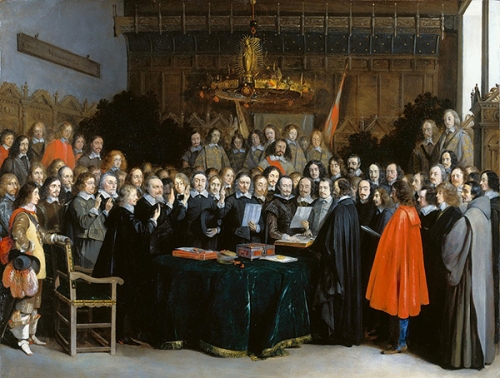
Les réalistes RI sont ceux qui tirent les conclusions les plus radicales du principe de souveraineté et pensent que les États-nations souverains existeront toujours. Cela se justifie par la compréhension que les réalistes ont de la nature humaine: ils sont convaincus que l'homme, dans son état naturel, est enclin au chaos et à la violence contre les plus faibles, et qu'un État est donc nécessaire pour empêcher cela; en outre, il ne devrait y avoir aucune autorité au-dessus de l'État pour limiter la souveraineté. Le paysage de la politique internationale consiste donc en un équilibre des forces en constante évolution entre les États souverains. Le fort attaque le faible, mais le faible peut toujours se tourner vers le fort pour obtenir de l'aide. Des coalitions, des pactes et des alliances se forment. Chaque État souverain défend ses intérêts nationaux sur la base d'un froid calcul rationnel.
Le principe de souveraineté rend les guerres entre États possibles (personne ne peut interdire à quelqu'un d'en haut de faire la guerre, car il n'y a rien de plus élevé qu'un État), mais en même temps la paix est également possible, si elle est avantageuse pour les États, ou si dans une guerre il n'y a pas d'issue univoque.
C'est ainsi que les réalistes voient le monde. En Occident, cette école a toujours été assez forte et a même prévalu, aux États-Unis, elle reste assez influente aujourd'hui: environ la moitié des politiciens américains et des experts en RI suivent cette approche, qui a dominé pendant la présidence Trump, la plupart des républicains (sauf les néocons) et certains démocrates y penchent.
Considérons maintenant le libéralisme en RI. Ici, le concept est très différent. L'histoire est vue comme un progrès social continu, l'État n'est qu'une étape sur la route du progrès, et tôt ou tard, il est appelé à disparaître. Puisque la souveraineté est entachée d'une possibilité de guerre, il faut essayer de la surmonter et de créer des structures supranationales qui la limitent d'abord, puis l'abolissent complètement.
Les libéraux de la RI sont convaincus qu'un gouvernement mondial doit être établi et que l'humanité doit être unie sous l'impulsion des forces les plus "progressistes", c'est-à-dire les libéraux eux-mêmes. Pour les libéraux de la RI, la nature humaine n'est pas une constante (comme c'est le cas pour les réalistes) mais peut et doit être changée. L'éducation, l'endoctrinement, les médias, la propagande des valeurs libérales et d'autres formes de contrôle des esprits sont utilisés à cette fin. L'humanité dans son ensemble doit devenir libérale et tout ce qui est illibéral doit être exterminé et banni. Car ce sont là les "ennemis de la société ouverte", les "illibéraux". Après la destruction des "illibéraux", il y aura une paix mondiale - et personne ne sera en guerre contre personne. Pour l'instant, la guerre est nécessaire, mais uniquement contre les "illibéraux" qui "entravent le progrès", défient le pouvoir des élites mondiales libérales et ne sont donc pas "humains", en aucune façon, et peuvent donc être traités de n'importe quelle manière - jusqu'à l'extermination totale (y compris l'utilisation de pandémies artificielles et d'armes biologiques).
Dans un avenir proche, selon ce concept, les États seront abolis et tous les humains se mélangeront, créant une société civile planétaire, un seul monde. C'est ce que l'on appelle le "globalisme". Le globalisme est la théorie et la pratique du libéralisme dans les RI.
La nouvelle version du libéralisme comporte un élément complémentaire aujourd'hui: l'intelligence artificielle dominera l'humanité, les gens deviendront d'abord sans sexe, puis "immortels", ils vivront dans le cyberespace et leur conscience et leur mémoire seront stockées sur des serveurs en nuage, les nouvelles générations seront créées dans une éprouvette ou imprimées par une imprimante 3D.
Tout cela se reflète dans le projet Great Reset du fondateur du Forum de Davos, Klaus Schwab.
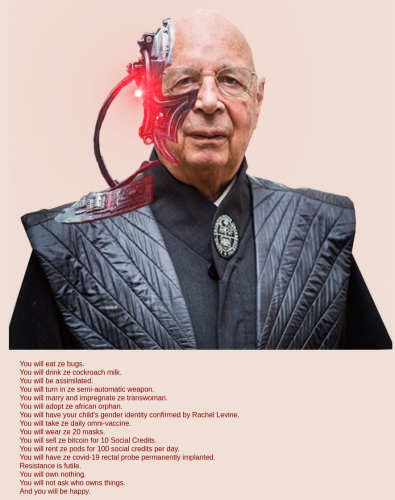
Les libéraux constituent l'autre moitié des politiciens et des experts en relations internationales en Occident. Leur influence augmente progressivement et dépasse parfois celle des réalistes en matière de RI. L'actuelle administration Biden et la majorité du parti démocrate américain sont des libéraux qui poussent dans ce sens. Les libéraux sont également dominants dans l'UE, qui est la mise en œuvre d'un tel projet, puisqu'elle vise à construire une structure supranationale. Ce sont les libéraux en matière de RI qui ont conçu et créé la Société des Nations, puis l'ONU, le Tribunal de La Haye, la Cour européenne des droits de l'homme, ainsi que le FMI, la Banque mondiale, l'OMS, le système éducatif de Bologne, la numérisation et tous les projets et réseaux mondialistes, sont tous l'œuvre des libéraux. Les libéraux russes font partie intégrante de cette secte mondiale, qui a toutes les caractéristiques d'une secte totalitaire.
Appliquons maintenant ces définitions au NOM (Nouvel Ordre Mondial). Après l'effondrement de l'URSS, l'Ukraine est devenue un outil des libéraux et des réalistes au sein des RI - précisément un outil de l'Occident. Les libéraux du MdD ont encouragé l'intégration de l'Ukraine dans le monde global et ont soutenu ses aspirations à rejoindre l'Union européenne et l'OTAN (l'aile militaire du globalisme); les réalistes du MdD ont utilisé l'Ukraine dans leurs intérêts contre la Russie; pour ce faire, il était nécessaire de faire de l'Ukraine un État-nation, ce qui contredisait l'agenda purement libéral. C'est ainsi que s'est formée la synthèse du libéralisme ukrainien et du nazisme contre laquelle l'Opération Militaire Spéciale se bat. Le nazisme en acte en Ukraine (l'Extrême droite, le Bataillon Azov et d'autres structures interdites en Russie) était nécessaire pour construire une nation et un État souverain le plus rapidement possible. L'intégration dans l'Union européenne exigeait une image ludique et comiquement pacifiste (ce fut le choix de Zelenski). Le dénominateur commun était l'OTAN. C'est ainsi que les libéraux et les réalistes IR ont obtenu un consensus russophobe en Ukraine. Lorsque cela était nécessaire, ils ont fermé les yeux sur le nazisme, les valeurs libérales et les parades de la gay pride.
Venons-en maintenant à la Russie. En Russie, depuis le début des années 1990, sous Eltsine, Tchoubais et Gaidar, le libéralisme a fermement dominé les RI. La Russie d'alors, comme l'Ukraine d'aujourd'hui, rêvait de rejoindre l'Europe et d'adhérer à l'OTAN. Si cela avait exigé une plus grande désintégration, les libéraux du Kremlin auraient été prêts à le faire aussi; mais à un moment donné, Eltsine lui-même et son ministre des affaires étrangères Evgueni Primakov ont légèrement ajusté l'agenda: Eltsine n'appréciait pas le séparatisme en Tchétchénie, Primakov a déployé un avion au-dessus de l'Atlantique pendant le bombardement de la Yougoslavie par l'OTAN. Il s'agissait de faibles signes de réalisme. La souveraineté et les intérêts nationaux étaient invoqués, mais de manière hésitante, timide.
Le vrai réalisme a commencé lorsque Poutine est arrivé au pouvoir. Il a vu que ses prédécesseurs avaient affaibli la souveraineté à l'extrême, happés qu'ils étaient par la mondialisation, et que le pays était par conséquent sous contrôle étranger. Poutine a commencé à restaurer la souveraineté. Tout d'abord, dans la Fédération de Russie elle-même - la deuxième campagne de Tchétchénie, la suppression des clauses de souveraineté de la Constitution, etc., puis il a commencé à s'occuper de l'espace post-soviétique - ce furent les événements d'août 2008 dans le Caucase du Sud, puis la Crimée et le Donbass en 2014. Dans le même temps, il est révélateur que la communauté internationale des experts (SWOP, RIAC, etc.) et le MGIMO ont continué à être complètement dominés par la ligne du libéralisme. Le réalisme n'a jamais été mentionné. Les élites sont restées libérales - tant celles qui s'opposaient ouvertement à Poutine que celles qui acceptaient à contrecœur de se soumettre à lui.
L'Opération Militaire Spéciale a, comme un flash-back, éclairé la situation au sein du ministère russe de la Défense. Derrière l'Ukraine, il y a une alliance de libéraux et, en partie, de réalistes au sein du ministère de la Défense, c'est-à-dire les forces du mondialisme qui se sont retournées contre la Russie. Pour les libéraux (et Biden et son administration (Blinken and Co.), comme Clinton et Obama avant lui, appartiennent précisément à cette école), la Russie est l'ennemi absolu, car elle constitue un obstacle sérieux à la mondialisation, à l'instauration d'un gouvernement mondial et d'un monde unipolaire. Pour les réalistes américains (et en Europe les réalistes sont très faibles et à peine représentés) la Russie est un concurrent pour le contrôle de l'espace de la planète. Ils sont généralement hostiles, mais pour eux, soutenir l'Ukraine contre la Russie n'est pas une question de vie ou de mort: les intérêts fondamentaux des Etats-Unis ne sont pas affectés par ce conflit. Il est possible de trouver un terrain d'entente avec eux, pas avec les libéraux.
Pour les libéraux de la RI, cependant, c'est une question de principe. L'issue de l'Opération Militaire Spéciale déterminera s'il y aura ou non un gouvernement mondial. La victoire de la Russie signifierait la création d'un monde entièrement multipolaire dans lequel la Russie (et la Chine et, dans un avenir proche, l'Inde) jouirait d'une souveraineté réelle et forte, tandis que les positions des entités alliées de l'Occident libéral, qui acceptent la mondialisation et sont prêtes à compromettre leur souveraineté, seraient dramatiquement affaiblies.
En conclusion, le libéralisme dans les RI vise à imposer la politique du genre, la guerre de l'information et la guerre hybride, l'intelligence artificielle et le post-humanisme, mais le réalisme évolue également de son côté: confirmant la logique de S. Huntington (incidemment, un partisan du réalisme dans les RI), qui parlait du "choc des civilisations", les principaux acteurs ne sont pas des États mais des civilisations, ce qu'il appelle les Grands Espaces. Ainsi, le réalisme glisse progressivement vers la théorie du monde multipolaire, où les pôles ne sont plus les États-nations, mais les États-continents, les empires. Ceci est également clairement visible dans le déroulement de l'Opération Militaire Spéciale.
En termes de diverses théories des relations internationales, l'Opération lancée par la Russie en Ukraine a simultanément inauguré un conflit entre :
- l'unipolarité et la multipolarité,
- le réalisme et le libéralisme dans les RI,
- la petite identité (nazisme ukrainien artificiel) et la grande identité (fraternité eurasienne de la Russie),
- la civilisation de la terre (Land Power) contre la civilisation de la mer (Sea Power) dans la bataille pour la zone côtière (Rimland), qu'a toujours explicité la géopolitique,
- l'État défaillant et l'empire résurgent.
Sous nos yeux et avec nos mains et notre sang, maintenant - en ce moment même - la grande histoire des idées est en train de se faire.
19:18 Publié dans Actualité | Lien permanent | Commentaires (0) | Tags : actualité, politique internationale, alexandre douguine, relations internationales, école réaliste, réalisme ri |  |
|  del.icio.us |
del.icio.us |  |
|  Digg |
Digg | ![]() Facebook
Facebook
samedi, 30 avril 2022
Les peuples d'Europe se soulèveront contre les élites mondialistes
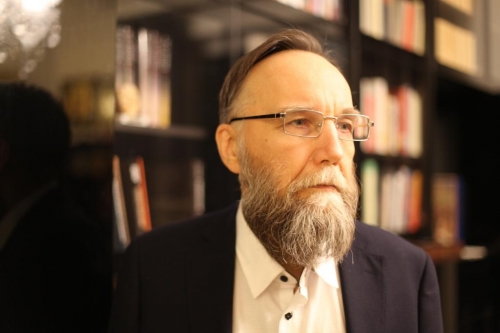
Les peuples d'Europe se soulèveront contre les élites mondialistes
Entretien avec Alexandre Douguine pour Nexus
Propos recueillis par Lorenzo Maria Pacini
1) Alexander Goulievitch, le conflit actuel entre la Russie et l'Ukraine modifie l'ordre géopolitique mondial de manière multipolaire. À votre avis, à quoi ressemblera l'architecture internationale - disons, dans les cinq prochaines années - lorsque les combats seront terminés ? Qu'est-ce qui va changer exactement, quels équilibres de pouvoir sur l'échiquier mondial vont émerger et/ou être configurés ?
Tout d'abord, un système de trois pôles s'est clairement formé. Chacun d'entre eux a son propre domaine de responsabilité, sa propre monnaie de réserve, son propre ensemble de valeurs culturelles, sa propre stratégie indépendante.
Ce n'est pas une seule humanité normative qui émergera (en tant que projection de l'Occident libéral et de ses normes et règles), mais trois. Pas un seul ordre libéral basé sur les règles occidentales, mais trois ordres civilisationnels différents - avec des idéologies différentes. Ce sera un coup dur pour le mondialisme.
Suite à cet effondrement du monde global, d'autres civilisations se joindront à cette multipolarité. Tout d'abord, je pense, l'Inde. Elle a son propre système, une démographie énorme, un potentiel économique puissant. Le monde peut devenir quadripolaire assez rapidement. Puis viendra le temps du monde islamique, où l'Iran, le Pakistan, la Turquie, et aussi la Syrie, sont déjà des entités souveraines.
L'Amérique latine et l'Afrique graviteront dans le même sens.
Et parallèlement à cela, je pense qu'une guerre civile va commencer en Europe - les peuples d'Europe se soulèveront contre les élites mondialistes. Lorsque les continentalistes auront gagné, l'Europe se sera organisée en un autre pôle.
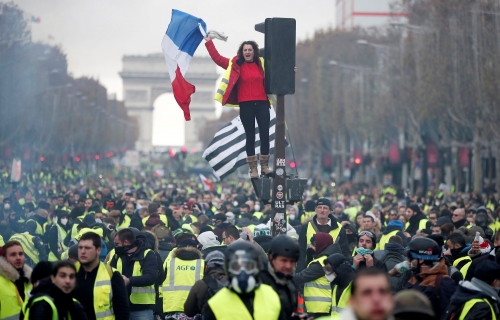
Et enfin, sous les coups de toutes parts, la dictature mondialiste aux États-Unis elle-même s'effondrera, et les Trumpistes comme les continentaux américains créeront un nouvel État. Peut-être le plus fort, peut-être pas.
2) La lutte géopolitique est aussi un "choc des civilisations", selon l'expression de Huntington, qui contraste avec la "fin de l'histoire" prônée par Fukuyama. Plusieurs fois dans vos discours, vous avez parlé d'une "guerre de l'esprit" quand vous évoquiez ce qui se passe. Pourriez-vous expliquer plus clairement votre vision métaphysique de ce conflit ?
C'est une longue histoire. Je suis un traditionaliste, et je crois que le monde moderne est l'opposé du monde de la Tradition. L'Occident moderne a détruit sa propre tradition, la tradition médiévale, la tradition antique, et détruit la tradition chez les autres peuples. En bref, l'Occident moderne est le Satan collectif, l'Antéchrist. À la fin des temps, et nous vivons à la fin des temps, Satan l'emporte sur ceux qui restent fidèles à Dieu, à l'ordre sacré. Mais cela ne dure pas longtemps. Dans la bataille finale, les armées de l'archange Michel, c'est-à-dire nous, sont victorieuses. C'est là l'essentiel : c'est le combat de la Tradition contre le monde moderne, le monde de la Révolution conservatrice. Pour les chrétiens, c'est une guerre contre l'Antéchrist, pour les musulmans contre Dajjal, pour les hindous contre le Kali Yuga, pour les Chinois contre le capitalisme et l'impérialisme occidentaux.
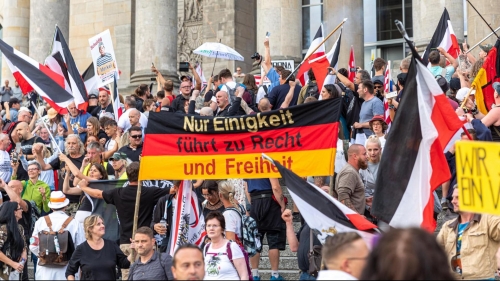
3) En Italie, vous avez été appelé à plusieurs reprises "l'idéologue de Poutine" et "le Raspoutine du Kremlin". Une grande partie de la presse italienne vous associe politiquement à l'extrême-droite, vous qualifiant de "fasciste" ou de "néo-nazi". Et cela - comme pour toute personne qui reçoit une "étiquette idéologique" de la part des médias - a en tout cas contribué à changer les perceptions des Italiens, intellectuels ou simples citoyens. À votre avis, qu'est-ce qui a suscité des étiquettes aussi peu judicieuses ?
Je suis une personne assez courageuse, et si j'étais un fasciste ou un nazi, je le dirais. Et je me moque de ce que les autres en pensent. De même, si j'étais communiste. Mais je ne suis pas un nazi, un fasciste ou un communiste, et je détaille ma critique de ces visions du monde dans La quatrième théorie politique et dans mes autres écrits. Je suis contre l'Occident moderne et toutes ses idéologies - libéralisme, communisme et fascisme. Pour moi, les sujets normatifs de ces trois visions - l'individu, la classe et la nation (et encore moins la race) ne sont pas acceptables. Je crois que le sujet de la politique devrait être le Dasein ou le peuple compris existentiellement, non pas une nation politique, mais l'unité historique et culturelle d'un tout organique - toujours ouvert et sans rapport avec la citoyenneté ou l'ethnicité. Une nation est une unité de destin.
Mais le libéralisme qui prévaut aujourd'hui ne permet pas la possibilité même d'une critique à partir de la position de la Quatrième théorie politique. Tout ce qui s'y oppose doit être considéré soit comme du fascisme, soit comme du communisme. Les libéraux ne discutent donc pas avec moi, ils se contentent de me diaboliser, de me bannir, puis de colporter une caricature qu'ils ont eux-mêmes créée et qui n'a absolument rien à voir avec moi ou avec mes idées.
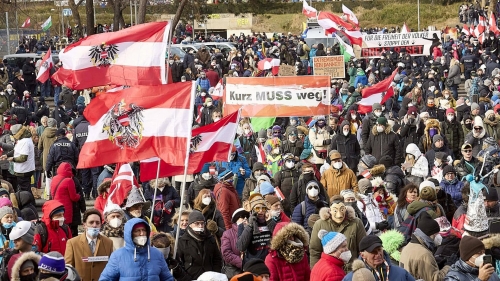
Il en va de même pour Poutine. Il n'est clairement pas un libéral, mais pas non plus un communiste et encore moins un nationaliste. Comment le définissez-vous en Occident? Comme un mélange de Staline et d'Hitler, il ne faut pas longtemps aux libéraux pour se décider. Et il n'est ni l'un ni l'autre. Les libéraux ne sont pas des nazis, mais ils se comportent comme des nazis. Et leur comportement rappelle également les procès staliniens, même s'ils ne sont pas communistes.
Je sais tout cela depuis ma jeunesse soviétique : le libéralisme est devenu si totalitaire qu'il ne tolère pas la dissidence et est incapable de polémiquer. Il s'agit d'un monologue. Un tel monologue narcissique sans cervelle est la chose la plus désagréable du fascisme et du communisme. C'est la méthode privilégiée du libéralisme aujourd'hui : si vous n'êtes pas un libéral, vous êtes un ennemi de la société ouverte, c'est-à-dire un "fasciste" Cela ne peut être modifié selon les vicissitudes du moment. Le camp de concentration idéologique en Occident et dans le monde disparaîtra en même temps que le libéralisme, tout comme les autres idéologies totalitaires occidentales ont disparu.
4) Dites-nous, s'il vous plaît, pour notre public italien, qui est de plus en plus intéressé par vos idées, mais qui, en même temps, n'écoute souvent que ce qui est diffusé par les grands médias : quelle est votre relation avec Vladimir Poutine ?
Poutine et moi sommes inspirés par la logique du destin russe, défendons l'identité russe, sommes dévoués à la civilisation russe et sommes conscients des règles du grand jeu géopolitique. Je pense que cette coïncidence est spontanée.
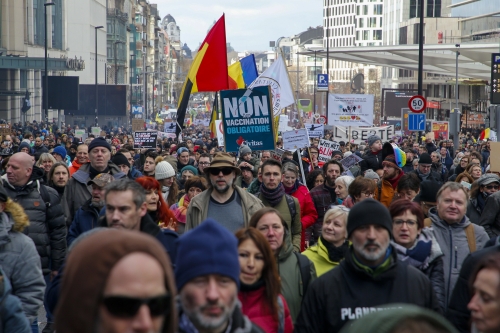
5) Votre quatrième théorie politique est un dépassement des trois grandes doctrines politiques, et elle fascine aussi les Européens, y compris les Italiens. Y a-t-il, en fait, un élément nouveau qui offre des possibilités pour l'avenir - y compris pour notre pays ? Et, à votre avis, quel rôle joue l'Italie dans la renaissance de l'Europe ? Et dans quelle mesure votre Quatrième théorie politique peut-elle être une voie à suivre ?
Je ne peux pas dire que je suis particulièrement impressionné par le patriotisme italien. Je ne suis pas non plus impressionné par aucun État-nation bourgeois créé à l'époque moderne. J'admire Rome et l'Empire romain. Je suis fasciné par la Renaissance italienne. J'aime beaucoup les régions italiennes - la Sicile, le Nord, etc. Et je suis très impressionné par les travaux et les idées du traditionaliste italien Julius Evola.
La quatrième théorie politique en Italie doit se fonder logiquement sur le Dasein italien. Mais qu'est-ce que c'est ? Chaque nation a son propre Dasein. Ce n'est pas une catégorie formelle - pas la citoyenneté, pas l'ethnicité, pas la langue... C'est la structure de la vie et la relation à la mort, c'est la profondeur d'une culture métaphysique et existentielle. Parfois, je pense que je ressens le Dasein italien et que je l'admire. Mais cela nécessite une sérieuse philosophie là. Dans ma série de livres, Noomachia, l'un des volumes est consacré au Logos latin. Je me penche sur l'histoire de l'Italie, de la Rome antique à nos jours. Mais il ne s'agit encore que d'une approche préliminaire. Décrire et explorer le Dasein italien est l'affaire des Italiens eux-mêmes. C'est également le point sur lequel doit être construite la version italienne spécifique de la Quatrième théorie politique. D'ailleurs, de telles études ont déjà été lancées en Espagne, au Brésil, en Argentine et dans d'autres pays.
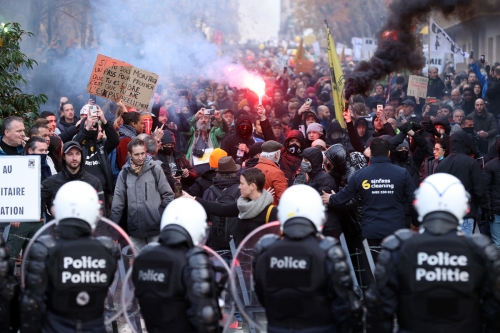
6) En raison des sanctions (passées et présentes), la Russie est et sera contrainte d'accroître son indépendance vis-à-vis de la finance occidentale. Et selon certains, la possibilité d'un retour à l'étalon-or, surmontant la monnaie fiduciaire qui prévaut depuis les années 1970, lorsque les États-Unis ont imposé au monde une monnaie abstraite sans valeur, est proche. En outre, l'or a une signification symbolique précise que les traditions spirituelles ont toujours prise en compte. Pensez-vous qu'un tel scénario n'aurait qu'une signification économique, ou aurait-il également une signification plus large ?
Je m'en tiens ici plutôt à la théorie économique développée par Ezra Pound dans ses Cantos. L'étalon-or est une catégorie associée à quelque chose d'étranger à une économie particulière et porte déjà en elle, bien que modifiée, la référence à la caisse d'émission. Une monnaie nationale ne devrait être liée qu'au volume du produit national. L'émission est l'affaire de la banque centrale souveraine sans aucune référence à une quelconque mesure étrangère, qu'il s'agisse d'une monnaie de réserve mondiale ou d'un étalon-or. Et pour éviter de déclencher l'inflation, les investissements stratégiques doivent être acheminés par une deuxième boucle, distincte de celle du consommateur de masse. Ce modèle ne dépend pas de l'idéologie - le New Deal de Roosevelt, l'économie de Staline de 1928-1953 et l'économie de HJalmar Schacht ont été toutes aussi efficaces, tandis que le libéralisme, le communisme ou le nazisme dans d'autres versions auraient pu se conjuguer avec stagnation, effondrement et dégradation. La souveraineté économique, que Pound vantait et que le brillant Silvio Gesell a tenté d'incarner, est la solution optimale.
21:00 Publié dans Actualité, Entretiens, Eurasisme | Lien permanent | Commentaires (0) | Tags : alexandre douguine, entretien, nouvelle droite, nouvelle droite russe, actualité, politique internationale |  |
|  del.icio.us |
del.icio.us |  |
|  Digg |
Digg | ![]() Facebook
Facebook
dimanche, 24 avril 2022
Maurizio Murelli, éditeur de Douguine : "Voilà ce qui se cache derrière le conflit en Ukraine"
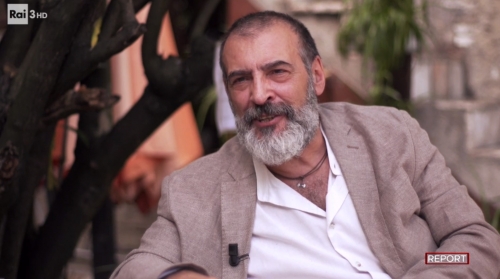
Maurizio Murelli, éditeur de Douguine : "Voilà ce qui se cache derrière le conflit en Ukraine"
Propos recueillis par Umberto Baccolo
Maurizio Murelli est un homme qui a le courage de ses idées, aussi impopulaires soient-elles et quel que soit le prix à payer, et depuis les années 1980, il mène une bataille culturelle et politique pour les diffuser. Anti-libéral, anti-américain, il est issu de la droite radicale, un milieu dans lequel il jouit encore d'un grand crédit, mais qu'il a depuis longtemps abandonné pour d'autres rivages : en particulier, la Quatrième théorie politique d'Alexandre Douguine, le philosophe et politologue russe que Murelli invite à parler en Italie depuis le début des années 1990 et qu'il traduit et publie ici. Il l'a d'abord fait avec sa propre Società Editrice Barbarossa et le magazine associé Orion, et maintenant avec AGA Editrice, qui a pris leur place.
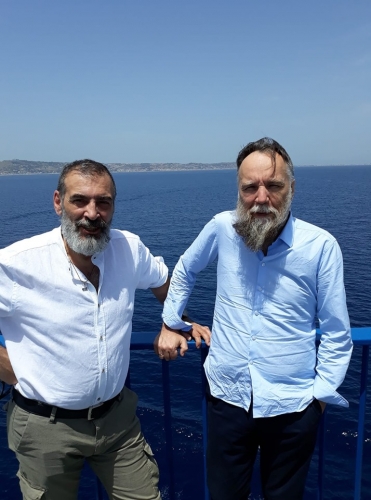
Murelli, comme Douguine, est l'un des rares intellectuels qui, dans ce conflit en Ukraine, se range ouvertement du côté des Russes, sans demi-mesure ni circonlocutions verbales. Dans cette longue interview, il explique en détail pourquoi, racontant ce qu'il n'a pas eu le temps d'expliquer complètement lorsqu'il était récemment invité à la télévision en prime time sur Rete4. Si, après avoir lu l'interview, vous êtes curieux de connaître sa figure atypique, je vous renvoie au film documentaire "Maurizio Murelli - Non siamo caduti d'autunno", que j'ai réalisé en 2020 et qui peut être visionné gratuitement sur YouTube, une chaîne où il a enregistré un certain nombre de visites.
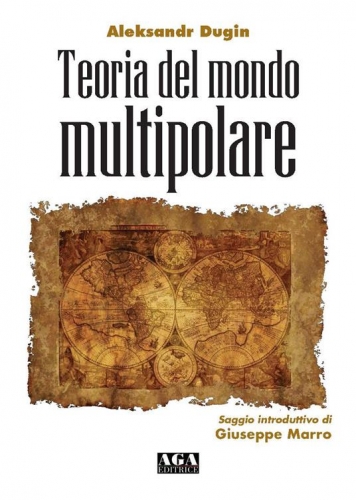
Dans votre analyse très suivie sur Facebook, vous expliquez que la vraie guerre n'est pas celle de l'Ukraine, car elle n'est qu'un front dans un affrontement plus vaste. Pouvez-vous expliquer ce que vous entendez par là et quels sont les véritables éléments en jeu ?
L'Ukraine est un champ de bataille de la Grande Guerre mondiale à laquelle les États-Unis ont donné un nouvel élan et une accélération dans les années 1990 afin d'imposer leur ordre mondial au monde, se concevant, depuis leur naissance, comme la véritable Jérusalem terrestre, leur peuple comme le véritable "peuple élu" dont la mission messianique est de racheter toute l'humanité. Cette vision qui est la leur est bien expliquée par John Kleeves dans le livre "A Dangerous Country" qu'en tant qu'éditeur j'ai publié pour la première fois en 1998 et ai réédité chez AGA Editrice en 2017. Pour être plus précis, la Grande Guerre mondiale pour la conquête du monde a commencé bien avant les années 1990, lorsque - faisant passer la doctrine Monroe d'une échelle continentale à une échelle mondiale - ils sont intervenus en Europe pendant la Première Guerre mondiale, ce qui a permis aux États-Unis d'être décisifs dans la rédaction du traité de Versailles avec lequel ils ont élaboré une première ébauche du nouvel ordre mondial redessinant, de mèche avec les Britanniques, la géographie de l'Europe et aussi de l'Afrique. Ils ont franchi une nouvelle étape avec la Seconde Guerre mondiale, dans laquelle ils sont intervenus via le Pacifique. À cette époque, leur principal intérêt était d'établir leur propre domination dans la zone Pacifique en désintégrant le Japon. La dynamique liée au jeu des alliances a amené les États-Unis sur le théâtre de guerre européen qu'ils ont colonisé à la fin de la guerre. Et voici le Pacte deYalta, qui constitue pour les États-Unis une sorte d'"image fixe" dans leur progression vers l'établissement de leur propre domination mondiale. Les États-Unis se sont retrouvés libérés du pacte de Yalta à la fin des années 1980 avec l'implosion de l'URSS et après avoir réduit le Panama, qui voulait nationaliser le canal, à une peau de chagrin en arrêtant et traînant le président Noriega enchaîné dans sa propre prison ; ils ont commencé leurs guerres au Moyen-Orient, d'abord en parrainant la guerre contre l'Iran, puis en intervenant directement en Irak, puis en Syrie, en Somalie, en Libye et même en Europe contre la Serbie. Tous ces États étaient, avant les années 1990, alliés ou sous le parapluie protecteur de l'URSS. Ils ont promu la guerre de vingt ans contre l'Afghanistan tandis que, par diverses flatteries, ils ont incorporé dans l'OTAN - la feuille de vigne de l'armée américaine - plus ou moins tous les pays de l'ancien Pacte de Varsovie. L'Ukraine est restée à l'extérieur. Par le biais de diverses "révolutions colorées", ils ont tenté de miner de l'intérieur tous les autres États qui n'avaient pas encore été subjugués, jusqu'au coup d'État de Maidan en Ukraine. Il faudrait être myope ou de mauvaise foi, mais il faudrait aussi être un idiot cognitif, pour ne pas voir le schéma global de cette guerre mondiale, asymétrique et menée aussi avec des armes commerciales et des sanctions, souvent contre les Etats les plus faibles, comme ceux d'Afrique, où les Américains se présentent avec le Colt et le chéquier, pour les soumettre, d'une manière ou d'une autre, à leur propre domination. C'est dans ce cadre, certainement décliné en complot par les pontes, que je soutiens que l'Ukraine n'est qu'un des nombreux champs de bataille de la grande guerre biséculaire.
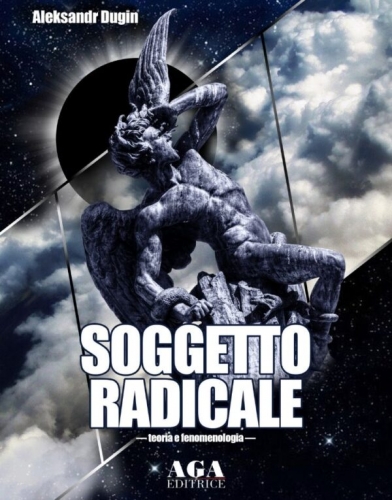
Vous avez longtemps pris vos distances avec la zone dite de la droite radicale, mais il est intéressant de noter que, tout comme dans la gauche radicale, cette situation a produit la plus violente fracture interne depuis longtemps. À votre avis, quelle en est la raison, car cette même crise russo-ukrainienne a créé des divisions aussi nettes et féroces entre les héritiers des idéologies du 20e siècle ?
Tant la "droite radicale" que la "gauche radicale" ne sont que les déchets des orthodoxies idéologiques de la première moitié du 20e siècle, des résidus humains qui vivent depuis des décennies sur des malentendus et des illusions. Tant la "droite" que la "gauche" ne sont pas les antagonistes du libéralisme, mais en sont l'expression directe. Ils sont progressivement conquis et enivrés par les valeurs libérales et à la fin, rayés de la carte, ils rivalisent entre eux pour être plus libéraux que les libéraux déclarés. La gauche vit un véritable psychodrame. La Russie, berceau du communisme inversé, a brisé la propre certitude centrée sur l'inéluctabilité du cours historique tel que conçu par la gauche. Dans leur album de famille, il y a l'oncle Lénine qui est renié et reste seul comme une momie emblématique sur la Place Rouge. Pour eux, il était inéluctable que le Quatrième État, celui du prolétariat, batte le Troisième État, celui de la bourgeoisie et du capitalisme. C'est le contraire qui s'est produit. Pour l'essentiel, l'aile gauche a d'abord répudié le communisme, puis a recherché de nouvelles échelles de valeurs progressistes, toutes raffinées et essentiellement individualistes. Au point que si vous mettez une centaine de gauchistes devant vous, il n'y en a pas deux qui puissent se superposer, c'est-à-dire qu'ils auraient la même idée de comment être de gauche. Et en fait, ils sont tous en conflit les uns avec les autres pour revendiquer l'authentique "forme de la gauche". Mais je dois m'arrêter ici, car toute la question serait trop longue à expliquer. Les événements en cours en Ukraine obligent la "droite" et la "gauche" à prendre parti, tout en restant discrets sur la question. Et si la "droite" et donc les divers néo-fascismes s'enlisent sur un terrain romantique en étant fascinés par les runes et les croix gammées dextrogyres, la gauche, et même ceux qui se sont déclarés communistes, deviennent des serviteurs objectifs de l'impérialisme atlantiste qu'ils ne reconnaissent pas comme tel, tandis qu'en définissant la Fédération de Russie comme un empire, ils ne l'acceptent pas comme tel. Il y a aussi une sorte de ressentiment irrépressible envers la Russie pour la façon dont elle est passée du communisme à autre chose. Et ils sont fascinés par l'idée de résistance et autres bêtises du genre. Je salue avec un énorme plaisir cette désintégration idéologique de la droite et de la gauche, du communisme et du fascisme. Le champ des malentendus est en train d'être nettoyé. Je suis heureux de les voir se tenir côte à côte sur le même front pour défendre les valeurs libérales, l'atlantisme et l'impérialisme atlantique. En restant sur cette position, ils débarrassent le champ des cadavres idéologiques en faveur de ceux qui se sont depuis longtemps libérés des malentendus, en faveur de ceux qui adoptent aujourd'hui une véritable position révolutionnaire et donc une fonction antilibérale.
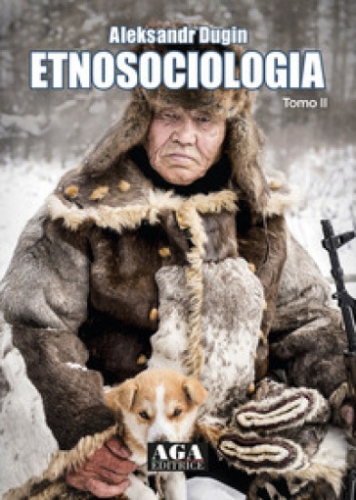
Pour en revenir à la question précédente, j'ai l'impression que beaucoup de gens, à commencer par Poutine lui-même et même Douguine qui parle de nazis et de dénazification, ont tendance à vouloir adapter cette situation à un affrontement entre les anciennes idéologies, où l'on ne sait plus très bien qui sont les nazis et qui sont les communistes. Je pense que cette façon de voir les choses est vieille et inefficace, cependant, que ce qui est en jeu n'est pas le fascisme et le communisme, qu'en pensez-vous ?
Tout d'abord, il faut partir du fait que les terminologies, et donc les langues, utilisées en Occident et celles utilisées en Orient, ce qui vaut également pour la Chine, l'Inde, etc., ne sont pas superposables car elles sont différentes. Pour les détenteurs du pouvoir, les terminologies doivent agir sur ce qu'on appelle l'imaginaire collectif, et les imaginaires en Orient sont différents de ceux qui circulent en Occident. Dans l'imaginaire collectif russe, le nazisme est l'idéologie qui a tenté d'anéantir l'identité russe et qui a fait 26 millions de victimes russes. La Seconde Guerre mondiale se décline en guerre patriotique, c'est-à-dire en guerre pour la défense de l'identité russe que les nazis voulaient nier. Ainsi, en se mettant au service de l'atlantisme, les Ukrainiens ont en fait sublimé les nazis en niant l'identité russe. Il faut garder à l'esprit que non seulement il y a eu huit ans de guerre dans le Donbass pour éradiquer les russophones et les russophiles, mais que durant ces mêmes huit années, il y a eu une répression meurtrière à l'intérieur de l'Ukraine, qui a pris la forme d'une persécution de la culture russe, d'une interdiction de l'utilisation de la langue russe, de la mise hors la loi des partis russophones et d'une série d'assassinats ciblés, de persécutions physiques et d'emprisonnements, des faits dont personne ne parle mais qui sont pourtant bien documentés. Poutine voit dans tout cela une action nazie. Personnellement, je pense que l'adoption par Poutine du concept de "dénazification" a également une valeur tactique: il voulait anticiper l'utilisation de l'épithète "nazi" à son encontre, car c'est ce que fait l'Occident lorsqu'il veut objectiver comme un mal absolu ceux qui sont ses ennemis; il l'a également fait avec Saddam, Assad, Milosevic, etc. Quant à Douguine, il sait très bien que le nazisme en circulation aujourd'hui n'a rien à voir avec le nazisme historique (quoi qu'on pense du nazisme) et l'identifie comme un néo-produit du libéralisme, un faux nazisme créé en "laboratoire" par ceux qui n'ont aucun problème à l'exploiter de diverses manières, selon leur convenance, en la désignant comme un danger dans certains contextes, à d'autres moments, dans d'autres contextes - comme dans le cas de l'Ukraine ou, pour ne citer qu'un exemple, comme au Chili dans les années 1970 - comme quelque chose de bénéfique. Selon Aleksandr Douguine, donc, le nazisme, le fascisme et le communisme étaient une réponse au libéralisme tout au long de la Modernité. Sa position nous place au-delà de la post-modernité (celle dans laquelle nous vivons aujourd'hui) et de la modernité, celle dans laquelle nous vivons hier, et se situe précisément dans la pré-modernité, c'est-à-dire dans le monde de la Tradition. Par conséquent, en ce sens, il est anti-nazi. Il faut également admettre que la remise en jeu du nazisme par Poutine est l'une des causes du court-circuit déterminé dans la "droite" et la "gauche" et que, par conséquent, dans la perspective de leur désintégration, il s'agissait d'une remise en jeu efficace et bénéfique".
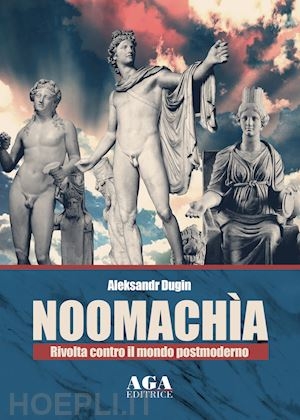
D'autre part, en parlant du monde de l'information, vous dénoncez - en apportant beaucoup de vidéos et de témoignages et de preuves à l'appui - que les médias sont très partiaux et ne font que de la propagande, nous abreuvant de beaucoup de mensonges, afin de pousser les gens à accepter les conséquences économiques d'une crise avec les Russes, en les mettant en exergue et en exaltant les Ukrainiens. Cependant, une chose doit être dite: dans nos talk-shows et nos journaux, une large place est accordée à ceux qui théorisent que les Ukrainiens doivent se rendre, que nous ne devons pas intervenir, et que Poutine a ses nombreuses bonnes raisons: outre les divers Orsini et Canfora, intellectuels de gauche respectés, et l'ANPI de Pagliarulo, nous avons même trouvé beaucoup de place pour Douguine et aussi pour vous, des figures souvent diabolisées... Comment voyez-vous cela ? S'agit-il d'une question de respect du pluralisme ou d'autre chose ?
Il y a un cas d'école que personne ne mentionne. En 1990, une femme s'est présentée au Congrès américain en tant qu'infirmière réfugiée du Koweït, racontant des horreurs indicibles commises par les troupes irakiennes, telles que des enfants jetés sur des baïonnettes, des viols et des massacres généralisés, un récit qui a été immédiatement soutenu même par Amnesty International, ainsi que par tous les médias occidentaux. Le témoignage de l'infirmière autoproclamée a déclenché l'indignation qui a conduit à l'opération "Tempête du désert", la première guerre du Golfe en Irak.
Cependant, le témoignage de l'infirmière Nayirah était un mensonge colossal, à commencer par le nom avec lequel elle s'est présentée. Son vrai nom était, en fait, Saud al Sabath, et elle n'était ni une réfugiée ni une infirmière pauvre, mais la très riche fille de l'ambassadeur du Koweït aux États-Unis. Il a fallu attendre 1992 pour découvrir la vérité révélée par le New York Times, qui a également documenté la façon dont le canular a été conçu par une agence de publicité, Hill & Knowlton (le lavage de conscience médiatique posthume typique: jamais la dénonciation du bobard n'a lieu alors que le mensonge est flagrant). Ce faux témoignage repris sans critique par les médias occidentaux a servi à galvaniser et à pousser les masses à donner leur consentement à la guerre d'invasion de l'Irak. Une "petite guerre" qui a coûté la vie à 100.000 Irakiens, dont 2300 civils. Plus célèbre est le canular utilisé comme casus belli pour la deuxième guerre du Golfe, l'exposition par Colin Powell à l'ONU de la fameuse fiole qui, selon le général qui s'était recyclé dans la politique, contenait suffisamment d'anthrax pour exterminer la population d'une grande ville. Cet autre canular, qui, comme le premier, a galvanisé les Occidentaux, a coûté une "petite guerre" qui a duré huit ans et fait 63.000 victimes civiles plus environ 8.000 militaires. C'est plus ou moins le même schéma qui est utilisé en Ukraine, avec une méthode beaucoup plus harcelante, la quasi-totalité des soi-disant correspondants de guerre se faisant passer pour des témoins oculaires et se laissant mener par les milices ukrainiennes qui leur montrent ce qu'ils veulent voir et leur disent ce qui leur convient le mieux. Si l'un de ces correspondants essayait de dire aux Ukrainiens quelque chose qu'ils n'aiment pas, nous verrions combien de minutes il lui faudrait pour recevoir un ordre de quitter le territoire. Il y a trois ou quatre correspondants de guerre occidentaux sur le front russe. Il faut aller sur les télévisions russes, chinoises, arabes, indiennes et africaines, ainsi que sur les chaînes Telegram pour voir une réalité totalement différente. J'ai archivé une centaine de films du front russe, réalisés par des journalistes indépendants, dont aucun ne sera jamais diffusé à la télévision grand public. "Une large place est accordée dans les talk-shows à ceux qui avancent des points de vue opposés à ceux des pro-Ukraine" dites-vous ? Je suis plus ou moins tous ces talk-shows où ceux qui s'expriment contre le récit atlantiste sont mis devant une sorte de peloton d'exécution; des duels à un contre dix, où l'animateur interrompt avec ses remarques souvent déplacées afin de frustrer le récit du dissident, puis, fatalement, diffuse les publicités quand il a l'intention de faire taire le récit qui est désagréable pour lui. Au fait, si, au moment de la soi-disant urgence sanitaire pandémique, quiconque passait à la télévision et s'écartait du récit de Speranza & C. devait faire précéder sa déclaration de: "Je suis vacciné et sur-vacciné mais, en ce qui concerne.... Je ne suis pas d'accord", ici chacun doit d'abord faire profession d'amour inconditionnel pour l'atlantisme, dire que la Russie est un envahisseur et l'Ukraine une victime, que Poutine est un monstre, etc. Bien sûr, ils doivent soutenir qu'en Italie il y a une information pluraliste et pour cette raison ils donnent un peu d'espace à ceux qui ont des positions légèrement différentes. Sauf à les massacrer et à les obliger à s'exprimer entre un film horrible et larmoyant et un autre. Chaque jour, je reçois des demandes pour passer à la télévision ou pour favoriser la présence de Douguine. Je n'ai accepté qu'une seule fois, et Aleksandr Douguine que je protège, en dictant les conditions de l'émission. Quand ils n'acceptent pas et sont intelligents, malgré les supplications, Douguine ne passe pas à la télévision. Laissez-les faire leur propre petit théâtre.
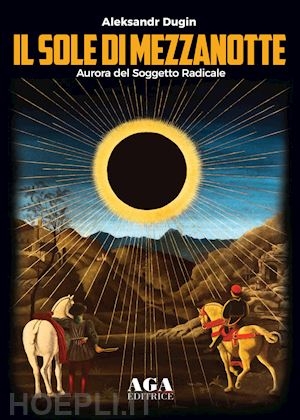
Enfin, vous êtes doué pour faire des prédictions. Selon vous, quelles seront les conséquences à court, moyen et long terme de ce conflit pour l'Italie ? Et comment pensez-vous que le conflit va se poursuivre ?
Pour l'Italie, à court et moyen terme, elles seront catastrophiques. Ce n'est pas moi qui le dis, mais divers analystes universitaires du domaine économico-financier, sans exclure ceux de la Confindustria, qui le disent. Il est prévu qu'aux alentours de juin-juillet, 570.000 travailleurs seront licenciés et mis à pied, et que 26.000 entreprises fermeront. Il y aura une pénurie de tous les métaux et "terres rares" nécessaires au fonctionnement de certaines entreprises, des engrais, de la farine pour les pâtes et le pain, etc. L'inflation (qui pour un citoyen devient une surcharge) devrait atteindre 8%. Pour se passer du gaz russe que nous allons quémander en Afrique dans des pays qui sont tout sauf stables, nous devrons payer au moins trois fois plus... et de toute façon nous ne pourrons jamais remplacer les 29 milliards de mètres cubes de gaz que nous prenons en Russie, quoi qu'en dise le trio Conte-Cingolani-Di Maio. Avec les sanctions, nous allons détruire des milliers d'entreprises italiennes qui font du commerce avec la Russie, nous allons perdre les revenus du tourisme russe..... À long terme, ce sera encore pire. Nous entrerons en récession avec les autres pays européens. En dernière analyse, il s'agit d'une guerre américaine contre l'Europe, que les Américains ont forcée à se priver du poumon primaire russe et, en perspective, du poumon secondaire chinois. Compte tenu de ce scénario, il est facile de comprendre l'action meurtrière consistant à évoquer la monstruosité russe. Les citoyens doivent être convaincus que la Russie est objectivement responsable de la misère à laquelle ils devront faire face. Cependant, la Russie s'en sortira bien, bloquant avec la Chine cette partie du monde où il y a plus de trois milliards de nouveaux consommateurs potentiels, où il y a ceux qui aspirent à passer de la bicyclette à la moto et ceux qui aspirent à passer de la moto à la voiture. Un marché énorme.
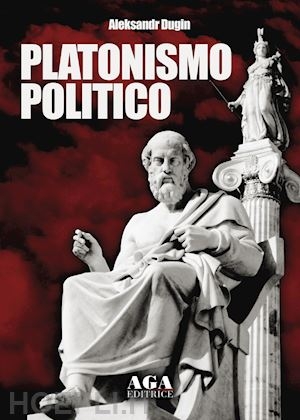
Dernière chose : les erreurs de notre gouvernement. À votre avis, quels étaient les plus graves et comment le gouvernement aurait-il dû agir dans ces cas-là pour protéger les intérêts des citoyens ?
Nous n'avons pas de gouvernants. Nous avons des serveurs, des serviteurs inconscients qui ne veulent que faire plaisir à leurs maîtres d'outre-mer. Draghi, d'ailleurs, bien soutenu à la fois par la coalition qui le soutient et par la pseudo-opposition de Meloni, est parmi les serviteurs imbéciles des USA, le faucon, celui qui a suggéré, par exemple, de stériliser la banque centrale russe. Cette masse de serviteurs du gouvernement est incapable de protéger les intérêts des citoyens. J'espère que, le moment venu, ils ne resteront pas impunis et qu'ils seront appelés à rendre compte du désastre qu'ils ont préparé. Une chose me console: historiquement, l'Italie est sortie d'un conflit en tant qu'alliée de ceux qui étaient ses ennemis au début du conflit, et ceux avec qui elle est entrée en conflit sont sortis de ce même conflit en tant que perdants. Je ne suis pas de ceux qui croient en la vertu théologique chrétienne de l'"espérance", mais faisant une exception pour une fois, j'espère et donc je souhaite que d'une certaine manière, à la fin de cette phase de la Grande Guerre, les alliés actuels de l'Italie sortent vaincus et que d'une certaine manière l'Italie se retrouve au moins réconciliée avec la Russie, un pays avec lequel nous avons de grandes affinités électives, artistiques, culturelles, métaphysiques, par opposition à ce que nous partageons avec l'Empire du Mal, les États-Unis, qui nous accable de valeurs décadentes. Tôt ou tard, quelqu'un devra se demander pourquoi aux Etats-Unis, tous les deux jours, un psychopathe entre dans une école, un supermarché, un bâtiment administratif et tue comme si de rien n'était. Une nation de psychopathes qui nous contamine depuis des décennies et avec laquelle, en tant que vrais Européens, nous n'avons rien à faire. Entre autres choses, ils sont comme un arbre sans racines qui a grandi en se nourrissant du massacre et du meurtre de peuples, à commencer par les Amérindiens. L'Europe a de nombreuses racines et si certaines se sont taries, d'autres fonctionnent encore. C'est la nourriture qui monte à l'arbre à partir de ces racines qui rachètera l'Europe et la réconciliera avec sa composante géopolitique à l'Est.
Par Umberto Baccolo.
12:50 Publié dans Actualité, Affaires européennes, Entretiens | Lien permanent | Commentaires (0) | Tags : entretien, alexandre douguine, maurizio murelli, actualité, ukraine, russie, europe, affaires européennes |  |
|  del.icio.us |
del.icio.us |  |
|  Digg |
Digg | ![]() Facebook
Facebook
mercredi, 20 avril 2022
De la création d'une technocratie souveraine
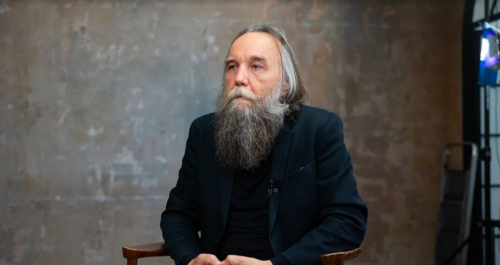
De la création d'une technocratie souveraine
Alexandre Douguine
Source: http://www.elespiadigital.com/index.php/tribuna-libre/37294-2022-04-03-12-58-15
Je pense que l'un des graves problèmes que nous rencontrons actuellement est que nous continuons à nous accrocher à de vieilles attitudes et à de vieux schémas de pensée à un moment où les conditions objectives ont changé, notamment parce que nous continuons à croire, ici en Russie, que le gouvernement russe est divisé en deux camps: l'un composé de libéraux au sein du système (6e colonne) et l'autre composé de patriotes.
Dans un état normal, ce serait une attitude valable pour les patriotes de rester enfermés dans leurs foyers, mais puisque nous sommes entrés dans un état d'urgence, il est préférable de soutenir le gouvernement. Il semblerait qu'une lutte mortelle soit menée entre les deux camps en ce moment, même si, par ailleurs, nous sommes en pleine guerre en Ukraine.
Cependant, nous devons garder à l'esprit que cette guerre a complètement détruit les chances du libéralisme de revenir en Russie (que ce soit celui de la 5e colonne, qui a pratiquement disparu, ou celui de la 6e colonne, qui continue à se manifester par intermittence). Dès que l'Occident a déconnecté la Russie de la mondialisation, la 6e colonne a commencé à se désintégrer d'elle-même.
Il semble parfois que les libéraux attendent le moment de riposter (ou de contre-attaquer) aussi désespérément que les nazis du bataillon Azov de Mariupol (une organisation interdite en Russie).
Les civils, les volontaires et les soldats qui se battent et meurent en Nouvelle Russie (Novorossiya) sont outrés, déconcertés et horrifiés d'entendre les points convenus lors des négociations entre Medinsky et Abramovich à Istanbul. Kadyrov, qui est devenu la quintessence de la voix du monde russe, a ouvertement exprimé son rejet. Bien sûr, il est naturel que ces déclarations aient suscité le mécontentement et les autorités en sont conscientes. À cela s'ajoutent les succès des opérations militaires et les premières attaques ukrainiennes sur notre territoire (les attaques de Belgorod, etc.). Tout cela a déclenché des signaux d'alarme, à juste titre.
Cependant, lorsque les stratèges de Moscou ont lancé cette opération spéciale, ils savaient qu'ils n'avaient pas d'autre choix que de vaincre l'ennemi et d'atteindre leurs objectifs: la démilitarisation et la dénazification de l'Ukraine. Il ne suffit pas de libérer la Novorossiya ou le Donbass, il faut aller plus loin. Bien sûr, Kiev n'acceptera jamais nos propositions de plein gré, et s'il le fait, il se contentera de renier ce qui a été convenu. Poutine le comprend mieux que quiconque, c'est pourquoi il sait que le lancement de l'opération spéciale est le point de non-retour.
C'est pour cette raison que la bataille féroce entre la 6ème colonne et les patriotes n'est qu'un spectre qui continue à nous hanter après le lancement de l'opération spéciale du 22 février 2022. Les choses ont définitivement changé : nous ne pouvons plus penser que maintenant les patriotes sont les seuls à faire quelque chose pendant que les libéraux sabotent tout. Je crois que nous assistons à la naissance d'une "technocratie souveraine", car dans les conditions actuelles, la seule chose qui compte est l'efficacité dans la réalisation d'un seul objectif: contribuer activement à la réalisation de la Victoire. Dans un état d'urgence, l'idéologie de l'individu n'est plus pertinente: un patriote qui ne fait que se plaindre et crier n'est pas une figure nécessaire dans le jeu qui se déroule. En revanche, un "libéral" qui se bat aujourd'hui pour le pays, l'armée et le peuple est digne de soutien et de confiance. Nos critères doivent être adaptés aux événements actuels.
C'est pourquoi l'émergence d'une technocratie souveraine deviendra l'objectif principal de notre gouvernement. Si cela se produit, alors les vieilles querelles idéologiques en Russie appartiendront au passé. Si des gauchistes, des patriotes ou des libéraux collaborent en versant leur sang pour notre Victoire, cela signifie que nous sommes tous unis pour le plus grand bien. Pendant l'état d'urgence, nous devons mettre de côté toute forme de controverse idéologique. Notre seul code doit être le "code de la victoire" et cela signifie ne pas tirer sur les nôtres. Notre soutien doit viser à étayer la victoire de Poutine, de la Russie et de l'opération Z, car l'important est d'être utile à la patrie à un moment critique.
C'est un moment de vie et de mort. Bien sûr, tout libéral qui s'oppose à l'opération Z est un traître. Il n'y a aucun doute là-dessus, car ils travaillent pour l'ennemi: il n'y a pas d'argumentation à développer ici. Mais lorsque les patriotes et les gauchistes critiquent à l'excès les autorités - nous aimerions tous que cela se termine le plus rapidement possible, mais de telles opérations prennent du temps - nous n'apportons plus rien. Il n'est pas non plus acceptable que d'anciens libéraux, qui prétendent maintenant être des patriotes, utilisent leurs ressources pour persécuter leurs anciens détracteurs.
Cependant, notre seul mot d'ordre doit désormais être de remporter la victoire. D'où la question: y avons-nous contribué et comment? La victoire est bien plus importante que les "erreurs" commises par le gouvernement: le code du samouraï dit qu'un seigneur est bon dans la mesure où il est servi par un bon samouraï. C'est précisément ce bon service qui rend le seigneur bon, et non l'inverse. La "technocratie souveraine" doit faire tout ce qu'elle peut pour la Grande Russie, notre Patrie, et, au moment décisif, n'importe lequel d'entre nous peut être la paille qui permet de remporter enfin la Victoire.
Nous devons faire face à deux problèmes : les disputes idéologiques au sein du gouvernement et notre méfiance parfois très marquée envers les autorités. Tous ces problèmes remontent aux luttes d'avant l'opération Z et sont devenus une sorte d'auto-sabotage. Nous ne sommes pas en mesure de nous battre pour le pouvoir et un conflit débridé entre nous pourrait nous conduire à tout perdre. Notre victoire dépend de la consolidation de notre souveraineté et de notre unité. D'où le vieux dicton : "mieux vaut travailler, mon frère". Frères et non pas carriéristes ou critiques exacerbés.
18:33 Publié dans Actualité, Affaires européennes | Lien permanent | Commentaires (0) | Tags : russie, alexandre douguine, actualité |  |
|  del.icio.us |
del.icio.us |  |
|  Digg |
Digg | ![]() Facebook
Facebook
vendredi, 15 avril 2022
Le concept d'hégémonie dans le réalisme
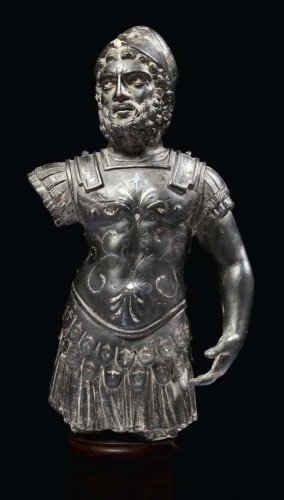
Le concept d'hégémonie dans le réalisme
Aleksandr Douguine
Source: https://www.geopolitika.ru/pl/article/pojecie-hegemonii-w-realizmie
L'aspect le plus important de la théorie du monde multipolaire (TMM) est le concept de contre-hégémonie formulé pour la première fois dans le contexte de la théorie critique des relations internationales (RI). Dans la transition de la Théorie critique à la Théorie du monde multipolaire, ce concept est également soumis à un sens particulier de la transformation qui devrait être examiné plus en détail. Pour qu'une telle analyse soit possible, il est d'abord nécessaire de rappeler les principales positions de la théorie de l'hégémonie au sein de la Théorie critique.
Bien que le concept d'hégémonie dans la Théorie critique soit basé sur la théorie d'Antonio Gramsci, il est nécessaire de distinguer la position de ce concept par rapport au gramscisme et au néo-gramscisme de la façon dont il est compris dans les écoles réalistes et néo-réalistes de RI.
Les réalistes classiques utilisent le terme "hégémonie" dans un sens relatif et le comprennent comme "la supériorité réelle et substantielle de la puissance potentielle d'un État sur celle d'un autre, souvent des États voisins". L'hégémonie peut être comprise comme un phénomène régional, puisque la détermination de l'hégémonie de telle ou telle entité politique dépend de l'échelle. Thucydide lui-même a introduit le terme lorsqu'il a parlé d'Athènes et de Sparte comme des hégémons de la guerre du Péloponnèse, et le réalisme classique a utilisé le terme de la même manière jusqu'à aujourd'hui. Cette conception de l'hégémonie peut être décrite comme "stratégique" ou "relative".
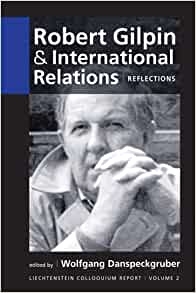 Dans le néoréalisme, l'"hégémonie" est comprise dans un contexte global (structurel). La principale différence avec le réalisme classique est que l'"hégémonie" ne peut être considérée comme un phénomène régional. Elle a toujours un caractère global. Par exemple, le néoréalisme de K. Waltz soutient que l'équilibre de deux hégémonies (dans un monde bipolaire) est la structure optimale de l'équilibre des pouvoirs à l'échelle mondiale. R. Gilpin estime que l'hégémonie ne peut être combinée qu'avec l'unipolarité, c'est-à-dire qu'il n'est possible d'avoir qu'un seul hégémon, ce qui est la fonction des États-Unis aujourd'hui.
Dans le néoréalisme, l'"hégémonie" est comprise dans un contexte global (structurel). La principale différence avec le réalisme classique est que l'"hégémonie" ne peut être considérée comme un phénomène régional. Elle a toujours un caractère global. Par exemple, le néoréalisme de K. Waltz soutient que l'équilibre de deux hégémonies (dans un monde bipolaire) est la structure optimale de l'équilibre des pouvoirs à l'échelle mondiale. R. Gilpin estime que l'hégémonie ne peut être combinée qu'avec l'unipolarité, c'est-à-dire qu'il n'est possible d'avoir qu'un seul hégémon, ce qui est la fonction des États-Unis aujourd'hui.
Dans les deux cas, les réalistes comprennent l'hégémonie comme un moyen de corrélation potentielle entre les potentiels des différents pouvoirs étatiques.
La compréhension de l'hégémonie par Gramsci est tout à fait différente et se situe dans un champ théorique complètement opposé. Afin d'éviter la mauvaise utilisation du terme dans la RI et surtout dans la TMM, il est nécessaire de prêter attention à la théorie politique de Gramsci, dont le contexte est considéré comme une priorité majeure dans la théorie critique et la TMM. En outre, une telle analyse nous permettra de voir plus clairement le fossé conceptuel entre la théorie critique et le TMM.
Hola
16:53 Publié dans Définitions, Nouvelle Droite, Théorie politique | Lien permanent | Commentaires (0) | Tags : relations internationale, multipolarité, hégémonie, hégémonisme, alexandre douguine, nouvelle droite, nouvelle droite russe |  |
|  del.icio.us |
del.icio.us |  |
|  Digg |
Digg | ![]() Facebook
Facebook
mercredi, 06 avril 2022
La Stratégie du Heartland à l'Est : un aperçu des objectifs et des priorités
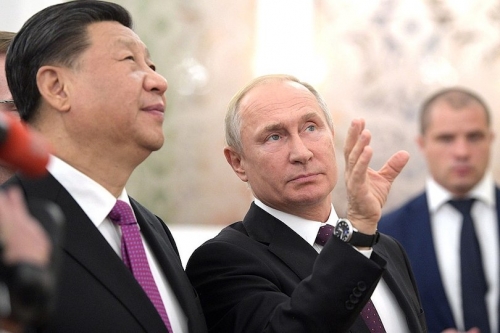
La Stratégie du Heartland russe à l'Est: un aperçu des objectifs et des priorités
Alexandre Douguine
Source: https://www.ideeazione.com/la-strategia-orientale-dellheartland-una-panoramica-degli-obiettivi-e-delle-priorita/
Axe Moscou-New Delhi
Déplaçons-nous vers l'est. Nous voyons ici l'Inde comme un "grand espace" à part entière, qui, à l'époque du Grand Jeu, était la principale tête de pont de la domination britannique en Asie. À cette époque, la nécessité de maintenir le contrôle de l'Inde et d'empêcher d'autres puissances, notamment l'Empire russe, d'empiéter sur le contrôle britannique de la région était essentielle pour la "civilisation de la mer". À cela s'ajoutent les épopées afghanes des Britanniques, qui ont cherché à plusieurs reprises à affirmer leur contrôle sur la structure complexe de la société afghane non gouvernée, précisément pour bloquer les Russes dans une éventuelle campagne en Inde. Une telle perspective est théorisée depuis l'époque de l'empereur Paul Ier, qui a virtuellement lancé une campagne cosaque (organisée et planifiée de manière quelque peu naïve) en Inde (en alliance avec les Français), ce qui pourrait être la raison de son assassinat (qui, comme le montrent les historiens, a été organisé par l'ambassadeur britannique en Russie, Lord Whitworth).
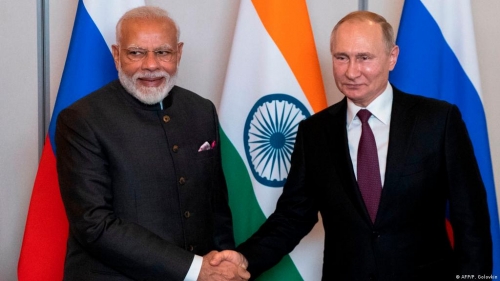
L'Inde mène actuellement une politique de neutralité stratégique, mais sa société, sa culture, sa religion et son système de valeurs n'ont rien en commun avec le projet mondialiste ou le mode de vie de l'Europe occidentale. La structure de la société hindoue est entièrement terrestre, basée sur des constantes qui ont très peu changé au cours des millénaires. Par ses paramètres (démographie, niveau de développement économique moderne, culture intégrale), l'Inde représente un "grand espace" complet, qui est organiquement inclus dans la structure multipolaire. Les relations russo-indiennes après la libération de l'Inde des Britanniques ont traditionnellement été très cordiales. Dans le même temps, les dirigeants indiens ont souligné à plusieurs reprises leur engagement en faveur d'un ordre mondial multipolaire. En même temps, la société indienne elle-même illustre la multipolarité où la diversité des groupes ethniques, des cultes, des cultures locales, des courants religieux et philosophiques s'entendent parfaitement bien malgré leurs profondes différences et même leurs contradictions. L'Inde est certainement une civilisation qui, au vingtième siècle, après la fin de la phase de colonisation, a acquis - pour des raisons pragmatiques - le statut d'"État-nation".
Dans ces circonstances favorables au projet multipolaire, qui font de l'axe Moscou-New Delhi une autre structure de soutien pour l'expression spatiale de la pan-idée eurasienne, un certain nombre de circonstances compliquent ce processus. Par inertie historique, l'Inde continue à entretenir des liens étroits avec le monde anglo-saxon, qui, pendant la période de domination coloniale, a réussi à influencer de manière significative la société indienne et à projeter sur elle ses attitudes sociologiques formelles (notamment l'anglophilie). L'Inde est étroitement intégrée aux États-Unis et aux pays de l'OTAN dans le domaine militaro-technique et les stratèges atlantistes apprécient énormément cette coopération, car elle s'inscrit dans la stratégie de contrôle de la "zone côtière" de l'Eurasie. En même temps, la mentalité même de la société indienne rejette la logique des alternatives rigides de l'une ou l'autre, et il est difficile pour la mentalité hindoue de comprendre la nécessité d'un choix irréversible entre la Mer et la Terre, entre la mondialisation et la préservation d'une identité civilisée.
Au niveau régional, cependant, dans les relations avec ses voisins immédiats - en particulier la Chine et le Pakistan - la pensée géopolitique indienne fonctionne beaucoup mieux et cela devrait être utilisé pour intégrer l'Inde dans la construction multipolaire de la nouvelle architecture stratégique eurasienne.
La place naturelle de l'Inde est en Eurasie, où elle pourrait jouer un rôle stratégique comparable à celui de l'Iran. Mais le format de l'axe Moscou-New Delhi devrait être très différent, en tenant compte des spécificités de la stratégie et de la culture régionales de l'Inde. Dans le cas de l'Iran et de l'Inde, différents paradigmes d'intégration stratégique devraient être impliqués.
La structure géopolitique de la Chine
La structure géopolitique de la Chine est la question la plus importante. Dans le monde d'aujourd'hui, la Chine a si bien développé son économie, trouvant les proportions optimales entre le maintien du pouvoir politique d'un parti communiste réformé, les principes d'une économie libérale et l'utilisation mobilisatrice d'une culture chinoise commune (dans certains cas sous la forme d'un "nationalisme chinois"), que beaucoup lui attribuent le rôle d'un pôle mondial indépendant à l'échelle planétaire et préfigurent un futur "nouvel hégémon". En termes de potentiel économique, la Chine a été classée deuxième parmi les cinq premières économies du monde avec le PIB le plus élevé. Avec les États-Unis, l'Allemagne et le Japon, le pays a formé une sorte de club des principales puissances commerciales du monde. Les Chinois eux-mêmes appellent la Chine "Zhongguo", littéralement "le pays central, du milieu".
La Chine est une entité géopolitique complexe qui peut être divisée en plusieurs composantes principales :
- Chine continentale : les zones rurales pauvres et mal irriguées situées entre les fleuves Huanghe et Yangtze, habitées principalement par des groupes ethniques indigènes réunis par le terme "Han" ;
- les zones côtières de l'Est, qui sont des centres de développement économique et commercial national et des points d'accès au marché mondial.
- les zones tampons habitées par des minorités ethniques (région autonome de Mongolie intérieure, région autonome ouïghoure du Xinjiang, région autonome du Tibet)
- les États voisins et les zones administratives insulaires spéciales dont la population est majoritairement chinoise (Taïwan, Hong Kong, Macao).
Le problème de la géopolitique chinoise est le suivant : pour développer son économie, la Chine manque de demande intérieure (la pauvreté de la Chine continentale). L'accès au marché international par le développement de la zone côtière du Pacifique augmente considérablement le niveau de vie, mais crée des inégalités sociales entre la "côte" et le "continent", et favorise un plus grand contrôle extérieur par le biais des liens économiques et des investissements, ce qui menace la sécurité du pays. Au début du 20e siècle, ce déséquilibre a conduit à l'effondrement de l'État chinois, à la fragmentation du pays, à l'établissement virtuel d'un "contrôle externe" par la Grande-Bretagne et, enfin, à l'occupation des zones côtières par le Japon.
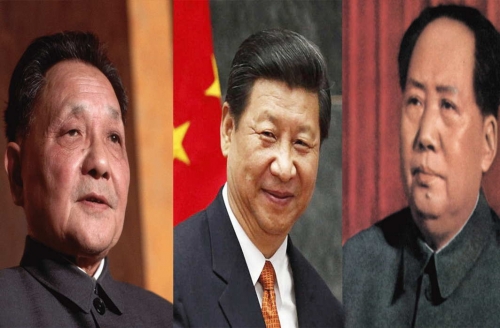
Mao Tse-tung (1893-1976) a choisi une autre voie : la centralisation du pays et sa fermeture complète. Cela a rendu la Chine indépendante, mais l'a condamnée à la pauvreté. À la fin des années 1980, Deng Xiaoping (1904-1997) a entamé un autre cycle de réformes, qui consistait à équilibrer le développement ouvert de la "zone côtière" et l'attraction des investissements étrangers dans cette région avec le maintien d'un contrôle politique strict de l'ensemble du territoire chinois aux mains du Parti communiste, afin de préserver l'unité du pays. C'est cette formule qui définit la fonction géopolitique de la Chine contemporaine.
L'identité de la Chine est double : il y a une Chine continentale et une Chine côtière. La Chine continentale est tournée vers elle-même et la préservation du paradigme social et culturel ; la Chine côtière est de plus en plus intégrée au "marché mondial" et, par conséquent, à la "société mondiale" (c'est-à-dire qu'elle adopte progressivement les traits de la "civilisation de la mer"). Ces contradictions géopolitiques ont été aplanies par le Parti communiste chinois (PCC), qui doit fonctionner dans le cadre du paradigme de Deng Xiaoping - l'ouverture assure la croissance économique, le centralisme rigide de l'idéologie et du parti, s'appuyant sur les zones rurales pauvres du continent, maintient l'isolement relatif de la Chine par rapport au monde extérieur. La Chine cherche à prendre de l'atlantisme et de la mondialisation ce qui la renforce, et à détacher et écarter ce qui l'affaiblit et la détruit. Jusqu'à présent, Pékin a réussi à maintenir cet équilibre, ce qui l'amène au leadership mondial, mais il est difficile de dire dans quelle mesure il est possible de combiner l'incompatible : mondialisation d'un segment de la société et préservation d'un autre segment sous le mode de vie traditionnel. La solution de cette équation extrêmement complexe prédéterminera le destin de la Chine dans le futur et, par conséquent, construira un algorithme pour son comportement.
En tout état de cause, la Chine d'aujourd'hui insiste fermement sur un ordre mondial multipolaire et s'oppose à l'approche unipolaire des États-Unis et des pays occidentaux dans la plupart des confrontations internationales. La seule menace sérieuse qui pèse aujourd'hui sur la sécurité de la Chine provient uniquement des États-Unis - la marine américaine dans le Pacifique pourrait à tout moment imposer un blocus sur l'ensemble du littoral chinois et ainsi faire s'effondrer instantanément l'économie chinoise, qui dépend entièrement des marchés étrangers. À cela s'ajoute la tension autour de Taïwan, un État puissant et prospère avec une population chinoise mais une société purement atlantiste intégrée dans un contexte mondial libéral.
Dans un modèle d'ordre mondial multipolaire, la Chine se voit attribuer le rôle du pôle Pacifique. Ce rôle serait une sorte de compromis entre le marché mondial dans lequel la Chine existe et se développe aujourd'hui, fournissant une part énorme de ses biens industriels, et sa fermeture totale. Ceci est globalement cohérent avec la stratégie de la Chine qui consiste à essayer de maximiser son potentiel économique et technologique avant l'inévitable affrontement avec les États-Unis.
Le rôle de la Chine dans un monde multipolaire
Il existe un certain nombre de problèmes entre la Russie et la Chine qui pourraient entraver la consolidation des efforts visant à construire une construction multipolaire. L'une d'elles est l'expansion démographique des Chinois dans les territoires peu peuplés de Sibérie, qui menace de modifier radicalement la structure sociale même de la société russe et constitue une menace directe pour la sécurité. Sur cette question, une condition préalable à un partenariat équilibré devrait être un contrôle strict par les autorités chinoises des flux migratoires vers le nord.
La deuxième question concerne l'influence de la Chine en Asie centrale, une zone stratégique proche de la Russie, riche en ressources naturelles et en vastes territoires, mais plutôt faiblement peuplée. L'avancée de la Chine en Asie centrale pourrait également constituer un obstacle. Ces deux tendances violent un principe important de la multipolarité : l'organisation de l'espace sur un axe nord-sud et non l'inverse. La direction dans laquelle la Chine a toutes les raisons de se développer est celle du Pacifique, au sud de la Chine. Plus la présence stratégique de la Chine dans cette région sera forte, plus la structure multipolaire sera forte.
Le renforcement de la présence de la Chine dans le Pacifique entre directement en collision avec les plans stratégiques de l'Amérique pour l'hégémonie mondiale, car dans une perspective atlantiste, la sécurisation du contrôle des océans du monde est la clé de l'ensemble du tableau stratégique du monde vu des États-Unis. La marine américaine dans le Pacifique et le déploiement de bases militaires stratégiques dans différentes parties du Pacifique et sur l'île de San Diego dans l'océan Indien afin de contrôler l'espace maritime de toute la région sera le principal enjeu de la réorganisation de la zone Pacifique sur le modèle d'un ordre mondial multipolaire. La libération de cette zone des bases militaires américaines peut être considérée comme une tâche d'importance planétaire.
La géopolitique du Japon et son éventuelle implication dans le projet multipolaire
La Chine n'est pas le seul pôle dans cette partie du monde. Le Japon est une puissance régionale asymétrique mais économiquement comparable. Société terrestre et traditionnelle, le Japon est passé sous occupation américaine après 1945 à la suite de la Seconde Guerre mondiale, dont les conséquences stratégiques se font encore sentir aujourd'hui. Le Japon n'est pas indépendant dans sa politique étrangère ; il y a des bases militaires américaines sur son territoire, et son importance militaire et politique est négligeable par rapport à son potentiel économique. Pour le Japon, d'un point de vue théorique, la seule voie organique de développement serait de rejoindre le projet multipolaire, ce qui implique :
- L'établissement d'un partenariat avec la Russie (avec laquelle aucun traité de paix n'a encore été conclu - une situation soutenue artificiellement par les États-Unis, qui craignent un rapprochement entre la Russie et le Japon) ;
- restaurer sa puissance militaire et technique en tant que puissance souveraine ;
- une participation active à la réorganisation de l'espace stratégique dans le Pacifique ;
- devenant le deuxième pôle, avec la Chine, de l'ensemble de l'espace Pacifique.
Pour la Russie, le Japon était le partenaire optimal en Extrême-Orient car, démographiquement, contrairement à la Chine, il n'a pas de problèmes de ressources naturelles (ce qui permettrait à la Russie d'accélérer l'équipement technologique et social de la Sibérie au Japon) et il dispose d'une énorme puissance économique, y compris dans le domaine de la haute technologie, qui est stratégiquement important pour l'économie russe. Mais pour qu'un tel partenariat soit possible, le Japon doit faire le pas décisif de se libérer de l'influence américaine.
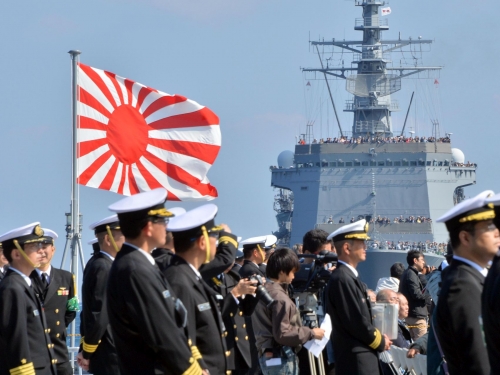
Sinon (comme dans la situation actuelle), les États-Unis considéreront le Japon comme un simple outil dans leur politique visant à contenir le mouvement potentiel de la Chine et de la Russie dans le Pacifique. Brzezinski plaide à juste titre en ce sens dans son livre The Grand Chessboard, où il décrit la stratégie américaine optimale dans le Pacifique. Ainsi, cette stratégie prône un rapprochement commercial et économique avec la Chine (parce que la Chine est entraînée dans la "société mondiale" par son intermédiaire), mais insiste pour construire un bloc stratégico-militaire contre elle. Avec le Japon, au contraire, Bzezinski propose de construire un "partenariat" militaro-stratégique contre la Chine et la Russie (en fait, il ne s'agit pas d'un "partenariat", mais d'une utilisation plus active du territoire japonais pour le déploiement d'installations militaro-stratégiques américaines) et de se livrer à une concurrence acharnée dans la sphère économique, car les entreprises japonaises sont capables de relativiser la domination économique américaine à l'échelle mondiale.
L'ordre mondial multipolaire évalue légitimement la situation de manière exactement inverse : l'économie libérale de la Chine ne vaut rien en soi et ne fait qu'accroître la dépendance de la Chine à l'égard de l'Occident, tandis que sa puissance militaire - surtout dans le segment naval - est au contraire précieuse car elle crée les conditions préalables pour débarrasser à l'avenir les océans Pacifique et Indien de la présence américaine. Le Japon, au contraire, est surtout attrayant en tant que puissance économique qui rivalise avec les économies occidentales et qui a maîtrisé les règles du marché mondial (on espère qu'à un moment donné, le Japon pourra utiliser cela à son avantage), mais il est moins attrayant en tant que partenaire dans un monde multipolaire, en tant qu'instrument passif de la stratégie américaine. Dans tous les cas, le scénario optimal serait que le Japon se libère du contrôle américain et entre dans une orbite géopolitique indépendante. Dans ce cas, il serait difficile d'imaginer un meilleur candidat pour construire un nouveau modèle d'équilibre stratégique dans le Pacifique.
Actuellement, compte tenu du statu quo, la place du "pôle" Pacifique peut être réservée à deux puissances - la Chine et le Japon. Tous deux ont de solides arguments pour être le leader ou l'un des deux leaders, substantiellement supérieur à tous les autres pays de la région d'Extrême-Orient.
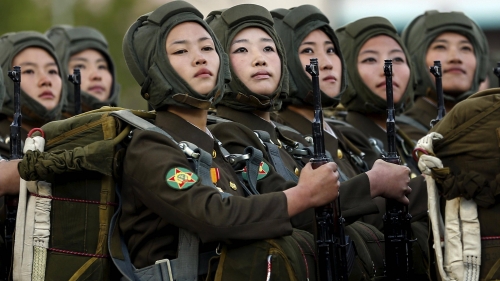
La Corée du Nord comme exemple de l'autonomie géopolitique d'un État terrestre
Il convient de souligner le facteur de la Corée du Nord, un pays qui n'a pas succombé à la pression occidentale et qui continue à rester fidèle à son ordre sociopolitique très spécifique (juché) malgré toutes les tentatives de le renverser, de le discréditer et de le diaboliser. La Corée du Nord illustre la résistance courageuse et efficace à la mondialisation et à l'unipolarité par un peuple assez petit, et c'est là que réside sa grande valeur. Une Corée du Nord nucléaire qui maintient une identité sociale et ethnique et une réelle indépendance, avec un niveau de vie modeste et un certain nombre de restrictions à la "démocratie" (comprise dans le sens libéral et bourgeois), contraste fortement avec la Corée du Sud. La Corée du Sud perd rapidement son identité culturelle (la plupart des Sud-Coréens appartiennent à des sectes protestantes, par exemple) et est incapable de faire un seul pas en politique étrangère sans se référer aux États-Unis, mais sa population est plus ou moins prospère (financièrement, mais pas psychologiquement). Le drame moral du choix entre indépendance et confort, dignité et bien-être, fierté et prospérité se joue dans deux parties d'un peuple historiquement et ethniquement unifié. La partie nord-coréenne illustre les valeurs du Sushi. Celui de la Corée du Sud illustre les valeurs de la mer. Rome et Carthage, Athènes et Sparte. Béhémoth et Léviathan dans le contexte de l'Extrême-Orient moderne.
Les principaux défis au Heartland russe à l'Est
Le vecteur oriental (Extrême-Orient, Asie) du Heartland russe peut être réduit aux tâches principales suivantes :
- Assurer la sécurité stratégique de la Russie sur la côte Pacifique et en Extrême-Orient ;
- Intégrer les territoires sibériens dans le contexte social, économique, technologique et stratégique global de la Russie (en tenant compte de l'état désastreux de la démographie de la population russe)
- développer le partenariat avec l'Inde, y compris dans le domaine militaro-technique (l'axe Moscou-New Delhi)
- construire une relation équilibrée avec la Chine, en soutenant ses politiques multipolaires et ses aspirations à devenir une puissante puissance navale, mais en prévenant les conséquences négatives de l'expansion démographique de la population chinoise dans le nord et de l'infiltration de l'influence chinoise au Kazakhstan ;
- Encourager par tous les moyens possibles l'affaiblissement de la présence navale américaine dans le Pacifique en démantelant les bases navales et autres installations stratégiques ;
- Encourager le Japon à se libérer de l'influence américaine et à devenir une puissance régionale à part entière, établissant ainsi un partenariat stratégique sur l'axe Moscou-Tokyo ;
- Soutenir les puissances régionales d'Extrême-Orient qui défendent leur indépendance vis-à-vis de l'atlantisme et de la mondialisation (Corée du Nord, Vietnam et Laos).
18:51 Publié dans Actualité, Eurasisme, Géopolitique | Lien permanent | Commentaires (0) | Tags : actualité, eurasisme, asie, affaires asiatiques, russie, chine, japon, océan pacifique, inde, océan indien, géopolitique, politique internationale, alexandre douguine |  |
|  del.icio.us |
del.icio.us |  |
|  Digg |
Digg | ![]() Facebook
Facebook
mardi, 05 avril 2022
Martin Heidegger, la Russie et la philosophie politique
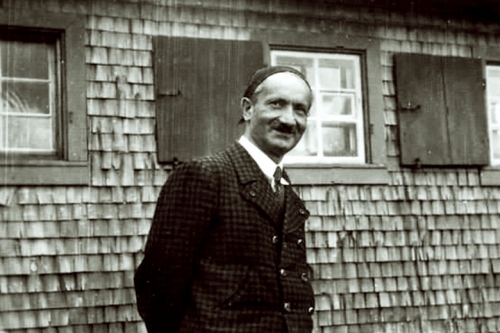
Martin Heidegger, la Russie et la philosophie politique
Leonid Savin
Source: https://www.geopolitica.ru/it/article/martin-heidegger-russia-e-filosofia-politica
Les œuvres de Martin Heidegger ont récemment fait l'objet d'un intérêt accru dans plusieurs pays. Si les interprétations de ses textes varient considérablement, il est intéressant de constater que l'héritage de Heidegger est constamment critiqué par les libéraux, quel que soit le lieu et l'objet de la critique, qu'il s'agisse du travail de Heidegger en tant que professeur d'université, de son intérêt pour la philosophie de la Grèce antique et des interprétations connexes de l'antiquité, ou de sa relation avec le régime politique en Allemagne avant et après 1945. On a l'impression que les libéraux s'efforcent intentionnellement de diaboliser Heidegger et ses œuvres, mais la profondeur et l'ampleur de la pensée de ce philosophe allemand ne leur laissent aucun répit. Il est clair que c'est parce que les idées de Heidegger sont porteuses d'un message pertinent pour la création d'un projet contre-libéral qui peut être réalisé sous les formes les plus diverses. C'est l'idée du "Dasein" appliquée à une perspective politique. Nous en parlerons plus en détail ci-dessous, mais il est d'abord nécessaire d'entreprendre une brève excursion dans l'histoire de l'étude des idées de Martin Heidegger en Russie.
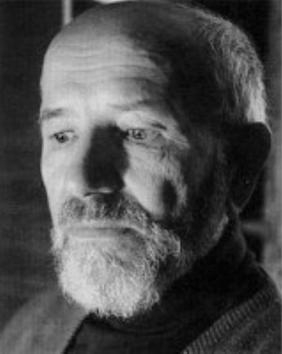 En Union soviétique, les idées de Martin Heidegger n'étaient pas connues du grand public, principalement parce que l'apogée de ses activités a coïncidé avec le régime nazi en Allemagne. Heidegger lui-même, comme de nombreux idéologues de la révolution conservatrice en Allemagne, a critiqué de nombreux aspects du national-socialisme, mais à l'époque soviétique, toute philosophie qui ne suivait pas la tradition marxiste était traitée comme bourgeoise, fausse et nuisible. La seule exception est peut-être le travail de Vladimir Bibikhin (photo), bien que ses traductions de "L'Être et le temps" et d'autres ouvrages de Heidegger n'aient été publiées en Russie qu'après l'effondrement de l'Union soviétique. En outre, ces traductions ont été critiquées à plusieurs reprises pour leur approche trop simpliste, leurs interprétations terminologiques incorrectes, leurs erreurs linguistiques, etc. Les cours de Bibikhin sur le premier Heidegger à l'Université d'État de Moscou n'ont été dispensés qu'en 1990-1992, c'est-à-dire à la fin de la Perestroïka, lorsque les horizons de ce qui était autorisé en URSS s'élargissaient. Cela dit, il convient de noter qu'un cercle de partisans des idées de Martin Heidegger s'était formé dans la sphère universitaire à Moscou dès les années 1980. Une situation similaire est apparue à Saint-Pétersbourg, qui s'est ensuite manifestée dans les activités de traduction et d'édition.
En Union soviétique, les idées de Martin Heidegger n'étaient pas connues du grand public, principalement parce que l'apogée de ses activités a coïncidé avec le régime nazi en Allemagne. Heidegger lui-même, comme de nombreux idéologues de la révolution conservatrice en Allemagne, a critiqué de nombreux aspects du national-socialisme, mais à l'époque soviétique, toute philosophie qui ne suivait pas la tradition marxiste était traitée comme bourgeoise, fausse et nuisible. La seule exception est peut-être le travail de Vladimir Bibikhin (photo), bien que ses traductions de "L'Être et le temps" et d'autres ouvrages de Heidegger n'aient été publiées en Russie qu'après l'effondrement de l'Union soviétique. En outre, ces traductions ont été critiquées à plusieurs reprises pour leur approche trop simpliste, leurs interprétations terminologiques incorrectes, leurs erreurs linguistiques, etc. Les cours de Bibikhin sur le premier Heidegger à l'Université d'État de Moscou n'ont été dispensés qu'en 1990-1992, c'est-à-dire à la fin de la Perestroïka, lorsque les horizons de ce qui était autorisé en URSS s'élargissaient. Cela dit, il convient de noter qu'un cercle de partisans des idées de Martin Heidegger s'était formé dans la sphère universitaire à Moscou dès les années 1980. Une situation similaire est apparue à Saint-Pétersbourg, qui s'est ensuite manifestée dans les activités de traduction et d'édition.
À partir de la fin des années 1990, d'autres œuvres de ce penseur allemand ont commencé à être traduites et publiées. La qualité des traductions s'est considérablement améliorée (et a été réalisée par plusieurs auteurs) et l'héritage de Heidegger a commencé à être enseigné dans plusieurs universités russes. Les principaux concepts philosophiques de Heidegger sont devenus objets d'étude obligatoires pour les étudiants des facultés de philosophie. Toutefois, l'étude des idées philosophiques ne signifie pas que les étudiants deviendront des philosophes ou qu'ils feront appel à certains concepts de ce type en ce qui concerne les processus politiques. Platon et Aristote sont étudiés dans les écoles depuis le début, mais qui est sérieux lorsqu'il s'agit d'utiliser les idées de ces anciens philosophes grecs pour discuter de questions sociopolitiques aujourd'hui ?
L'intérêt pour les idées de Martin Heidegger dans le contexte de la politique russe a été déclenché au début des années 2000 par divers articles et présentations du philosophe et géopoliticien russe Alexandre Douguine.
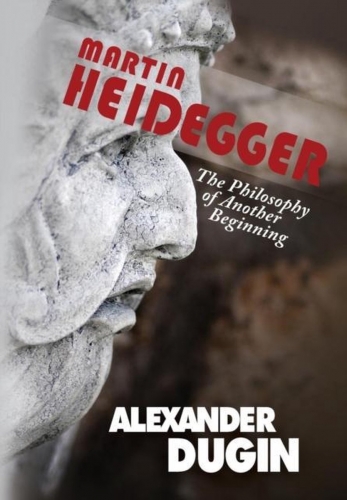
Par la suite, ces matériaux ont été systématisés et présentés dans des textes volumineux. En 2010, la maison d'édition "Academic Project" a publié le livre d'Alexandre Douguine "Martin Heidegger : la philosophie d'un autre commencement" qui a été logiquement suivi l'année suivante par "Martin Heidegger : la possibilité d'une philosophie russe". En 2014, les deux ouvrages ont été publiés par le même éditeur en un seul volume intitulé "Martin Heidegger : le dernier Dieu". L'interprétation des idées de Heidegger par Douguine est liée à l'histoire des idées russes, au christianisme orthodoxe et à une voie particulière de développement de l'État, y compris la théorie de l'eurasianisme.
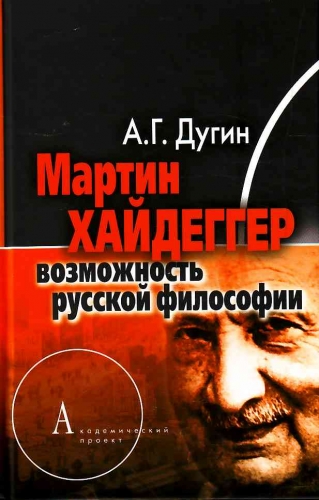
Inutile de dire qu'il serait insensé de relater la doctrine philosophique de Heidegger dans une courte publication dans un journal. Des centaines de volumes comprenant des œuvres entières, des conférences et des journaux intimes ont été publiés rien qu'en Allemagne. Pour notre propos, concentrons-nous uniquement sur quelques dispositions qui, à notre avis, sont applicables dans un contexte politique.
Tout d'abord, il convient de noter que Heidegger a utilisé de nombreux néologismes pour décrire le déroulement du temps et de l'être. L'un de ces concepts clés est le Dasein, que l'on traduit souvent par "être-là". Le philosophe français Henry Corbin a traduit ce terme par "réalité humaine", mais pour une compréhension authentique et complète, il est préférable de ne pas traduire ce terme et bien d'autres de Heidegger. Ils doivent être donnés dans l'original avec quelque chose de similaire dans la langue maternelle de chacun. Par exemple, das Man (le "on") exprime un Dasein inauthentique qui est tombé dans la banalité, alors que dans l'existant authentique, le Dasein a la propriété d'être face à la mort - Sein zum Tode - qui représente la terreur essentielle. La terreur s'oppose à la crainte, qui imprègne le monde de choses extérieures et le monde intérieur de préoccupations vides. Il est intéressant de noter ici le fait que la politique occidentale moderne et le libéralisme en tant que tel sont construits sur la peur. Cette tendance remonte à plusieurs siècles et est directement liée à la formation de la philosophie occidentale (européenne).
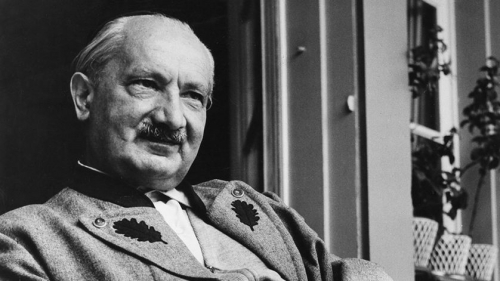
Ajoutons qu'une autre des propriétés du Dasein est la spatialité, puisque l'espace est dépendant du Dasein, alors que d'autre part il n'est pas fonction du temps. Le Dasein existe conditionnellement entre l'externe et l'interne, le passé et le présent, la marge et l'instant. Le Dasein a des paramètres existentiels : être-dans-le-monde (In-der-Welt-Sein), être-avec (Mit-sein), se soucier (die Sorge), le jeté-là (Geworfenheit), Befindlichkeit (syntonie, sofindingness, disposition), peur (Furcht), compréhension (Verstehen), parole (Rede) et humeur (Stimmung).
Un autre élément important de la philosophie de Heidegger est le "quadruple" (Geviert) comprenant le Ciel, les Déités, la Terre et les Mortels - qui sont représentés de la manière suivante : le Ciel en haut à gauche, les Déités (immortels) en haut à droite, les Mortels (personnes) en bas à gauche et la Terre en bas à droite. Un axe passe entre le peuple et les dieux et un autre entre le Ciel et la Terre. Le centre du "quadruple" est le modus le plus authentique de l'existence du Dasein.
Il convient également de noter que Heidegger fait une distinction entre le passé et ce qui est passé, entre le présent et ce qui est maintenant, et entre le futur et ce qui est imminent. Le Dasein, selon Heidegger, doit faire un choix fondamental entre l'imminent et le futur, c'est-à-dire le choix de l'existence authentique et de la confrontation directe (Seyn). Alors l'imminent deviendra l'avenir. Si le Dasein choisit l'existence inauthentique, alors l'imminent ne sera qu'imminent et ne verra donc pas le jour.
En détaillant tous ces éléments de la philosophie de Heidegger, Alexandre Douguine pose une question : peut-on parler d'un Dasein russe spécifique ? Quelles sont ses existences ? En quoi diffère-t-il du Dasein européen ? Douguine en arrive à la conclusion qu'il existe un Dasein russe particulier, et pas seulement russe, car au cœur de chaque civilisation, il existe une "présence pensante" particulière, le Dasein, qui détermine la structure du Logos d'une civilisation donnée. Il s'ensuit que chaque peuple (civilisation) possède son propre ensemble spécial d'existentiels.
Et c'est ici que nous pouvons trouver la dimension politique du Dasein telle que Douguine la voit dans le concept proposé de la Quatrième théorie politique.
Douguine s'est concentré sur trois théories politiques déclarées universelles : le libéralisme, le marxisme et le fascisme (national-socialisme). Tous ont leur propre sujet d'histoire.
L'expérience historique a montré que le monde libéral occidental a tenté d'imposer sa volonté à tous les autres par la force. Selon cette idée, tous les systèmes publics sur Terre sont des variantes du système libéral occidental [1] et leurs caractéristiques distinctives devraient disparaître avant que la conclusion de cette ère mondiale n'approche [2].
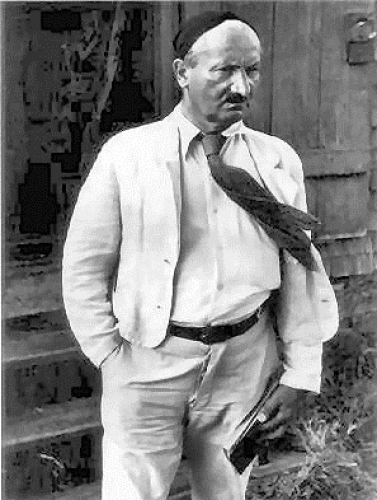
Jean Baudrillard affirme également qu'il ne s'agit pas d'un choc des civilisations, mais d'une résistance quasi innée entre une culture homogène universelle et ceux qui résistent à cette mondialisation [3].
Outre le libéralisme, deux autres idéologies sont connues pour avoir tenté d'atteindre la suprématie mondiale : le communisme (c'est-à-dire le marxisme sous ses différents aspects) et le fascisme/socialisme national. Comme le fait très bien remarquer Alexandre Douguine, le fascisme est apparu après ces deux idéologies et a disparu avant elles. Après la désintégration de l'URSS, le marxisme né au XIXe siècle a également été définitivement discrédité. Le libéralisme basé principalement sur l'individualisme et une société atomistique, les droits de l'homme et l'État Léviathan décrit par Hobbes est apparu à cause du bellum omnium contra omnes [4] et a perduré pendant longtemps.
Il est ici nécessaire d'analyser la relation de ces idéologies dans les contextes des époques et des lieux temporaires dont elles sont issues.
Nous savons que le marxisme était une idée plutôt futuriste : le marxisme prophétisait la victoire future du communisme dans une époque qui restait néanmoins incertaine. En ce sens, il s'agit d'une doctrine messianique, étant donné le caractère inévitable de sa victoire qui marquerait l'aboutissement et la fin du processus historique. Mais Marx était un faux prophète et la victoire n'a jamais eu lieu.
Le national-socialisme et le fascisme, au contraire, ont essayé de recréer l'abondance d'un âge d'or mythique, mais avec une forme moderniste [5]. Le fascisme et le national-socialisme étaient des tentatives d'inaugurer un nouveau cycle du temps, jetant les bases d'une nouvelle civilisation à la suite de ce qui était considéré comme un déclin culturel et la mort de la civilisation occidentale (d'où très probablement l'idée du Reich millénaire). Cette approche a également été abandonnée.
Le libéralisme (comme le marxisme) a proclamé la fin de l'histoire, décrite de manière très convaincante par Francis Fukuyama (The End of History and the Last Man) [6]. Cette fin n'a cependant jamais eu lieu et nous avons plutôt une "société de l'information" nomade composée d'individus égoïstes atomisés [7] qui consomment avidement les fruits de la techno-culture. De plus, de formidables effondrements économiques se produisent partout dans le monde ; des conflits violents ont lieu (de nombreux soulèvements locaux, mais aussi des guerres à long terme à l'échelle internationale), et c'est donc la déception qui domine notre monde plutôt que l'utopie universelle promise au nom du "progrès" [8].
À partir d'une telle perspective historique, il est possible de comprendre les liens entre l'émergence d'une idéologie au sein d'une époque historique particulière ; ou ce que l'on a appelé le zeitgeist ou "l'esprit d'une époque".
Le fascisme et le national-socialisme voyaient le fondement de l'histoire dans l'État (fascisme) ou la race (national-socialisme d'Hitler). Pour le marxisme, il s'agissait de la classe ouvrière et des relations économiques entre les classes. Le libéralisme, quant à lui, voit l'Histoire sous l'angle de l'individu atomisé, détaché d'un complexe d'héritage culturel et de contacts et communications inter-sociaux. Cependant, personne n'a considéré comme sujet d'histoire le Peuple en tant qu'Être, avec toute la richesse des liens interculturels, des traditions, des caractéristiques ethniques et de la vision du monde.
Si nous considérons les différentes alternatives, même les pays nominalement "socialistes" ont adopté des mécanismes et des modèles libéraux qui ont exposé les régions ayant un mode de vie traditionnel à une transformation accélérée, à une détérioration et à un effacement total. La destruction par le marxisme de la paysannerie, de la religion et des liens familiaux sont des manifestations de cet effondrement des sociétés organiques traditionnelles, tant en Chine maoïste qu'en URSS sous Lénine et Trotsky.
Cette opposition fondamentale à la tradition incarnée à la fois par le libéralisme et le marxisme peut être comprise par la méthode d'analyse historique considérée plus haut : le marxisme et le libéralisme ont tous deux émergé du même zeitgeist dans le cas de ces doctrines, de l'esprit de l'argent [9].
Plusieurs tentatives de créer des alternatives au néolibéralisme sont désormais visibles : la politique chiite en Iran, où le principal objectif de l'État est d'accélérer l'arrivée du Mahdi, et la révision du socialisme en Amérique latine (les réformes en Bolivie sont particulièrement indicatives). Ces réponses antilibérales sont toutefois limitées aux frontières de l'État unique concerné.
La Grèce antique est la source de ces trois théories de philosophie politique. Il est important de comprendre qu'au début de la pensée philosophique, les Grecs se sont penchés sur la question primordiale de l'Être. Mais ils risquaient d'être obscurcis par les nuances de la relation plus compliquée entre l'être et la pensée, entre l'être pur (Seyn) et son expression dans l'existence (Seiende), entre l'être humain (Dasein) et l'être-en-soi (Sein) [10].
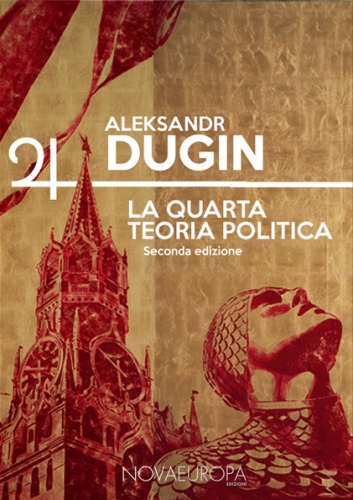
Il est intéressant de noter que trois vagues de mondialisation ont été les corollaires des trois théories politiques susmentionnées (marxisme, fascisme et libéralisme). Par conséquent, nous avons besoin après eux d'une nouvelle théorie politique, qui engendrerait la Quatrième Vague : le rétablissement de (chaque) Peuple avec ses valeurs éternelles. En d'autres termes, le Dasein sera l'objet de l'histoire. Et chaque peuple a son propre Dasein. Et bien sûr, après la nécessaire réflexion philosophique, il faut passer à l'action politique.
Poursuivons la discussion actuelle sur les idées de Heidegger en Russie dans le contexte de la politique. Il est significatif qu'en Russie, en 2016, les carnets de Heidegger, Réflexions II-VI, connus sous le nom de ses "Carnets noirs 1931-1938", aient été publiés par l'Institut Gaïdar - une organisation libérale que les cercles conservateurs russes considèrent comme un réseau d'agents de l'influence occidentale. Yegor Gaidar est l'auteur des réformes économiques libérales en Russie sous le président Eltsine et a occupé le poste de ministre des finances en 1992. Gaidar a également été Premier ministre par intérim de la Fédération de Russie et ministre de l'économie par intérim en 1993-1994. En raison de ses réformes, le pays a été soumis à l'inflation, la privatisation et de nombreux secteurs de l'économie ont été ruinés. Cette dernière œuvre de Heidegger est considérée comme sa plus politisée, dans laquelle il discute non seulement des catégories philosophiques, mais aussi du rôle des Allemands dans l'histoire, l'éducation et le projet politique du national-socialisme. Il est très probable que l'Institut Gaidar avait l'intention de discréditer les enseignements de Heidegger avec de telles publications, mais c'est le contraire qui s'est produit, car la publication des journaux intimes de Heidegger a suscité un intérêt général.
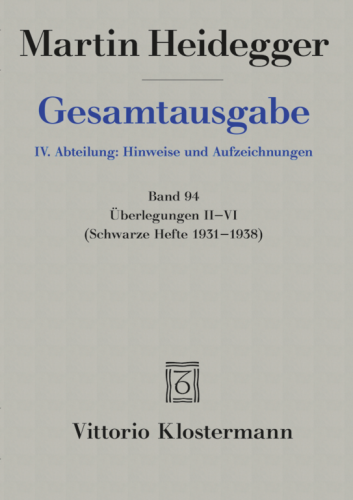
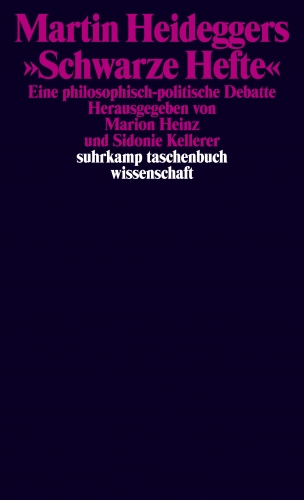
Paradoxalement, dans cet ouvrage, Heidegger critique le libéralisme de la manière suivante : "Le 'libéral' voit le 'lien' à sa manière. Il ne voit que des 'dépendances' - des 'influences', mais il ne comprend jamais qu'il peut y avoir une influence qui sert le véritable flux de base de tout et qui fournit un chemin et une direction" [11]. Nous présentons quelques autres citations de ce travail qui nous semblent intéressantes pour notre approche.
"La métaphysique du Dasein doit s'approfondir conformément à la structure plus intime de cette métaphysique et doit s'étendre à la métapolitique 'du' peuple historique." [12]
"La valeur du pouvoir découle de la grandeur du Dasein et le Dasein de la vérité de sa mission." [13]
"L'éducation : la réalisation effective et contraignante du pouvoir de l'État, en prenant ce pouvoir comme la volonté d'un peuple pour lui-même." [14]
"Le problème est un saut spécifiquement historique dans le Dasein. Ce saut ne peut être fait que comme une libération de ce qui est donné comme une dotation dans ce qui est donné comme une tâche." [15]
Comme l'a souligné Douguine, si le premier Heidegger supposait que le Dasein était quelque chose de donné, le Heidegger ultérieur a conclu que le Dasein est quelque chose qui doit être découvert, motivé et constitué. Pour ce faire, il est d'abord nécessaire de mener une démarche intellectuelle sérieuse (voir "Ce qu'on appelle penser" de Hedeigger).
Il est crucial de comprendre que, bien que les idées de Heidegger soient considérées comme une sorte d'aboutissement de la philosophie européenne (qui a commencé avec les Grecs anciens, un point symbolique en soi puisque Heidegger a construit ses hypothèses sur une analyse des philosophes de la Grèce antique), Heidegger est aussi souvent classé comme un penseur qui a transcendé l'eurocentrisme. Ainsi, même de son vivant, de nombreux concepts de Heidegger ont été repris dans des régions qui avaient développé des critiques de la philosophie à l'égard de l'héritage européen dans son ensemble. Par exemple, un énorme intérêt pour les œuvres de Heidegger a pu être constaté en Amérique latine au 20e siècle. Au Brésil, les œuvres de Heidegger ont été abordées par Vicente Ferreira da Silva, en Argentine par Carlos Astrada, Vicente Fantone, Enrique Dussel et Francisco Romero, au Venezuela par Juan David Garcia Bacca et en Colombie par Ruben Sierra Mejia. On en trouve une confirmation supplémentaire dans les propos du philosophe iranien Ahmad Fardid, selon lequel Heidegger peut être considéré comme une figure mondiale, et pas seulement comme un représentant de la pensée européenne. Étant donné que Fardid, connu pour son concept de Gharbzadegi, ou "intoxication occidentale", était un critique constant de la pensée occidentale, qui, selon lui, a contribué à l'émergence du nihilisme, une telle reconnaissance de Heidegger est assez révélatrice.
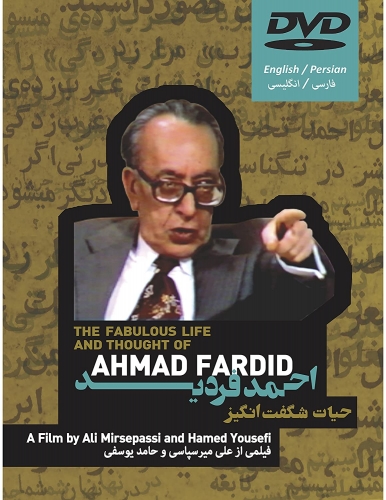
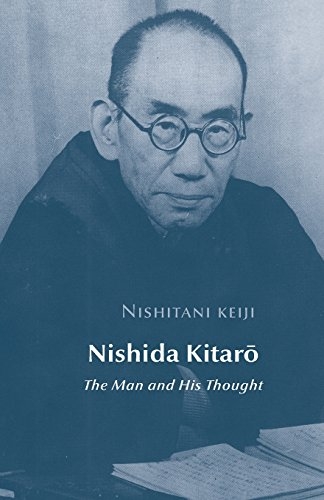
En effet, Heidegger avait des adeptes non seulement en Iran, mais aussi dans de nombreux pays asiatiques. Au Japon, dans les années 1930, Kitaro Nishida, un étudiant de Heidegger, a fondé l'école de philosophie de Kyoto. Bien qu'au Japon, Heidegger ait été largement considéré comme un porteur de l'esprit européen (à la suite des réformes Meiji, le Japon a été balayé par un enthousiasme excessif pour tout ce qui est européen, en particulier la culture et la philosophie allemandes), il est intéressant de noter que la notion d'"existence" de Heidegger a été reformulée dans un esprit bouddhiste comme "être véritable" (genjitsu sonzai) et que le "néant" a été interprété comme "vide" (shunya). En d'autres termes, les Japonais ont interprété les concepts fondamentaux de Martin Heidegger selon leurs propres concepts et ont souvent mélangé ses termes avec les concepts des existentialistes européens tels que Jean-Paul Sartre, Albert Camus et Gabriel Marcel. Un autre philosophe japonais, Keiji Nishitani, a adapté les idées de Heidegger aux modèles traditionnels orientaux, comme c'est souvent le cas en Orient. Des parallèles entre la philosophie orientale traditionnelle et l'analyse heideggérienne ont également été établis en Corée par Hwa Yol Jung.
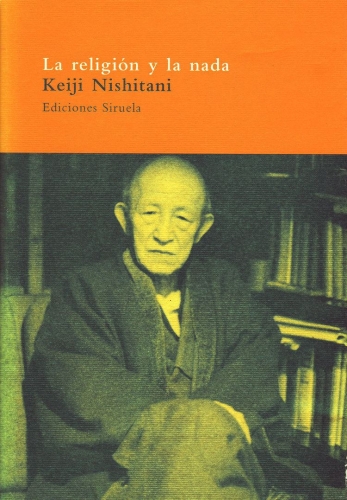
À cet égard, la Russie et l'étude de l'héritage de Martin Heidegger constituent une sorte de pont entre l'Europe et l'Orient, entre le rationalisme rigide qui subsume la conscience européenne depuis le Moyen Âge et la pensée contemplative abstraite caractéristique des peuples asiatiques. Disons même plus directement que l'eurasianisme et le heideggérisme sont en quelque sorte des tendances interconnectées et spirituellement proches parmi les courants idéologiques contemporains en Russie.
Bien que ces deux écoles puissent également être examinées en tant que doctrines philosophiques indépendantes, comme le font souvent les chercheurs laïques et les politologues opportunistes, une compréhension profonde de l'une ne peut être obtenue qu'en appréhendant l'autre.
Notes:
[1] Par exemple, l'insistance pour que tous les États et les peuples adoptent le système parlementaire anglais de Westminster comme modèle universel, sans tenir compte des anciennes traditions, structures sociales et hiérarchies.
[2] "Les droits de l'homme et le nouvel occidentalisme" dans "L'Homme et la société" (numéro spécial - 1987, page 9).
[3] Jean Baudrillard, "L'enfer du pouvoir", Paris : Galilée, 2002. Voir aussi, par exemple, Jean Baudrillard, "La violence du global".
http://www.ctheory.net/articles.aspx?id=385
[4] En italien : la guerra di tutti contro tutti.
[5] D'où la critique du national-socialisme et du fascisme par des droitiers traditionalistes tels que Julius Evola. Voir KR Bolton, "Thinkers of the Right" (Luton, 2003), p. 173.
[6] Francis Fukuyama "The End of History and the Last Man", Penguin Books, 1992.
[7] G Pascal Zachary, "The Global Me", NSW, Australie : Allen et Unwin, 2000.
[8] Clive Hamilton, "Affluenza : When Too Much is Never Enough", NSW, Australie : Allen and Unwin, 2005.
[9) C'est le sens de la déclaration de Spengler selon laquelle "C'est là que réside le secret de la raison pour laquelle tous les partis radicaux (c'est-à-dire pauvres) deviennent nécessairement les outils des puissances d'argent, des Equites, de la Bourse. Théoriquement, leur ennemi est le capital, mais en pratique, ils ne s'attaquent pas à la Bourse, mais à la Tradition au nom de la Bourse. Cela est aussi vrai aujourd'hui qu'à l'époque de Gracchus et dans tous les pays..." Oswald Spengler, "The Decline of the West" (Londres : George Allen & Unwin, 1971), vol. 2, p. 464.
[10] Voir Martin Heidegger sur ces termes.
[11] Martin Heidegger, " Ponderings II-VI : Black Notebooks 1931-1938 " (Bloomington, Indiana University Press, 2016), 28.
[12] Ibid, 91.
[13] Ibid, 83.
[14] Ibid, 89.
[15] Ibid, 173.
18:53 Publié dans Philosophie | Lien permanent | Commentaires (0) | Tags : philosophie, martibn heidegger, alexandre douguine, russie |  |
|  del.icio.us |
del.icio.us |  |
|  Digg |
Digg | ![]() Facebook
Facebook
vendredi, 01 avril 2022
Alexander Dugin : presque tous les secrets ont été révélés
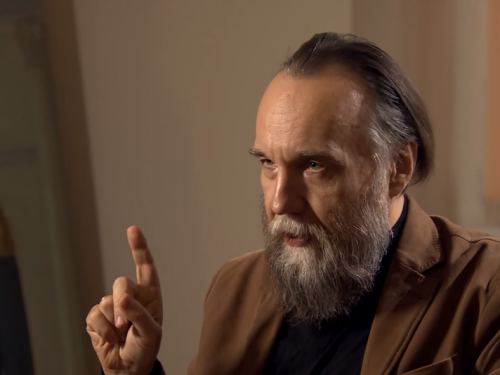
Alexander Dugin : presque tous les secrets ont été révélés
Alexander Dugin
Source: https://www.geopolitica.ru/article/aleksandr-dugin-pochti-vse-taynoe-stalo-yavnym
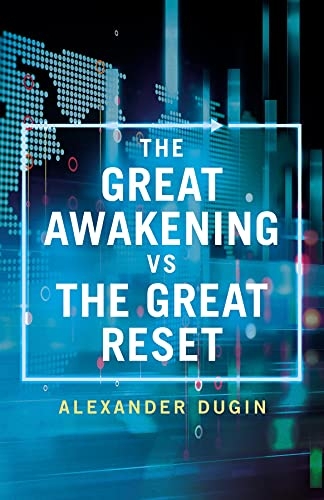 1) Votre livre Against the Great Reset vient d'être publié en Italie. Quel est le principal message de ce livre adressé au public italien ?
1) Votre livre Against the Great Reset vient d'être publié en Italie. Quel est le principal message de ce livre adressé au public italien ?
Ce livre est un aperçu général du libéralisme en tant que théorie et idéologie politique. Je me penche sur l'histoire du libéralisme depuis ses débuts - les courants protestants dans l'Europe du 16e siècle - jusqu'aux projets de gouvernement mondial, d'Open Society de Soros et de Great Reset de Klaus Schwab au Forum de Davos.
Le plan Great Reset représente l'aboutissement du libéralisme en tant qu'idéologie qui libère l'individu de toute forme d'identité collective. Cela a commencé une volonté de se libérer de l'Église (catholique), des successions dynastiques traditionnelles, puis des nations et des États, puis du genre (la fameuse politique du genre) et enfin de l'humanité, car être humain est aussi une identité collective. D'où la dernière phase : le passage au transhumanisme, la fusion des humains avec les machines, la migration totale vers le cyberespace et le transfert du contrôle aux réseaux neuronaux et à l'intelligence artificielle. Nous vivons aujourd'hui la phase finale du libéralisme qui s'est mondialisé. C'est le mondialisme et un monde unipolaire. Mais cela a commencé avec les débuts du Nouvel Âge, avec le capitalisme et le rejet de la société traditionnelle.
La Grande Réinitialisation est la fin d'un long voyage vers l'autodestruction de l'humanité.
Le Grand Réveil, que j'appelle de mes voeux, est la formation d'un pôle alternatif. Le but du Grand Réveil est que des personnes de cultures et de traditions différentes, qu'elles soient de droite ou de gauche, chrétiennes, musulmanes, juives, hindoues, bouddhistes ou confucéennes, concluent un pacte historique planétaire qui rejette l'agenda mondialiste. Au lieu d'un choc des différentes civilisations entre elles, Le Grand Réveil appelle à une alliance universelle contre le mal total qui menace toute l'humanité - contre Soros, Schwab, Bill Gates et l'oligarchie libérale mondiale.
C'est, en un mot, le sujet de ce livre.
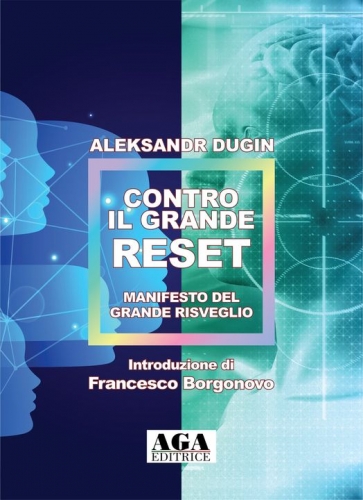 2) Peut-on parler d'une Troisième Russie en paraphrasant la formule de la Troisième Rome ?
2) Peut-on parler d'une Troisième Russie en paraphrasant la formule de la Troisième Rome ?
Une suggestion intéressante. L'écrivain patriote russe, qui est mon ami de longue date Alexandre Prokhanov, parle du Cinquième Empire. Mon dernier livre en russe s'intitule "La quatrième Russie". Selon moi, la première Russie - c'est l'ancienne Russie. La seconde est l'Empire des Romanov. La troisième est la Russie soviétique. La quatrième est celle qui doit être construite maintenant. C'est la Russie de l'avenir. Elle coïncide avec le Cinquième Empire de Prokhanov (qui distingue dans la Russie antique la période de Kiev et la période de Moscou). Mais toutes les étapes à partir de la seconde moitié du XVe siècle russe sont la Troisième Rome.
Telle est la dialectique complexe de notre histoire.
3) Quelle est la place de l'Inde dans la théorie du 4ème monde politique et multipolaire ?
L'Inde est certainement une civilisation à part entière. Elle a son propre Logos unique, son Dasein. L'Inde n'est pas un pays, c'est un monde, c'est une planète entière, un continent. La quatrième théorie politique, la 4PT, est construite sur le Dasein et ses structures existentielles internes. Ils s'additionnent pour former le Logos. En Inde, nous voyons les deux qui interagissent au fond - ce qui est parfait ! - nous avons donc les deux, un horizon existentiel distinctif et un système métaphysique religieux-philosophique développé - l'hindouisme. Ainsi, la présence du sujet dans la compréhension de la 4PT par l'Inde ne fait aucun doute. Tout ce qui compte, c'est d'achever le processus de décolonisation profonde et d'affirmer avec audace une identité hindoue proprement dite, en fondant sur elle l'ensemble de l'ordre traditionnel. C'est comme la venue du dixième Avatar de Kalki qui mettra fin au Kali Yuga, l'ère du chaos, de la dégénérescence et de la décadence.
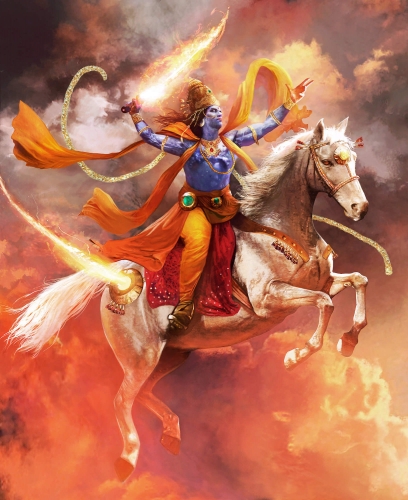
Par conséquent, dans un monde multipolaire, l'Inde deviendra certainement un pôle distinct de tous les autres.
Être un pôle signifie prendre des décisions pleinement souveraines.
Dans l'état actuel de transition d'un monde unipolaire à un monde multipolaire, l'Inde apparaît de plus en plus comme un tel pôle souverain. Et l'ensemble du système n'est plus seulement tripolaire - Occident, Russie, Chine ; mais quadripolaire - Occident, Russie, Chine, Inde. Je pense que c'est le moment le plus important de l'histoire moderne.
4) Nous savons que vous avez passé de nombreuses années à étudier l'œuvre de René Guénon. Dans quelle mesure cet auteur traditionaliste vous a-t-il influencé, vous et vos théories ?
Je dois tout à Guénon. Je suis avant tout un traditionaliste et pour moi, tous les points de confrontation entre la tradition et le monde moderne sont des principes irréfutables.
Une autre chose est que j'essaie d'appliquer les principes du traditionalisme à divers domaines que Guénon lui-même n'a pas abordés. Par conséquent, il peut parfois sembler que je me sois éloigné de ses idées. Ce n'est pas le cas. Je suis le guénonien le plus orthodoxe qui soit.
5) Êtes-vous d'accord que David Icke avait raison dans ses théories ? Existe-t-il encore un "secret le mieux gardé" ?
De mon point de vue, David Icke est un fou qui délire complètement. Mais le penseur cardinal que fut Carl Gustav Jung et ses collaborateurs ont parfaitement démontré que les structures du délire ne sont pas aléatoires ou arbitraires, mais expriment des lois profondes et des connexions archétypales de l'"inconscient collectif". David Icke ne peut être traité que comme un malade, apparemment complètement fou par tous ceux qui le prennent au sérieux. Cela dit, considérer ce qu'il dit en termes d'exploration de la cartographie de l'inconscient, où les archétypes sous-jacents surgissent de manière spontanée et chaotique, n'est probablement pas déraisonnable. Mais cela ne m'a jamais intéressé.
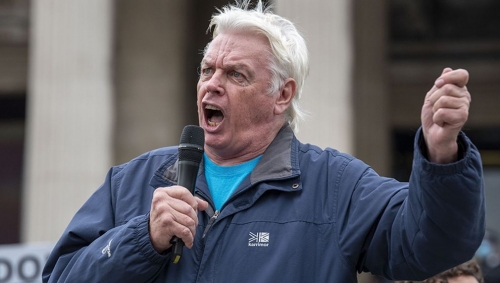
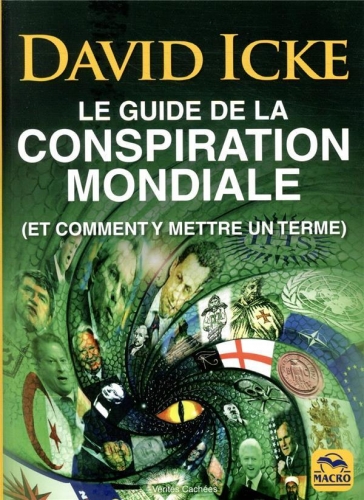
Quant au "secret bien gardé" de nos jours, beaucoup de choses auparavant secrètes deviennent ouvertes. Pendant longtemps, les élites libérales mondiales ont refusé d'admettre que leur objectif était un gouvernement mondial. Aujourd'hui, il en est question dans tous les manuels de relations internationales. Presque tout ce qui est secret est déjà devenu évident, il suffit de savoir lire et interpréter correctement les relevés. Mais cette qualité est de plus en plus rare. Nous savons tout, mais ne comprenons plus rien.
Alexandre Douguine
16:58 Publié dans Actualité, Entretiens, Nouvelle Droite | Lien permanent | Commentaires (1) | Tags : alexandre douguine, actualité, grande réinitialisation, nouvelle droite, nouvelle droite russe, russie, libéralisme, antilibéralisme |  |
|  del.icio.us |
del.icio.us |  |
|  Digg |
Digg | ![]() Facebook
Facebook
mardi, 22 mars 2022
L'opération Z et le caractère inévitable de la réforme politique en Russie même
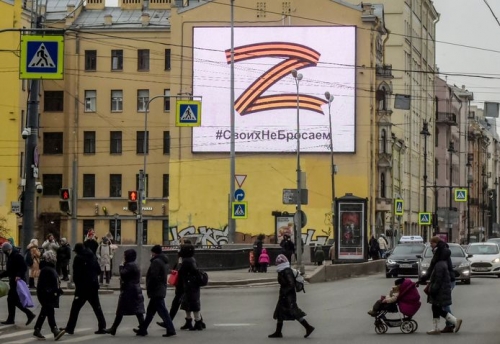
L'opération Z et le caractère inévitable de la réforme politique en Russie même
Alexandre Douguine
Source: https://www.geopolitica.ru/article/operaciya-z-i-neizbezhnost-politicheskih-reform-v-samoy-rossii
Au fur et à mesure que l'opération militaire spéciale se déroule, lentement mais sûrement, nous commençons à accorder de plus en plus d'attention à la situation politique interne de la Russie elle-même, à l'atmosphère et au style du changement. Beaucoup sont manifestement déçus, car rien ne ressemble de près ou de loin à l'opération Z en Russie. Et j'aimerais voir les forces que le peuple déteste tout autant que les nazis ukrainiens commencer à tomber, elles aussi, dans les chaudrons de l'enfer. Nous parlons bien sûr des libéraux qui, à l'exception des plus endurcis et rapidement évincés, ont généralement conservé leur position au pouvoir et dans la société. En toute solidarité émotionnelle avec les patriotes indignés, je voudrais exprimer ma propre opinion - plus modérée.
L'opération Z a coupé la ligne de partage des eaux de façon si fondamentale qu'il ne peut y avoir de retour en arrière. Nous sommes dans une situation d'irréversibilité. C'est difficile à croire, mais c'est exactement ce que s'est produit. Et rien d'autre ne dépend en principe des intentions subjectives des autorités. Le Kremlin peut croire sincèrement que l'ancien ordre politique et économique qui a émergé dans les années 1990, basé sur le libéralisme (et la corruption), et l'élite moderne continuera d'exister dans les nouvelles conditions. Seulement avec des ajustements cosmétiques mineurs. Mais la gravité des mesures déjà prises dans le cadre de l'opération militaire spéciale ne laisse aucune chance à un tel expédiant. L'opération elle-même est devenue inévitable précisément parce que sans elle, les processus de purification et de redressement de la société russe ne pouvaient pas dépasser le point critique, glissant constamment en arrière - vers les années 90. Sinon, nous aurions eu d'autres moyens d'empêcher l'émergence de l'anti-Russie en Ukraine, que nous nous efforçons maintenant d'éliminer à un prix si élevé.
Maintenant, le système qui s'est formé dans les années 90 et qui avait été modifié avec beaucoup de difficulté toutes les heures (non, toutes les années) par des mesures qui ne dépassaient pas le teneur d'une cuillère à café, a été mis dans des conditions telles qu'il ne peut pas supporter même une courte période dans son ancien état. Dans une confrontation directe avec l'Occident, la Russie vermoulue eltsino-libéraliste n'a aucune chance de survivre, et encore moins de gagner. La nécessité d'une nouvelle Russie se présentera donc.
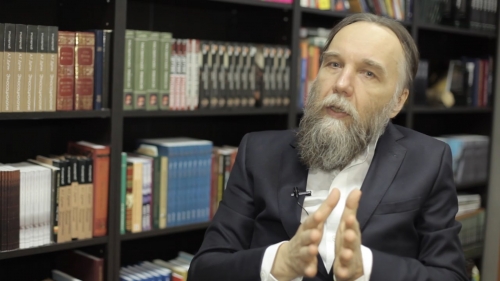
Le système existant et ses élites ne sont pas à la hauteur dans une situation de confrontation directe et frontale avec l'Occident, ce qui ne peut être réfuté ou édulcoré. Maintenant, nous ne pouvons que gagner. Il n'y a plus rien à tirer et nulle part où retourner. Les ponts ont sauté. La Russie est arrivée en première ligne de l'histoire et de la politique mondiales.
Placés dans cette situation, les membres de l'élite dirigeante - même les plus libéraux - peuvent choisir entre deux choses : soit se liquider, soit se recycler d'urgence en patriotes. Et l'option de l'ancien compromis - la 6e colonne, qui, tout en restant libérale et essentiellement un agent d'influence, acceptait à contrecœur les règles de Poutine - ne fonctionnera plus. Dans les nouvelles conditions, il apparaîtra très vite comme relevant du sabotage et/ou d'une incompétence flagrante. En guerre, dans les moments de désastre ou même en prison, les gens sont assez prompts à montrer ce qu'ils sont vraiment. Seule la vie paisible, choyée et sournoise d'un philistin endormi ouvre un espace sans fin pour les mensonges, les mimiques, la corruption embarrassante et la trahison longtemps inaperçue. Dans les circonstances extraordinaires actuelles - par rapport aux normes historiques - on verra instantanément qui est qui.
Il est facile de le vérifier par l'expérience : nous donnons à n'importe qui - même aux membres les plus inutiles et les plus ratés de l'élite actuelle - une véritable mission, et nous leur demandons de s'exécuter selon des critères de guerre (non, pas selon des critères de guerre, seulement une opération militaire, mais cela suffit aussi). S'ils échouent, il importe peu de savoir pourquoi ou qui leur a ordonné de le faire. Ils sont tout simplement finis. Et s'ils réussissent, ils sont à nous. Même s'ils viennent de le devenir. Tout arrive pour la première fois un jour ou l'autre. On peut donc devenir russe à tout moment, en corrigeant son ancienne non-russité (ou son manque de russité). Maintenant, nous sommes tous soit russes, et nous sommes responsables les uns des autres et de notre victoire commune, soit ... (et il n'y a pas d'endroit où fuir...)
Les autorités n'ont plus aucune marge de manœuvre à l'intérieur du pays. Pas du tout. Une fois qu'elle a commencé ce qu'elle a commencé, elle ne peut pas s'arrêter par définition. Ainsi, la possibilité de faire des compromis s'est irréversiblement effondré, l'espace vital même de la 6ème colonne a disparu.
Dans le langage de Gramsci, nous avions dépassé le "césarisme", c'est-à-dire le flirt pragmatique avec le système capitaliste mondial, dans lequel nous avions vainement tenté de nous intégrer, mais dans les conditions du maintien de notre souveraineté. Aujourd'hui, c'est clair : soit l'hégémonie occidentale libérale, soit une Russie souveraine - souveraine en tant que civilisation, en tant que culture, en tant que sujet. La seule réponse à l'hégémonie est désormais la contre-hégémonie. Et maintenant, il est totalement indifférent que le ministère de la Culture ait rejeté un excellent projet sur les valeurs traditionnelles. Les valeurs traditionnelles sont nécessaires à l'État, à la société, au peuple et à nos guerriers qui donnent maintenant leur vie dans la bataille contre l'hégémonie. Désormais, ils ne seront pas seulement proposés, ils seront obligés de les formuler et de les suivre. Car c'est la condition de la victoire. L'un de ceux qui sont devenus non pas un souhait, mais une nécessité vitale.
Oui, nous ne voyons pas de mouvement adéquat et de changement approprié au sein de la Russie en ce moment. Mais l'opération Z a déjà tout changé fondamentalement. Et ces changements se produiront inévitablement. L'élite n'a tout simplement pas le choix : soit elle s'engage dans la contre-hégémonie, soit elle disparaît dans la non-existence historique.
L'idée russe n'est plus quelque chose que nous pouvons choisir (ou rejeter) librement. Personne ne peut exister sans elle. On peut essayer, mais je ne le conseille pas, c'est comme couper l'accès à l'oxygène quand le corps en a besoin.
La force d'inertie est telle que tout le monde n'a pas réalisé ce qui s'est passé le 22 février 2022. Ce n'est pas grave, ils s'en rendront vite compte. La suite ne nécessitera aucune décision subjective de la part des autorités, tout se déroulera automatiquement.
Je le vois très clairement. S'il n'y a pas d'autre moyen, il ne nous reste qu'une seule chose à faire : gagner. L'histoire ne nous a laissé aucune chance pour "l'ou bien/ou bien".
18:38 Publié dans Actualité, Affaires européennes, Nouvelle Droite | Lien permanent | Commentaires (0) | Tags : alexandre douguine, nouvelle droite, nouvelle droite russe, russie, actualité, europe, affaires européennes, opération z |  |
|  del.icio.us |
del.icio.us |  |
|  Digg |
Digg | ![]() Facebook
Facebook
dimanche, 20 mars 2022
La fin inachevée de l'histoire et la guerre de la Russie contre l'ordre mondial libéral
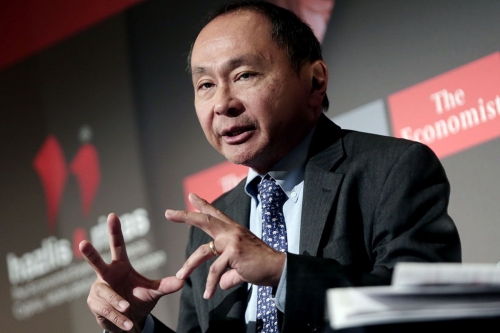
La fin inachevée de l'histoire et la guerre de la Russie contre l'ordre mondial libéral
Alexandre Douguine
La thèse de Fukuyama sur la fin de l'histoire
Du point de vue idéologique, le monde vit encore dans l'ombre de la controverse des années 1990 entre Francis Fukuyama et Samuel Huntington. Quelles que soient les critiques que l'on puisse formuler à l'encontre des thèses des deux auteurs, leur importance n'en est nullement diminuée, car le dilemme subsiste toujours et, en fait, constitue toujours le contenu principal de la politique et de l'idéologie mondiales.
Permettez-moi de vous rappeler qu'au lendemain de l'effondrement du Pacte de Varsovie puis de l'URSS, le philosophe politique américain Francis Fukuyama a formulé la thèse de la "fin de l'histoire". Cela se résume au fait qu'au vingtième siècle, et surtout après la victoire sur le fascisme, la logique de l'histoire s'est réduite à l'affrontement de deux idéologies - le libéralisme occidental et le communisme soviétique. L'avenir, et donc le sens de l'histoire, dépendait de l'issue de leur confrontation. Ainsi, selon Fukuyama, le futur est arrivé, et ce moment a été l'effondrement de l'Union soviétique en 1991 et l'arrivée au pouvoir à Moscou de libéraux qui ont reconnu la suprématie idéologique de l'Occident. D'où la thèse de la "fin de l'histoire".
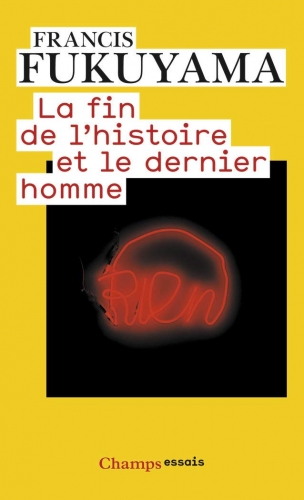
Selon Fukuyama, l'histoire est une histoire de guerres et de confrontations, chaudes et froides. Dans la seconde moitié du vingtième siècle, toutes les confrontations et les guerres se limitaient à l'opposition de l'Ouest capitaliste-libéral contre l'Est communiste. Lorsque l'Est s'est effondré, les contradictions ont disparu. Les guerres se sont arrêtées (comme cela semblait être le cas selon Fukuyama). Et, par conséquent, l'histoire était terminée.
La fin de l'histoire - reportée, mais pas rejetée
En fait, cette théorie est à la base de toute l'idéologie et de la pratique du mondialisme et de la mondialisation. Les libéraux occidentaux s'en inspirent encore. C'est l'idée défendue par George Soros, Klaus Schwab, Bill Gates, Jeff Bezos, Mark Zuckerberg, Barack Obama, Bernard Henri Levy, Hillary Clinton et... Joe Biden.
Les libéraux admettent toutefois que tout ne s'est pas déroulé sans heurts depuis les années 1990. Le libéralisme et l'Occident ont été confrontés à divers problèmes et à de nouveaux défis (avec l'islam politique, la nouvelle montée de la Russie et de la Chine, le populisme - y compris en Amérique même sous la forme de Trump et du trumpisme - etc.), mais les mondialistes sont convaincus que le moment de la fin de l'histoire s'est quelque peu éloigné, mais qu'il est inévitable et qu'il arrivera assez tôt. C'est sous le slogan d'un nouvel effort - faire de la fin de l'histoire une réalité et cimenter de manière irréversible le triomphe mondial du libéralisme - qu'a été menée la campagne du mondialiste Joe Biden (Build Back Better, signifiant "Retour à la mondialisation à nouveau - et cette fois avec plus de succès, après avoir construit notre arrière"), inscrite dans le programme planétaire du Great Reset de Klaus Schwab. Autrement dit, Fukuyama et sa thèse n'ont pas été écartés - c'est juste que la mise en œuvre de ce plan, idéologiquement irréprochable du point de vue de la vision libérale du monde dans son ensemble, a été reportée. Néanmoins, le libéralisme a continué à imprégner la société au cours des 30 dernières années - dans la technologie, dans les processus sociaux et culturels, par la propagation de la politique de genre (LGBTQ+), l'éducation, la science, l'art, les médias sociaux, etc. Et cela n'était pas seulement vrai dans les pays occidentaux, mais même dans les sociétés semi-fermées comme les pays islamiques, la Chine et la Russie.
Le nouveau phénomène des civilisations
Dès les années 1990, un autre auteur américain, Samuel Huntington, a présenté une vision alternative à celle de Fukuyama sur les processus mondiaux. Fukuyama était un libéral convaincu, partisan du Gouvernement Mondial, de la dénationalisation et de la "désuperinisation" des Etats traditionnels. Huntington, quant à lui, adhérait à la tradition du réalisme dans les relations internationales, c'est-à-dire qu'il reconnaissait la souveraineté comme un principe très élevé. Mais contrairement aux autres réalistes qui pensaient en termes d'États-nations, Huntington pensait qu'après la fin de la guerre froide et la disparition du bloc de l'Est et de l'URSS, il n'y aurait pas de fin de l'histoire, mais de nouveaux acteurs qui se feraient concurrence à l'échelle planétaire. C'est ainsi qu'il a nommé les "civilisations" et prédit dans son célèbre article (Clash of Civilisations) leur affrontement.
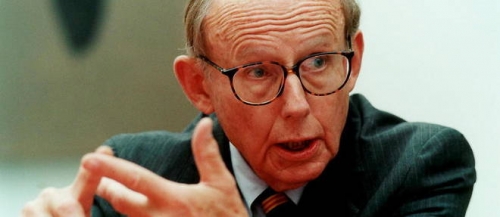
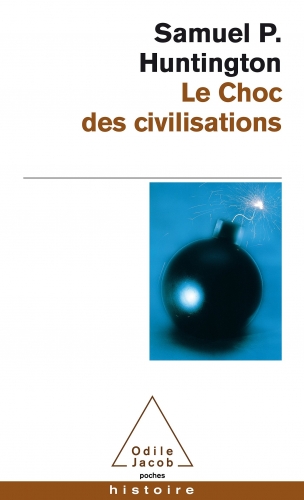
Huntington est parti du constat suivant : le camp capitaliste et socialiste n'a pas été créé dans un vide au sein duquel des "têtes d'oeuf" ont élaboré des plans idéologiques abstraits, mais sur les bases culturelles et civilisationnelles très précises des différents peuples et territoires. Ces fondements ont été établis bien avant les temps modernes et leurs idéologies simplistes. Et lorsque la querelle des idéologies modernes prendra fin (et elle l'a fait avec la disparition de l'une d'entre elles - le communisme), les contours profonds des anciennes cultures, visions du monde, religions et civilisations émergeront de sous le formatage de surface.
Vrais et faux ennemis du libéralisme mondial
La justesse des hypothèses formulées par S. Huntington est devenue particulièrement évidente dans les années 2000, lorsque l'Occident a été confronté à l'islam radical. À cette époque, Huntington lui-même était mort avant d'avoir pu profiter de sa victoire théorique, tandis que Fukuyama admettait avoir tiré des conclusions hâtives, et même avancé la thèse de l'émergence d'un "islamo-fascisme", qu'il fallait vaincre avant que "la fin de l'histoire" ne puisse advenir: elle ne pouvait, disait-il, advenir avant cette victoire.
Néanmoins, Huntington n'avait pas seulement raison au sujet de l'islam politique. De plus, l'Islam s'est avéré si hétérogène dans la pratique qu'il ne s'est pas coalisé en une force unie contre l'Occident. Et il était commode pour les stratèges occidentaux de manipuler dans une certaine mesure la menace islamique et le facteur fondamentalisme islamique afin de justifier leur ingérence dans la vie politique des sociétés islamiques du Moyen-Orient ou d'Asie centrale. Un processus beaucoup plus sérieux était la poursuite de la pleine souveraineté par la Russie et la Chine. Là encore, ni Moscou ni Pékin n'ont opposé les libéraux et les mondialistes à une idéologie particulière (d'autant que le communisme chinois, après les réformes de Deng Xiaoping, a reconnu certains biens fondés du libéralisme économique). Il s'agissait de deux civilisations qui s'étaient développées bien avant les temps modernes. Huntington lui-même les a appelées civilisation orthodoxe (chrétienne orientale) dans le cas de la Russie et civilisation confucéenne dans le cas de la Chine, reconnaissant à juste titre en Russie et en Chine un lien avec des cultures spirituelles plus anciennes et plus profondes. Ces cultures profondes se sont fait connaître au moment où la confrontation idéologique entre le libéralisme et le communisme s'est terminée par une victoire formelle, mais pas réelle (!), des mondialistes. Le communisme a disparu, mais pas l'Est, l'Eurasie.
La victoire dans un monde virtuel
Mais les partisans de la fin de l'histoire n'ont pas été complaisants. Ils sont tellement englués dans leurs modèles fanatiques de mondialisation et de libéralisme, qu'ils ne reconnaissent aucun autre avenir. Et c'est ainsi qu'ils ont commencé à insister de plus en plus sur une fin virtuelle de l'histoire. Comme, si ce n'est pas réel, faisons en sorte que ça ait l'air réel et tout le monde y croira. En substance, on mise sur la politique de contrôle des esprits, via les ressources d'information mondiales, la technologie des réseaux, la promotion de nouveaux gadgets et le développement de modèles de cohésion homme-machine. C'est le "Great Reset" proclamé par le créateur du Forum de Davos, Klaus Schwab, et embrassé par le parti démocrate américain et Joe Biden.
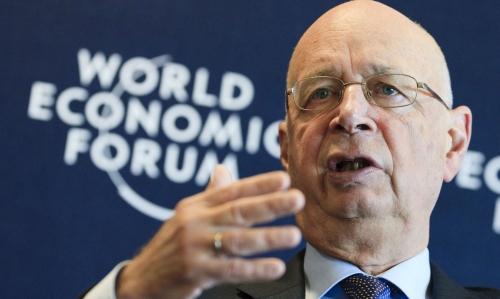
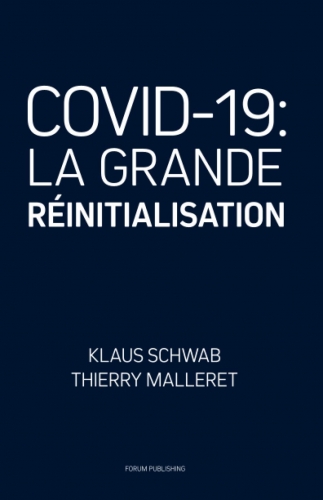
L'essence de cette politique est la suivante : les globalistes ne contrôlent pas la réalité, mais ils dominent complètement le monde virtuel. Ils possèdent toutes les technologies de réseau de base, les protocoles, les serveurs, etc. Par conséquent, en s'appuyant sur l'hallucination électronique globale et le contrôle total de la conscience, ils ont commencé à créer une image du monde dans lequel l'histoire était déjà terminée. C'est là une image, rien de plus.
Fukuyama a donc conservé son importance, mais non plus en tant qu'analyste, mais en tant que technologue politique mondial tentant d'imposer des perceptions obstinément rejetées par une grande partie de l'humanité.
La guerre de Poutine contre l'ordre libéral
À ce titre, l'évaluation par Fukuyama de l'opération militaire spéciale en Ukraine présente un certain intérêt. À première vue, il pourrait sembler que son analyse devienne alors tout à fait hors de propos, car il ne fait que répéter les clichés courants de la propagande anti-russe occidentale qui ne contiennent rien de nouveau ou de convaincant (dans le style du banal journalisme russophobe). Mais à y regarder de plus près, le tableau change quelque peu si l'on ignore ce qui est le plus frappant - la haine enragée de la Russie, de Poutine et de toutes les forces qui s'opposent à la fin de l'histoire.
Dans un article publié dans le Financial Times, Fukuyama exprime déjà dans le titre même l'idée principale de ses revendications contre la Russie - "la guerre de Poutine contre l'ordre libéral". Et cette thèse en soi est absolument correcte. L'opération militaire spéciale en Ukraine est un accord décisif pour établir la Russie comme une civilisation, comme un pôle souverain d'un monde multipolaire. Cela correspond parfaitement à la théorie de Huntington, mais est complètement en désaccord avec la "fin de l'histoire" de Fukuyama (ou la société ouverte de Popper/Soros).
Oui, c'est exactement ça - "la guerre contre l'ordre libéral".
Le rôle clé de l'Ukraine dans la géopolitique mondiale
L'importance de l'Ukraine pour la renaissance de la Russie en tant que puissance mondiale pleinement indépendante a été clairement reconnue par toutes les générations de géopolitogues anglo-saxons - du fondateur de cette science Halford J. MacKinder à Zbigniew Brzezinski. Auparavant, elle était formulée comme suit : "Sans l'Ukraine, la Russie n'est pas un Empire, mais avec l'Ukraine, elle est un Empire. Si l'on mettait le terme "civilisation" ou "pôle mondial multipolaire" à la place d'"Empire", le sens serait encore plus transparent.
L'Occident mondial a misé sur l'Ukraine comme sur un pion anti-russe et a instrumentalisé le nazisme ukrainien et la russophobie extrême à cette fin. Tous les moyens étaient bons pour lutter contre la civilisation orthodoxe et le monde multipolaire. Poutine, cependant, n'a pas pris ce virage et est entré dans la bataille, mais pas avec l'Ukraine, mais avec le mondialisme, avec l'oligarchie mondiale, avec le Grand Remplacement, avec le libéralisme et la fin de l'histoire.
Et c'est ici que la chose la plus importante est apparue. L'opération militaire spéciale est dirigée non seulement contre le nazisme (la dénazification - avec la démilitarisation - est son principal objectif), mais plus encore contre le libéralisme et le mondialisme. Après tout, ce sont les libéraux occidentaux qui ont rendu possible le nazisme ukrainien, l'ont soutenu, armé et opposé à la Russie - en tant que nouveau pôle d'un monde multipolaire. Mackinder a appelé les terres de la Russie "l'axe géographique de l'histoire" - c'était le titre de son célèbre article, tout au début de sa carrière. Pour que l'histoire se termine (la thèse mondialiste, le but du "Grand Reset"), le pivot géographique de l'histoire doit être brisé, détruit. La Russie en tant que pôle, en tant qu'acteur souverain, en tant que civilisation ne doit tout simplement plus exister. Et le plan diabolique des mondialistes était de miner la Russie dans la zone la plus douloureuse, de dresser contre elle les mêmes Slaves orientaux (c'est-à-dire, en fait, les mêmes Russes), et même les Orthodoxes.
Pour ce faire, les Ukrainiens ont dû être placés à l'intérieur de la matrice mondialiste, pour prendre le contrôle de la conscience de la société ukrainienne à l'aide de la propagande informative, des réseaux sociaux et d'une gigantesque opération de contrôle de la psyché et de la conscience, dont des millions d'Ukrainiens ont été victimes au cours des dernières décennies. Les Ukrainiens ont été persuadés qu'ils font partie du monde occidental (mondial) et que les Russes ne sont pas des frères, mais des ennemis acharnés. Et dans une telle stratégie, le nazisme ukrainien coexistait parfaitement avec le libéralisme, qu'il servait essentiellement de manière instrumentale.
La guerre pour un ordre mondial multipolaire
C'est exactement ce contre quoi Poutine s'est engagé dans une lutte décisive. Pas contre l'Ukraine, mais pour l'Ukraine. Fukuyama a entièrement raison dans ce cas. Ce qui se passe aujourd'hui en Ukraine est "la guerre de Poutine contre l'ordre libéral". C'est une guerre contre Fukuyama lui-même, contre Soros et Schwab, contre la "fin de l'histoire" et le globalisme, contre l'hégémonie réelle et virtuelle, contre la "Grande Réinitialisation".
Des événements dramatiques s'ensuivirent - et c'est là un dilemme universel. Ils décident du sort de ce que sera l'ordre mondial à venir. Le monde deviendra-t-il vraiment multipolaire, c'est-à-dire démocratique et polycentrique, où les différentes civilisations auront voix au chapitre (et nous espérons que c'est exactement ce qui se passera - c'est le sens de notre victoire à venir), ou (Dieu nous en préserve !) sombrera-t-il finalement dans l'abîme du mondialisme, mais sous une forme plus ouverte, où le libéralisme n'affrontera plus le nazisme et le racisme, mais fusionnera inséparablement avec eux. Le libéralisme moderne, prêt à exploiter le nazisme et à le négliger lorsqu'il s'agit des intérêts des nations, est le véritable mal. Le mal absolu. C'est cela, et c'est contre cela que la guerre est menée maintenant.
12 thèses de Francis Fukuyama, basées sur une seule fausse prémisse
Un autre texte récent de Fukuyama, American Purpose, imprimé dans la publication des "néocons" américains (soit les néoconservateurs) en tant que bruyants représentants du nazisme libéral, mérite un certain intérêt. Dans ce document, Fukuyama propose 12 thèses sur la façon dont, selon lui, les événements se dérouleront pendant le conflit en Ukraine. Nous allons les présenter dans leur intégralité. Disons tout de suite qu'il s'agit d'une désinformation totale et d'une propagande ennemie, et c'est à ce titre - fake news - que nous citons ce texte.
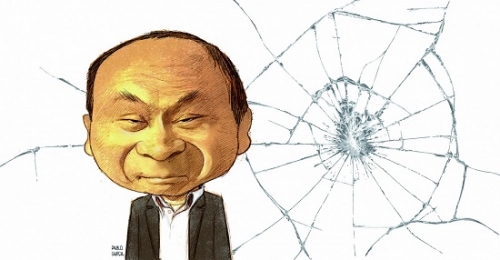
"La Russie se dirige vers une défaite totale en Ukraine. La planification russe a été incompétente, fondée sur l'hypothèse erronée que les Ukrainiens sont favorables à la Russie et que leurs forces armées s'effondreront immédiatement après l'invasion. Les soldats russes transportaient manifestement des uniformes de parade pour le défilé de la victoire à Kiev, et non des munitions et des rations supplémentaires. À ce stade, Poutine a engagé la plupart de ses forces armées dans l'opération - il n'y a pas d'énormes réserves auxquelles il pourrait faire appel pour prendre part à la bataille. Les troupes russes sont bloquées à l'extérieur des différentes villes ukrainiennes, où elles sont confrontées à d'énormes problèmes d'approvisionnement et à des attaques ukrainiennes constantes."
La première phrase est la plus importante. "La Russie se dirige vers une défaite totale en Ukraine". Tout le reste repose sur le fait que, lui, Fukuyama, représente la vérité absolue et qu'il n'est pas à remettre en question. Si nous faisions réellement de l'analytique, cela commencerait par un dilemme : si les Russes gagnent, alors..., si les Russes perdent, alors..... Mais il n'y a rien de tel ici. "Les Russes vont perdre parce que les Russes ne peuvent pas s'empêcher de perdre, ce qui signifie que les Russes ont déjà perdu. Et aucune autre option n'est envisagée, car il s'agirait dès lors de propagande russe." Qu'est-ce que c'est ? Voilà ce qu'est le nazisme libéral. De la pure propagande idéologique mondialiste, plaçant d'emblée le lecteur dans un monde virtuel où "l'histoire est déjà terminée".
Ensuite, tout devient prévisible, ce qui ne fait qu'ajouter à l'hallucination. Nous avons affaire à un exemple de "psy-op", une "opération psychologique".
"L'effondrement de leurs positions pourrait être soudain et catastrophique, plutôt que de se produire lentement, dans une guerre d'usure. L'armée sur le terrain atteindrait un point où elle ne pourrait plus être approvisionnée ni retirée et le moral s'évaporerait. C'est au moins vrai dans le nord ; les Russes s'en sortent mieux dans le sud, mais ces positions seront difficiles à tenir si le nord s'effondre."
Aucune preuve, de purs vœux pieux. Les Russes doivent être des perdants parce qu'ils sont des perdants. Et ceci nous vient du perdant modèle Fukuyama, dont toutes les prédictions ont été démenties de manière démontrable.
Dans l'ensemble, il est construit sur l'hypothèse que Moscou se préparait à une opération qui devait durer deux ou trois jours et culminer par un salut victorieux avec des fleurs de la part d'une population libérée. Comme si les Russes étaient tellement idiots qu'ils n'avaient pas remarqué les trente ans de propagande russophobe, l'encadrement par l'Occident de formations néo-nazies et une armée énorme (selon les normes européennes), pas mal armée (par le même Occident) et entraînée à l'époque soviétique (et l'entraînement était alors sérieux) qui allait déclencher une guerre dans le Donbass puis en Crimée. Et si une opération spéciale menée par les Russes dans une telle situation n'est pas terminée en quinze jours, c'est un "échec". Une autre hallucination.
L'Occident a sacrifié les Ukrainiens
Et puis Fukuyama poursuit en disant une chose assez importante :
"Avant que cela ne se produise, il n'y a pas de solution diplomatique à la guerre. Il n'existe aucun compromis concevable qui soit acceptable pour la Russie ou l'Ukraine, compte tenu des pertes qu'elles ont subies jusqu'à présent."
Cela signifie que l'Occident continue de croire à sa propre propagande virtuelle et ne va pas faire de compromis avec la Russie et mettre en œuvre un contrôle de la réalité. Si l'Occident attend que la Russie soit vaincue pour entamer des négociations, celles-ci ne commenceront jamais.
"Le Conseil de sécurité de l'ONU a une fois de plus prouvé son inutilité. La seule chose utile a été le vote à l'Assemblée générale, qui permet d'identifier les acteurs peu scrupuleux ou évasifs dans le monde."
Dans cette thèse, Fukuyama fait référence à la nécessité de dissoudre l'ONU et de créer à sa place une Ligue des démocraties, c'est-à-dire des États complètement subordonnés à Washington, qui sont prêts à vivre dans l'illusion de "la fin de l'histoire". Ce projet a été formulé par un autre nazi libéral russophobe, McCain, et a commencé à être mis en œuvre par Joe Biden. Tout se déroule selon le plan du "Grand Reset".
"Les décisions de l'administration Biden de ne pas déclarer une zone d'exclusion aérienne et de ne pas aider à remettre les MiG polonais étaient les bonnes ; ils ont gardé la tête froide à un moment très émotionnel. Il vaut bien mieux que les Ukrainiens battent les Russes eux-mêmes, ce qui prive Moscou de l'excuse selon laquelle l'OTAN les a attaqués, et évite toutes les possibilités évidentes d'escalade. Les MiG polonais en particulier n'ajouteraient pas grand-chose aux capacités ukrainiennes. Bien plus important est un approvisionnement régulier en Javelins, Stingers, TB2s, fournitures médicales, équipements de communication et de partage de renseignements. Je suppose que les forces ukrainiennes sont déjà dirigées par les services de renseignement de l'OTAN opérant en dehors de l'Ukraine."
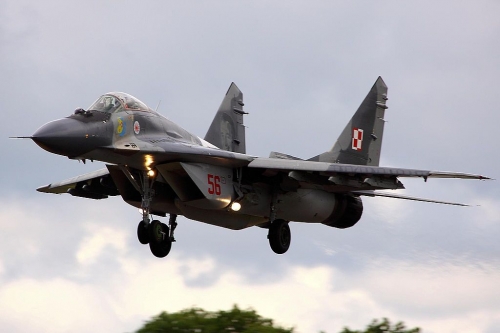
Sur la première phrase, en revanche, on peut être d'accord avec Fukuyama. Biden n'est pas prêt à lancer un duel nucléaire qui suivrait immédiatement l'annonce d'une zone de drones et d'autres mesures directes vers une intervention de l'OTAN dans le conflit. L'expression "les Ukrainiens ont eux-mêmes vaincu les Russes" semble cynique et cruelle, mais l'auteur ne comprend pas ce qu'il dit : l'Occident a d'abord dressé les Ukrainiens contre les Russes, puis les a laissés seuls face à eux en s'abstenant de leur apporter une aide efficace. Les Ukrainiens ne sont virtuellement victorieux que dans un monde où l'histoire est terminée. Et devrait, selon la pensée de Fukuyama, s'en réjouir. C'est une petite affaire : il reste à vaincre les Russes.
"Bien sûr, le prix que l'Ukraine paie est énorme. Mais les plus gros dégâts sont causés par les missiles et l'artillerie, auxquels ni les MiG ni une zone d'exclusion aérienne ne peuvent faire face. La seule chose qui puisse arrêter le carnage est la défaite de l'armée russe sur le terrain."
Lorsque Fukuyama dit "le prix est énorme", il est clair, d'après son expression nonchalante, qu'il ne sait pas de quoi il parle.
Poutine et le nouveau départ du populisme
Ensuite, Fukuyama réfléchit au sort du président Poutine. Tout cela dans la même veine de rêverie sur la fin de l'histoire. En termes non équivoques, il déclare :
"Poutine ne survivra pas à la défaite de son armée. Il gagne du soutien parce qu'il est perçu comme un homme fort ; que peut-il offrir lorsqu'il démontre son incompétence et est dépouillé de son pouvoir coercitif ?"
Une autre thèse construite entièrement sur la première prémisse. La défaite des Russes est inévitable, ce qui signifie que Poutine est fini. Et si les Russes gagnent, Poutine n'est que le tout début. C'est ce qui compte, non plus pour le délirant Fukuyama, mais pour nous.
"L'invasion a déjà causé d'énormes dommages aux populistes du monde entier qui, avant l'attaque, n'ont cessé d'exprimer leur sympathie pour Poutine. Parmi eux, Matteo Salvini, Jair Bolsonaro, Eric Zemmour, Marine Le Pen, Viktor Orban et, bien sûr, Donald Trump. La politique de la guerre a exposé leurs tendances ouvertement autoritaires."
Tout d'abord, tous les populistes ne sont pas aussi directement influencés par la Russie. Matteo Salvini, sous l'influence des nazis libéraux et des atlantistes de son cercle intime, a changé son attitude auparavant amicale envers la Russie. Les sympathies pro-russes des autres ne doivent pas non plus être exagérées. Mais là encore, il y a un point curieux. Même si l'on accepte la position de Fukuyama selon laquelle les populistes sont orientés vers Poutine, ils ne perdent que si les Russes sont vaincus. Et en cas de victoire ? Après tout, c'est "la guerre de Poutine contre l'ordre libéral", et s'il la gagne, alors tous les populistes gagnent avec Moscou ? Et puis la fin de l'oligarchie mondiale et des élites du "Big Reboot".
Une leçon pour la Chine et la fin du monde unipolaire
"Jusqu'à présent, la guerre a été une bonne leçon pour la Chine. Comme la Russie, la Chine a développé une armée apparemment de haute technologie au cours de la dernière décennie, mais elle manque d'expérience au combat. L'échec de l'armée de l'air russe risque d'être répété par l'armée de l'air de l'Armée populaire de libération, qui manque également d'expérience dans la gestion d'opérations aériennes complexes. Nous pouvons espérer que les dirigeants chinois ne se berceront pas d'illusions sur leurs capacités comme l'ont fait les Russes en envisageant de futures actions contre Taïwan."
Encore une fois, tout cela est vrai si "les Russes ont déjà perdu". Et s'ils ont gagné ? Alors la signification de cette leçon pour la Chine serait tout le contraire. Autrement dit, Taïwan regagnera son port d'attache plus tôt qu'on ne le pense.
"Il reste à espérer que Taïwan elle-même se réveille et prenne conscience de la nécessité de se préparer à la guerre, comme l'ont fait les Ukrainiens, et rétablisse la conscription. Ne soyons pas prématurément défaitistes".
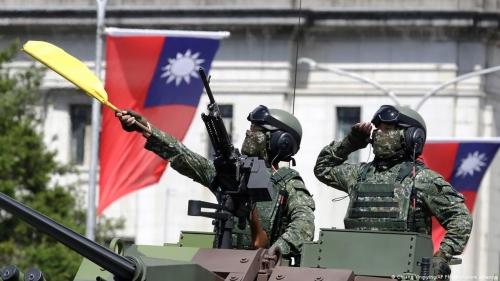
Il vaudrait mieux être réaliste, et voir les choses telles qu'elles sont, en tenant compte de tous les facteurs. Mais peut-être que le fait que l'Occident ait des idéologues comme Fukuyama, hypnotisés par leurs propres illusions, est à notre avantage ?
"Les drones Bayratkar de Turquie sont devenus des best-sellers".
Aujourd'hui, des fragments de ces "best-sellers" sont ramassés par des clochards et des pillards dans les décharges de l'Ukraine.
"La défaite de la Russie rendra possible une 'nouvelle naissance de la liberté' et nous fera sortir de nos rêveries sur le déclin de la démocratie mondiale. L'esprit de 1989 perdurera, grâce à un groupe de courageux Ukrainiens."
Voici une grande conclusion : Fukuyama connaît déjà "la défaite de la Russie", comme il connaissait "la fin de l'histoire". Et alors, le mondialisme sera sauvé. Et si non ? Alors il n'y aura plus de mondialisme.
Et ensuite - "bienvenue" dans le monde réel, dans le monde des peuples et des civilisations, des cultures et des religions, dans le monde de la réalité et de la liberté du camp de concentration totalitaire libéral.
12:22 Publié dans Actualité | Lien permanent | Commentaires (0) | Tags : alexandre douguine, francis fukuyama, fin de l'histoire, russie, ukraine, chine, taiwan, actualité, politique interntionale, samuel huntington |  |
|  del.icio.us |
del.icio.us |  |
|  Digg |
Digg | ![]() Facebook
Facebook
mercredi, 16 mars 2022
L'ethnosociologie de l'Ukraine dans le contexte de l'opération militaire
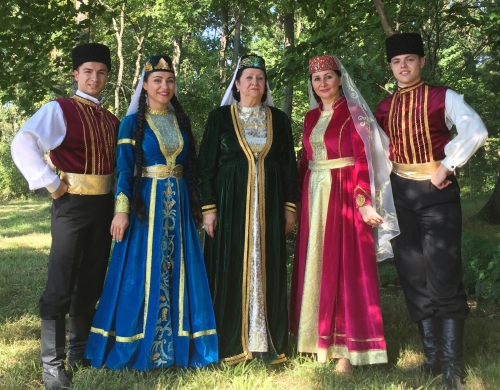
L'ethnosociologie de l'Ukraine dans le contexte de l'opération militaire
Alexandre Douguine
Source: https://katehon.com/en/article/ethnosociology-ukraine-context-military-operation
Une compréhension approfondie de l'opération militaire spéciale en Ukraine nécessite une explication préalable : à quoi avons-nous affaire, au sens large du terme ? Les notions de "nation", de "nationalité", de "peuple", d'"ethnos" sont totalement confondues, d'où celles de "Russes", "Ukrainiens", "Petits Russes", etc. Nous devrions d'abord dresser une carte ethno-sociologique et répartir les concepts avec lesquels nous opérons dans l'analyse de ce conflit.
Principales catégories ethno-sociologiques
Rappelons les points principaux de l'ethnosociologie. L'ethnosociologie opère avec les concepts suivants :
- ethnos,
- peuple,
- nation,
- société civile.
Ils correspondent à différents types de sociétés. L'ethnos est le mode de vie le plus archaïque, caractéristique des petites communautés agraires ou pastorales, où il n'existe pas de division sociale et de classe verticale. Les relations au sein d'un groupe ethnique sont strictement horizontales, et sa mentalité est construite sur des mythes. Il s'agit d'une société archaïque à l'identité collective.
Un peuple est un groupe ethnique qui s'est engagé sur le chemin de l'histoire, a construit un État, fondé une religion ou une culture distincte. Presque toujours, un peuple se compose de deux ou plusieurs groupes ethniques, qui sont unis dans une structure abstraite. Le peuple a une division en classes et une hiérarchie, une verticale du pouvoir. Il s'agit d'une société traditionnelle. L'identité y est collective et se distingue par des domaines. La plus haute réalisation historique d'un peuple est la création d'un Empire.
La nation n'apparaît qu'à l'époque moderne dans la société bourgeoise. Une nation est une communauté artificielle fondée sur l'identité individuelle. Les nations sont apparues en Europe à l'époque moderne. Ici, la hiérarchie sociale est basée sur le principe de la richesse matérielle. C'est le type de société caractéristique du début de la Modernité.
La société civile apparaît lorsque s'effectue la transition de la nation vers le Monde Unique et le Gouvernement Mondial. La société civile se manifeste pleinement dans le mondialisme. Elle possède la même identité individuelle qu'une nation, mais sans frontières nationales. La société civile prend forme au sein des nations et des États bourgeois, mais sort progressivement de leur cadre et acquiert un caractère mondial. Ici, l'identité nationale artificielle est abolie et l'individualisme devient global. Historiquement, la société civile est caractéristique de la fin de la période moderne et de la période postmoderne.
Les Slaves de l'Est deviennent un peuple
Appliquons maintenant cet appareil conceptuel au conflit ukrainien.
Qui sont les Russes ? Cette question n'est pas aussi simple qu'il n'y paraît à première vue. Elle nécessite également une clarification du point de vue ethnosociologique.
Les Slaves de l'Est étaient divisés en tribus qui se trouvaient à l'état d'ethnos, lequel s'est avéré être intégré à la Russie ancienne sous la direction d'une élite princière militante. En fait, cette élite elle-même, d'origines varègue et sarmate, était appelée "Rus", bien que la présence en son sein de familles princières et aristocratiques des Slaves polabiens (Bodrichi et Lutichi) ne soit pas à exclure. Les Slaves orientaux devinrent la principale population de l'ancienne Rus : d'où le nom de "Russes" et aussi de "Rusyns". De même, les Gaulois romanisés, conquis par la tribu germanique des Francs, commencent à être appelés "Français".
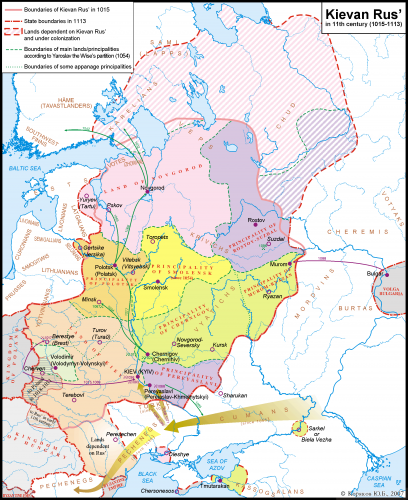
Un peuple se forme dans l'ancien État de la Rus dont le centre est à Kiev,. L'élite y conserve son identité, mais adopte la langue de la majorité de la population, composée de Slaves orientaux. Le substrat ethnique (tribus slaves orientales) devient un peuple.
Il est caractéristique qu'en même temps que le peuple, la Rus de Kiev acquiert d'autres attributs:
- l'État,
- la religion (au début - pendant une courte période - le paganisme réformé, puis - de manière constante - l'orthodoxie),
- culture (écriture, chronique, éducation, etc.).
Les Slaves de l'Est entrent dans l'histoire.
Les Slaves de l'Est se divisent
S'ensuit toute une série de processus historiques au cours desquels la Rus de Kiev elle-même perd son unité. Les Slaves orientaux sont divisés - mais pas par tribus, mais par territoires, ayant souvent des destins différents. Il ne s'agit pas d'une désintégration en formations ethniques pré-étatiques, mais de la division d'un peuple déjà uni - la Rus de Kiev. Le sort de ces diverses branches est déterminé par les aléas des querelles princières et des processus politiques autour de la Rus'.
Ainsi, progressivement, les Grands Russes se forment à partir de la branche orientale des Slaves de l'Est. Ils s'avèrent être les Russes des principautés orientales - Vladimir, Riazan, etc. Dans le même temps, ils comprennent également divers groupes finno-ougriens et turcs. Les princes de Vladimir se livrent à une concurrence féroce avec ceux de l'Ouest pour le trône de grand-duc à Kiev (!), et à un moment donné, ils parviennent à l'obtenir. Ensuite, ils transfèrent le trône à Vladimir, puis à Moscou. Peu à peu, dans la partie orientale de la Russie (également à l'origine l'ancienne périphérie nord-est !) et dans le Nord russe, se forme l'une des branches des Slaves orientaux, à savoir le peuple de la Rus de Kiev. On les appelle parfois "Russes" de manière généralisée, bien qu'il serait plus exact d'utiliser le terme "Grands Russes", puisque la partie occidentale des Slaves orientaux est également russe au sens plein du terme.
Cette partie occidentale des Slaves orientaux, c'est-à-dire le seul peuple russe orthodoxe du Grand-Duché de Kiev, se divise à son tour en deux branches - nord-ouest et sud-ouest. Les Russes du nord-ouest deviennent des Biélorusses, puisque cette partie de la Russie était appelée Belaya (blanche). Les Russes du sud-ouest seront plus tard appelés Petits Russes, bien que ce terme soit compris à la fois de manière large (incluant les terres de Galicie-Volhynie) et étroite (par rapport à l'Ukraine centrale). Il est important de souligner qu'il ne s'agit pas de tribus, mais de parties d'un même peuple, divisées selon des critères politiques et historiques.
Progressivement, les trois branches des Slaves orientaux (les futurs Grands Russes, Petits Russes et Biélorusses) perdent leur souveraineté (un pouvoir princier indépendant, reconnaissant toujours entre-temps l'ancienneté des Grands Ducs) et se retrouvent au sein d'autres entités politiques plus fortes.
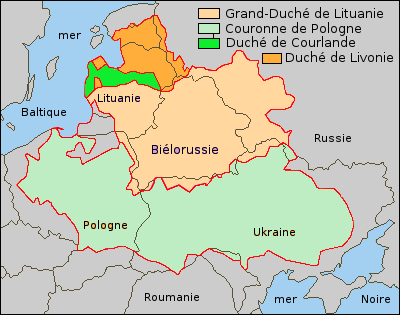
Les futurs Biélorusses, puis les Petits Russes, se retrouvent dans la structure du Grand-Duché de Lituanie, et après l'union avec la Pologne - dans le cadre du royaume polono-lituanien.
Ceux que l'on appellera les Grands Russes conservent le statut de pouvoir grand-ducal à Vladimir, puis à Moscou, et sont directement subordonnés à la Horde d'Or.
Ici commence une grave division dans le destin des Slaves de l'Est. Trois branches d'un même peuple (et non d'une ethnie !) se retrouvent dans des systèmes politiques différents.
Différence de destin et perte du statut d'État
Les Grands Russes conservent le pouvoir des Grands Ducs et l'identité orthodoxe, que les khans de la Horde d'Or, fidèles au principe de tolérance religieuse de Gengis Khan, n'avaient pas empiété.
Les Biélorusses et les Petits Russes se retrouvent dans un État européen catholique, ce qui place les orthodoxes dans des conditions d'infériorité. Ainsi, l'élite princière et militaire est progressivement intégrée à la gentry polonaise, et la population rurale reste dans la position dites des "schismatiques orientaux". La partie occidentale des Slaves orientaux perd son statut d'État, mais préserve farouchement la foi, la langue et la culture orthodoxes.
Et bien que les petits Russes et les Biélorusses fassent partie d'un seul et même peuple - Kiev (!) - ils sont privés du signe le plus important du peuple - le statut d'État. Cela rend leur position dans l'État polono-lituanien proche d'un groupe ethnique opprimé.
Plus tard, une partie des Slaves du sud-est passe sous la domination de l'Empire ottoman, et de l'État des Habsbourg (Empire autrichien). Cela brouille encore plus l'identité du peuple et le divise, le réduisant à nouveau au statut de groupe ethnique.
La politique de ces États, qui comprenaient la partie occidentale des Slaves orientaux, était différente selon les pays et les époques. Le Grand-Duché de Lituanie, avant l'union avec la Pologne catholique, était païen, et un certain nombre de princes étaient très favorables à l'orthodoxie. Par conséquent, les princes et boyards de Russie occidentale et la population rurale qui s'y trouvait n'étaient soumis à aucune pression et se sentaient comme dans leur propre État, où les Slaves orthodoxes constituaient la grande majorité de la population et une partie importante de l'élite. À un moment donné, la balance aurait pu pencher vers l'adoption de l'orthodoxie par la noblesse lituanienne. Ainsi, les Russes occidentaux auraient pu devenir le peuple axial de l'État balto-slave.
Après l'union avec la Pologne et un virage brutal vers le catholicisme, la situation a commencé à se détériorer progressivement. Les Russes ont perdu leur position dans l'élite, leur supériorité numérique et la liberté de religion. Ils sont devenus partie intégrante d'un peuple différent - polono-lituanien, avec une orientation différente - catholique et européenne. Au cours de cette période, l'uniatisme est apparu, c'est-à-dire des tentatives d'unir les orthodoxes aux catholiques, tout en maintenant le rite byzantin mais en reconnaissant la primauté du pape de Rome. Cela permettait aux Slaves orientaux du royaume polono-lituanien de s'intégrer plus complètement à l'État. La conversion directe au catholicisme était toutefois préférable à cette fin. Mais la grande majorité des ancêtres des petits Russes et des Biélorusses sont restés fidèles à l'orthodoxie, liant fermement leur identité religieuse et culturelle à celle-ci. En cela, ils sont restés fidèles au choix unique de tous les Slaves orientaux au moment du baptême de la Russie par le saint grand-duc Vladimir.
Cependant, l'orthodoxie dans l'ouest de la Russie, contrairement à la Russie moscovite, se trouvait dans des conditions différentes. La proximité des catholiques et leur politique agressive de prosélytisme ne pouvaient qu'influencer la religion orthodoxe, qui a progressivement absorbé les influences occidentales. En outre, à partir d'un certain moment, l'orthodoxie est devenue une partie de la culture paysanne, ayant absorbé de nombreux éléments folkloriques locaux. En général, l'identité religieuse des Grands Russes, d'une part, et des Petits Russes et des Biélorusses, d'autre part, étant restée dans son noyau, a commencé à différer quelque peu.
Dans tous les cas, les Petits Russes et les Biélorusses se sont retrouvés en dehors de leur État et, sous la domination d'autres souverains, sont devenus une minorité ethnique et religieuse, à moins, bien sûr, qu'ils ne choisissent de changer leur identité en faveur du catholicisme.
Les Grands Russes créent un empire et reconquièrent la Rus de Kiev à l'Ouest
Le destin des Grands Russes prend une forme différente. Alors que la Horde d'Or s'affaiblit, ils renforcent à nouveau leur indépendance et commencent à construire un État souverain - à partir du maintien du statut grand-ducal de Moscou, où la présidence des métropolitains de Kiev (c'est-à-dire le centre même de la religion) est transférée de Vladimir, qui l'avait acquise de Kiev. Ainsi, les Grands Russes ont commencé à construire la Rus moscovite, incluant, au fur et à mesure de son renforcement, de nouveaux groupes ethniques et des fragments du peuple de la Horde d'or.
Au final, les Grands Russes devinrent un Empire mondial à part entière.
À mesure qu'il se renforce, le royaume de Moscou commence à conquérir les territoires de la Rus de Kiev au détriment du royaume polono-lituanien. Ainsi, des groupes distincts de la partie occidentale des Slaves orientaux sont revenus dans un État russe à part entière. Ils ont conservé leurs langues et leurs anciens modèles culturels, ainsi que certaines caractéristiques acquises à l'époque de la vie "sous les catholiques", bien qu'ils aient généralement conservé l'orthodoxie et ont donc commencé à être perçus comme quelque peu différents des Grands Russes. Mais dans l'État moscovite, ils ont reçu un nouveau statut de groupes ethniques, qui pouvaient librement se joindre au peuple, ou conserver leurs propres caractéristiques. Les Grands Russes eux-mêmes étaient des communautés agraires, tandis que l'élite était qualitativement différente d'eux. Par conséquent, les Biélorusses et les Petits Russes ordinaires sont devenus la même population rurale que l'était la paysannerie des Grands Russes. Et la gentry (aristocratie militaire) est allée servir le tsar russe.
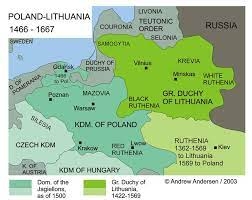
Un cas particulier était celui des communautés cosaques du sud de la Russie, qui préservaient le mode de vie des peuples nomades militaires de la steppe.
Lors des campagnes militaires vers les régions occidentales, la Rus moscovite commença à rassembler en un seul État tous les Slaves orientaux, restaurant ainsi, tant sur le plan territorial qu'ethnique, la Rus de Kiev, seulement complétée de manière significative par les terres orientales conquises par Moscou.
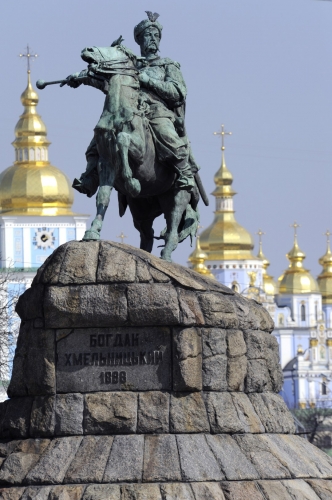
Libération de l'Ukraine : étapes
Au XVIIe siècle, le Cosaquie de Zaporozhie, sous la direction de l'hetman Bogdan Khmelnitsky, se révolte contre les Polonais et, lors de la Rada de Pereyaslavl (1654), décide de rejoindre le royaume moscovite.
En 1667, le tsar Alexei Mikhailovich conclut la trêve d'Andrusovo avec le Commonwealth polono-lituanien. La Russie reçoit l'Ukraine de la rive gauche. La "Paix éternelle" de 1686 attribue ces territoires à la Russie, ainsi que la russification de l'armée zaporizhienne. En outre, Moscou rachète Kiev, que les troupes russes tiennent depuis 1654.
Plus tard, pendant les guerres russo-turques, la Russie, qui a déjà le statut d'Empire, conquiert les vastes territoires de l'actuelle Ukraine du Sud et de la Crimée. Ces terres nouvellement acquises sont appelées Novorossiya. Chaque nouvelle guerre avec la Turquie renforce le contrôle territorial de la mer Noire par la Russie. Une partie importante de ces terres est colonisée par des paysans grand-russes provenant des régions centrales de la Russie.
En 1775, l'armée zaporizhienne située dans la région du Bas-Dniepr est liquidée. Une partie des cosaques part en Turquie, et l'autre est déplacée dans le Caucase du Nord, devenant la base de l'armée des cosaques du Kouban. Les anciennes terres militaires continuent d'être peuplées de paysans de la Petite Russie et de la Grande Russie. Les villes fondées par les tsars russes dans les nouveaux territoires : Mariupol, Yekaterinoslav (Dnepropetrovsk), Odessa, etc. sont peuplées par des représentants de différents groupes ethniques de l'Empire.
En 1793, lors du deuxième partage du Commonwealth polono-lituanien (État polonais), la Russie intègre à ses territoires l'Ukraine de la rive droite et la Podolie. Lors du troisième partage - en 1795 - la Volhynie. Seules la Galicie et la Rus (Ruthénie) subcarpatique restent en dehors de la Russie. Ainsi, la majorité de la branche sud-ouest des Slaves orientaux se retrouve dans un seul État, avec les Grands Russes et les Biélorusses, également inclus dans la Russie lors de la prise de la Lituanie, puis de la Pologne.
Dans le même temps, ni la Biélorussie ni l'Ukraine n'étaient des États au cours de ces périodes. Les principautés médiévales de la Russie occidentale n'ont pas pu maintenir leur indépendance et ont été subjuguées et démantelées par les Lituaniens, les Polonais et les Hongrois. Elles ont été préservées avec le statut d'un ethnos dans le contexte d'autres peuples. La Russie les a rendus à un État souverain slave oriental (russe au sens large du terme) avec une religion orthodoxe et de vastes territoires. Ils pouvaient rester des ethnies, ou se fondre dans le peuple uni de l'Empire.
Cela plaçait les Biélorusses et les Petits Russes devant un choix qui est resté et reste ouvert jusqu'à aujourd'hui. Certains pouvaient accepter l'identité panrusse (étatique, impériale) et fusionner avec elle, tandis que d'autres pouvaient choisir de préserver leur identité ethnique - y compris les dialectes linguistiques courants en Russie occidentale. C'est ce que faisaient généralement les communautés paysannes, même si elles avaient également un accès total aux vastes territoires de la Russie (dans la mesure où les paysans étaient libres dans l'État russe dans son ensemble, et où leur statut changeait à différentes époques). Quoi qu'il en soit, il y avait beaucoup de colons petits russes à la fois en Russie centrale et en Sibérie méridionale, qui à l'époque tsariste était appelée "Ukraine grise", où une partie importante de la population avait des racines petits russes.
Les territoires de Galicie, de Bucovine du Nord et de la Rus des Carpates sont restés le plus longtemps en dehors du contexte panrusse. Les deux premiers étaient jusqu'en 1918 inclus dans la partie autrichienne de l'Autriche-Hongrie (Cisleithanie). La Transcarpathie était la terre de la couronne hongroise (Transleithanie). Après la Première Guerre mondiale, la Galicie et la Volhynie, qui étaient russes depuis la fin du 18e siècle, ont fait partie de la Pologne redevenue un Etat indépendant.
La Bukovine du Nord a ensuite fait partie de la Roumanie, et la Transcarpathie est entrée dans le giron de l'Etat de Tchécoslovaquie.
Ces terres (à l'exception de la Transcarpathie) n'ont été réunies au reste de la Russie qu'avant la Grande Guerre patriotique, et la Transcarpathie - en 1945. Ensuite, en Russie même, il y avait un régime bolchévique. Par conséquent, les Ukrainiens occidentaux modernes ne connaissaient qu'une seule Russie - soviétique, dont l'attitude à l'égard de laquelle - en raison des caractéristiques totalitaires du régime bolchevique - était ambiguë, et parfois même directement négative.
Le nationalisme ukrainien, une construction artificielle
Passons maintenant à des époques plus modernes, lorsque la formation de nations politiques commence en Europe. Ce processus en Europe de l'Est, et encore plus en Russie, s'est déroulé avec un retard important, tout comme les réformes bourgeoises en général. La création de collectifs politiques dotés d'une identité fictive fondée sur la citoyenneté individuelle s'est déroulée beaucoup plus lentement qu'en Europe. En Russie, il y avait un Empire et un peuple, ainsi que de nombreux groupes ethniques qui préféraient ne pas s'intégrer pleinement au peuple et conserver leurs structures plus archaïques. Il en était ainsi non seulement avec les peuples de Sibérie ou du Nord, mais aussi avec ceux du Caucase, de l'Asie centrale, et même des régions occidentales habitées par des Slaves orientaux. Cependant, le mode de vie ethnique a été largement préservé par les communautés paysannes de la Grande Russie, qui constituaient la principale population de l'Empire.
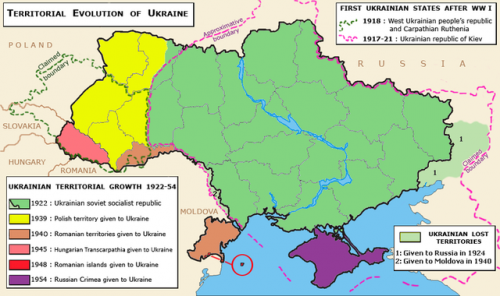
Compte tenu des contradictions politiques entre l'Empire russe et l'Europe occidentale, le processus de formation de nations artificielles est devenu un outil politique. Selon ce principe, les puissances occidentales, devenues elles-mêmes des nations, ont détruit leurs adversaires - la Turquie ottomane, l'Autriche-Hongrie et l'Empire russe. C'est ainsi que le nationalisme est né dans le contexte de la Russie. Mais ses diverses formes dans des contextes ethniques et territoriaux différents étaient qualitativement différentes. Ainsi, la Pologne a cherché à devenir indépendante en s'appuyant sur son histoire : après tout, autrefois, elle était non seulement indépendante de la Russie, mais elle était à son niveau, et l'a même surpassée, jusqu'à la prise de Moscou par les Polonais au temps des troubles. Le nationalisme polonais était basé sur une étape historique où les Polonais étaient un peuple à part entière - slave occidental et catholique - (strictement au sens ethno-sociologique). Le nationalisme des groupes ethniques turcs, beaucoup moins bien formé que le polonais, faisait appel à la Horde d'or et aux héros fabuleux des puissances des steppes.
Mais le nationalisme ukrainien qui a émergé à la fin du XIXe siècle était encore plus artificiel et sans fondement que les autres versions au sein de l'Empire russe. Il a été promu principalement par les Polonais, dans l'espoir d'opposer les Ukrainiens aux Grands Russes, d'obtenir un allié dans la lutte contre la Russie et, à long terme, de rétablir leur domination sur la Russie occidentale. Les Polonais ont pris une part active à la création d'une "langue ukrainienne" tout aussi artificielle, sursaturée de polonismes. Dans le même temps, en l'absence d'au moins un analogue de l'État politique des Slaves de l'Ouest et de l'Est dans l'histoire, la nation a été inventée de toutes pièces sur la base non pas de la culture réelle de la Petite Russie, mais d'inventions totalement ridicules.
Les autorités d'Autriche-Hongrie ont également contribué à la création du nationalisme ukrainien, en essayant de l'utiliser, d'une part, contre les Polonais en Galicie, et d'autre part, contre la Russie.
Le nationalisme ukrainien a commencé à prendre rapidement forme au moment de l'effondrement de l'Empire russe, mais il s'agissait des premiers pas, incomparables avec le nationalisme polonais. En un sens, "l'identité ukrainienne" n'était qu'un outil du nationalisme polonais dans sa lutte contre la Russie. Dans la confrontation géopolitique entre la Russie et l'Occident, ce nationalisme et, par conséquent, le projet de création d'une "nation ukrainienne" ont été instrumentalisés, entre autres, par l'Empire britannique pendant la guerre civile, lorsque Halford Mackinder, le fondateur de la géopolitique, était le haut-commissaire de l'Entente pour l'Ukraine.
La place de la "nation" dans le dogme bolchevique
La prise du pouvoir en Russie par les bolcheviks et l'expansion de leur pouvoir sur la quasi-totalité de ses territoires, y compris l'Ukraine, ont placé la question de la "nation" dans un nouveau contexte théorique.
Dans la théorie marxiste, l'ère des nations bourgeoises devait être remplacée par un système capitaliste unifié et une société civile mondiale correspondant à ses phases avancées. Cela créait les conditions de l'internationalisme. Mais contrairement aux libéraux, les marxistes croyaient qu'après le triomphe du mondialisme capitaliste, l'ère des révolutions prolétariennes devait venir, lorsque la classe ouvrière internationale renverserait le pouvoir également international du capital. Marx concevait le communisme comme la phase suivante après l'ère où la société civile deviendrait mondiale et où aucun groupe ethnique, peuple ou nation ne devrait subsister. C'est ce qui s'est passé en théorie.
En pratique, les bolcheviks ont pris le pouvoir dans un Empire précapitaliste, presque médiéval, où l'essentiel était le peuple russe (au sens ethno-sociologique), avec de nombreuses ethnies ayant une vision archaïque du monde et une religion profondément enracinée. Personne n'avait de nation. Et la modernisation et l'européanisation de l'élite impériale étaient superficielles et peu profondes. Les transformations capitalistes étaient également fragmentaires, et la grande majorité de la population était composée de paysans. Par conséquent, Marx a exclu la possibilité d'une révolution prolétarienne en Russie : elle n'est pas devenue suffisamment capitaliste, et en outre, le capitalisme n'a pas pleinement révélé son potentiel mondial. Mais les bolcheviks, malgré tout, ont pris le pouvoir et ont tenté de le conserver à tout prix. Cela les a obligés à opter pour des constructions théoriques extravagantes.
Les bolcheviks et la question ukrainienne
Dans un premier temps, les bolcheviks ont soutenu le nationalisme ukrainien, le considérant comme un allié naturel dans la lutte contre l'Empire, contre le "tsarisme". Cela était conforme à la partie du marxisme qui soutenait que toutes les sociétés doivent passer par la phase capitaliste et se former en nations pour ensuite les surmonter. Les Ukrainiens n'étaient ni une nation, ni une société capitaliste, ni un État, mais faisaient partie du peuple de l'Empire russe, conservant dans certains secteurs des caractéristiques culturelles ethniques. Par conséquent, les bolcheviks ont dû inventer l'Ukraine afin de l'insérer avec beaucoup d'exagération dans leur théorie du progrès socio-économique.
Après avoir pris le pouvoir, les bolcheviks ont radicalement changé leur attitude envers l'Ukraine. Désormais, la présence d'un État ukrainien allait à l'encontre des intérêts des bolcheviks. Ils ont donc annoncé que le capitalisme avait déjà été construit en Ukraine, que la nation ukrainienne avait été créée, qu'elle avait vécu assez longtemps et qu'elle était maintenant prête à entrer consciemment dans l'ère post-nationale de l'internationalisme prolétarien. Cependant, pendant un certain temps dans les années 1920 et 1930, le discours internationaliste s'est combiné à l'"ukrainisation" - l'imposition forcée de la langue et de la culture ukrainiennes à toute la population qui se trouvait dans le cadre de l'Ukraine soviétique. C'est ainsi qu'est né le territoire de l'Ukraine moderne, dans lequel l'histoire de l'Empire russe se mêle à l'arbitraire dogmatique des bolcheviks.
La RSS d'Ukraine et ses composantes
Lénine a réuni dans la République socialiste soviétique d'Ukraine
- le territoire de la Hétairie cosaque, qui a prêté serment d'allégeance au royaume russe en 1654 ;
- les régions de Kiev et de Tchernihiv, conquises aux Polonais par Alexei Mikhailovich en 1667, qui font partie de l'Hetmanat autonome (Petite Russie) au sein de la Russie ;
- la Nouvelle Russie (de Zaporozhye à Odessa), conquise sur l'Empire ottoman par Catherine la Grande ;
- L'Ukraine de la rive droite, intégrée à l'Empire russe par la même Catherine après les partages de la Pologne ;
- les terres primitivement russes (peuplées à la fois de Grands Russes et de Petits Russes) - Slobozhanshchina (Kharkov) et Donbass.
À la veille de la Grande Guerre patriotique, l'URSS a intégré la Volhynie et la Galicie, la Bucovine du Nord, la Bessarabie du Nord et la Bessarabie du Sud à l'Ukraine (ces dernières ont fait partie de l'Empire russe de 1812 jusqu'à son effondrement). En 1945, le territoire de la Rus subcarpathique y a également été ajouté, habité par une autre branche des Slaves orientaux - les Rusyns (Ruthènes).
Khrouchtchev y a ensuite ajouté la Crimée en 1954.
Puisque personne n'allait construire une nation à part entière dans l'Ukraine socialiste (selon l'idéologie des bolcheviks, elle appartenait au passé capitaliste - mais pas pour longtemps), toute la population était considérée comme un secteur standard d'un seul peuple soviétique. Les bolcheviks ont combattu sans merci le "nationalisme bourgeois".
16:03 Publié dans Actualité, Affaires européennes | Lien permanent | Commentaires (0) | Tags : alexandre douguine, russie, ukraine, histoire |  |
|  del.icio.us |
del.icio.us |  |
|  Digg |
Digg | ![]() Facebook
Facebook
samedi, 12 mars 2022
Opération militaire en Ukraine : Analyse géopolitique
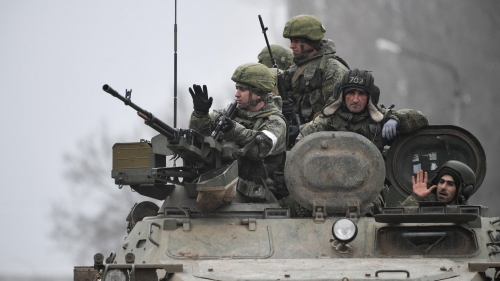
Opération militaire en Ukraine : Analyse géopolitique
En toute exclusivité: la perspective russe selon Alexandre Douguine
Alexandre Douguine
Source: https://katehon.com/en/article/military-operation-ukraine-geopolitical-analysis?fbclid=IwAR3Y3lIY5eabLUPz3tvclSDLIcGNl6PFCv0d4vj71c0Avnjof-Ojj7AzSBM
La question ukrainienne à l'origine de la géopolitique
La place de l'Ukraine dans la confrontation géopolitique entre la Terre et la Mer a déjà fait l'objet de nombreux écrits et de descriptions détaillées. Il est d'ailleurs symbolique que le fondateur de la géopolitique, Halford J. Mackinder, ait été le haut commissaire de l'Entente pour l'Ukraine pendant la guerre civile en Russie. Et à cette époque-là, dans le gouvernement blanc de Wrangel, le fondateur de l'eurasisme, le géographe Piotr Savitsky, qui fut le premier, dans le journalisme de langue russe, à mentionner lui-même le terme "géopolitique" et à exposer les points principaux de cette méthodologie, travaillait comme assistant du ministre des Affaires étrangères Peter Struve.
La géopolitique : la guerre continuelle entre la terre et la mer
Mackinder a formulé la théorie de la grande guerre des continents, l'opposition entre la civilisation de la Mer (l'Occident en général, l'Empire britannique plus spécifiquement) et la civilisation de la Terre (Heartland, Russie-Eurasie) quelques années plus tôt, en 1904, dans son célèbre ouvrage The Geographic Pivot of History. Terre (Rome, Sparte) et Mer (Carthage, Athènes) représentent deux civilisations antagonistes, opposées en tout - traditionalisme et modernité, spiritualité et matérialisme, esprit militaire et esprit commercial. Le conflit qui les oppose est une constante de l'histoire du monde.
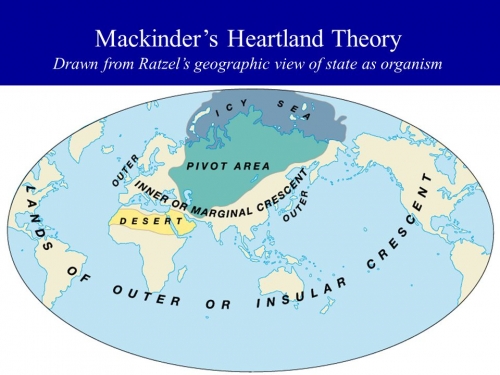
L'Eurasie, théâtre d'affrontements géopolitiques
Au cours des derniers siècles, lorsque le Grand Jeu, la confrontation entre les empires britannique et russe, battait son plein, la grande guerre continentale s'inscrivait dans l'espace de l'Eurasie. Dans cet espace, le "Heartland", c'était la Russie. Et la "civilisation de la mer" était portée par l'Angleterre. L'Angleterre tentait d'enserrer l'Eurasie de l'extérieur, depuis les océans. La Russie se défendait de l'intérieur, en essayant de briser le blocus.
La principale bande territoriale où se multipliaient les tensions se nommait alors, dans le langage spécial de la géopolitique mackindérienne, le Rimland, la "zone côtière". Elle s'étendait de l'Europe occidentale à l'Asie du Sud-Est, comprenait l'Inde et la Chine, en passant par le Moyen-Orient et l'Asie centrale.
L'objectif de la Mer était de subjuguer le Rimland. L'objectif de la Terre était de briser cette influence et de déserrer l'anneau de l'anaconda thalassocratique qu'il fallait rétrécir. C'est la raison de l'avancée de la Russie en Asie centrale et en Extrême-Orient.
D'où la formule principale de la géopolitique: "Qui contrôle l'Europe de l'Est contrôle le Heartland. Qui contrôle le Heartland, contrôle le monde". Telle est la théorie.
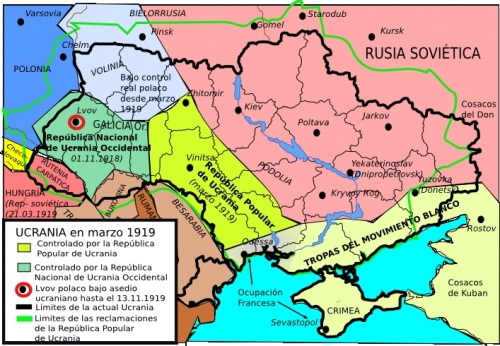
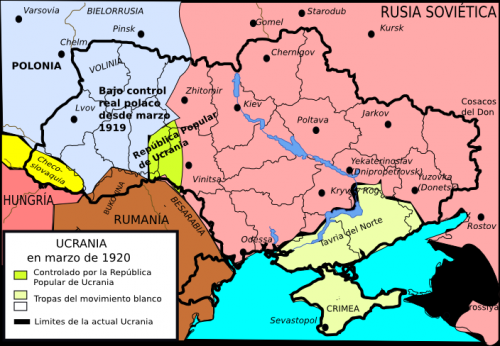
Le démembrement de la Grande Russie
De par sa position de Haut Commissaire de l'Entente, Mackinder tenta de mettre la théorie en pratique. La guerre civile russe a donné à la civilisation de la mer une nouvelle chance de repousser les frontières du Rimland vers l'est, aux dépens des territoires qui quittaient alors la sphère de la puissance russe - la Finlande, la Pologne et, surtout, l'Ukraine.
Mackinder (comme Savitsky) avait compris que la victoire des bolcheviks conduirait inévitablement à une confrontation avec l'Occident et à une tentative de recréer l'Empire russe sous une nouvelle forme (et c'est exactement ce qui s'est passé). Et face à cette perspective, Mackinder a exigé que le gouvernement britannique soit plus actif dans l'aide aux Blancs [1], il a tenté de convaincre les dirigeants anglais de la nécessité de soutenir l'indépendance de l'Ukraine. Il a également élaboré un plan visant à séparer de la Russie la grande région du Caucase méridional, la Biélorussie, l'Asie centrale, ainsi que la Sibérie orientale et même un certain nombre de territoires du sud de la Russie. Plus tard, en 1991, l'effondrement de l'URSS permet, dans une large mesure, de réactiver le plan de Mackinder.
L'Ukraine et le cordon sanitaire
L'Ukraine jouait un rôle majeur dans le plan géopolitique de Mackinder. Ce territoire, avec la Pologne et les pays d'Europe de l'Est, faisait partie du "cordon sanitaire", une zone stratégique qui devait être sous le contrôle direct de l'Angleterre et de la France (les alliés de l'Entente à l'époque) et empêcher tout rapprochement entre la Russie et l'Allemagne. Retenue par un "cordon sanitaire", la Russie-Eurasie ne pouvait pas devenir un Empire à part entière. Sans l'Ukraine, la Russie n'est pas un Empire. Et de plus, l'Ukraine, rendue hostile à la Russie et placée sous le contrôle direct des Anglo-Saxons, couperait la Russie de l'Europe continentale, où l'Allemagne, à son tour, était un Heartland, mais pas un Heartland mondial (comme la Russie), mais local, européen. Le conflit de l'Angleterre avec l'Allemagne (aussi avec l'Autriche) était une constante de la géopolitique européenne.
En conséquence, le projet d'une Ukraine indépendante était initialement dirigé contre la Russie et était supervisé par les Anglo-Saxons.
Les bolcheviks créent et démantèlent simultanément l'Ukraine
Nous savons que pendant la guerre civile, les Blancs ont adhéré à une politique de restauration d'un Empire uni et indivisible. En même temps, ils dépendaient du soutien de l'Entente, qui leur imposait certaines conditions. Quoi qu'il en soit, le gouvernement britannique, n'étant pas d'accord avec Mackinder sur la nécessité d'un soutien fort aux Blancs en échange de leur accord à la sécession de l'Ukraine, les Blancs ont perdu la guerre. Dans cette configuration, le sujet a donc été écarté de l'ordre du jour.
Les bolcheviks, quant à eux, ont d'abord soutenu l'Ukraine et encouragé activement les cercles nationalistes en pensant qu'ils s'étaient orientés contre le "tsarisme", mais ils ont ensuite opté pour une politique centraliste, voyant que l'Ukraine n'allait pas accepter le pouvoir bolchevique sans se plaindre et cherchait à céder aux Anglo-Saxons (ce qui signifiait alors le "capitalisme mondial"). Par conséquent, comme Mackinder l'avait prévu, Lénine a commencé la saisie directe de l'Ukraine, qui n'avait pas eu, dans son passé, une histoire d'État indépendant et était une proie relativement facile pour les Rouges. Les Rouges n'ont pas réussi à conquérir la Pologne par le même stratagème. Mais le territoire de la Biélorussie, qui était revendiqué par la Pologne de Piłsudski, est resté aux mains des Rouges.
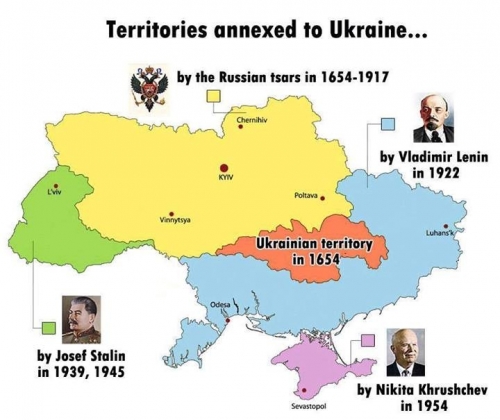
Ensuite, déjà sous l'autorité des bolcheviks en 1922, Lénine a donné à la République socialiste soviétique d'Ukraine les vastes territoires qui avaient toujours fait partie de l'Empire russe - Slobozhanshchina, Donbass, Novorossiya, ainsi que de vastes zones au nord (oblast de Tchernigov) et à l'ouest (Petite Russie proprement dite). La Galicie est restée sous la tutelle de la Pologne, la Bucovine faisait partie de la Roumanie. La Crimée appartenait à la RSFSR.
Mais cet arrangement territorial de l'Ukraine n'impliquait pas véritablement la création d'un État. Le pouvoir bolchevique s'étendait à tous les territoires de l'URSS et, dans l'esprit de l'idéologie internationaliste, il ne pouvait être question d'un statut d'État pour les différentes républiques. Il s'agissait presque d'une division purement administrative dans le cadre d'un pouvoir solidement unifié. C'est exactement ce que Mackinder avait craint.
Les bolcheviks ont à la fois créé l'Ukraine et l'ont abolie (en tant qu'État indépendant).
L'Ukraine dans l'URSS après la Grande Guerre patriotique
La Galicie, la Volhynie et la Bukovine ont été annexées à l'Ukraine juste avant la Grande Guerre patriotique et la Transcarpathie - juste après la guerre. Mais à ce moment-là, la Russie-Eurasie sous la forme de l'URSS s'est déplacée de manière significative vers l'ouest, déplaçant la frontière du pays au détriment du Rimland, et établissant son contrôle sur l'Europe de l'Est, qui était toute entière sous le pouvoir de Moscou. L'URSS a ainsi réduit à néant et totalement aboli le "cordon sanitaire" de Mackinder et de Lord Curzon, s'installant directement en Europe continentale et s'emparant, en fait, des territoires de l'ancienne Prusse/Brandebourg (RDA).
Dans une telle position - profondément à l'arrière de ce rimland européen de l'Eurasie et donc dans le Heartland eurasien - l'Ukraine a existé jusqu'en 1991. Dans le même temps, pour des raisons de convenance purement administrative dans les limites d'un État absolument unitaire, Khrouchtchev a transféré en 1954 la Crimée à Kiev. Du point de vue géopolitique, cependant, cela ne signifiait rien, car toutes les frontières entre les sujets de l'URSS, les républiques fédératives, étaient conditionnelles et ne signifiaient rien du tout dans la pratique.
L'atlantisme et le monde bipolaire
Pendant la guerre froide, l'Occident est revenu à sa pratique particulière de la géopolitique. C'est ainsi qu'en 1949, suivant les modèles mise au point par Mackinder, l'OTAN (l'Organisation du Traité de l'Atlantique Nord) a été créée. Le terme "Atlantique" ayant été introduit dans le sigle de l'organisation militaire, le vocable "atlantisme" devient synonyme de "civilisation de la mer", de thalassocratie, dans le sens exact où Mackinder l'entendait. L'"atlantisme", c'est l'Occident et ses alliés, le monde capitaliste avec un noyau dur anglo-saxon, dont le centre, au XXe siècle, s'est progressivement déplacé de Londres à Washington, de l'Angleterre aux États-Unis.
La carte dessinée par Mackinder correspondait parfaitement à l'équilibre des forces dans la guerre froide, et les deux camps - le communiste et le capitaliste - étaient strictement alignés sur les critères attribués à la Terre et à la Mer. Le bloc de l'Est était la Terre, avec l'URSS en son centre, le Heartland. Le bloc occidental était la Mer, centrée sur l'Atlantique (les Anglo-Saxons), mais comprenait les colonies stratégiques d'après-guerre des États-Unis - les pays d'Europe, le Japon et d'autres États du tiers-monde qui proclamaient leur allégeance au capitalisme. Ils étaient disposés en ordre dispersé en Asie, en Afrique et en Amérique latine, qui constituaient la carte géopolitique de la confrontation mondiale. Terre et Mer s'affrontaient rarement directement (comme lors de la crise des missiles de Cuba), et agissaient généralement par le biais de leurs mandataires, les régimes pro-soviétiques ou pro-américains. Et si la Terre était directement impliquée dans un conflit - comme en Tchécoslovaquie, en Afghanistan, etc., alors la Mer s'y opposait par le biais de mandataires, de "proxies", de groupes et de mouvements antisoviétiques sans intervenir directement. Et quand la Mer intervenait ouvertement - comme en Corée et au Vietnam - la Terre aidait indirectement, avec des conseillers, la diplomatie, l'économie, etc.
Le problème du Rimland
Pendant la guerre froide, le problème du Rimland est redevenu extrêmement pertinent. Ainsi, le géopolitologue américain Nicholas Spykman, révisant les théories de Mackinder, arrive à la conclusion que c'est le Rimland qui est la principale zone de confrontation. Il formule la loi de la géopolitique comme suit : "Celui qui contrôle le Rimland contrôle le monde". Mais il ne s'agit pas d'une nouvelle géopolitique, mais d'une réinterprétation - mineure - du poids des zones principales dans la théorie de Mackinder. D'autant plus que Mackinder lui-même a commencé par énoncer une théorie sur "l'Europe de l'Est", c'est-à-dire sur ce qui deviendra le "cordon sanitaire", et que celui-ci appartient au Rimland.
Quoi qu'il en soit, la guerre froide, d'un point de vue géopolitique, était une bataille pour le Rimland. Moscou a tenté d'étendre son influence - par le biais de partis et de mouvements de gauche - en Europe, au Moyen-Orient, en Asie, en Afrique et en Amérique latine. À une certaine époque, la Chine maoïste faisait également partie d'un camp socialiste unique, c'est-à-dire du Heartland eurasien.
L'attaque de l'Atlantisme
Lorsque l'URSS a commencé à s'affaiblir, les géopoliticiens atlantistes (Z. Brzezinski, R. Gilpin, etc.) ont commencé à penser et à agir de manière plus avant-gardiste. Outre le modèle bipolaire et le déplacement partiel de l'équilibre à la périphérie du monde et le long des contours de l'Eurasie, ils ont commencé à élaborer des concepts plus audacieux, évoquant un monde unipolaire. Ainsi, les idées de Mackinder ont retrouvé leur fraîcheur et leur pertinence. Pour obtenir la victoire décisive et finale de la civilisation de la mer, il fallait briser le bloc de Varsovie, puis de préférence l'URSS, et enfin ce qu'il en restait. En d'autres termes, faire progresser de manière significative le Rimland dans les profondeurs de la terre, en le bridant et en bloquant l'accès aux "mers chaudes", vers lesquelles la Russie tentait constamment de se porter.
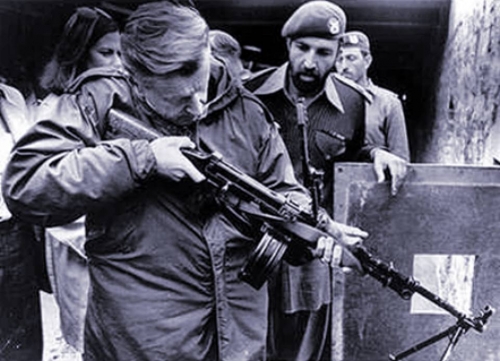
L'un des géopoliticiens atlantistes les plus constants était Zbigniew Brzezinski. À l'époque bipolaire, il soutenait farouchement les forces antisoviétiques en Afghanistan, jusqu'à et y compris Al-Qaïda. Au début des années 80, Brzezinski et Kissinger se sont efforcés de rompre définitivement les derniers liens que la Chine entretenait encore avec l'URSS, en cherchant à l'inclure dans l'économie mondiale et à l'intégrer progressivement dans la civilisation de la mer.
Lorsque les processus destructeurs de l'URSS ont commencé à agir, les atlantistes ont augmenté la pression sur l'Europe de l'Est, provoquant, fomentant et soutenant par tous les moyens possibles des sentiments artificiellement antisoviétiques/russophobes. D'un point de vue géopolitique, le soviétique et le russe coïncidaient à l'époque.
Avec Gorbatchev, l'effondrement rapide du camp socialiste a commencé. La Terre reculait, la Mer avançait. Nous ne devons donc pas être surpris que l'expansion de l'OTAN vers l'Est ait commencé et se soit parachevé. Cette expansion était à l'origine inscrite dans la théorie géopolitique de l'atlantisme. On ne pouvait rien attendre d'autre de la politique atlantiste.
La création de l'anti-Russie
Lorsque l'on a assisté à l'effondrement de l'URSS, les projets de Mackinder visant à démembrer la Russie-Eurasie, redevenaient toujours plus pertinents. Les frontières conditionnelles des républiques au sein d'un État unitaire, entièrement et étroitement contrôlé par le parti communiste, se sont soudainement transformées en frontières d'États-nations souverains. Tous les États post-soviétiques ont été créés selon les moules atlantistes. Ces entités n'ont d'autre sens que d'être anti-russes. L'une de ces "Anti-Russie" était la Fédération de Russie elle-même. Mais parce que la Fédération de Russie occupait le territoire du Heartland, même si elle s'est considérablement réduite, elle représente toujours la Terre ennemie aux yeux des géopoliticiens atlantistes, c'est-à-dire de l'ennemi thalassocratique. Et pour achever l'ennemi, il a fallu pousser l'OTAN plus loin vers l'Eurasie, et aussi tenter de démembrer la Russie elle-même (la première campagne de Tchétchénie, la vague des séparatismes internes à la Fédération de Russie, etc.)
La Russie ne pourra jamais se relancer sans l'Ukraine.
Tous ces processus, Brzezinski les a compris et a contribué à les mettre en pratique (comme Mackinder l'avait fait auparavant). Dans son célèbre livre Le grand échiquier, Brzezinski parle ouvertement de la nécessité de démembrer davantage la Russie, de renforcer le "cordon sanitaire", etc. Plus important encore, Brzezinski comprend le rôle de l'Ukraine dans cette question. Brzezinski dit à son propos que la chose la plus importante est :
- d'arracher irrévocablement l'Ukraine, alors hésitante, à la Russie,
- d'en faire un avant-poste de l'Atlantisme et
- d'imposer à son peuple le nationalisme russophobe comme idéologie principale.
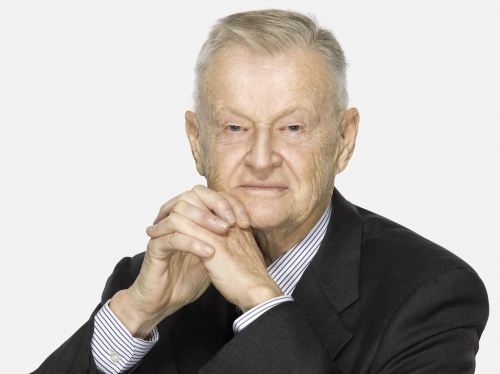
Sans l'Ukraine, la Russie ne sera jamais en mesure de devenir une puissance souveraine à part entière, un Empire, un pôle indépendant du monde multipolaire. Ainsi, le sort de l'unipolarité et du globalisme (pour Brzezinski, c'est presque la même chose), dépend de la capacité de l'Occident à mettre en œuvre la séparation de l'Ukraine d'avec la Fédération de Russie. Après tout, si la Russie et l'Ukraine s'unissent - d'une manière ou d'une autre, l'unipolarité s'effondrera et la carte géopolitique changera à nouveau de manière irréversible.
La bataille pour l'Ukraine et contre la Russie est une constante historique dans la stratégie géopolitique de l'Occident. Cela explique tout, de la déclaration d'indépendance à la révolution orange Iouchtchenko-Timochenko, en passant par le Maïdan et huit années de préparation intensifiée par Kiev, sous la houlette des instructeurs atlantistes, aux opérations militaires visant à s'emparer du Donbass et de la Crimée.
La naissance de la géopolitique en Russie : L'Eurasie comme sujet
Depuis le début des années 1990 en Russie, juste au moment de l'effondrement de l'URSS et de l'arrivée au pouvoir des agents atlantistes (l'ancien ministre des Affaires étrangères Andrey Kozyrev a directement admis qu'il était un atlantiste), contrairement à l'attitude politique et idéologique de base envers le libéralisme et l'occidentalisme, la Russie - principalement dans les cercles militaires (en particulier, à l'Académie d'état-major militaire) - a commencé à développer sa propre école géopolitique. Elle était basée sur l'eurasisme, car ce sont les premiers Eurasiens russes qui, dans les années 1920, ont décrit la carte géopolitique de la confrontation entre la Russie et l'Occident, en dehors de l'idéologie communiste (les Eurasiens étaient des Blancs). Leurs idées sont les plus adaptées à la situation actuelle, face à l'offensive de l'OTAN à l'Est et aux propres politiques incompréhensibles (par endroits perfides) de Moscou. Les militaires ne pouvaient pas prendre pour amis ceux dont ils enregistraient toutes les heures les intentions et les actions agressives contre la Russie. Mais le gouvernement libéral est resté sourd à la géopolitique. Néanmoins, l'école géopolitique ne pouvait être détruite. Tout le monde était occupé par les processus fascinants de la corruption totale.
La géopolitique expliquait parfaitement ce qui se passait en Europe de l'Est et dans l'espace post-soviétique dans les années 1990 (l'écrasement par la mer de la terre, l'expansion des "cordons sanitaires" et du territoire du Rimland), mais cette compréhension restait à l'intérieur des cercles militaires, qui n'appréciaient guère la politique officielle, mais qui n'avaient à l'époque aucun poids ni aucune influence politique. Les atlantistes, en revanche, ont méthodiquement poursuivi leur cause, nourrissant et renforçant l'anti-Russie, à la fois à l'extérieur et, en partie, au sein même de la Fédération de Russie.
Poutine change le vecteur géopolitique
Tout a changé lorsque Poutine est arrivé au pouvoir. Il a commencé par restaurer la souveraineté de la Russie, à se débarrasser des agents atlantistes qui étaient à la tête du pays, à concentrer et à développer son potentiel militaire, et à renforcer l'unité de la Russie. La deuxième campagne de Tchétchénie, l'introduction des districts fédéraux et les changements dans la législation ont renforcé l'intégrité territoriale et la verticalité du pouvoir. Poutine a progressivement commencé à s'opposer de plus en plus à l'Occident et à mener une politique d'intégration eurasienne dans l'espace post-soviétique. En bref, Poutine a rendu à la Russie le statut de sujet de la géopolitique, et a anénati son état de déréliction, qui faisait d'elle un objet de la géopolitique globale, atlantiste. Il a rejoint de manière consciente et responsable la grande guerre continentale au nom de la Terre.
Cela n'a pas échappé à l'Occident et a entraîné une pression accrue sur les pays post-soviétiques pour qu'ils adoptent une position de plus en plus anti-russe, pour qu'ils s'intègrent plus rapidement aux structures occidentales. Cela a touché tous les pays post-soviétiques, mais surtout l'Ukraine. Il dépendait de l'Ukraine de déterminer si la Russie serait capable ou non de restaurer pleinement sa souveraineté géopolitique. Selon les lois de la géopolitique, sans l'Ukraine, la Russie n'est pas un Empire, pas un pôle, pas une civilisation, mais avec l'Ukraine, elle est un Empire, un pôle et une civilisation. Et cette formule peut être lue depuis deux positions - celle des yeux de la Mer et celle des yeux de la Terre. De toute évidence, Poutine l'a lue avec les yeux de la Terre, car il était et reste le dirigeant du Heartland, conscient et puissant.
Le nationalisme ukrainien comme outil géopolitique de l'Atlantisme
Dans le même temps, l'initiateur des cataclysmes en Ukraine était l'Occident atlantiste. Même les politiques neutres, modérément pro-occidentales - multi-vectorielles - de Kuchma ou de Yanukovich ne convenaient pas aux atlantistes. Ceux-ci ont fait pression sur Kiev pour que l'Ukraine se transforme le plus rapidement possible en une anti-Russie agressive et radicale, attaquante. Dans cette logique, Kiev devait attaquer.
Cela explique la Révolution orange, le Maïdan et les raisons de l'opération militaire russe actuelle.
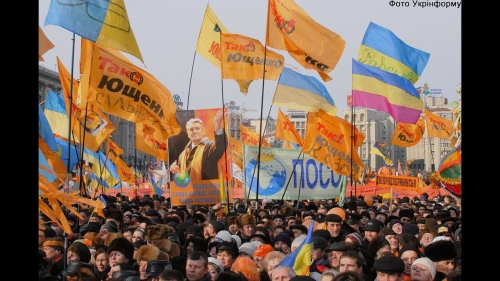
L'Occident se battait pour l'Ukraine. Il faut tenir compte du fait que l'Ukraine n'a pas du tout d'histoire en tant qu'Etat inscrit dans la durée, et que les territoires dans lesquels elle se trouve sont historiquement accidentels et sont le résultat de la créativité administrative des bolcheviks. Lorsque Poutine a justifié l'opération militaire en Ukraine en disant que "Lénine a créé l'Ukraine", il avait parfaitement raison. Cependant, Lénine n'a pas créé l'Ukraine en tant que telle, mais une des zones de contrôle bolchevique parmi d'autres. La nationalité, selon la théorie bolchevique, devait être complètement dépassée dans une société internationale socialiste. Lénine a créé l'Ukraine et l'a en fait immédiatement abolie.
Par conséquent, après 1991, il y avait sur le territoire de l'Ukraine des peuples et des territoires ayant chacun une histoire, une identité, une langue et une culture complètement différentes. La moitié d'entre eux n'étaient pas du tout différents des Russes. La seconde moitié était constituée d'Ukrainiens plus ou moins russifiés. Et seule une écrasante minorité professait une idéologie nationaliste autoproclamée. Mais seule cette minorité était capable, selon les géopoliticiens occidentaux, de transformer les Ukrainiens en une "nation" et ce, à un rythme accéléré. Il s'agissait d'un projet géopolitique atlantiste. Dans d'autres pays, l'Occident a soigneusement éradiqué le nationalisme, surtout dans ses formes radicales. En Ukraine, cependant, l'Occident a agi exactement à l'inverse, soutenant activement toutes les formes de nationalisme jusqu'aux plus extrêmes. Selon les stratèges atlantistes, c'était le seul moyen d'accélérer la formation d'une construction artificielle, rigidement russophobe, un simulacre virtuel de nation. C'est pourquoi la sphère de l'information était si importante, car elle inculquait de manière obsessionnelle aux Ukrainiens une haine infondée des Russes et de tout ce qui unissait nos peuples. Toutes les inepties étaient utilisées, jusqu'à "l'ancienne civilisation des anciens Ukrainiens", ce qui n'aurait provoqué qu'une totale perplexité en Occident. Cependant, toute l'opération était supervisée par les services secrets atlantistes, et c'est pourquoi l'Occident a créé une image artificielle de l'Ukraine comme une jeune démocratie ouvertement vulnérable, souffrant de la menace russe. En fait, un état d'esprit nazi s'est affirmé de manière obsessionnelle dans la société, inextricablement lié à l'atlantisme et même au mondialisme libéral (peu importe combien ces systèmes se contredisent, car le mondialisme nie l'État, et le libéralisme toute identité collective, et surtout l'identité nationale).
L'affrontement final
Le virage russophobe prononcé de Kiev et de l'ensemble de la société ukrainienne est le résultat des événements de Maidan de 2013-2014, qui ont culminé avec l'expulsion et la fuite du président Ianoukovitch. Ianoukovitch n'était ni un politicien pro-russe ni un eurasiste. C'était plutôt un pragmatique à courte vue, mais même cela, du point de vue de l'Occident, était tout aussi inacceptable. L'Occident voulait "tout et pas tout". En regardant la Russie de Poutine se renforcer et en tenant compte des événements de 2008 en Géorgie, où l'Occident a également opposé Saakashvili à la Russie, mais où le résultat n'était clairement pas en faveur de la civilisation de la Mer, les Atlantistes ont décidé d'agir par les méthodes les plus radicales.
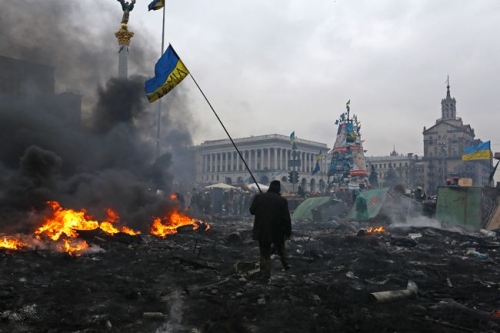
L'actuel président américain Joe Biden, alors vice-président, et d'autres membres de son équipe, comme Victoria Nuland, etc., ont participé très activement au renversement de Ianoukovitch et à la préparation du Maïdan. L'objectif était le même que celui de Mackinder et Brzezinski : arracher enfin l'Ukraine à la Russie et préparer le terrain pour un conflit violent entre Kiev et Moscou.
Poutine a répondu en ramenant la Crimée dans le giron russe et en soutenant le Donbass, mais cela n'a pas résolu le problème sur le plan géopolitique. Poutine a déjoué le plan visant à accélérer l'adhésion de l'Ukraine à l'OTAN, notamment celui qui visait à expulser la marine russe de Sébastopol, il a ensuite empêché les génocides en Crimée et dans le Donbass, mais l'ampleur de l'Ukraine était trop importante pour qu'il puisse poursuivre son offensive eurasienne en 2014 et mener la défense du monde russe à sa conclusion logique. À ce moment-là, la Terre a cessé de réagir. Le processus des accords de Minsk avait commencé, mais d'un point de vue géopolitique, il était évident qu'aucune solution pacifique ne pourrait être trouvée et qu'une confrontation directe se produirait inévitablement tôt ou tard. En outre, les services de renseignement russes ont reçu des informations selon lesquelles la partie ukrainienne ne faisait que profiter de ce report pour préparer une opération militaire dans le Donbass, puis en Crimée.
Les forces nationalistes qui avaient remporté le coup d'État de 2014 à Kiev haïssaient encore plus la Russie, déployaient une propagande massive pour laver le cerveau de la population, lançaient une opération punitive brutale contre les habitants du Donbass, victimes d'un génocide systématique, et préparaient une attaque contre le Donbass et la Crimée d'ici le printemps 2022. Dans le même temps, Kiev, en collaboration avec l'Occident, élaborait des plans pour construire ses propres armes nucléaires. En outre, il y avait des laboratoires biologiques dispersés dans toute l'Ukraine, engagés dans des expériences illégales pour produire des armes biologiques.
Tout cela faisait partie d'une même géostratégie atlantiste.
[1] L'armée blanche (également connue sous le nom de Gardes blancs ou simplement Blancs) était des forces militaires qui ont combattu le régime bolchevique pendant la guerre civile russe.
15:22 Publié dans Actualité, Affaires européennes, Géopolitique, Histoire | Lien permanent | Commentaires (1) | Tags : alexandre douguine, histoire, ukraine, russie, urss, europe, affaires européennes, eurasie, eurasisme, géopolitique, politique internationale |  |
|  del.icio.us |
del.icio.us |  |
|  Digg |
Digg | ![]() Facebook
Facebook
mardi, 22 février 2022
La noologie de l’ancienne tradition chinoise
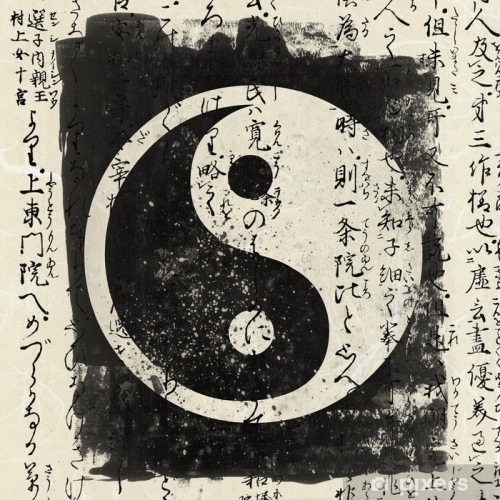
La noologie de l’ancienne tradition chinoise
Alexandre Douguine
L’ontologie des souffles : le Dionysos jaune
La formule Yin-Yang, sa dimension donnée dans le Tao, et sa distribution dans le calendrier et la carte des cinq éléments, pris ensemble, décrivent la structure de l’ontologie spécifiquement chinoise qui diffère fondamentalement de toutes les autres ontologies. L’ontologie chinoise est basée sur des éléments et des approches qui correspondent à un modèle noologique spécial. L’essence de ce modèle est qu’il n’est pas simplement dominé par le Logos de Dionysos, mais que le Logos de Dionysos est le seul élément connu et accepté dans ce modèle, alors que toutes les autres zones noologiques « subissent » ce « dionysisme » chinois sans même acquérir de fixation autonome. Ici, dans l’ancienne tradition chinoise, le Logos de Dionysos est complet, et l’équilibre qui constitue son essence ne penche dans la direction d’aucun autre Logos – ni vers Apollon, comme c’est le cas dans la majorité des formes indo-européennes de dionysisme [1], ni dans la direction de Cybèle, comme dans de nombreuses cultures d’orientation chtonienne et titanique [2]. Le Yin-Yang et le Tao ne peuvent pas être corrélés avec le modèle platonicien du Logos apollinien, où le centre est le ciel éternel et où le niveau médian est le royaume des phénomènes temporels vivants, ni avec les doctrines matérialistes de la Grande Mère et du Titanisme, qui attachent les phénomènes et les choses à la dure section de l’espace et du temps ou à la figure du démiurge matériel, c’est-à-dire le Logos Noir de Cybèle.
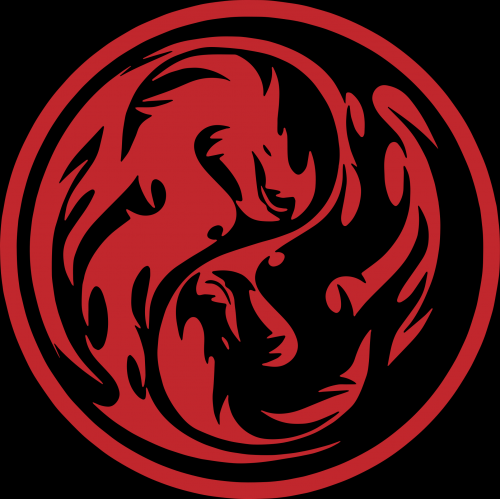
Le Logos chinois se déploie exclusivement et absolument dans la sphère médiane, dans le monde intermédiaire qui est conçu comme le principal et unique. Ni le Ciel et le Yang ni l’Eau et le Yin, c’est-à-dire ni les hauteurs apolliniennes ni les profondeurs cybéliennes n’acquièrent une ontologie autonome ou un Logos particulier. Il n’y a pas d’extrêmes, il y a seulement le centre entre eux, qui les constitue au cours d’un subtil jeu dialectique. Les dieux, les humains, les éléments, les empires, les rites, les animaux, les luminaires, les cycles et les terres représentent tous le déploiement du Logos médian et ne sont que des traces de la pulsation rythmique et dynamique du Centre toujours situé également au milieu entre deux pôles qui sont dépourvus d’être autonome et qui se recoupent l’un l’autre en vertu de la grande harmonie. Ce monde médian se déployant autour du centre absolu peut être imaginé comme un navire qui a levé les ancres l’attachant au Ciel et au Monde Souterrain. Le monde phénoménal de l’ontologie du Yin-Yang n’a pas d’idées et de paradigmes archétypaux, et il ne tient pas non plus la présence matérielle comme une condition nécessaire de la manifestation. L’ontologie chinoise est principalement et fondamentalement légère, comme indiqué par Marcel Granet dans son expression « la magie du souffle ». Nous pouvons ainsi parler d’une « ontologie des souffles » évoluant avec un rythme complexe entre le Ciel et la Base terrestre, en vol libre. Le Ciel et le Monde Souterrain sont contenus dans le Centre et représentent ses projections, jamais complètement détachées de sa matrice vivipare.
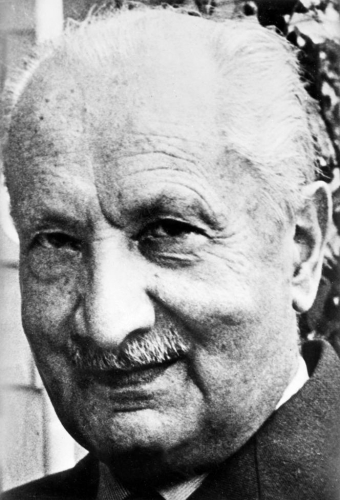
Dans son essence, cette structure rappelle remarquablement l’ontologie fondamentale de Heidegger, et comme cela a été remarqué par de nombreux spécialistes, cela indique soit une similarité des approches soit la possibilité que Heidegger lui-même ait emprunté un certain nombre de motifs centraux à la philosophie chinoise (peut-être par l’intermédiaire de la culture japonaise dans sa version bouddhiste zen) [3]. Le Centre chinois, n’étant ni au-dessus du monde ni au-dessous du monde, correspond aussi précisément que possible au Dasein heideggérien et à sa phénoménologie spécifique que nous avons précédemment identifiée sans équivoque au Logos de Dionysos. De plus, la tradition chinoise présente cela sous une forme pure et extrêmement structurée qui nous pousse à rechercher cet Autre Commencement de la philosophie dont parlait Heidegger, et à nous tourner vers l’« ontologie du souffle » de la culture chinoise [4]. Quelque chose de similaire concernant l’importance fondamentale de la philosophie chinoise pour la reconstruction de la Tradition Primordiale fut exprimé par René Guénon [5].
Si nous corrélons la particularité de la zone ontologique de Dionysos dans la tradition chinoise avec les trois états de conscience de la philosophie indienne, nous pouvons noter que le monde médian, intermédiaire, correspond au royaume des rêves. Au-dessus de ce monde l’hindouisme place le monde de l’esprit pur (Svarga, le Ciel, et kāraṇa-śarira, le « corps causal ») et au-dessous de lui les images des formes corporelles (Bhur, la Terre, et shthūla-śarira, le « corps grossier ») [6]. Sur la base de ce modèle, concernant la particularité existentielle qui est dominante dans la culture chinoise, on peut faire la proposition que la culture chinoise est la culture des rêves, le domaine du monde médian où réside le Dasein dans un état d’intense incertitude rythmique ou de « suspension subtile », dont la structure est organisée en accord avec le rythme du Yin-Yang. Le « Dasein jaune » n’est pas seulement dormant, mais exclut la possibilité même d’un éveil. L’éveil est conçu non comme une alternative au sommeil, mais comme une transition vers un autre rêve, juste comme la transition entre l’hiver et le printemps.
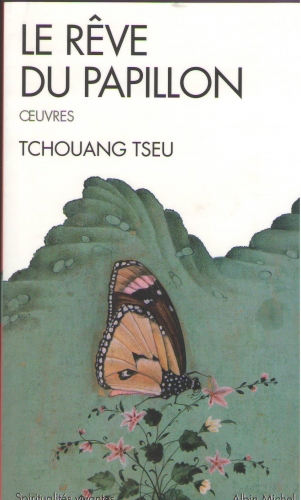
La pensée chinoise rejette toute exclusivité : le sommeil n’est pas aboli par la réalité, mais la réalité est incluse dans le sommeil sur un pied d’égalité. La métaphore du papillon de Tchouang-Tseu rêvé par Tchou acquiert ainsi une signification supplémentaire. Si nous utilisions auparavant la métaphore du sommeil pour décrire la transformation, alors maintenant cette métaphore de la transformation peut être employée pour décrire l’ontologie du rêve. La transformation est un synonyme du rêve, et le rêve est le dénominateur commun de la conscience dormante et de la conscience en éveil. Les structures de nombreuses autres cultures, particulièrement celles des religions monothéistes et la civilisation de la Modernité européenne, sont basées sur la conviction que la conscience en éveil est le dénominateur commun, ce qui existe toujours et « objectivement » et dont les conditions sont simplement pensées différemment selon qu’une personne est endormie ou éveillée ; si elle est éveillée, elle perçoit cette « réalité objective » en termes de contraste ; si elle est endormie, elle cesse simplement de la percevoir, mais cela ne change pas la « réalité objective » elle-même. Selon cette vision, nous sommes convaincus que le jugement juste est toujours porté par une personne éveillée sur une personne endormie, et jamais par une personne endormie sur une personne éveillée. C’est pourquoi l’éveil est considéré comme le dénominateur commun de la « réalité ». Mais c’est simplement une propriété de la philosophie de la Grande Mère et une forme de sa domination culturelle qui impose sa perception des choses depuis cet angle précisément. Le Logos apollinien (comme dans le platonisme, l’Avesta, et les Upanishads) voit le dénominateur commun comme la contemplation intérieure des idées par la conscience, qui peut être claire dans le sommeil mais vague dans l’éveil et vice-versa. La dernière est d’importance secondaire, dans la mesure où la plus importante de toutes est le sommeil transcendant et la pleine conscience du lieu où réside l’être et de ce qui ressemble le plus à la « réalité » (correspondant au monde des idées ou aux ennéades dans le néo-platonisme). La tradition chinoise, en tant que culture du Dionysos jaune, prend comme pivot non pas la pleine conscience et les mondes des paradigmes éternels, mais le rêve, qui est « changement » ou « altération », en chinois « i », 易. Cette « altération » est l’essence de l’existence chinoise. Cependant, ce « changement » n’est pas le « devenir » dans la mesure où il n’y a pas de but, pas d’accumulation ou de perte qui serait asymétrique. D’où l’idée que dans chaque dynastie seule une des cinq vertus pouvait dominer – associée, comme toujours, aux cinq éléments. Les quatre restantes étaient toujours envoyées en exil à la périphérie de la Chine, où elles restaient jusqu’à ce que la dynastie ait épuisé ses vertus et ait commencé à dégénérer. Après cela, une nouvelle vertu pouvait s’affirmer au Centre avec une nouvelle dynastie, la précédente étant envoyée en exil. Les vertus, les peuples, et les éléments – rien de tout cela ne disparaît jamais ; ils sont en fait transformés, mis en sommeil, et tous réveillés dans la structure de l’équation à multiple niveaux, non-intégrable, du sommeil et du rêve.
D’où la légèreté du style chinois dans la musique, la peinture, le langage, et l’architecture. C’est la légèreté de la transformation et des rêves portant leur propre ordre précis tout en restant fondamentalement ouverts aux séries infinies de variations saturées et inattendues. Ce n’est pas l’éternel retour du même (à la Nietzsche [7]), mais l’éternel retour de quelque chose de différent à chaque fois et éternellement.
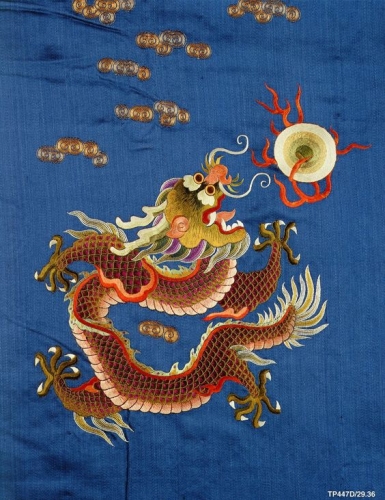
L’expérience du Dragon
Dans la tradition chinoise, la figure du Dragon (Lun 龍) joue un rôle métaphysique majeur. La théorie chinoise des cinq éléments professe de strictes correspondances avec deux types d’animaux : ordinaires (le cochon, le chien, le mouton, le poulet, et la vache) et sacrés-mythologiques (la Tortue Noire ou le Serpent, le Dragon Jaune, le Phénix Rouge, la Licorne Jaune, et le Tigre Blanc). Si les animaux ordinaires sont situés sur la bordure externe du cercle ou du carré de la carte du calendrier, les animaux sacrés appartiennent au royaume au-delà de cette bordure. Dans la mesure où la métaphysique chinoise ne reconnaît aucune forme de transcendance, ce caractère d’« au-delà » des animaux sacrés est cependant inclus dans le système de la vision-du-monde chinoise pour la raison que, tout en étant à l’extérieur du monde, les dragons et les phénix sont maximalement éloignés du Centre, mais néanmoins à l’intérieur de la bordure. En règle générale, la structure du sacré combine en elle l’extrêmement éloigné et l’extrêmement proche, l’extrêmement grand et l’extrêmement petit [8]. Par conséquent, ce qui est le plus éloigné du Centre fait tout de même sentir sa présence dans le Centre lui-même, bien que dans sa dimension cachée. C’est ce qui rend le Centre sacré.
Le cercle des animaux sacrés est distribué selon la logique des cinq éléments : la Tortue Noire ou Serpent est associée à l’Eau et au Monde Souterrain (le pays des Sources Jaunes) ; le Dragon Jaune est associé au Bois, à l’Est, et à l’équinoxe de printemps ; le Phénix Rouge au Sud et au solstice d’été ; le Tigre Blanc au Métal, à l’Occident, et à l’équinoxe d’automne ; et la Licorne Jaune (chilin) à la Terre et au Centre. Tous ces êtres sacrés, cependant, sont décrits comme ayant tout un ensemble complexe de propriétés, par exemple des cornes, la queue des serpents ou des poissons, des ailes, des pattes, des écailles, etc. En d’autres mots, tous sont des pantheria, ou des « pan-bêtes » présentant des éléments d’autres animaux. Ce sont des proto-animaux, des esprits, et des symboles sacrés contenant les pouvoirs du rythme quintuple de la distribution du Yin-Yang. Dans un certain sens, ils pourraient être appelés des « dieux » ou des « onto-logoï » dans la mesure où ils exhibent les pouvoirs synthétiques les plus généraux conjugués à chacun des éléments ; mais en tant qu’êtres vivants et personnifiés, ils incarnent ces pouvoirs sous une forme concentrée attirée par un pôle unique. Faire appel aux pantheria est une sorte de magie visant à maîtriser les éléments qui, pour pouvoir être évoqués, doivent avoir des traits personnels.
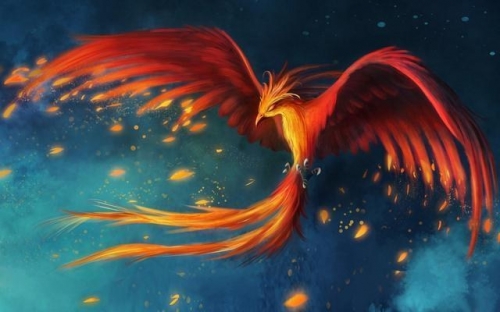
Dans un sens étroit et dans ses racines les plus archaïques, le Dragon représente le pantherion associé à l’élément de l’Eau, c’est-à-dire qu’il est une entité portant les traits du serpent, du poisson, et de la tortue. Compris de cette façon, le Dragon était l’un des pantheria ou dieux/esprits de l’Eau, le Monde Souterrain, et l’élément du Yin symétriquement opposé à celui du Phénix Rouge, c’est-à-dire le pantherion ou dieu/esprit du Feu, du Ciel et du Yang. Cependant, cette stricte opposition, reflétée dans le mythe de la bataille entre l’esprit du Feu, Tchourong, et l’esprit de l’Eau, Gong-Gong, était résolue dans la dimension profonde de la tradition chinoise dans un esprit dionysiaque, puisque la circulation rythmique des éléments – Yin, Yang, et Tao – présuppose des transformations constantes. Ainsi, le serpent sacré obtint des ailes et gagna la possibilité de s’élever dans les Cieux, et l’oiseau sacré acquit des pattes bestiales et une queue de poisson ainsi que la capacité de plonger dans les rivières et les mers. Ainsi naquit la figure du Lun, le Dragon au sens large si fondamental en Chine, qui pouvait être noir (dans l’élément de l’Eau), vert (dans l’élément du Bois et au Printemps), rouge (dans l’élément du Feu), blanc (dans l’élément du Métal et en Automne) et finalement, jaune (dans l’élément de la Terre). Le Dragon Jaune est situé au Centre : il fait du Centre le Centre. De ce fait son image primitive devient la Licorne Jaune, qui porte toutes les caractéristiques du Dragon. Il s’ensuit que le Dragon Lun peut être interprété comme le pantherion chinois universel, le pan-animal combinant les caractéristiques du Yin-Yang, les cinq éléments, ainsi que la périphérie extrême et le Centre le plus sacré.
Le Dragon est un « dieu » dans le contexte chinois : il exprime le pur élément de la sacralité. La sacralité du Dragon Jaune Lun se trouve au cœur du culte de l’Empereur Sacré, le culte de la Chine comme territoire spécial et sacralisé, comme pôle du pouvoir de tous les cultes locaux des montagnes, des fleuves et des bois sacrés au cours desquels les Chinois accomplissaient des rites et des cérémonies de toutes sortes. C’est pourquoi l’Empereur était considéré comme l’incarnation du Dragon ou comme le Fils du Dragon, et c’est pourquoi les légendes disent fréquemment que les Empereurs étaient nés du Dragon, étaient ses traces, le voyaient dans leurs rêves, le contemplaient à distance, etc. La Chine était considérée comme la Terre du Dragon, et les Chinois eux-mêmes comme des incarnations du Dragon, le peuple du Dragon Jaune. Bien que le lien entre le Dragon et l’eau, la pluie, les inondations, et le lit des rivières était l’un de ses traits les plus stables, on prêtait aussi une grande attention à la fuite, aux danses, aux batailles et aux invasions du Dragon dans la vie humaine et politique. Certains des Empereurs sacrés de l’ancienne Chine engendraient des Dragons, d’autres mangeaient de la chair de dragon, et d’autres encore les domestiquaient. En tous cas, le Dragon Lun était le facteur fondamental dans la structure de l’ontologie des souffles.
Si nous nous tournons vers l’ontologie des rêves discutée plus haut, nous pouvons déterminer le statut du Dragon dans l’image chinoise de l’être. Ce statut est suprême dans tous les sens. Le Dragon Lun est suprêmement « réel » : c’est un être et une existence fiable, nécessaire, et prouvé précisément en vertu de son incarnation de la quintessence des rêves : parce qu’il est un rêve, et dans la mesure où il est le rêve le plus pur et le plus complet, entre tous il se tient le plus près du Tao, du code secret du rythme ontologique du Yin-Yang. Comprendre la Chine signifie connaître le Dragon et prendre connaissance en pratique des structures de sa présence onirique.
Il faut noter que dans ce contexte la Gestalt du Dragon est fondamentalement différente de ses interprétations dans les structures du Logos d’Apollon et du Logos de Cybèle. Pour la culture apollinienne, le Dragon est toujours l’ennemi, le titan, la force chtonienne de la Grande Mère contre laquelle le dieu ou le héros solaire mène un combat irréconciliable. Ici le Dragon est sujet à une exclusion radicale et dans cette capacité est doté de traits exclusivement chtoniens incarnant la féminité émancipée agressive et le Monde Souterrain se dressant contre le Ciel. Pour la civilisation de Cybèle, le Dragon est accepté comme une figure matriarcale, un époux de la Grande Mère, sa descendance et son partenaire. Dans ce dernier aspect, le Dragon est associé à la fonction générative de la Terre, de l’eau et des forces chtoniennes. D’où la légende de la princesse Nagi qui devient l’épouse du héros et du premier roi.
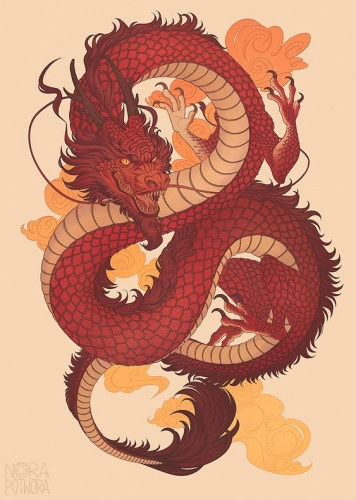
Dans l’horizon chinois, ce lien entre le Dragon et les couches chtoniennes de l’ontologie changent radicalement. Le Dragon chinois est tout aussi Yin que Yang, tout aussi chtonien que céleste ; il est Serpent tout autant qu’Oiseau, et ces deux aspects ne sont pas simplement réunis, mais précèdent plutôt toute division. Le Dragon est primordial pour le serpent, l’aigle, l’homme, et l’esprit. Le Dragon incarne la pensée, l’être vivant par excellence, à la fois phénoménal et idéal. En cela réside l’essence du fait que le Dragon Jaune est pleinement identifié à la Licorne Jaune ou à l’Empereur Jaune, c’est-à-dire la figure du Centre Absolu.
***
Notes
[1] C’est pourquoi, en parlant des cultures, religions et philosophies indo-européennes, nous avons fréquemment utilisé l’expression « structure Apollon-Dionysienne ».
[2] Quand il se produit une dérive du centre vers Cybèle, nous parlons du « double obscur de Dionysos », d’Adionysos et de la Gestalt du Titan.
[3] Ma Lin, Heidegger on East-West Dialogue: Anticipating the Event (London/New York: Routledge, 1996); May R., Heidegger’s Hidden Sources: East Asian Influences on His Work (London/New York: Routledge, 1996). Que Heidegger ait été influencé par les idées japonaises fut souligné par le philosophe et sinologue japonais Tomonubu Imamichi (1922-2012), qui argua que Heidegger emprunta la notion d’« être-dans-le-monde », In-der Welt-Sein, au Livre du Thé d’Okakura Kakudzō, où ce dernier interprétait les idées du sage taoïste Tchouang-Tseu. Voir Tomonubu Imamichi, In Search of Wisdom: One Philosopher’s Journey (Tokyo: International House of Japan, 2004).
[4] Voir Alexander Dugin, Noomakhia – The Three Logoi: Apollo, Dionysus, and Cybele (Moscow: Academic Project, 2014).
[5] Un autre exemple de l’Autre Commencement de la philosophie en-dehors du contexte de la tradition européenne occidentale pourrait être la pensée de Nagarjuna, qui se consacra au pivot (Kehre) radical de la tradition bouddhiste qui, originellement nihiliste, fut élevée dans le Mahayana au niveau d’une synthèse non-dualiste (Advaita). Voir Alexander Dugin, Noomakhia – Great India: Civilization of the Absolute (Moscow: Academic Project, 2017).
[6] Voir R. Guénon, La Grande Triade.
[7] En allemand : Die Ewige Wiederkunft des Gleichen.
[8] Voir Alexander Dugin, Sociology of the Imagination: An Introduction to Structural Sociology (Moscow: Academic Project, 2010).
19:09 Publié dans Nouvelle Droite, Philosophie, Traditions | Lien permanent | Commentaires (0) | Tags : alexandre douguine, noologie, chine, tradition, tradition chinoise, traditionalisme, nouvelle droite, nouvelle droite russe, philosophie |  |
|  del.icio.us |
del.icio.us |  |
|  Digg |
Digg | ![]() Facebook
Facebook
Alexandre Douguine: Valeurs traditionnelles (et non traditionnelles)
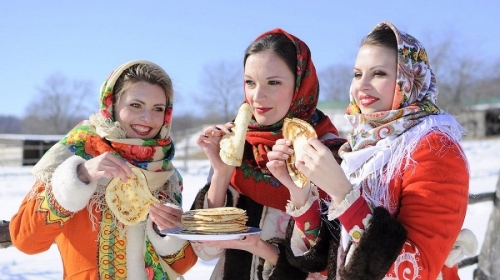
Valeurs traditionnelles (et non traditionnelles)
Alexandre Douguine
Source: https://katehon.com/ru/article/tradicionnye-i-netradicionnye-cennosti
Il ne peut tout simplement pas y avoir autre chose qu'un tournant conservateur dans la politique culturelle russe.
Il est compréhensible que toute l'attention soit maintenant rivée sur les événements autour de l'Ukraine et, en particulier, autour de la République Populaire du Donbass, mais pour le moment, je voudrais parler d'un autre sujet. Parler des valeurs traditionnelles.
Des événements très révélateurs ont eu lieu récemment dans ce domaine. Tout d'abord, un projet de décret présidentiel est apparu de manière inattendue sur le site Web du ministère de la Culture, qui était censé approuver une liste de valeurs traditionnelles et les prendre comme code de base dans la politique culturelle de la Russie. Cette liste était très bien pensée et précise (peut-être à l'exception de l'idée complètement non conventionnelle des droits de l'homme, qui sert de prétexte à l'Occident pour poursuivre sa politique unilatérale et hypocrite basée sur l'idéologie libérale, profondément étrangère à la Russie). Les points les plus importants étaient peut-être les suivants :
- La proclamation de la supériorité de l'esprit sur la matière,
- ...la reconnaissance de l'identité de la civilisation russe..,
- le rejet des influences occidentales utilisées de manière instrumentale pour détruire la culture russe,
- un appel aux fondements de l'orthodoxie et des confessions traditionnelles en Russie comme horizons exemplaires,
- l'affirmation des grands idéaux d'amour, d'honneur et de loyauté,
- un rejet net des clichés vulgaires et du langage obscène qui dégradent la dignité humaine.
Bien sûr, le document ne prétendait pas changer radicalement le niveau moral de la société. Mais elle a fixé des paramètres et des critères assez concrets quant aux orientations de la culture, de l'éducation et de l'art qui devraient être soutenues par l'État.
Il est difficile de surestimer l'importance de ce document. Dans les conditions de forte confrontation avec l'Occident, la sphère des valeurs acquiert une importance fondamentale. Il ne s'agit pas seulement d'un conflit d'intérêts, mais aussi d'une profonde confrontation de cultures : la culture transhumaniste postmoderne ultra-libérale de l'Occident mondialiste et les principaux vecteurs de la civilisation russe (eurasienne), où prévaut un code culturel - traditionnel, spirituel, communautaire - entièrement différent. Le document proposé formule ce code, en le faisant de manière équilibrée, raisonnable et justifiée. Tout se résumait aux valeurs traditionnelles, qui étaient opposées aux valeurs non traditionnelles, or l'Occident a juré de faire triompher ces dernières aujourd'hui, en essayant de les imposer comme la seule norme pour toute l'humanité.
Le projet de décret a symboliquement marqué la fin de l'hégémonie libérale dans le domaine de la culture. C'était une étape capitale, totalement symétrique à la renaissance géopolitique de la Russie en tant que centre de pouvoir indépendant et autonome à l'échelle mondiale. On ne peut pas résister à la pression de l'OTAN et en même temps partager le système de valeurs de ceux qui nous déclarent ouvertement leur "ennemi principal" et se comportent en conséquence.
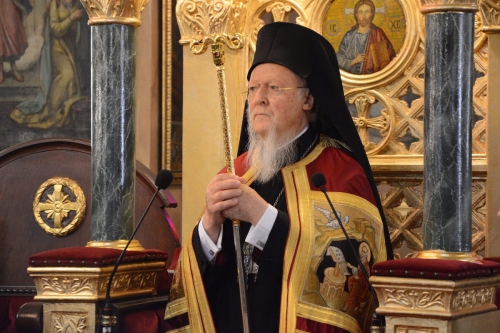
Le projet de décret a remué un nid de frelons. Il a fait l'objet de nombreuses critiques. Ils l'ont accusé de tout. Mais tous les arguments et surtout toute la motivation se résumaient à la protestation hystérique contre la suprématie accordée à l'esprit, à la négation de l'identité russe, à décréter comme systématiquement ridicule toute mission des Russes dans l'histoire, au rejet d'une voie russe spéciale. En d'autres termes, l'ensemble des agenes d'influence libérales en Russie s'est soulevé contre le Projet. Si le but de la publication du Projet sur le site du Ministère de la Culture était juste cela, - faire brailler la meute des agents occidentaux, - alors le succès de l'opération aurait été complet. Maintenant, résumons tout cela en quelques lignes. Et remarquons : seuls les partisans des valeurs non traditionnelles et, par conséquent, non traditionnelles pour l'écrasante majorité des orientations prisées par notre peuple peuvent s'opposer aux valeurs traditionnelles. Les critiques du Projet ont apposé leur signature sous le texte virtuel d'un manifeste anti-traditionnel.
Le tollé des libéraux déclarés et latents était prévisible. Mais ce qui en a surpris plus d'un, c'est la passivité et l'incertitude du gouvernement qui, après avoir écouté le courant de conscience des "activistes culturels" et des simples blogueurs et tic-tokeurs ordinaires, y compris les bots de la CIA, a battu en retraite et retiré le projet de décret de l'examen. Les libéraux se sont réjouis et ont commencé à se féliciter mutuellement de la victoire : une fois de plus, comme auparavant, l'argent de l'État affluera vers ceux qui détestent ouvertement l'État et son peuple et infusent cette haine et cette noire bile dans tout ce qu'ils touchent.
Le projet de décret était le signe le plus important de l'époque, exprimant la volonté des autorités de défendre le Logos russe, l'Idée russe et la résolution d'obliger la culture - au moins en la personne du ministère concerné - à prendre cette russéité métaphysique au sérieux. Après tout, tout commence par la culture, qui forme la personnalité de tout un chacun. L'apparition du projet de décret était donc opportune et logique. Mais son rejet rapide nécessite quelques explications.
Je connais deux raisons possibles pour son retrait et sa mise à l'écart. La première : une réticence à trop insister sur le conservatisme et le traditionalisme à la veille de graves bouleversements géopolitiques, auxquels tout le monde s'attend, intuitivement et même non intuitivement. Ils disent que s'ils mettent en colère le réseau des libéraux culturels, ils leur mettront des bâtons dans les roues en cas de confrontation difficile avec l'Occident. Ne le feraient-ils pas si le projet est retiré ? Est-ce de la naïveté ou simplement la lâcheté et la faiblesse d'esprit de quelques apparatchiks trop prudents ? Mais ce n'est même pas la peine d'en discuter, hélas, il y en a encore beaucoup en Russie. De grandes initiatives émergent puis sont noyées par des personnalités aléatoires qui se sont hissées au sommet, ou par des ennemis cachés (la 6e colonne). Si cette version est correcte, il n'y a rien à faire, nous devons simplement attendre un ou deux autres cycles de rotation de la bureaucratie.
Mais il existe une autre version. Elle est un peu plus optimiste (dans un sens). Selon elle, tout le problème ne réside pas dans le contenu du projet de décret lui-même, avec lequel tous les membres du gouvernement, et le ministère de la Culture lui-même, sont d'accord, mais dans les procédures et les personnes qui ont introduit le projet au ministère. S'il s'agissait de patriotes connus, fidèles aux valeurs traditionnelles et les défendant depuis des années et des décennies, ce serait une chose. Mais ici, il s'agissait de fonctionnaires ordinaires sans aucune caractéristique notoire. Le fait que l'ensemble des valeurs traditionnelles se soit avéré très décent et précis n'est plus surprenant - ces idées sont dans l'air, et c'est un crédit aux mêmes patriotes profonds qui ont gardé la tête haute, sans capituler, pendant les décennies les plus sombres de l'hégémonie libérale.
Il ne s'agit donc pas du contenu ou du fait que le ministère de la culture s'est empressé de défendre les valeurs non traditionnelles, mais du fait qu'il y a maintenant un combat d'un tout autre genre - qui prendra le virage conservateur et s'assurera ainsi une place confortable dans le nouveau système. Cette fois dans notre système post-libéral. Il est seulement dommage que des documents aussi remarquables soient sacrifiés pour les lauriers des patriotes, conservateurs et traditionalistes les plus avant-gardistes.
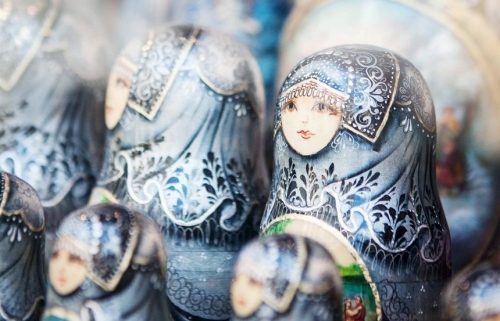
Et les libéraux peuvent se réjouir prématurément - car la prochaine édition pourrait ne pas inclure du tout les "droits de l'homme", et ce serait juste et raisonnable. S'ils acceptaient ce qui est proposé, ils auraient leur part - ils pourraient réaliser des films, des productions théâtrales, des opéras et des comédies musicales en vertu de ces "droits" et écrire "L'homme et ses droits"... Sinon, nous attendrons et confierons à tous les maîtres de la culture le soin de travailler sur le feuilleton "De l'empire aux étoiles"... Ou quelque chose de similaire.
Ainsi, l'histoire du projet de décret sur les valeurs traditionnelles est probablement un phénomène entièrement nouveau. Les différentes factions au pouvoir rivalisent entre elles pour mener le "tournant conservateur". L'idéologie, comme la géopolitique, a ses propres lois. Et à long terme, ce sont ces derniers qui fonctionnent.
L'escalade des relations avec l'Occident affecte à la fois les intérêts et les valeurs. "Moscou a défini nos 'lignes rouges' d'intérêts, et de manière très claire. Et à partir de maintenant, tout se passera comme prévu. Les lignes rouges de l'idéologie sont également sur le point d'être tracées. Et ici, il ne peut y avoir qu'un virage conservateur. Réfléchissez-y : dans un contexte de confrontation directe avec l'Occident dans les conditions d'un conflit militaire presque ouvert, peut-il y avoir un "tournant libéral" ? Exactement. Les libéraux ne respirent encore que parce que le gouvernement a pour priorité d'augmenter le nombre de missiles, de bombes, de navires et de chars. Mais il est sur le point de mettre la main sur l'idéologie aussi. Et alors, personne (parmi les libéraux) ne sera satisfait. Et il importe peu de savoir qui exactement prendra la tête du virage conservateur et proclamera la fin du libéralisme en Russie. Nous n'avons qu'un seul sujet. Et il n'a pas besoin d'espace. Il l'occupe déjà.
C'est pourquoi nous devons adopter non pas un, mais une centaine de décrets sur les valeurs traditionnelles - pour la culture, pour l'éducation, pour les écoles, pour les théâtres, pour les jeunes, pour les militaires, pour les jeunes mariés, pour les médecins, pour les physiciens, pour les poètes, pour les femmes au foyer, etc. Et le libéralisme doit être chassé de la société russe comme tout exorciste chasse les démons.
17:47 Publié dans Actualité, Affaires européennes | Lien permanent | Commentaires (0) | Tags : russie, politique culturelle, alexandre douguine, nouvelle droite, nouvelle droite russe, europe, affaires européennes, politique internationale |  |
|  del.icio.us |
del.icio.us |  |
|  Digg |
Digg | ![]() Facebook
Facebook
vendredi, 18 février 2022
Alexandre Douguine: le destin de l'État ukrainien
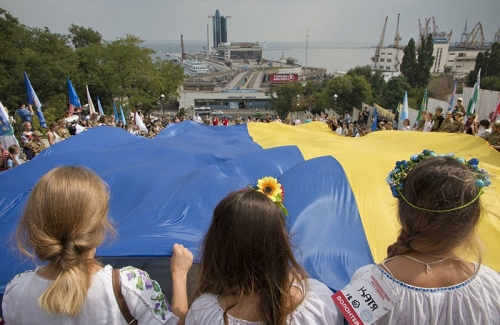
Le destin de l'État ukrainien
Alexander Douguine
Source: https://www.geopolitica.ru/article/sudba-ukrainskoy-gosudarstvennosti
Dans ce flot de nouvelles, particulièrement brûlant en Occident, qui concerne l'Ukraine - le retrait des citoyens américains et européens de son territoire, ainsi que les informations divulguées aux médias selon lesquelles Kiev déplace en toute hâte l'infrastructure des institutions gouvernementales et des postes de commandement vers l'ouest du pays - il est difficile de parler et de penser à autre chose.
Donc, une invasion.
N'envisageons pas à l'avance la possibilité que nous nous soyons préparés de manière délibérée et cohérente. Pourquoi maintenant ? Pourquoi pas en 2014, alors que la situation était beaucoup plus favorable ? Mettons donc tout de suite cette hypothèse de côté. Le Kremlin n'accepte pas une solution de force - même à une situation qui ne nous convient pas du tout.
Il ne reste donc qu'une chose : l'Occident veut vraiment une invasion et fait tout pour qu'elle ait lieu.
Qu'est-ce que les États-Unis en retirent ? Séparation de la Russie de l'Europe, et consolidation du bloc de l'OTAN qui autrement s'effondrerait sous nos yeux, et prétexte pour faire tomber toutes les sanctions possibles sur la Russie, jusqu'à provoquer la révolte de l'élite russe contre Poutine si leurs biens spoliés sont simultanément et instantanément réquisitionnés à l'étranger (comme ils le pensent). Pas un mauvais plan, d'ailleurs. Pour eux. Car il est rationnel.
Et si la Russie ne veut pas envahir, on peut la forcer à le faire. La solution est très simple: lancer une opération punitive des forces armées ukrainiennes dans le Donbass. Presque toutes les forces prêtes au combat et même les forces non prêtes au combat y sont désormais déployées. Et si la Russie ne fait pas d'escalade, même dans ce cas, alors nous pourrons prendre le Donbass, dit l'Occident, et passer ensuite à la reconquête de la Crimée. Et puis ce sera le retour à la case départ, avec le même objectif. Et la Russie décidera presque certainement d'agir dans une situation critique. Elle n'attend même pas l'assaut potentiel contre la Crimée.
Ainsi, si nous supposons que Washington, ou plutôt l'actuelle direction mondialiste des États-Unis (Biden & Co.) et les faucons britanniques, qui la soutiennent moralement, avides de hardcore géopolitique et laissés pour compte après le Brexit, sont derrière toute cette histoire, alors, lorsque l'on s'aperçoit de tout cela, tout devient plus ou moins logique.
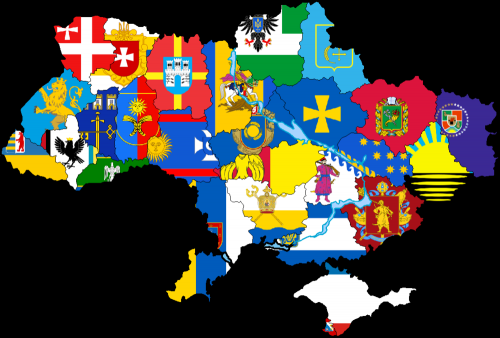
Bien sûr, l'OTAN ne se battra pas directement pour l'Ukraine. Ainsi, ceux qui craignent l'apocalypse nucléaire s'inquiètent pour rien. Ce en quoi l'Occident tente de nous entraîner à tout prix n'est pas la troisième guerre mondiale au sens plein du terme, mais c'est tout de même une guerre - une guerre de moyenne intensité. Nous n'avons pas le choix : nous devons nous battre ou ne pas nous battre. L'Occident a les moyens de faire en sorte qu'il nous soit impossible de ne pas nous battre. Hélas, c'est exactement ce qui se passe. Après les événements de 2014, la réunification avec la Crimée et la libération du Donbass, Washington pourrait déclencher à tout moment une réaction en chaîne irréversible menant à la guerre. La pause, qui est advenue avant l'avènement de Biden, a beaucoup à voir avec Trump, qui n'était pas particulièrement porté sur la géopolitique et se concentrait d'abord sur les questions intérieures. De plus, son nationalisme américain - de type paléo-conservateur - permettait la multipolarité. Et sa confrontation avec les mondialistes (avec le marécage même qu'il n'a jamais asséché) a poussé sa politique étrangère dans un sens très différent de celui des mondialistes. D'où les accusations de sympathie pour la Russie qui lui ont été adressées. Il n'avait aucune sympathie particulière pour la Russie. Mais il avait une antipathie sincère envers les mondialistes. Et c'était suffisant. Dès que le parti mondialiste des "faucons" libéraux et des néocons, avec Biden, est revenu à la Maison Blanche, la géopolitique atlantiste est revenue avec elle. Il ne s'agissait donc plus que d'une question de technologie pour activer la mine ukrainienne. Ils auraient pu le faire à tout moment. Et ils ont décidé que c'était le moment opportun.
Pour l'instant, l'impression est que l'invasion, planifiée par Washington, est sur le point de commencer. Contre notre volonté. Mais nous ne pourrons pas ne pas répondre aux actions punitives actives dans le Donbass, si elles commencent. En fait, cela ne dépend pas de Moscou. Kiev, bien sûr, cherche à gagner du temps. Qui veut perdre le pays ou au moins le noyer dans le sang ? Et l'OTAN ne va sauver personne. Seulement inciter à la guerre pour faire couler le plus de sang slave possible. Mais Washington insiste sur son agenda. D'où le refus apparent de prendre au sérieux les demandes de la Russie à l'OTAN et la démarche scandaleuse de l'Anglaise Elizabeth Truss concernant Rostov et Voronej. C'est non seulement un signe d'incompétence totale, mais aussi d'indifférence aux réalités du monde russe, y compris l'Ukraine, que les mondialistes ressentent réellement. Ils ne se soucient pas de ces noms slaves difficiles à prononcer. Ils vivent déjà dans le paradigme de l'invasion et agissent comme si elle avait eu lieu. C'est là le cours habituel de la guerre hybride : ce qui doit encore se produire est décrit comme ayant déjà eu lieu.
Officiellement, Moscou dira jusqu'au dernier mot : "Non à la guerre !" - et c'est la bonne chose à faire. Mais si cela ne tenait qu'à nous, ce comportement serait le facteur déterminant. Mais imaginons que l'Occident amène la situation au point de non-retour et qu'une invasion forcée ait néanmoins lieu.
Les tabloïds occidentaux sont déjà pleins de scénarios sur la façon dont cela va se passer et comment cela va tourner. Les images sont parfois très réalistes, parfois outrageusement délirantes. Mais presque partout apparaissent la prise de contrôle réussie de l'Ukraine orientale et de Kiev par les Russes et la construction d'une nouvelle ligne de défense pour la résistance russophobe dans l'ouest de l'Ukraine. Et là, vers cette tête de pont de secours, qui est maintenant - probablement - déjà en train d'être mise en place, un accès direct pour l'OTAN dans le cadre d'une situation extrêmement réaliste est tout à fait imaginable. Lviv pourrait devenir la capitale temporaire de ce que l'Occident reconnaît comme "l'Ukraine". Et une activité militaro-terroriste à grande échelle serait déployée à partir de là.
Cela ne vous rappelle rien ? N'était-ce pas le même scénario de la lutte pour le trône de Kiev entre Vladimir et les princes de Galicie-Volhynie ? Et Kiev elle-même a changé de mains jusqu'à perdre son importance, passant de statut de grande capitale à celui d'une ville de province de troisième ordre. Comme nous le savons, les deux parties presque égales du monde russe ont pris des chemins séparés. La Russie de Vladimir, et plus tard de Moscou, est devenue un puissant empire mondial. Les Russes des territoires occidentaux se sont avérés être une sous-classe méprisée dans l'Europe orientale catholique. Voici le prix de la couronne envoyée par le pape, le fier prince Daniel de Galicie... L'Occident fait toujours la même chose : il promet d'aider et de sauver, puis abandonne cyniquement. Nous le voyons avec la chute de Tsargrad ou dans le destin de Saakashvili.
Et c'est ici que l'inattendu commence. Il est d'usage de penser que le parti russe et la géopolitique eurasienne se fixent des objectifs extrêmement ambitieux et étendent au maximum - certes de manière spéculative, mais tout en politique (et pas seulement en politique) commence par une idée - les frontières de la Russie-Eurasie, du monde russe. Et avec raison. Mais en ce qui concerne l'Ukraine occidentale, cela vaut la peine d'émettre une réserve. Le profil ethno-sociologique, historique et psychologique de ces régions - à l'exception des Ruthéniens de Podkarpattia (d'Ukraine subcarpathique) et d'un certain nombre de groupes orthodoxes en Volhynie - est tel qu'elles ne se prêtent pas à une intégration dans l'Eurasie. Les habitants de l'Ukraine occidentale, qui ont été rendus à l'État unifié par Staline, n'ont jamais accepté l'Empire. Ils sont la force motrice de la russophobie ukrainienne extrême, qui risque de mettre fin à cet État défaillant en fin de compte.
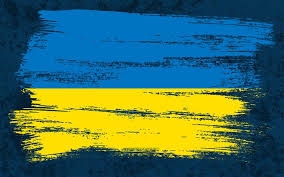
D'ailleurs, c'est là que l'Occident veut prendre pied. Et cela vaut la peine d'envisager de lui permettre de le faire (en libérant, bien sûr, les Ruthéniens et ceux qui veulent eux-mêmes être de notre côté). Sinon, même si nous parvenons à établir un contrôle sur l'ensemble de l'Ukraine (ce que les atlantistes nous imposent de manière provocante), ces régions occidentales ne se réconcilieront jamais avec nous et trouveront toujours le moyen de saper de l'intérieur tout gouvernement neutre et équilibré de la future Ukraine ou de l'entité politique qui émergera à sa place. Et les institutions politiques du pays, dans leur état actuel, sont si compliquées et alambiquées que les laisser telles quelles dans l'espoir que la loyauté des forces intégrationnistes sera indéfectible, serait bien imprudent. Enfin, si nous pouvons être provoqués à l'invasion, nous ne serons certainement pas provoqués à la terreur contre un peuple véritablement frère, part de notre propre peuple. Nous devrons donc faire face à cette rétivité inflexible de la Galicie-Volhynie indéfiniment. Même Staline n'a pas réussi à les réhabiliter, et il ne lésinait par sur les moyens.
Il convient donc de réfléchir : ne devrions-nous pas les laisser à eux-mêmes ? Et ne devrions-nous pas relancer l'État ukrainien - et en même temps le nôtre, car un véritable renouveau slave est nécessaire - à nouveau ? La Zapadenshchina peut rester "Ukraine" (que nous ne reconnaissons évidemment pas) ou être rebaptisée "Banderastan". Mais l'opportunité s'ouvre de construire quelque chose de nouveau à partir d'une partie saine de ce pays.
Note : La Crimée a disparu de ce pays, le Donbass a disparu. Mais fragmenter, morceau par morceau, ce qui n'a aucune chance historique d'avoir lieu est en quelque sorte indigne et à courte vue. Sauvons tout le monde à la fois, mais seulement ceux qui sont prêts pour cela, ou du moins qui permettent une telle tournure des événements. Les régions occidentales ne le permettront pas, elles ne sont pas prêtes et ne seront pas davantage prêtes pour la réunification.
Parfois, le fait de dépasser les frontières du "grand espace" est synonyme d'effondrement. Il ne faut prendre que ce qui peut être assimilé et défendu de manière fiable. Soit dit en passant, Staline l'a très bien compris en ce qui concerne l'Europe, en concevant des versions chaque fois différente de sa "finlandisation", c'est-à-dire de sa "neutralisation". Même l'Europe de l'Est n'a pas pu être nôtre jusqu'au bout. Et il était extrêmement dangereux de la forcer contre sa volonté.
Ce n'est rien d'autre que de la spéculation géopolitique. Je n'ai aucune information confidentielle et je n'appelle personne à quoi que ce soit. Seulement l'analyse. Et au cours de cette analyse, j'en arrive à la conclusion qu'en cas d'invasion - et seulement dans ce cas ! - la question des territoires occidentaux de ce qui est aujourd'hui l'Ukraine doit être traitée avec la plus grande délicatesse et prudence. Construire un empire - et, plus difficile encore, faire revivre un empire perdu - est le plus haut des arts, et non un processus linéaire ou monotone.
19:43 Publié dans Actualité, Affaires européennes, Géopolitique | Lien permanent | Commentaires (0) | Tags : alexandre douguine, ukraine, russie, europe, affaires européennes, géopolitique, politique internationale |  |
|  del.icio.us |
del.icio.us |  |
|  Digg |
Digg | ![]() Facebook
Facebook
mardi, 15 février 2022
Alexander Dugin : Alors que les libéraux échouent, un nouveau monde dirigé par la Russie et la Chine a émergé
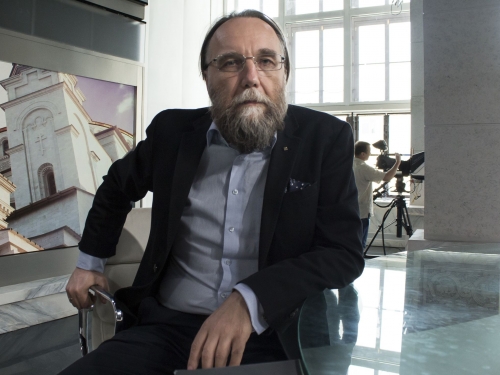
Alexander Dugin : Alors que les libéraux échouent, un nouveau monde dirigé par la Russie et la Chine émerge
亚历山大·杜金:自由主义者功败垂成,中俄引领的新世界已经出现了
Source : http://www.4pt.su/zh-hant/content/ya-li-shan-da-du-jin-zi-you-zhu-yi-zhe-gong-bai-chui-cheng-zhong-e-yin-ling-de-xin-shi-jie?fbclid=IwAR0yqNA0ZiutSxwwrO-dTLuUfIGHOgYboYcnO1ghUGKHWZPpHOAWMyiSrn4
La crise actuelle des relations de la Russie avec l'Occident n'a rien à voir avec le gaz, le pétrole, l'énergie ou l'économie en général. Les tentatives d'expliquer la politique en termes de théorie des "prix", comme le fait Daniel Yergin, sont futiles et superficielles. (Note : Daniel Yergin est un auteur américain qui a écrit un livre sur la relation entre le pétrole et le pouvoir et la richesse intitulé The Prize (= "Le Prix"). Nous avons affaire à des processus civilisationnels et géopolitiques dans lesquels les questions économiques et énergétiques sont secondaires, ce sont simplement des outils à emprunter.
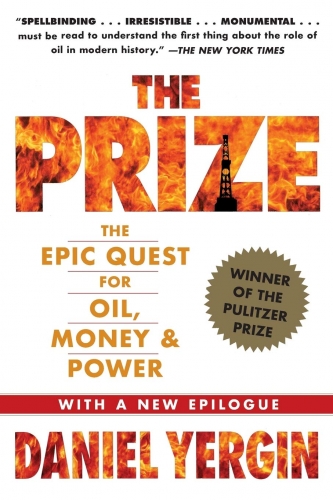
D'un point de vue civilisationnel, tout est question d'idéologie, surtout sous l'administration démocrate de Biden. L'administration américaine actuelle est composée de mondialistes extrémistes, de néoconservateurs et de faucons libéraux. Ils observent que le monde unipolaire, l'idéologie libérale mondiale et l'hégémonie occidentale sont en train de s'effondrer, et ils sont prêts à tout - même à déclencher une troisième guerre mondiale - pour empêcher que cela ne se produise.
Les mondialistes ont de nombreux ennemis - l'islam, le populisme (y compris Trump), le conservatisme, l'islam politisé, etc. Mais seules deux puissances ont un réel potentiel pour défier cette hégémonie - la Russie et la Chine. La Russie est une puissance militaire, tandis que la Chine est une puissance économique.
Cela laisse de la place pour des manœuvres géopolitiques. Pour Biden, il était important de couper la Russie d'une Europe qui voulait son indépendance. Le problème de l'Ukraine est donc apparu et la crise du Donbass s'est aggravée. La Russie et Poutine ont été diabolisés et accusés de vouloir envahir un pays voisin. Bien que l'invasion n'ait pas vraiment eu lieu, Washington a agi comme si c'était le cas.
Il s'en est suivi des sanctions et même la possibilité de mesures militaires préventives dans la région du Donbass. Puisque tous les Occidentaux croient que la Russie va envahir le pays, toute action militaire des Ukrainiens dans le Donbass, soutenue par l'OTAN, sera considérée comme une "légitime défense". Dans le même temps, on estime également qu'une campagne médiatique contre la Russie empêchera toute réponse appropriée de la part de Moscou. Le conflit sur le gaz et Nord Stream 2 n'est qu'un outil technique pour une guerre de classement.
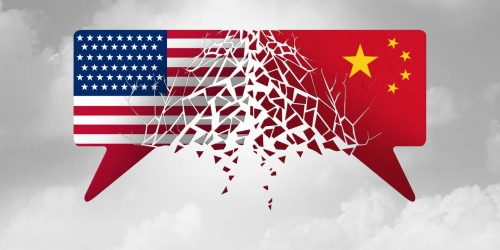
La situation est la même pour la Chine. Biden a déjà créé une coalition anti-chinoise avec l'accord AUKUS des pays anglo-saxons (Australie, Royaume-Uni) et le mécanisme QUAD des pays asiatiques (Japon, Inde). La pierre d'achoppement préparée pour la Chine cette fois-ci est Taïwan (comme l'Ukraine l'est pour la Russie). L'objectif ultime est de saper et d'empêcher l'"expansion économique" de la Chine qui y procède par le biais de l'initiative Belt and Road.
L'alliance entre la Russie et la Chine, combinée aux tentatives de la Russie de faire revivre la "Grande Profondeur" en associant l'initiative "Grande Eurasie" à l'initiative Belt and Road (comme annoncé par les dirigeants russes et chinois il y a quelques années). Une nouvelle "Grande Profondeur" signifierait la fin irréversible de l'hégémonie occidentale. La récente rencontre entre Vladimir Poutine et Xi Jinping montre sans aucun doute que le projet de "Grande Eurasie" est sérieux et poursuivi avec détermination. En conséquence, l'ultra-libéral et mondialiste Soros a lancé une attaque féroce contre la Chine.
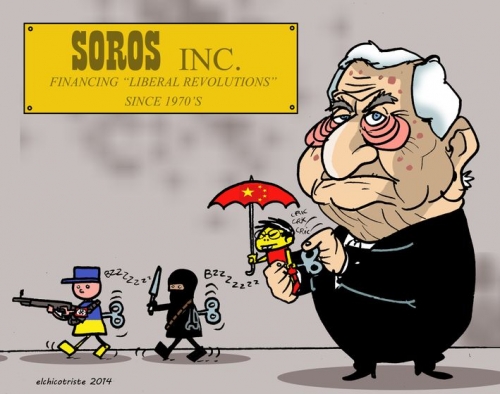
Tout ceci est un cas classique de géopolitique, répétant le projet atlantiste qui va de Mackinder à Brzezinski, c'est-à-dire qu'il y a un duel entre la puissance maritime (libéraux, mondialistes) et la puissance terrestre (Eurasie).
Dans le même temps, la Russie et la Chine pourraient accueillir dans leur giron d'autres Etats prétendants participer à l'émergence d'un monde multipolaire.
- l'Amérique latine (comme l'a souligné le président argentin Albert Fernandez lors de sa visite à Moscou, et comme l'évoquera certainement le président brésilien Bolsonaro lors de sa visite en Russie).
- le monde islamique (qui rêve de se libérer du contrôle occidental - avec l'Iran, la Turquie et le Pakistan à l'avant-garde), et
- l'Afrique (où la Russie et la Chine ont commencé à purger les régimes fantoches mis en place et consolidés jusqu'ici par les Français),
- et, enfin, le continent européen lui-même (qui est de plus en plus fatigué de subir l'atlantisme et rêve de devenir lui-même un pôle - bien que l'élite libérale atlantiste soit toujours au pouvoir en France, en Allemagne, en Italie et en Espagne, ces idées sont de plus en plus populaires dans ces pays).
Seuls l'Inde (en raison de ses conflits avec la Chine et le Pakistan), le Japon (toujours sous le contrôle étroit des États-Unis) et certains États fantoches mondialistes restent du côté des perdants de toute évidence. C'est devenu une véritable honte d'être du côté des perdants.
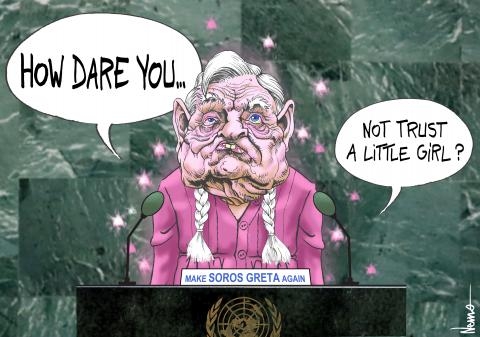
Cela affecte également l'idéologie. Tous ceux qui s'opposent à l'hégémonie américaine et se désintéressent des tentatives de sauvetage du monde unipolaire par Biden (dans l'esprit de la "Ligue des démocraties") commencent également à prendre leurs distances avec les dogmes libéraux - surtout lorsqu'ils apparaissent sous leur forme actuelle, dégoûtante et pathologique (la légalisation de l'homosexualité, de la bisexualité, du transsexualisme, du mariage homosexuel et d'autres perversions, voire l'application totalitaire radicale de ces lois ; et l'autonomisation de l'intelligence artificielle conduisant à l'émergence des menaces très réelles que la promotion agressive du "post-humanisme" par les grandes entreprises technologiques a engendrées).
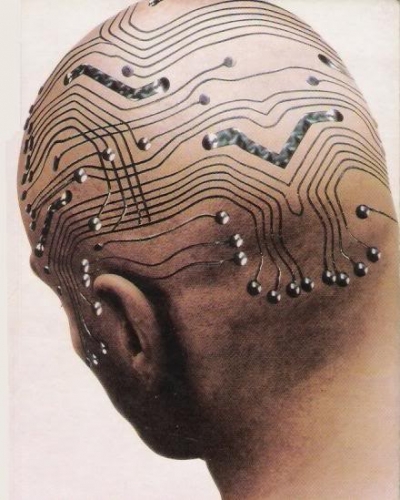
Si l'on ajoute à cela l'échec des politiques de prévention des épidémies, les vaccinations douteuses (dont l'épidémie Omicron a prouvé la totale inefficacité), les confinements irrationnels et mal organisés dans les villes, les nouvelles obligations de porter sur soi un passeport sanitaire et quasi biométrique selon les modèles totalitaires des dystopies, le tout assorti d'un système de surveillance totale, il est clair que l'effondrement du libéralisme est plus imminent que jamais. Le succès du groupe rebelle canadien des "Freedom Trucks", qui a forcé le mondialiste libéral Justin Trudeau à aller se cacher, et la popularité des candidats anti-Macron en France (de Zemmour et Marine Le Pen à Mélenchon, qui sont tous du côté anti-libéral et anti-OTAN) ne sont que quelques-uns des symptômes du processus de mondialisation. Ce ne sont là que quelques-uns des symptômes du processus de mondialisation qui annonce la fin de l'hégémonie atlantique.
Tensions à la frontière russo-ukrainienne
La Russie est maintenant confrontée directement à l'atlantisme, et la Russie devrait donc:
- opposer le globalisme à la multipolarité dans la perspective de la géopolitique eurasienne.
- s'opposer au libéralisme en poussant en avant des valeurs civilisationnelles traditionnelles, véritables alternatives constructives ; refuser les dérives LGBT et affirmer l'excellence et la préséance de la famille traditionnelle (inscrite dans la constitution) ; refuser l'individualisme méthodologique du néolibéralisme et affirmer l'État porteur d'une identité historique, etc.
La Chine soutient généralement cette approche tout comme Moscou. Pékin s'oppose également au mondialisme et à l'hégémonie occidentale, tout en défendant les valeurs traditionnelles chinoises.
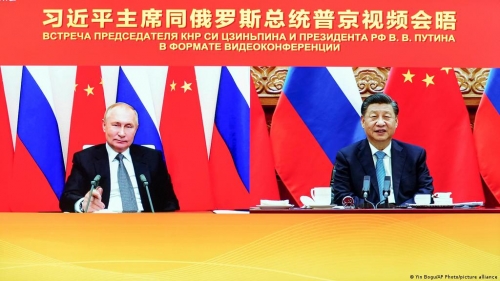
Ces points de vue ont été clairement exprimés par Poutine et Xi Jinping lors de leur dernière rencontre.
- Moscou et Pékin entendent s'opposer à toute tentative de violation de leur souveraineté (et combattre jusqu'au bout l'hégémonie et le mondialisme).
- La Chine et la Russie ont pris en compte le fait que Biden veut créer un bloc anti-chinois et activer les mécanismes de l'OTAN en Europe de l'Est, et ont l'intention de s'opposer (ensemble) à ces actions.
- Les dirigeants des deux pays ont fait allusion au bioterrorisme américain (une menace connue sous le nom de "biologie militaire américaine"), ce qui signifie en fait que les deux pays pensent que c'est l'Occident (les États-Unis et le Royaume-Uni) qui a déclenché la pandémie du nouveau coronavirus.
- Pékin soutient Moscou en Europe orientale, Moscou soutient Pékin dans l'océan Indien et le Pacifique, et Poutine a explicitement déclaré que "Taïwan est aux Chinois".
- Les deux pays condamnent l'"Union des démocraties" (l'alliance visant à maintenir l'unipolarité) et s'engagent à préserver l'ordre mondial multipolaire (ce qui doit être interprété comme une déclaration visant à préserver le système de Yalta et l'ONU).
Le bloc eurasien russo-chinois a pris forme. Tous les autres pays doivent choisir - quel côté prendre.
- Se placer du côté de l'hégémonie américaine agressive et devenue complètement folle.
- ou travailler avec le groupe des pays visant l'avènement d'une réelle multipolarité (dont la Russie, la Chine, l'Iran, le Pakistan, le Belarus, la Corée du Nord, le Venezuela, Cuba, le Nicaragua, la Syrie, le Mali, la République centrafricaine, le Burkina Faso, la Guinée, et, pas encore totalement rejoints, la Turquie, l'Argentine et le Brésil) qui s'opposent aux États-Unis afin de préserver leur souveraineté nationale et leur identité culturelle.
L'avenir est définitivement multipolaire et le bloc eurasien doit donc l'emporter. Après l'effondrement de l'Union soviétique, le dernier effort pour construire un empire mondial a échoué parce que les libéraux n'ont pas été capables de consolider et de conserver leur succès, et un nouveau monde a émergé.
Cet article est une exclusivité de l'Observer. Le contenu de cet article est purement l'opinion personnelle de l'auteur et ne représente pas les vues de la plateforme. Suivez l'Observateur sur WeChat guanchacn pour lire quotidiennement des articles intéressants.
Hola
17:03 Publié dans Actualité, Géopolitique | Lien permanent | Commentaires (1) | Tags : alexandre douguine, actualité, multipolarité, chine, russie, asie, affaires asiatiques, europe, affaires européennes, géopolitique, politique internationale |  |
|  del.icio.us |
del.icio.us |  |
|  Digg |
Digg | ![]() Facebook
Facebook
dimanche, 06 février 2022
La Russie et la Chine à l'avant-garde de la multipolarité
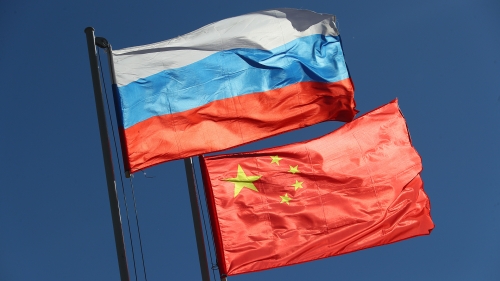
La Russie et la Chine à l'avant-garde de la multipolarité
Alexandre Douguine
Ex: https://www.geopolitica.ru/en/article/russia-and-china-vanguard-multipolarity?fbclid=IwAR3WuHuvEpE1vSunkZcrBw38kFSzsEPFhZPcC_YQiRZhw8k6xcEVpgbZzro
La crise que connaissent aujourd'hui les relations entre la Russie et l'Occident n'a rien à voir avec le gaz, le pétrole, les ressources énergétiques ou l'économie. Les tentatives d'expliquer la politique comme une sorte de compétition pour un certain "Prix" matériel, comme le fait Daniel Yerguine, sont assez superficielles et vaines. Ce qui se passe fait partie des luttes entre civilisations et des conflits géopolitiques où les questions économiques sont secondaires et instrumentales.
Les processus de civilisation tournent autour de l'idéologie et c'est précisément ce qui explique en grande partie ce qui se passe avec l'administration Biden. Les États-Unis sont aujourd'hui dirigés par une alliance ultra-mondialiste qui unit les néoconservateurs aux faucons libéraux. Ils savent tous que l'unipolarité, le libéralisme mondial et l'hégémonie occidentale sont en train de s'effondrer et ils sont prêts à tout - même à déclencher une troisième guerre mondiale - pour empêcher que cela ne se produise.
Les mondialistes font face à de nombreux ennemis, notamment l'islam, le populisme (dont Trump), le conservatisme, l'islam politique, etc. Cependant, il n'y a que deux puissances capables de contester efficacement son hégémonie : la Russie et la Chine. La Russie est une puissance militaire et la Chine est une puissance économique.
C'est là que la géopolitique devient pertinente. Biden veut éloigner la Russie de l'Europe, qui aspire à devenir indépendante. C'est pourquoi les feux de la guerre sont attisés en Ukraine et dans le Donbass en particulier. La Russie et Poutine sont diabolisés par les médias et accusés d'envahir leurs voisins. Bien qu'il n'y ait pas d'invasion, Washington se comporte comme si elle avait eu lieu. Ainsi, toutes sortes de sanctions sont imposées et il est même proposé de mener des opérations militaires dans le Donbass. Et comme tout le monde à l'Ouest considère qu'une invasion russe va de soi, toute opération militaire menée par les Ukrainiens dans le Donbass sera certainement soutenue par l'OTAN comme une guerre d'"autodéfense". En outre, la campagne médiatique contre la Russie devrait permettre d'éviter toute réponse symétrique de notre part, car sinon l'Europe romprait toutes ses relations diplomatiques avec Moscou.
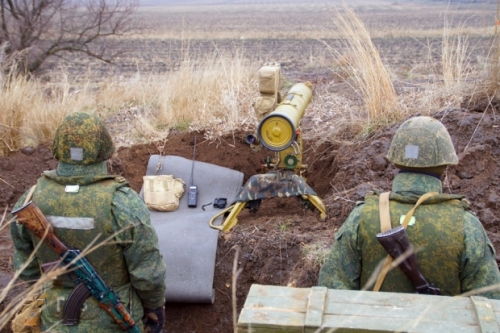
Pendant ce temps, les différends sur le gaz et le Nord Stream-2 ne sont rien d'autre qu'une guerre de position.
Il en va de même pour la Chine. Biden a encouragé la création de deux alliances anti-chinoises : une formée par les Anglo-Saxons (Australie, Grande-Bretagne) qui est connue sous le nom d'AUKUS et une autre formée par une coalition de pays asiatiques, notamment le Japon et l'Inde, qui est appelée QUAD. La Chine fait face à Taïwan à une situation très similaire à celle de la Russie par rapport à l'Ukraine et l'objectif reste le même : empêcher l'expansion économique chinoise à travers le projet Belt and Road.
L'alliance russo-chinoise est un premier pas vers la restauration du "Grand Espace" chinois et la création d'un projet eurasien global, tel que formulé par les dirigeants de ces pays il y a plusieurs années. Un tel projet implique la fin définitive de l'hégémonie occidentale. Les réunions actuelles que Poutine et Xi Jinping tiennent ne laissent aucun doute sur le fait que ce projet est sérieux et que rien ne peut l'arrêter, explique la sortie hystérique de l'ultra-libéral et mondialiste Soros. Jusqu'à présent, l'Occident répète mot pour mot toutes les maximes de la géopolitique atlantiste depuis ses débuts chez Mackinder jusqu'à ses dernières formulations chez Brzezinski. Le temps est venu de la confrontation entre la puissance de la mer (libérale, mondialiste) et la puissance de la terre (Eurasie).
Or, la Russie et la Chine sont favorables à la naissance d'autres pôles autonomes et favorisent leur développement. Il s'agirait de :
1. L'Amérique latine (la visite d'Alberto Fernández, président de l'Argentine, à Moscou l'a bien montré et la prochaine visite du président du Brésil, Jair Bolsonaro, confirmera sans doute ces aspirations).
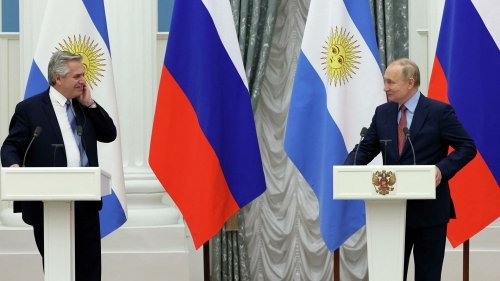
2. Le monde islamique (qui a toujours rêvé de se débarrasser de l'hégémonie occidentale, des pays comme l'Iran, la Turquie et le Pakistan étant à l'avant-garde de ce mouvement).
3. L'Afrique (où la Russie et la Chine contribuent à renverser les gouvernements fantoches qui dominent cette région).
4. Et la même Europe continentale (qui s'éloigne de plus en plus de l'atlantisme, cherchant à devenir un pôle autonome et souverain, une idée très populaire en France, en Allemagne, en Italie et en Espagne, malgré le maintien au pouvoir des élites libérales atlantistes).
Malheureusement, l'Inde (qui a des conflits historiques avec la Chine et le Pakistan) et le Japon (qui est sous occupation américaine), ainsi que d'autres États au service du mondialisme, se sont rangés du côté des perdants. Cependant, continuer à s'accrocher à ce monde en train de sombrer peut devenir une grande honte par la suite.
Ces problèmes ont également des répercussions idéologiques, car tous ceux qui s'opposent à l'hégémonie américaine et aux tentatives maladroites de Biden de sauvegarder l'unipolarité par le biais de la "Ligue démocratique" ont commencé à prendre leurs distances avec les dogmes libéraux, notamment tout ce qu'il y a de répugnant ou de pathologique comme la légalisation ou l'imposition totalitaire des idées LGBT+, du mariage gay et d'autres perversions, ainsi que la cession de nos décisions à l'intelligence artificielle ou aux projets post-humanistes financés par Big Tech. La pandémie du Covid-19, les vaccins peu fiables (qui ont fini par expirer avant Omicron) et les confinements injustifiés et horribles promus par les autorités publiques ou l'établissement de passeports de vaccination et de systèmes orwelliens de surveillance totale, de sorte que nous pouvons dire que maintenant nous sommes plus proches que jamais de l'effondrement du libéralisme. Le succès de la marche des camionneurs au Canada (le convoi de la Liberté), qui a contraint le mondialiste et libéral Trudeau à se cacher, ou la montée en popularité de tous les candidats anti-Macron en France (tant Zemmour que Marine Le Pen et Mélenchon défendent des positions anti-libérales et anti-OTAN) ne sont rien d'autre que des symptômes de la fin de l'hégémonie atlantiste.

De son côté, la Russie défie l'Occident de manière symétrique :
a) Géopolitiquement, l'eurasisme s'oppose à l'unipolarité et au globalisme;
b) Le rejet du libéralisme et la promotion des valeurs traditionnelles de notre civilisation; Au lieu des idées LGBT, la Russie promeut la famille traditionnelle (inscrite dans la Constitution) et, au lieu de l'individualisme, on défend la nation et l'identité historique, etc.
La Chine suit largement les idées de Moscou. Pékin s'oppose également au mondialisme et à l'hégémonie occidentale en promouvant ses propres valeurs traditionnelles, mais dans une version chinoise.
Cela clarifie beaucoup la rencontre entre Poutine et Xi Jinping, qui a tourné autour des sujets suivants:
1. Moscou et Pékin ne soutiendront aucune tentative de limiter leur souveraineté (c'est-à-dire que l'hégémonie occidentale et le mondialisme seront combattus jusqu'au bout);
2. La Russie et la Chine savent que Biden a créé une série d'associations anti-chinoises et que l'OTAN étend ses opérations en Europe de l'Est, elles ont donc décidé d'agir (ensemble !) contre lui;
3. Les deux dirigeants ont indirectement accusé les États-Unis de pratiquer le terrorisme biologique (ils l'appellent "activités biologico-militaires américaines"), déclarant que l'Occident (États-Unis et Grande-Bretagne) est responsable du déclenchement de la pandémie du Covid-19 ;
4. Pékin soutiendra Moscou en Europe orientale et Moscou soutiendra Pékin dans les océans Indien et Pacifique. Poutine a explicitement déclaré que "Taïwan est à lui" (Xi Jinping, à son tour, a murmuré "donc l'Ukraine est à lui") ;
5. Les deux pays rejettent la "Ligue démocratique" (unipolarité) et ont juré de préserver l'ordre mondial polycentrique (ceci doit être compris comme une défense des traités de Yalta et de l'ONU).
Enfin, un bloc russo-chinois - eurasien ! - et cela signifie que chaque pays doit prendre une décision :
- Soutenir l'hégémonie occidentale agressive et insensée qui s'effondre aujourd'hui,
- Ou rejoindre le bloc de nations (dont la Russie, la Chine, l'Iran, le Pakistan, la Biélorussie, la Corée du Nord, le Venezuela, Cuba, le Nicaragua, la Syrie, le Mali, la RCA, le Burkina Faso, la Guinée, et en partie la Turquie, l'Argentine et le Brésil) qui sont en faveur de la préservation de la souveraineté des États et de l'identité civilisationnelle.
- Sans aucun doute, l'avenir est du côté de la multipolarité et, par conséquent, de l'Eurasie. Le libéralisme s'est avéré être victime de son propre succès et a été incapable de maintenir et de protéger l'ordre issu de l'effondrement de l'URSS. Cette tentative de créer un empire mondial a échoué et un nouveau monde a commencé.
12:41 Publié dans Actualité, Géopolitique | Lien permanent | Commentaires (0) | Tags : alexandre douguine, chine, russie, politique internationale, géopolitique, multipolarité |  |
|  del.icio.us |
del.icio.us |  |
|  Digg |
Digg | ![]() Facebook
Facebook
Alexandre Douguine: Prévisions pour 2022

Prévisions pour 2022
Alexandre Douguine
Ex: https://www.geopolitica.ru/en/article/forecasts-2022-alexander-dugin
Sujets importants pour la géopolitique de 2022
1.
Un renforcement du monde multipolaire est très probable en 2022, car les politiques de la Russie et de la Chine seront de plus en plus claires. Les deux nations continueront à renforcer leurs liens. Par conséquent, il est très probable qu'un club de puissances multipolaires émerge autour de ces deux acteurs (tandis que les pays qui reconnaissent encore la légitimité de l'unipolarité américaine s'organiseront autour de la "Ligue démocratique"). En outre, les "Grands Espaces" comme l'UE, l'Inde ou les pays islamiques affirmeront également leur souveraineté. Cependant, il est très probable que la tripolarité restera la norme, car ni l'Inde ni l'UE ne sont capables de devenir des sujets autonomes pour de nombreuses raisons : élites libérales, manque de conscience de soi, influence directe des puissances mondialistes, absence d'idée d'unité, etc.
2.
Le déclenchement d'une troisième guerre mondiale restera une possibilité, d'autant plus que les États-Unis continueront à refuser de renoncer à la position d'hégémonie qu'ils ont occupée de 1945 à 1991. La primauté des Etats-Unis a été réaffirmée après l'effondrement de l'URSS, recevant le nom de "moment unipolaire" (1991-2000), qui est resté plus ou moins inchangé jusqu'à aujourd'hui. Les néoconservateurs ont aspiré à rendre cette domination absolue au cours du 21ème siècle (New American Century Project). Cependant, le peu de légitimité dont dispose Biden au sein des États-Unis et la profonde division qui existe dans la société américaine montrent clairement qu'à ce stade, le vieux Joe n'a guère l'autorité nécessaire pour lancer une guerre nucléaire. Au contraire, Poutine compte sur elle. La guerre nucléaire est une carte (peut-être nécessaire) pour contraindre les États-Unis et préserver la paix.
3.
Quoi qu'il en soit, il est important de garder à l'esprit que Biden se trouvera dans une position assez précaire en 2022, car sa cote de popularité est très basse, ses politiques étrangère et intérieure sont pleines de contradictions, et les élections sénatoriales se profilent. qui auront lieu au milieu de son mandat. Grâce à cela, il est probable que les républicains et, surtout, l'ancien président Trump regagnent en popularité, rendant le trumpisme de plus en plus pertinent. Toutefois, Biden sera probablement contraint de prendre des mesures désespérées pour éviter que son mandat ne s'effondre, et une confrontation directe avec la Russie au sujet de la souveraineté sur la mer Noire et l'est de l'Ukraine fait sens ici. Biden n'a pas assez de charisme pour mener à bien une action d'une telle ampleur, mais on ne peut exclure qu'il fasse quelque chose de similaire pour sauver le mondialisme moribond.
4.
Les États-Unis continueront à utiliser les tensions régionales à leur avantage, comme celle qui existe entre le Pakistan et l'Inde. Toutefois, le fait que les deux pays appartiennent à l'OCS peut contribuer à atténuer ces tensions. La Russie y jouera un rôle diplomatique important, car elle entretient de bonnes relations avec l'Inde et améliore ses relations avec le Pakistan.
5.
La Chine continuera à consolider son influence grâce à son projet "Belt and Road" et à étendre son partenariat stratégique avec la Russie. Il est donc tout à fait possible que ces projets cessent de tourner autour de la Chine et s'inscrivent dans la stratégie continentale que Poutine a proposée pour la Grande Eurasie.
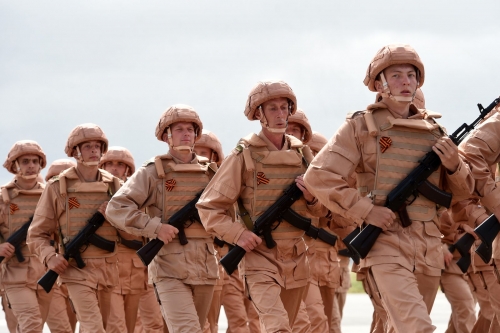
6.
La Russie continuera à renforcer sa souveraineté, mais la restauration de son essence impériale ne peut se faire que par une guerre défensive : s'il y a des provocations contre nous, nous devrons répondre. Si un conflit éclate en Ukraine, la Russie passera à l'offensive et l'Ukraine, en tant qu'entité indépendante et plateforme du mondialisme, disparaîtra d'une manière ou d'une autre. Si cela se produit, il est possible qu'un nouvel État émerge dans les territoires habités par les Slaves de l'Est et qu'enfin la réunification des grands Russes, des petits Russes et des Russes blancs soit à nouveau réalisée.
7.
L'avenir de Nord Stream 2 restera incertain, d'autant plus que l'Allemagne est dirigée par une coalition mondialiste pro-US dirigée par les Verts, bien que le centre-gauche allemand soit également pro-US et ait des liens étroits avec Georges Soros. Cela nous amène à la conclusion que l'Allemagne va entrer dans une série de luttes politiques, car le consensus entre les élites et la société que Schroeder (centre-gauche) et Merkel (centre-droit) avaient forgé va disparaître.
8.
L'Islam politique ne sera plus pertinent et d'autres projets et solutions aux problèmes du Moyen-Orient commenceront à émerger. Cependant, il est peu probable que ces projets soient consolidés dans un avenir proche.
9.
Le Maghreb sera l'épicentre de plusieurs conflits régionaux, notamment entre l'Algérie et le Maroc ou entre le Maroc et le Front Polisario au Sahara occidental. En outre, plusieurs autres affrontements locaux menacent les populations musulmanes africaines (Mali, Nigeria, République centrafricaine, Tchad, etc.). L'avenir de l'Irak reste incertain, d'autant plus que le retrait des troupes américaines est prévu cette année. Tout ceci pourrait accroître les tensions entre les populations chiites, sunnites et kurdes ou déclencher des guerres entre tous ces groupes.
10.
L'Iran restera un pays très stable, car le règne des ayatollahs - contrairement à ce que promeut la propagande occidentale - est assez solide.
11.
La Turquie continuera à être indépendante et autonome tant qu'Erdogan sera au pouvoir, ce dernier commencera probablement à faire face à de nombreux défis internes.
12.
Au sein de l'UE, la France est le pays qui subira le plus de changements, car Eric Zemmour a la possibilité de devenir président. Zemmour est un partisan du gaullisme et du continentalisme, sans compter qu'il a des positions anti-mondialistes et anti-américaines. La France compte actuellement trois candidats de droite - Zemmour, Marine Le Pen et la républicaine Valérie Pécresse - face à Macron, ces candidats se disputant le vote "anti-macroniste" des Français. Si le gaulliste Zemmour ou Marine Le Pen deviennent présidents, alors l'UE dans son ensemble (et surtout l'Italie et l'Allemagne) commencera à devenir un pôle indépendant (surtout maintenant que la Grande-Bretagne ne fait plus partie de l'Europe).
11:55 Publié dans Actualité, Géopolitique | Lien permanent | Commentaires (0) | Tags : alexandre douguine, géopolitique, actualité, politique internationale |  |
|  del.icio.us |
del.icio.us |  |
|  Digg |
Digg | ![]() Facebook
Facebook
vendredi, 28 janvier 2022
Douguine: "Avec l'administration Biden, le conflit est devenu inéluctable"
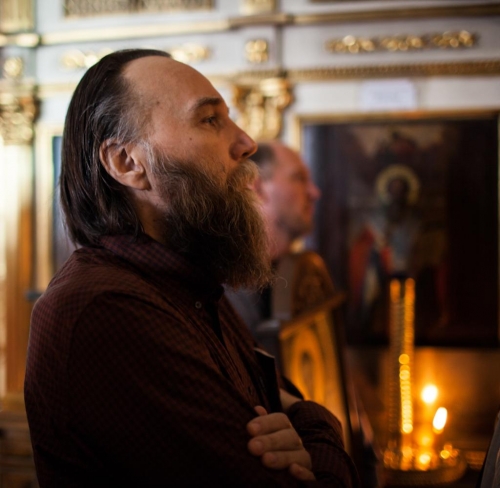
"Avec l'administration Biden, le conflit est devenu inéluctable"
Entretien d'Alexandre Douguine avec l'hebdomadaire viennois zur Zeit
Propos recueillis par Berhard Tomaschitz
Ex: https://zurzeit.at/index.php/mit-biden-regierung-wurde-der-konflikt-unausweichlich/
Le politologue russe Alexander Douguine évoque les causes et le contexte du conflit ukrainien, la lutte des élites mondialistes contre la Russie de Poutine et le rôle des Européens.
Professeur Dugin, le conflit sur l'Ukraine entre les Etats-Unis et l'OTAN d'une part et la Russie d'autre part ne cesse de s'aggraver. Quelles sont les causes de ce conflit ?
Alexander Geljewitsch Dugin : Il est surtout lié à l'administration américaine du président Biden. Naguère, des figures de proue comme le secrétaire d'État Biden ou la secrétaire d'État Nuland étaient impliquées dans tous les problèmes post-soviétiques, elles ont tenté d'encercler la Russie et elles ont suivi une stratégie néoconservatrice définie par Zbigniew Brzezinski et les soi-disant faucons libéraux. Ce que nous voyons aujourd'hui dans l'administration Biden, c'est une alliance entre les néoconservateurs et les faucons libéraux. Et cette alliance est unie par leur haine de Donald Trump, contre le concept "Make America great again", à laquelle s'ajoute l'opposition classique entre puissance maritime et puissance terrestre et l'idée d'intégrer des territoires dans l'espace post-soviétique à sa propre sphère d'influence afin d'affaiblir la position de la Russie et d'empêcher une croissance future de la position de la Russie en tant que pôle souverain dans un monde redevenu multipolaire. Cela remonte à la stratégie dite du "grand échiquier" de Brzezinski, dans laquelle l'objectif principal de l'OTAN et de l'atlantisme était clairement défini comme étant la lutte contre la Russie assortie de l'occupation militaire de l'Ukraine. Trump, en revanche, a suivi une autre approche vis-à-vis de la Russie : pour lui, le monde islamique, l'Iran et la Chine étaient des sphères plus importantes, dont il fallait s'occuper, tandis que Biden est revenu à la géopolitique atlantiste classique de Mackinder et Brzezinski.
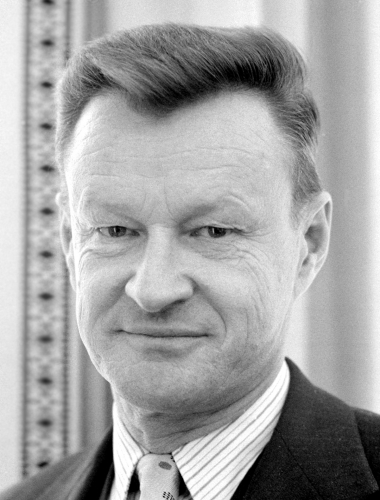
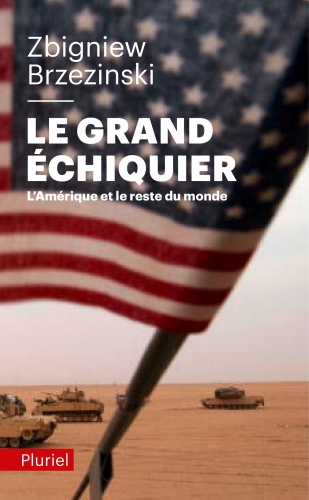
Et qu'est-ce que cela signifie exactement pour la politique étrangère américaine ?
Douguine : Cela signifie que la lutte principale est désormais dirigée contre l'Eurasie, contre le "Heartland" ou "coeur du monde". Cette stratégie de l'anaconda pour encercler l'ennemi a été utilisée pour la première fois pendant la guerre civile américaine pour interdire l'accès aux mers, à l'océan. C'est une politique atlantiste classique, mais aujourd'hui, la Russie est en pleine ascension. Lorsque cette politique dite du "grand échiquier" a été appliquée dans les années 1990, la Russie était en déclin - c'était la défaite de l'Union soviétique, la destruction de l'espace impérial en Eurasie, traditionnellement contrôlé par la Russie. Et l'Occident a saisi l'occasion d'attiser les contradictions entre l'Ukraine et la Russie. La Russie était très faible et n'a pas protesté contre cette situation qui lui était de facto imposée.
Mais aujourd'hui, nous sommes dans une situation totalement différente et Poutine ne peut plus tolérer la poursuite de cette stratégie, et c'est pourquoi je pense que dans la crise actuelle, la Russie tente de renverser la tendance atlantiste existante. Avec Trump, la Russie a pu mener des discussions sur un accord mutuel sur des objectifs régionaux, ce qui a permis à Poutine d'éviter une confrontation directe avec Trump. Mais avec l'administration Biden et son cortège mêlant faucons libéraux et néoconservateurs, le conflit est devenu inévitable. Je pense que la Russie joue ici un rôle actif, car elle tente d'arrêter ce conflit, et cela n'est possible qu'en changeant le régime politique en Ukraine ou l'équilibre géopolitique, car dans la situation actuelle, la Russie n'a pas les moyens d'empêcher l'Ukraine d'adhérer à l'OTAN ou du moins d'empêcher l'installation de bases militaires de l'OTAN ou des États-Unis sur le territoire ukrainien. La Russie devrait avoir la possibilité de contrôler ces menaces, ce qui signifie que ce conflit est inévitable.
Le fait est que le dernier président soviétique, Gorbatchev, a été trop crédule vis-à-vis des Etats-Unis à la veille de la réunification allemande. La Russie se venge-t-elle à présent ? En février 1990, le secrétaire d'Etat américain Baker avait assuré à Gorbatchev que l'OTAN n'avancerait "pas d'un pouce" vers l'est.
Douguine : J'ai personnellement rencontré Zbigniew Brzezinski à Washington en 2005 et je lui ai demandé pourquoi l'Occident n'avait pas suivi les accords passés avec Gorbatchev de ne pas étendre l'OTAN vers l'Est. Brzezinski m'a répondu ouvertement que "nous l'avons mis (Gorbatchev, ndlr) en boîte". C'est le style de la politique occidentale, c'est la stratégie anglo-saxonne de ruser, de mentir et de tromper l'autre. C'est la pratique quotidienne du colonialisme anglo-saxon. Gorbatchev n'était pas faible, mais il est considéré en Russie comme un idiot et un traître parce qu'il a trahi les intérêts nationaux de la Russie. Il a cru aux mensonges de l'Occident, des États-Unis, et nous avons perdu toute notre zone de sécurité autour du noyau russe.
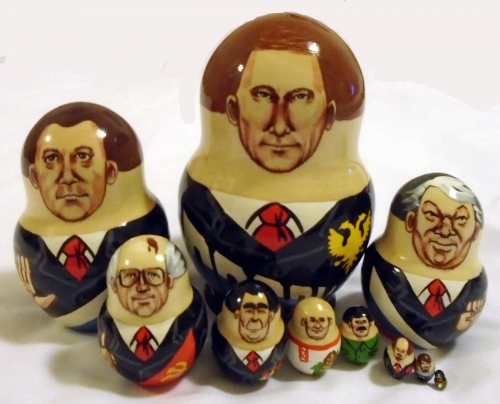
Et c'est ce que Poutine veut désormais changer ...
Douguine : ... Poutine tente désormais de restaurer la grandeur russe, c'est pourquoi il est prêt à défier la situation actuelle, car le pays de Poutine est un nouveau pays, un pays différent de la Russie des années 1990. Le pays est souverain, le pays est indépendant, le pays est un pôle du système multipolaire. Un tel pays ne peut tolérer la position dans laquelle il a été placé à l'époque de Gorbatchev et d'Eltsine. Ces deux anciens dirigeants sont vraiment détestés aujourd'hui au sein de la Fédération de Russie.
Je pense que la Russie est aujourd'hui contrainte de prouver son nouveau statut. Et ce statut est celui d'un pôle indépendant dans un système multipolaire, qui pose l'exigence tout à fait justifiée de sécuriser les frontières nationales et d'éloigner les menaces immédiates des frontières. Je pense que la Russie a préparé de nombreuses réponses symétriques et asymétriques, y compris l'extension de sa présence militaire et stratégique en Amérique centrale et en Amérique du Sud, une nouvelle stratégie en Europe occidentale, une alliance avec la Chine et l'Iran et peut-être avec le Pakistan et la Turquie.
Vous avez dit tout à l'heure que le conflit ukrainien était inéluctable, ce qui semble très pessimiste. Voyez-vous des possibilités de résoudre ce conflit ?
Douguine : Je ne vois pas de moyens raisonnables et sensés, parce que l'Occident ne peut pas laisser la Russie gagner cette escalade dans les relations diplomatiques et ne peut pas accepter publiquement un accord dans lequel il est écrit que l'Ukraine n'adhérera jamais à l'OTAN.
Cela signifierait à son tour la fin de l'OTAN, car si l'OTAN ne peut pas poursuivre son objectif militaire, la valeur de cette alliance est proche de zéro. La Russie a maintenant formulé une demande (pas d'adhésion de l'Ukraine à l'OTAN, ndlr) que l'Occident ne peut tout simplement pas accepter et je pense que cette demande a été formulée intentionnellement et qu'il ne s'agit pas d'un malentendu sur les positions occidentales. Poutine a radicalement modifié l'équilibre des pouvoirs et il souhaite rétablir la grandeur de la Russie en tant que puissance eurasienne indépendante. C'est la cause de l'escalade car Biden veut exactement le contraire.
Comment voyez-vous le rôle de l'UE dans le conflit ukrainien ?
Douguine : Elle n'a visiblement aucun intérêt à une escalade. L'Union européenne a seulement envie de se tenir à l'écart et de rester en dehors du conflit. Mais l'Union européenne dépend trop des Etats-Unis, la plupart de ses membres font également partie de l'OTAN. L'Union européenne est également victime de ce conflit, car la position atlantiste radicale des Etats-Unis n'est pas seulement dirigée contre la Russie, mais aussi contre une éventuelle transformation de l'Union européenne en un pôle indépendant. Il s'agit donc aussi d'une guerre spécifique de l'Amérique contre l'Europe. Je pense que Washington - dont le mot-clé est "sanctions" - veut forcer l'Europe à rejoindre les rangs des Américains dans ce conflit. Mais je pense que ce n'est pas dans l'intérêt des peuples et des États-nations européens. Une élite mondialiste veut empêcher qu'une alliance se forme entre la Russie et une Europe indépendante. Une telle alliance est possible, mais uniquement avec une Europe indépendante et non avec une Europe entièrement sous le contrôle d'une puissance extra-européenne, comme c'est le cas avec l'OTAN ou la communauté transatlantique.
Je pense que cela va aggraver le conflit au sein des pays européens, parce que l'élite libérale, mondialiste et atlantiste qui gouverne aujourd'hui l'Europe ne correspond pas à la majorité des citoyens moyens, qui ne voient pas la Russie comme un ennemi, ne veulent pas être ennuyés par le sort de l'Ukraine et ne partagent pas cet agenda ultralibéral.
Si un conflit devait commencer, nous serions dans une toute nouvelle réalité et beaucoup de choses changeraient radicalement. Je pense que nous nous approchons d'un point historique très important, un point irréversible de changement radical dans l'équilibre du pouvoir. Cela peut déboucher sur une guerre - pas seulement une guerre locale, mais une guerre plus terrible.
L'entretien a été mené par Bernhard Tomaschitz.
15:20 Publié dans Actualité, Affaires européennes, Entretiens | Lien permanent | Commentaires (0) | Tags : actualité, alexandre douguine, politique internationale, russie, ukraine, états-unis, otan, géopolitique, europe, affaires européennes |  |
|  del.icio.us |
del.icio.us |  |
|  Digg |
Digg | ![]() Facebook
Facebook
mercredi, 26 janvier 2022
L'idéologie russe dans la nouvelle réalité
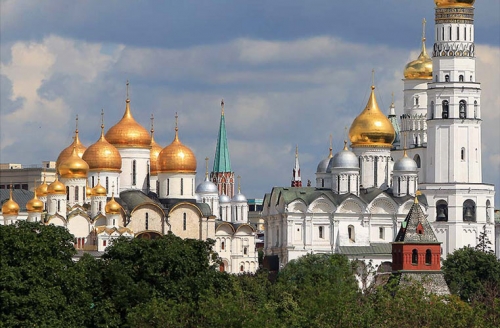
L'idéologie russe dans la nouvelle réalité
Alexandre Douguine
https://www.geopolitica.ru/article/russkaya-ideologiya-v-novoy-realnosti
Les tensions entre la Russie et l'Occident, en particulier les États-Unis, ont atteint un tel point que, indépendamment du fait qu'un conflit militaire direct ait lieu ou non, des lignes rouges ont été tracées non seulement dans l'espace géographique, mais aussi dans la sphère de la civilisation et de l'idéologie. Indépendamment de la question de savoir si les uns imposeront des sanctions (et/ou des troupes) contre les autres ou non, il est clair qu'un fossé fondamental et irréversible entre la Russie et l'Occident est d'ores et déjà un fait accompli. Qui tirera le premier coup de feu, et si oui ou non il sera tiré, et comment les événements se dérouleront ensuite, sont d'une importance secondaire face à ce qui s'est déjà passé et ce qu'aucune des parties - en particulier la partie russe - ne sait encore.
La mentalité russe ne peut tolérer de ruptures brutales ; tout sera toujours comme aujourd'hui. Et même lorsque le pays est en guerre ou subit des changements colossaux, les Russes vivent dans un sentiment intérieur de paix et de stabilité. Nous sommes porteurs d'une psychologie harmonieuse et stable, ce qui est difficile à traduire en état d'urgence. C'est ce que signifie le proverbe russe qui dit en substance: "nous mettons du temps à nous atteler". Si longtemps qu'ensuite nous sommes simplement obligés de rouler à des vitesses extrêmes - hypersoniques - pour rattraper notre retard. Sur le plan militaire et diplomatique, nous semblons être harnachés et prêts à craquer. Dans le domaine de l'idéologie et de la vision du monde, le rêve dogmatique - "rien ne se produit et ne se produira pas" - se poursuit en toute force. Ici, l'ambiance des années 90 prévaut encore et 20 ans de réformes patriotiques ne sont pas à l'honneur.
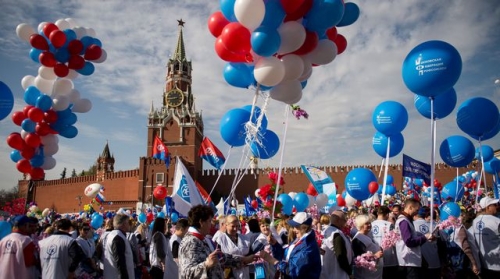
Et en vain : la réalité a changé de manière irréversible il y a déjà longtemps, et maintenant elle est si claire et si perçante qu'il semblerait impossible de ne pas s'en rendre compte - mais non, il s'avère que c'est possible. Le paradigme libéral-occidental reste encore dominant dans l'éducation, les sciences humaines, la culture et la vision du monde en général. Les corrections apportées au conservatisme ici sont superficiellement de nature cosmétique.
Et pendant ce temps, la Russie rompt irréversiblement avec l'Occident. Elle l'a déjà fait. De gré ou de force, nous nous déconnectons rapidement du monde occidental, de ses règles, de ses standards, de ses normes et de ses protocoles. Cela ne se produit pas sur la base d'une comparaison équilibrée et souveraine de l'identité russe avec l'identité libérale-mondialiste moderne. Nous avons simplement été contraints d'évoluer dans cette direction, ne nous laissant aucune place dans le monde global - du moins pas une place que nous considérerions comme acceptable pour nous-mêmes.
Le rapprochement de Moscou avec l'Occident à la fin des années 1980 et dans les années 1990 a été perçu par l'Occident comme une défaite et il a commencé à se comporter avec nous comme si nous étions des vaincus. Et ils étaient dangereux et prêts à tenter leur vengeance à tout moment. D'où l'expansion de l'OTAN vers l'est et la violation de toutes les obligations accordées à Moscou en échange de sa capitulation. C'est ainsi que l'Occident traite souvent, sinon toujours, les adversaires vaincus. Le traité de Versailles a été si humiliant pour l'Allemagne qu'une vengeance comme le national-socialisme d'Hitler a été possible. L'Occident a fait la même chose à la Russie dans les années 1990.
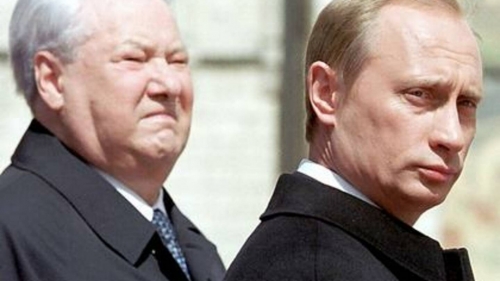
Mais sous Poutine, la Russie a gagné en force, est devenue un pôle et a commencé à se comporter de manière souveraine. Une fois de plus, l'Occident n'a tiré aucune conclusion et continue de traiter la Russie comme "une puissance régionale incontrôlable et dérangée" à laquelle il faut "donner une leçon, remettre à sa place". Poutine est prêt à être ami avec l'Occident et à accepter ses règles du jeu si elles sont respectées par les deux parties. Mais cela n'est pas acceptable pour l'Occident, qui ne manque aucune occasion de rappeler que toutes les démocraties sont égales, seules certaines sont "plus égales que d'autres". Une telle "ferme des animaux" mondialiste-libérale ne convient pas à Poutine. Nous sommes dès lors de plus en plus malheureux, jusqu'à ce que, finalement, nous parvenons à tout maîtriser et soyons prêts pour une promenade à vive allure.
Pour les autorités russes, il s'agit d'une mesure forcée ; elles ne font que réagir. Mais en fait, une réalité plus profonde - la particularité civilisationnelle de la Russie, notre identité et les lois fondamentales de la géopolitique - entre en jeu. Dans notre histoire, l'Occident a toujours agi comme l'Autre. Et peu importe à quel point nous nous rapprochions, nous finissions par des confrontations et des guerres. Il est nécessaire de maintenir une distance entre nous et l'Autre. Si cette distance est trop courte, le pendule basculera de l'autre côté. C'est exactement ce qui se passe actuellement.
Moscou, bien qu'à contrecœur, s'oppose à l'Occident. Après avoir dit "non" à l'Occident, à un certain moment - en principe, ce moment est déjà arrivé - il est nécessaire de formuler ce à quoi nous disons "oui" ? Ce que nous refusons est clair : le libéralisme, le mondialisme, le posthumanisme, la politique du genre, l'hégémonie, les doubles standards, la culture postmoderne et la culture dominante à l'Ouest. Qu'est-ce que nous affirmons ?
Ici aussi, toutes les idéologies historiques qui, à des stades antérieurs, ont justifié la différence de destin entre la Russie et l'Europe (l'Occident) deviennent particulièrement pertinentes. Ce sont eux qui vont devenir le terrain fertile pour la redéfinition de l'Idée russe.
Ce sont:
- La vision de la Russie comme un bastion du christianisme orthodoxe, la doctrine de Moscou-Troisième Rome ;
- La doctrine connexe de la signification universelle fatidique de la monarchie russe (catéchisme) ;
- Les idées slavophiles sur la mission historique des Slaves orientaux (et de tous les autres) - la troisième Renaissance ;
- Théorie eurasienne de la Russie en tant que civilisation distincte, radicalement différente de l'Occident ;
- Les opinions des Narodniki russes sur l'essence agraire de la société russe et le rejet de la voie industrielle du développement ;
- L'idéologie soviétique en opposition au capitalisme occidental et mondial ;
- Le sophia et le mysticisme patriotique de l'âge d'argent.
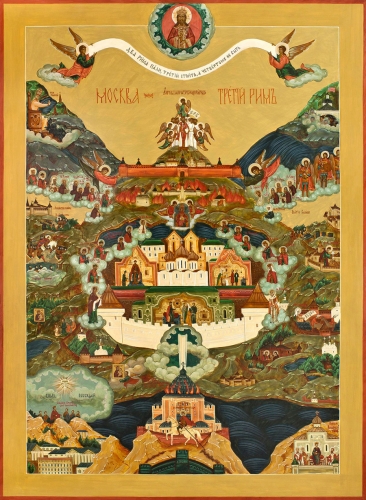
Ce sont les principales sources et composantes de la nouvelle identité russe. En même temps, il est important de ne pas se contenter de restaurer ces paradigmes, en rétablissant avec eux les schismes, les contradictions et les oppositions qui ont existé historiquement entre eux, mais d'élaborer une approche synthétique qui rejette également les prétentions de l'Occident à l'universalité et à l'optimalité de ses "valeurs" (qui sont communes à toutes ces écoles) et forme une image russe de l'avenir. Une fois de plus, il ne s'agit pas d'une question de combinatoire ni de technologie politique : il ne faut pas permettre à ces petites racailles serviles et fallacieuses, les praticiens de l'ingénierie politique, d'atteindre l'idéologie d'une seule balle. Nous avons besoin d'une percée de la pensée russe, d'un réveil spirituel, de la résurrection du Logos russe. C'est l'œuvre des penseurs et des mystiques, des créateurs du grand projet. Il faut de l'inspiration, une vision pure et une motivation limpide, une solidarité profonde avec le destin russe.
Il est clair que le Kremlin n'envisage pas sérieusement cette possibilité. Les questions militaires et diplomatiques sont à l'ordre du jour. C'est compréhensible. Les autorités suivent ce qui leur semble être "le cours objectif des événements". Il ne se soucie pas du Logos ou du sens de l'histoire.
Mais pour ceux qui comprennent la mission profondément russe, ce qui se prépare maintenant est évident depuis longtemps - si ce n'est depuis toujours - et le conflit avec l'Occident était considéré comme quelque chose d'inévitable, même lorsque la grande majorité croyait en la perestroïka, les réformes ou la réinitialisation. Et si, aujourd'hui, seuls les faibles d'esprit ou les agents d'influence directs peuvent ignorer cette vérité ancienne (pour nous) et essentiellement éternelle, même ceux qui sont à l'avant-garde de la vraie politique aujourd'hui ne pensent pas à l'Idée. Il n'y a pas de véritable politique sans repères idéaux, sans Idée, sans idéologie.On peut ne pas la comprendre, mais on ne peut pas la changer. Par conséquent, les autorités - dans un avenir très proche - lorsque le moment d'un "tour rapide" arrivera enfin - devront faire face au décalage qui existe dans notre société entre l'état apathique et endormi des esprits et la gravité et l'ampleur du conflit de civilisation. Le réveil des Russes est inévitable. Nous entrons dans l'ère du Logos russe.
13:59 Publié dans Actualité, Affaires européennes | Lien permanent | Commentaires (0) | Tags : alexandre douguine, nouvelle droite, nouvelle droite russe, europe, affaires européennes |  |
|  del.icio.us |
del.icio.us |  |
|  Digg |
Digg | ![]() Facebook
Facebook
samedi, 15 janvier 2022
Alexandre Douguine: entretien avec Caliber.az (Azerbaïdjan)
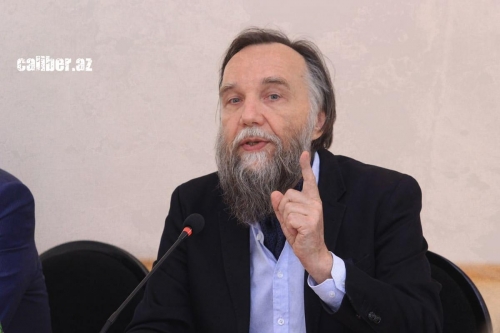
Caliber.az : entretien-choc avec Alexandre Douguine
Entretien de Caliber.az (Azerbaïdjan) avec le leader du Mouvement international eurasien, le politologue et philosophe russe Alexandre Douguine
Propos recueillis par Matanat Nasibova
Source: https://www.geopolitica.ru/article/ostryy-razgovor-caliberaz-s-aleksandrom-duginym
- Alexandre G., dans une récente interview pour la chaîne de télévision Tsargrad, vous avez fait une déclaration extrêmement forte sur les récents événements au Kazakhstan, affirmant que "l'intégrité territoriale de tous les États post-soviétiques dépend de la Russie" et que, par conséquent, tous devraient se tourner vers elle pour obtenir de l'aide afin de ne pas être attaqués. Suggérez-vous que les pays de l'ancienne Union soviétique devraient renoncer à leur souveraineté ? Est-ce là votre idée ?
- On ne peut pas renoncer à la souveraineté, mais il faudrait alors renoncer à l'intégrité territoriale. Je crois que la question de la souveraineté a une nouvelle signification à notre époque. Dans notre monde moderne, les États qui disposent d'énormes stocks d'armes nucléaires, d'énormes ressources démographiques et naturelles et de vastes territoires sont souverains. Et la souveraineté des autres acteurs, plus petits, dépend de leurs relations avec les pôles qui ont une souveraineté pleine, fondamentale, réelle et qui peut être prouvée. Il n'y a que trois pôles souverains dans le monde d'aujourd'hui. Il y a les États-Unis et les pays de l'OTAN, le bloc occidental commun, il y a la Chine par sa puissance financière et la Russie par sa puissance militaire. L'Iran, le Pakistan, l'Inde et un certain nombre d'autres pays aspirent à la souveraineté, mais aucun de ces pays ne constitue encore un pôle à part entière. C'est pourquoi la question de l'espace post-soviétique se pose aujourd'hui de manière très aiguë. C'est maintenant ou jamais car nous avons désormais un "moment de vérité" fondamental pour toutes les républiques post-soviétiques. La plupart d'entre elles sont des États en faillite. Parlons franchement - ce sont les États qui ont émergé sur les restes et l'effondrement de l'Union soviétique, ils ont été soutenus par l'Occident justement en dépit de la Russie, qui reste le principal rival géopolitique de la civilisation occidentale. Par conséquent, ces États post-soviétiques sont construits sur une politique à double vecteur. C'est-à-dire qu'ils se tournent en partie vers la Russie et en partie vers l'Occident.
- De quels États particuliers parlez-vous ?
- Je veux juste être plus précis, ne m'interrompez pas. Certains de ces États, par exemple, dans le bloc GUAM, avaient une orientation plus pro-occidentale. Il s'agissait de la Géorgie, de l'Ukraine, de la Moldavie et, à un moment donné, de l'Ouzbékistan, toujours lors de la création du GUAM. Mais la situation a commencé à changer, le GUAM a commencé à s'affaiblir et les pays de la CEEA ont commencé à graviter davantage vers la Russie, tout en maintenant des liens avec l'Occident, ce qui a créé une situation dite à vecteurs multiples qui était finalement une impasse. Et il s'agit maintenant de savoir avec qui, ou plutôt avec lequel de ces trois pôles l'espace post-soviétique va se trouver. La Chine n'est pas une alternative à la Russie. Avec la Chine, la Russie entretient un excellent partenariat stratégique visant à affaiblir l'hégémonie de l'Occident. En d'autres termes, la Russie et la Chine représentent deux pôles anti-occidentaux, et il faut donc choisir entre la Russie et la Chine et l'Occident. Chaque État est confronté à cette situation. Il est suggéré aux États qui prendront le parti du monde multipolaire, c'est-à-dire la Russie et la Chine, de s'unir plus étroitement et de cesser de chercher un équilibre introuvable entre ces trois grandes puissances. C'est-à-dire qu'il faut choisir les pôles sur lesquels un État s'aligne, et ainsi préserver sa souveraineté.
Maintenant, pour répondre à votre question. La Géorgie et l'Ukraine, qui tentent de préserver leur souveraineté en se tournant vers l'Ouest, ont subi d'énormes pertes territoriales.
- Pourquoi la Russie n'a-t-elle pas soutenu l'Azerbaïdjan pendant 30 ans ? Pendant toutes ces années, les territoires azerbaïdjanais ont été occupés par l'Arménie, et l'intégrité territoriale de notre pays a été violée au mépris des lois du droit international.
- Je n'aime pas vraiment l'agressivité de cette question, mais je vais quand même y répondre. Lorsque l'Arménie a voulu se rapprocher de l'Occident, elle a perdu le contrôle du Karabakh parce que la Russie a, si l'on peut dire, soutenu d'une certaine manière la restauration de l'intégrité territoriale de l'Azerbaïdjan.
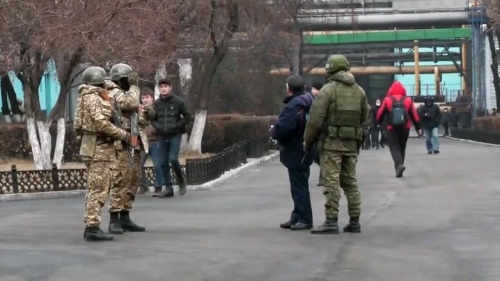
Regardez. Nous sommes amis avec Bakou, nous avons aidé et soutenu la restauration de l'intégrité territoriale de l'Azerbaïdjan, beaucoup de choses ont changé au fil des ans. Dans les années 90, la clique d'Eltsine dirigeait la Russie, c'était un gouvernement d'occupation. Et lorsque Poutine est devenu progressivement fort, il a commencé à mener le type de politiques qui sont dans l'intérêt de la Russie, en soutenant ses amis et en punissant ses opposants. Et, en fait, le soutien des amis s'est exprimé en faveur de la restauration de l'intégrité territoriale de l'Azerbaïdjan. La punition pour ceux qui hésitaient, notamment en la personne de Pashinian, était la même. La punition pour la Géorgie a eu lieu en 2008, la punition pour l'Ukraine a eu lieu en 2014. Et maintenant, le soutien aux amis du Kazakhstan s'incarne par l'envoi de troupes de secours de l'OTSC pour maintenir l'ordre et la légitimité politique.
Maintenant que les choses ont dégénéré, c'est ce qui est vraiment important. Il est important de changer le ton, il est important de comprendre que Poutine est maintenant dans un état où il ne tolérera plus de demi-mesures. Il l'a dit à Lukashenko et à Tokayev, en déclarant que "si vous êtes amis, allons ensemble de ce côté, si vous êtes indécis, alors déclarez-le. Vous aurez alors un statut différent si vous n'avez pas décidé jusqu'à la fin avec qui vous êtes". Je parle des pays post-soviétiques. Si vous êtes pour l'OTAN, si vous voulez vous intégrer à l'Occident, si vous laissez entrer des acteurs occidentaux dans votre économie, si vous flirtez avec les Britanniques, les Anglo-Saxons, vous le paierez. C'est donc à peu près là où nous en sommes.
Cela dit, je tiens à dire d'emblée que l'Azerbaïdjan est un allié stratégique très important pour nous, et c'est grâce au fait que les bonnes relations entre Aliyev et Poutine se sont développées de plus en plus, c'est pourquoi les choses sont en fait très bonnes. La seule chose est que le moment est venu pour l'Azerbaïdjan de s'associer plus étroitement aux processus d'intégration dans l'espace post-soviétique. Et il me semble que Bakou a déjà fait son choix. C'est mon opinion personnelle.
- Disons-le sans ambages. La Russie s'obstine à inviter l'Azerbaïdjan à l'UEE et à l'OTSC?
- Oui. On en parle depuis longtemps. Le problème du Karabakh y faisait obstacle, comme cela a été dit à maintes reprises lors des sommets russo-azerbaïdjanais. Ce problème est maintenant résolu, et nos dirigeants doivent déterminer eux-mêmes quand et sous quelle forme, dans quel délai et dans quelles conditions le processus de rapprochement ultérieur aura lieu. Beaucoup avaient peur, nous avions peur, et probablement que l'Azerbaïdjan avait aussi peur que l'Arménie fasse obstacle. Mais maintenant, les Arméniens, à mon avis, ont tout compris après l'histoire instructive du Karabakh. Ils ont compris que la Russie n'est pas seulement un pays auquel on peut obéir ou non. Ne pas écouter la Russie vous coûtera de l'argent. Pashinyan en a tiré une conclusion et agira donc de manière rationnelle, d'autant plus que personne n'a rien contre l'Arménie - ni la Russie, ni l'Azerbaïdjan, ni la Turquie. Si l'Arménie se comporte correctement, ce n'est que dans notre et votre intérêt.
- Votre dernière formulation me rappelle le slogan soviétique "Tous pour la paix dans le monde".
- Non, absolument pas. Nous ne sommes pas pour la paix dans le monde. Ce slogan est trop abstrait, il peut être appliqué à n'importe quoi. Nous sommes spécifiquement pour la paix dans l'espace post-soviétique et la Russie est responsable de cette paix.
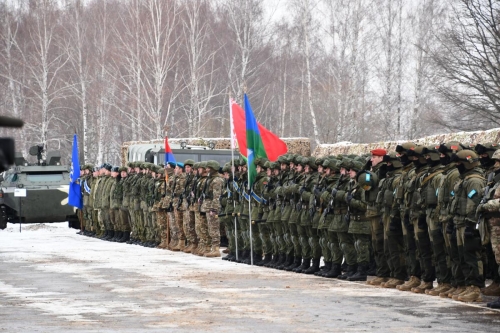
- Dans ce cas, précisez un point. Vous ne cessez de critiquer la politique américaine, l'hégémonie des États-Unis, etc. Mais en même temps, dans le contexte du Kazakhstan, vous dites : "Si les dirigeants kazakhs ne peuvent pas garantir leur allégeance à la ligne eurasienne, la situation s'aggravera et le sort de l'intégrité territoriale du Kazakhstan sera remis en question. N'est-ce pas une tentative de menace ? Ou pensez-vous qu'il s'agit d'un "avertissement amical" ?
- Cela ne concerne pas seulement l'espace post-soviétique. Je pense que l'intégrité territoriale de la Russie est un pôle d'intérêt. La Russie peut punir ceux qui la défient, mais peut aussi, dans le cas contraire, leur apporter un soutien amical. C'est ainsi que fonctionne toute ceinture territoriale/impériale. Pendant toutes ces années, nous avons vécu dans un monde unipolaire, dans lequel tout dépendait des États-Unis. Aujourd'hui, nous vivons dans un monde multipolaire, et l'influence et l'hégémonie des États-Unis ont considérablement diminué. Quelque part, ils sont toujours la force déterminante. En Syrie, par exemple, au Moyen-Orient, les Américains ont dit "non" à l'intégrité territoriale, tandis que la Russie a dit "oui" et a arrêté les processus destructeurs. En d'autres termes, lorsque nous devons le faire, nous sauvons le pays de l'effondrement, mais lorsque nous n'y sommes pas obligés, nous ne controns pas son effondrement. Et il y a suffisamment de tendances chaotiques et désintégratrices dans toute société.
- Comme dans le cas de l'Arménie ?
- Parmi d'autres. C'est-à-dire que nous devons adopter une "stratégie froide", comme je l'ai dit, compte tenu des trois pôles. La Chine s'adapte constamment, se rapprochant de plus en plus de la Russie, ce qui est absolument logique et rationnel. Il est donc préférable de parler du double pôle Russie-Chine qui s'oppose au monde unipolaire et grâce au fait qu'il s'est formé, ce monde unipolaire n'existe plus.
- Pensez-vous que la Russie et la Chine peuvent défier les États-Unis et les pays de l'OTAN ?
- C'est déjà vrai, factuel. Lorsque les Turcs ont abattu notre avion en Syrie, la situation était presque au bord du conflit militaire. En outre, la question de l'intégrité territoriale de la Turquie et la mobilisation de la population kurde étaient également à l'ordre du jour. Il a également été utilisé par les Américains lorsqu'ils ont organisé une tentative de coup d'État contre Erdogan. La Russie a alors soutenu Erdogan, ce qui a été suivi par la mobilisation des mouvements séparatistes kurdes dans le nord de l'Irak, en Syrie et en Turquie même. La moitié des territoires de la Turquie est peuplée de Kurdes, un facteur qui menace l'intégrité territoriale de la Turquie. Tant qu'Ankara est ami avec Moscou, rien ne menace les Turcs. D'une manière ou d'une autre, les projets américains de soutien au séparatisme en Turquie peuvent être contrés conjointement. Mais dès qu'Ankara défiera la Russie, la situation pourrait changer. Et il en va de même pour tous les États plus ou moins limitrophes du territoire russe.
- Ce n'est pas un secret que la Russie aimerait beaucoup voir la Turquie dans l'UEE. Mais la question est de savoir dans quelle mesure la Turquie elle-même s'y intéresse.
- Bien sûr qu'elle l'est. Je suis en contact étroit avec les dirigeants turcs, ils envisagent ces options. Erdogan, à mon avis, a déjà brûlé ses ponts avec l'Occident. Il est bien conscient que l'Occident est un danger mortel, un pôle toxique qui agonise et est entrain de perdre son hégémonie. C'est pourquoi, me semble-t-il, tout s'annonce pour le monde turc de la manière la plus favorable qui soit.
- Revenons au Kazakhstan. Vous avez déclaré que "si les dirigeants kazakhs ne sont pas en mesure de garantir la poursuite du processus d'intégration et d'allégeance à la ligne eurasienne, la situation s'aggravera", c'est-à-dire que le sort de l'intégrité territoriale du Kazakhstan sera remis en question. Est-ce un avertissement ou un ultimatum ?
- Cela dépend. Eh bien, si vous voulez, c'est un avertissement. Par exemple, je connais personnellement très bien Nursultan Abishevitch Nazarbayev, j'ai même écrit un livre sur lui. Il a suivi le modèle eurasien pendant longtemps, il a parfaitement compris que l'orientation vers la Russie et la Chine est une condition pour maintenir la souveraineté du Kazakhstan. Mais malheureusement, au cours des dix dernières années, Nazarbayev et surtout son clan se sont éloignés de ce modèle et se sont de plus en plus impliqués dans des projets anglo-saxons, britanniques, ont remplacé le russe par l'anglais, ont commencé à saboter l'intégration économique, ce que mon ami Sergey Glazyev a dit à plusieurs reprises. En fait, c'est le recul de Nazarbayev par rapport à l'orientation eurasienne, à la Russie, à la création d'un bloc slavo-turc uni, qui a conduit à la crise que nous connaissons aujourd'hui. Et pour éviter cela à l'avenir, toute présence britannique sur place devrait être réduite au minimum, les projets d'intégration devraient cesser d'être sabotés par les autorités.
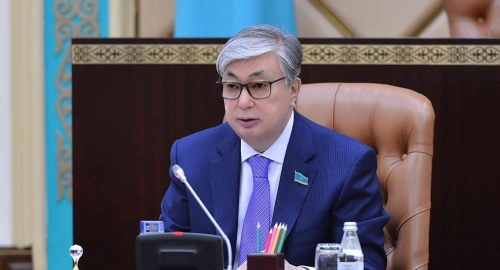
- Le président Tokayev du Kazakhstan est-il prêt pour tout cela ?
- Tokayev devrait être prêt pour cela, car il a compris que c'est le seul choix possible pour le Kazakhstan; il a fait le choix que fit Nazarbayev dès le début. Et l'élite pro-occidentale corrompue, soutenue par l'Occident, a opté pour un scénario extrême: la déstabilisation. Pour le moment, il n'y a donc pas de place pour une politique multivectorielle au Kazakhstan. Et c'est bien un ultimatum, mais pas le mien, ni celui de la Russie, mais celui de la logique politique elle-même.
Je suis étonné que Nazarbayev ait compris, mieux que les autres dirigeants de l'espace post-soviétique, et même mieux que Poutine, les lois du grand jeu, de la géopolitique, de la multipolarité, très clairement dans ses articles, ses conversations et ses discours. Ce qui s'est passé ces dix dernières années, je ne le sais pas. Je peux supposer que d'une manière ou d'une autre, peut-être par le biais d'un entourage corrompu, d'une agence d'influence américaine, britannique ou européenne au Kazakhstan ou aux dépens de certains clans compromettants, cette ligne d'intégration eurasienne de l'ancienne Union soviétique a été ralentie et reportée. Aujourd'hui, le Kazakhstan récolte les fruits de tout cela.
- En d'autres termes, il n'y a pas de variantes ? Pour s'assurer le soutien de la Russie, il faut expulser tous les partenaires occidentaux du Kazakhstan, refuser les projets étrangers ?
- Le fait est que l'Occident ne doit pas exercer une influence décisive sur la stratégie du Kazakhstan. L'éviction de la langue russe de tous les projets éducatifs par des programmes en langue anglaise est un défi pour la Russie. Cela doit cesser. Il est nécessaire de restituer les ressources et les actifs les plus importants, qui sont aux mains des Britanniques, au gouvernement national kazakh. Il s'agit de ne pas s'asseoir entre deux chaises. Les événements en Ukraine, à travers l'exemple de Porochenko, l'ont démontré, et cela s'applique à tous les dirigeants des pays post-soviétiques. Vous devez choisir une chaise. Si vous choisissez le russe, alors rapprochez-vous de nous, jouez selon nos règles, soyez de bons amis, et nous vous répondrons de la même manière. Si nous avions organisé cette agitation au Kazakhstan, la situation aurait été différente. Mais tout a commencé là-bas sans nous. Nous y sommes allés en tant qu'amis, mais vous devez comprendre qui était derrière ces événements.
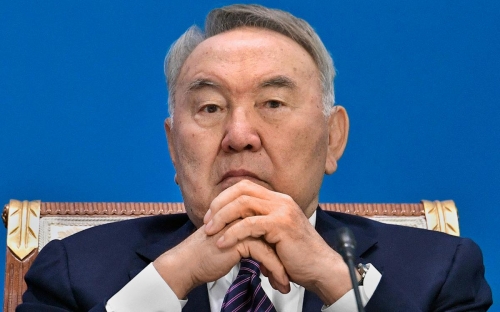
- Le savez-vous ?
- Sans aucun doute, les réseaux occidentaux, que Nazarbayev a laissé entrer, étaient au centre de tout cela. Il convient de rappeler que ce sont les entreprises britanniques qui ont augmenté les prix du gaz liquéfié jusqu'à cent pour cent, ce qui a provoqué les émeutes spéctaculaires à Aktau. C'était une provocation de premier ordre. Autrement dit, ce n'est pas le gouvernement qui a augmenté les prix, mais les propriétaires britanniques des entreprises vendues par Nazarbayev. Mais l'agitation du peuple s'est rapidement transformée en une rébellion militaire, des mercenaires sont apparus, etc. L'un d'entre eux était Ablyazov - un oligarque fugitif comme notre Khodorkovsky ou notre Berezovsky - un voleur qui y a dérobé plusieurs milliards de dollars. En même temps, il y avait les réseaux gulénistes, les opposants à Erdogan, qui se sont enracinés au Kazakhstan et qui n'ont pas été neutralisés par Nazarbayev. Il y avait des fondamentalistes islamiques et toutes sortes de mercenaires, comme l'a dit le président Tokayev. Et rien de tout cela ne serait arrivé si certaines élites corrompues ne se trouvaient pas derrière les rebelles, celles-là mêmes qui souhaitaient jadis, plus que tous les autres, l'intégration eurasienne. Par exemple Massimov: nous savons qu'il était une liaison avec Hunter et Joe Biden. Maintenant il est arrêté pour trahison. Tous ces éléments nous permettent de remonter la piste vers les États-Unis, vers la CIA, vers un certain nombre de structures pro-occidentales directement ou indirectement mandatées et vers des clans corrompus proches de Nazarbayev. Le rapprochement de Tokayev avec la Russie a semé la panique dans leurs rangs. Et, en principe, il s'agissait d'une véritable tentative de coup d'État, ce que, d'ailleurs, le président du Kazakhstan a dit.
- Ne pensez-vous pas que Nazarbayev a été écarté de la grande politique après avoir cessé d'être acceptable pour les intérêts de la Russie ?
- Au cours des dix dernières années, il s'est lui-même éloigné du modèle eurasien de développement. Il s'agit d'un changement stratégique de priorités, il a décidé de faire du Kazakhstan une sorte de Singapour, sur la base d'un jeu impliquant les trois puissances. Soit la Chine, à laquelle est progressivement passée la partie significative de la sphère financière, l'Occident représenté par la Grande-Bretagne, à qui a été confiée la supervision idéologique de ce projet, et la Russie, qui est apparue comme un élément de puissancesecondaire, qui ne serait pas nécessaire au Kazakhstan. C'est tout simplement un mauvais calcul géopolitique.
Ce qui est étrange, c'est que Nazarbayev a compris que ce n'est pas possible. Il a compris que la multipolarité est un destin, qu'il ne pouvait pas flirter avec une hégémonie unipolaire. Néanmoins, il a fait ce qui n'aurait pas dû être fait. C'était une erreur stratégique colossale de l'ancien président.
Vous savez ce qu'il m'a promis ? Il a dit : "Je démissionnerai de mon poste de président, je deviendrai le chef du mouvement international eurasien, car c'est le destin de l'Eurasie. C'est un fait historique". En attendant, il aurait pu entrer dans l'histoire. Mais non. Parier sur l'Occident est ruineux, même pour un grand homme comme Nazarbayev.
- Que savez-vous du sort de Nazarbayev ?
- Il y a beaucoup de rumeurs qui circulent en ce moment. Il est connu pour être en mauvais état depuis longtemps, il est donc difficile de dire s'il est vivant ou non et s'il se déplace par ses propres moyens. Il y a beaucoup de désinformation à ce sujet en ce moment. Ce n'est pas une question de principe pour le moment. Le véritable leader subjectif est le président Tokayev, qui a complètement remanié le bloc au pouvoir. C'est pourquoi nous parlons à Tokayev maintenant. Si Nazarbayev a encore ses esprits, il aura l'occasion de repenser à ses erreurs et de les confesser honnêtement devant le peuple du Kazakhstan.
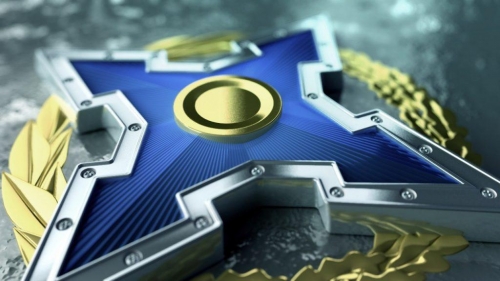
Je pense que la position de Tokayev est sauvée, mais le peuple du Kazakhstan décidera lui-même qui sera le leader. Tokayev a pratiquement empêché le Kazakhstan de glisser vers un scénario syrien, une guerre civile, et ce n'est que maintenant qu'il a passé un véritable test de pouvoir, de sa subordination. Ses positions seront donc renforcées, et s'il parvient à tirer les conclusions qui s'imposent et à réparer les erreurs de son prédécesseur, c'est-à-dire s'il parvient à neutraliser l'élite pro-occidentale corrompue présente dans les différents clans du Kazakhstan, il a une chance de devenir une nouvelle étoile de la politique post-soviétique, et donc de mener le Kazakhstan sur la voie du renforcement de sa souveraineté grâce à l'amitié avec la Russie et la Chine dans le cadre du paradigme multipolaire euro-asiatique.
- Que vouliez-vous dire lorsque vous avez suggéré de supprimer le mot "économique" de l'acronyme EAEU ?
- Je vais le dire comme suit. Dans les années 90, Nazarbayev a avancé l'idée d'une Union eurasienne sans le mot "économique". Nous lui en avons même parlé plusieurs fois par la suite. Il était favorable à l'unification de l'espace post-soviétique en une unité confédérative dotée d'une structure militaro-stratégique unique, dont le rôle devait être joué par l'OTSC, et d'un vecteur unique de vision du monde, dont le rôle devait être joué par l'eurasisme avec le rôle central de la Russie. Mais en même temps, M. Nazarbayev a déclaré que sans le facteur turc et sans le monde islamique, une telle alliance ne serait pas complète. Et il voyait ce rôle comme celui de représentant des peuples islamiques et turcs au sein de l'Union pour le Kazakhstan. Mais ensuite, lorsque Poutine a donné son feu vert, les mêmes Kazakhs ont refusé, disant que ce n'était pas le moment de créer une Union eurasienne: ils ne voulaient parler que d'économie. Et ce sont eux qui ont imposé ce mot "économique", faisant de l'UEE une sorte de structure boiteuse. En fait, nous devons créer l'Union eurasienne selon les préceptes de Nazarbayev, car c'est une excellente idée.
- Pour s'opposer à l'Union européenne ?
- Parce que de cette façon, c'est beaucoup plus compréhensible et prévisible.
- À la fin de notre conversation, j'ai eu l'impression que vous défendiez l'idée de faire revivre l'URSS 2.0.
- L'URSS est une construction idéologique basée sur l'idéologie communiste. Par conséquent, il est impossible de restaurer l'URSS sans l'idéologie communiste. Je ne suis pas un partisan de cette idée, en fait, je ne suis pas sûr qu'elle soit encore possible. Et ces territoires, où se trouvait l'URSS, n'ont pas été unis par les communistes, ni par les bolcheviks en 1917 ou 1922. Ce sont les territoires de l'Empire russe, qui les a rassemblés sous ses bannières avec son élite, qui est devenu impérial en même temps que les peuples, qui sont devenus non pas des esclaves soumis, non pas des colonies, mais des provinces habitées par d'autres peuples.
L'Empire russe n'a jamais été une entité ethnique, et je pense que la restauration de l'URSS n'est pas pertinente dans nos circonstances. Il est nécessaire de créer un État du futur, un grand espace, l'Union eurasienne, fondé sur notre histoire commune, mais orienté vers la réalisation de nouveaux horizons, de nouvelles formes, de nouvelles perspectives mondiales, politiques. Il faut conserver quelque chose de l'ancien, mais nous devons aller de l'avant. Et toutes les organisations qui ont souvent été dominées par les Turcs sont grandes et peuvent nous servir de source d'inspiration.
Interview réalisée par Matanat Nasibova.
Source: https://caliber.az/ru/post/51336/
13:03 Publié dans Actualité, Entretiens, Nouvelle Droite | Lien permanent | Commentaires (0) | Tags : actualité, géopolitique, politique internationale, alexandre douguine, nouvelle droite, nouvelle droite russe, kazakhstan, azerbaïdjan, caucase, asiecentrale, eurasie, eurasisme, union eurasienne, affaires asiatiques, russie, entretien |  |
|  del.icio.us |
del.icio.us |  |
|  Digg |
Digg | ![]() Facebook
Facebook
jeudi, 13 janvier 2022
La noologie : la discipline philosophique des structures de l’esprit
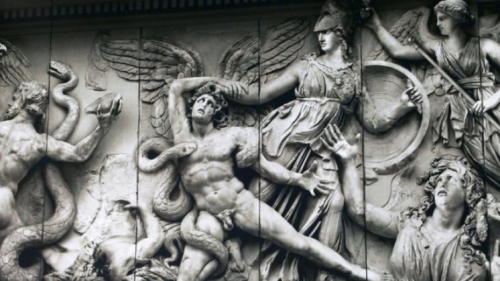
La noologie : la discipline philosophique des structures de l’esprit
Plan des cours de noologie/noomachie donnés par Alexandre Douguine
Cours # 1. Introduction.
- La noologie est la science de la multiplicité de la pensée humaine.
La base philosophique de la multipolarité.
La réflexion des cultures sur elles-mêmes et le territoire d’un possible dialogue et polylogue.
La noologie est la base essentielle de la Théorie du Monde Multipolaire et de la Quatrième Théorie Politique.
- La noologie se préoccupe de concepts à niveaux multiples qui incluent :
- la philosophie
- l’histoire des religions
- la géopolitique
- l’histoire du monde
- la sociologie
- l’anthropologie
- l’ethnosociologie
- la théorie de l’imagination
- la phénoménologie
- le structuralisme.
- Elle utilise l’analyse existentielle de Heidegger, le traditionalisme (Guénon, Evola), les concepts de Bachofen, le structuralisme de Dumézil et Lévi-Strauss.
- Le concept principal est le Noûs – mot grec pour Intellect, Intelligence, Esprit, Pensée, Conscience. Il est uni en lui-même et représente l’Humain. Le Noûs est l’Humain. La pensée est un Homme. Tout ce qui appartient exclusivement à l’être humain est la Pensée. Tout le reste, l’homme le partage avec d’autres.
- Le Noûs est triple. Il peut exister en tant que tel ; il existe à travers ses figures, ses formes, ses manifestations. La noologie nomme ces manifestations : le Logos.
- L’idée basique de la noologie est : il y a trois Logos principaux qui contiennent des variantes innombrables.
- Le Logos d’Apollon. Définition – Lumière. Verticalité. Pur patriarcat. Androcratie. Le concept de Gilbert Durand – le régime diurne. Le jour, le Ciel. Le platonisme. Le Dieu Père. La Loi. La ligne droite. Le mouvement de haut en bas.
- Le Logos de Dionysos. Définition. Clair-obscur, aube, dualité, dialectique. Terre et Ciel. Paire. Homme et femme. Androgyne. La danse. Le rythme. Le cercle. La courbe.
- Le Logos de Cybèle. La Grande Mère. Le matriarcat. La Terre et l’enfer. Ce qui est souterrain, le Tartare. Hadès. Matérialisme, croissance, progrès. Mouvement de bas en haut.
- Le principe essentiel de la noomachie : trois Logos sont en conflit insoluble, ils se combattent. Ils combattent pour la forme de Noûs qui dominera la culture.
Le combat des trois Logos est la clé pour la structure interne de la culture, de la civilisation et de l’identité de la société. Et l’explication des relations interethniques et interculturelles. La noomachie explique tout ce qui est humain, et explique comment l’humain explique ce qui n’est pas humain.
Introduction à la Noomachie. Cours # 2. Géosophie.
- La géosophie est le domaine d’application de la noologie (le principe de la noomachie) pour l’étude des cultures, des peuples et des civilisations. C’est le plus profond niveau de l’ethnosociologie.
- L’idée basique de la géosophie est qu’il y a des organisations différentes de l’équilibre des trois Logos qui définissent l’identité de la société humaine concrète. La culture apollinienne, la culture de Cybèle, etc.
- La société où le Logos domine peut changer de forme dans l’espace et dans le temps. L’équilibre de la noomachie peut changer aussi. Ici c’est Apollon qui règne, là c’est Cybèle. Ou bien c’est Dionysos qui domine, et Apollon lui fait contrepoids. Donc la noomachie est essentiellement dynamique, c’est un processus.
- Les frontières des peuples ou des cultures au moment de la noomachie dans l’espace sont définies comme horizon existentiel. C’est une structure à niveaux multiples, proche du concept de Dasein. C’est la base du peuple, ses racines. Le Logos est bâti et fondé sur l’horizon existentiel. C’est l’espace vivant. Da-sein, être-là dans le monde concret organisé à l’aide du Logos dominant. Donc c’est aussi l’espace onto-logique. Il n’y a pas d’espace universel. L’espace est existentiel et compris et étudié à travers le Logos dominant.
- Les frontières des peuples ou des cultures au moment de la noomachie dans le temps sont définies comme l’Historique (pas l’historique). Le terme français est : l’historial. C’est ainsi qu’Henry Corbin a traduit le terme heideggérien de Seynsgeschichtliche ou simplement de das Geschichtliche par opposition à das Historische. Donc l’histoire des peuples est définie par le Logos dominant. L’histoire n’est pas la conséquence de faits mais la conséquence de significations, de sens. L’histoire est une chaîne sémantique, une structure. Donc dans l’histoire – comme histoire sémantique ou sur l’histoire, l’histoire de l’être – nous pouvons retracer la manifestation du Logos dominant. Il n’y a pas de temps universel. Le temps est existentiel et compris et étudié à travers le Logos dominant.
- Le principe essentiel de la géosophie est le perspectivisme. Nous n’avons pas affaire à un espace et un temps uniques, différemment compris par des temps et des espaces différents, parce qu’ils n’ont pas d’existence en-dehors de leur interprétation dans le contexte d’une culture concrète, factuelle. Nous pensons autrement simplement parce que nous sommes sous l’influence écrasante de la culture moderne (au sens historique) et occidentale (au sens de l’horizon existentiel). Nous croyons que la compréhension occidentale moderne de la nature de l’espace et du temps est universelle. Tout homme d’un espace et d’un temps particuliers croit la même chose. C’est l’ethnocentrisme.
- La géosophie ne combat pas l’ethnocentrisme : sans lui, il n’y a pas d’humain. Etre ethnocentrique est la même chose qu’avoir le Da dans le Dasein, être-là. Le Da est défini par l’ethnos – l’éthique, la culture, le peuple, la langue. Mais la géosophie reflète la nature ethnocentrique de toute pensée. C’est donc du perspectivisme : il n’y a pas un monde unique, il y a de nombreux mondes emboîtés les uns dans les autres – autant qu’il y a de peuples. Nous ne pouvons pas être et penser sans une structure culturelle qui soit ethnocentrique. Nous devons pleinement comprendre cela.
- La géosophie en tant que perspectivisme n’est pas anti-ethnocentrique : elle est anti-raciste et anti-universaliste. Nous acceptons la pluralité de l’ethnocentrisme comme quelque chose de factuel, donné comme une condition inévitable. Mais nous devons fixer des frontières ou des limites. L’universalisme est en lui-même titanique. Il tente de dépasser les frontières d’Apollon. L’hybris est le péché essentiel des titans, il est excessif. Donc l’ethnocentrisme est légitime tant qu’il reconnaît ses limites. Quand il sort de ses frontières, il devient raciste et universaliste. Et donc il perd sa légitimité.
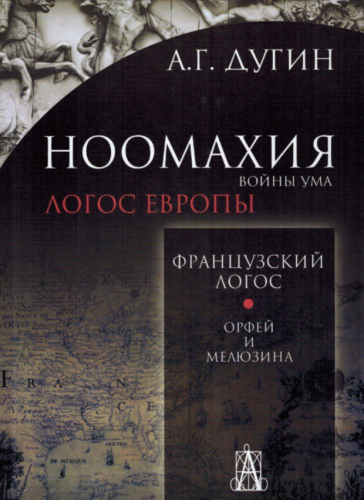
Introduction à la Noomachie. Cours # 3. Le Logos de la civilisation indo-européenne.
- L’espace existentiel et ses classes. Grands et petits espaces existentiels. Le facteur linguistique. Le langage comme maison de l’être.
- Le plus grand espace existentiel. L’espace indo-européen. Le Dasein indo-européen. Les frontières.
- Qu’est-ce que le Touran ? Iran et Touran chez Firdûsî. L’ancien nom de l’Avesta. Peuple nomade indo-européen et peuple sédentaire indo-européen.
- La mère-patrie indo-européenne. Le Berceau des Indo-Européens. Touran et Eurasie. La théorie des kourganes de Maria Gimbutas. Les trois civilisations d’Oswald Spengler : atlantique, kouchite et touranienne.
- La structure du Logos indo-européen. Le patriarcat. La théorie de George Dumézil. Les trois fonctions.
• prêtres : Apollon
• guerriers : Apollon/Dionysos
• simples éleveurs : Apollon/Dionysos – plus matériels. - L’« idéologie » indo-européenne est basée sur trois fonctions. Tous les mythes, contes, récits historiques, institutions politiques, religions et rites sont basés sur la logique trifonctionnelle.
- Pure verticalité. Le Père est transcendant. Le Fils est immanent. Il n’y a pas d’antagonisme entre eux.
- Le monde indo-européen est nomade. Mais il y a le centre qui est éternel. La mère-patrie sacrée.
- Le symbole du soleil – le cercle, la roue. La roue solaire. Le char.
- Platon – les trois mondes du Timée : paradigmes, images et khora – la matière. Les trois espèces de la « République » : Prêtres-philosophes, gardiens, auxiliaires, assistants – guerriers et producteurs. Le Phédon : l’âme a trois principes: le cheval noir (epithymia), le cheval blanc (le thumos), et le conducteur du char (kybernautos).
- La triade est présente chez tous les peuples indo-européens – Hittites, Germains, Celtes, Grecs, Thraces, Latins, Slaves, Baltes, Iraniens, Indiens, Illyriens, Arméniens, etc.
- Mais le problème est que la troisième fonction est représentée par les paysans sédentaires, les fermiers. Ils furent intégrés dans les sociétés indo-européennes il y a longtemps. Ainsi ils devinrent la troisième fonction avec les pasteurs/éleveurs.
Ici c’est la Terre elle-même qui se manifeste. Dionysos est maintenant la vigne, la grappe de raisin.
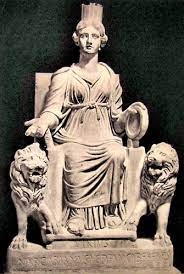
Introduction à la Noomachie. Cours # 4. Le Logos de Cybèle.
- Les guerriers indo-européens envahirent les peuples sédentaires, dont la plupart vivaient dans une société matriarcale. Maria Gimbutas. Bachofen.
- Le concept de paléo-européen. La population européenne avant l’arrivée des guerriers touraniens.
- Les principaux centres de la civilisation matriarcale étaient en Anatolie et dans les Balkans. C’était l’ancienne civilisation de Cybèle. La Déesse Mère avait différents noms, mais le même Logos. La naissance et la mort. Donc l’absence de traits sur le visage et la tête de la Déesse était le signe que cela n’avait pas d’importance. Il y avait seulement un Pouvoir de manifestation.
- La Déesse était immanente, chtonienne, terrestre. Les figures mâles étaient absentes. Mais il y avait des animaux – surtout deux, de chaque coté de la Grande Mère. Ensuite ils se transformèrent en une figure mi-bête, mi-humaine. Ils appartenaient à la Grande Mère.
- La figure d’Attis. Il y avait l’androgyne femelle Agdytis qui avait donné naissance à un beau jeune homme. Cybèle était tombée amoureuse de ce jeune. Mais il voulait épouser une femme terrestre. Cybèle jalouse lui envoya la folie. Il se castra et mourut. Cybèle le ressuscita. Il devint le prêtre de la Déesse – le sort de l’homme dans le monde de Cybèle.
- Un autre type de figure mâle dans le monde de la Grande Mère est le Titan. C’est une créature chtonienne avec des traits de serpent montant à l’assaut du Ciel. Le Dragon.
- Le matriarcat n’est pas la version féminine de la domination masculine (indo-européenne). C’est un type particulier de société basé sur l’euphémisation, l’utilisation des euphémismes. La mort est la vie, l’obscurité est la lumière, la douleur est la joie, le passif est actif. Le régime nocturne dans la sociologie de l’imagination de Gilbert Durand.
- La paysannerie. La paysannerie était basée sur le pouvoir de la Terre de créer l’épi de blé, la tige de la plante. Les premiers fermiers étaient des femmes travaillant comme auxiliaires de naissance (doula) plutôt que cultivateur. Le principal outil était la houe, pas la charrue. Aucun animal n’était utilisé, ni cheval ni bœuf.
- Donc la paysannerie correspond au matriarcat paléo-européen.
- Quand les envahisseurs indo-européens surgirent du Touran et entrèrent en Anatolie et dans les Balkans, ils rencontrèrent la Grande Mère – Chatal-Hüyuk , Lepenski Vir, Vincha. Ce fut le moment décisif de la noomachie. Le combat des dieux célestes et des déités chtoniennes.
Le résultat de la bataille fut l’apparition de la paysannerie européenne. La Mère fut détrônée et soumise. La société mixte apparut. F.G. Jünger dit que l’ordre divin est créé sur les corps des Titans vaincus. Il n’est pas créé sur le vide. Il est basé sur la nature subordonnée de la Grande Mère.
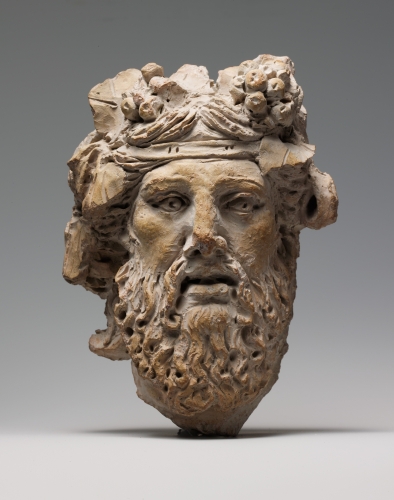
Introduction à la Noomachie. Cours # 5. Le Logos de Dionysos.
- La superposition de deux horizons existentiels crée un champ noologique de titanomachie. Le Logos d’Apollo affronte le Logos de Cybèle dans la troisième fonction – dans la culture de la paysannerie européenne.
- C’est le moment de Dionysos. Le raisin et le blé. Court-circuit. Bachofen explique Dionysos comme étant la forme de la victoire patriarcale sur la société agraire matriarcale. Le Ciel devient immanent. Dans l’histoire de Dionysos, il y a l’épisode de l’appel de Dionysos. C’est le moment où les bacchantes entendent son appel lointain et deviennent folles. C’est la folie de la présence mâle.
- Dionysos est le dieu du cycle agraire. C’est le dieu de l’intégration de Cybèle dans l’horizon existentiel indo-européen.
- Le culte de Dionysos n’a pas de traits particuliers : tous les symboles et les rites de Dionysos sont empruntés au culte de la Grande Mère. On les appelle les rites pré-dionysiaques. K. Kerenyi et Vyach. Ivanov consacrèrent d’importantes études à cet aspect. Le pré-dionysiaque est cybélien. Dans le culte de Dionysos, il y a une interprétation patriarcale du culte matriarcal.
- Dans les mystères d’Eleusis, Dionysos est la figure principale avec Déméter. La vigne et le pain, venant du blé. C’est le culte agrarien transformé, par la présence de Dionysos, en culture paysanne mâle.
- La figure de Déméter n’est pas la même que Cybèle. Déméter est la Mère domestiquée, intégrée dans le patriarcat, dans la hiérarchie des trois fonctions. Il y a la Mère souterraine (Cybèle) et la Mère en surface – le sol cultivé soumis au Père céleste. Dionysos est la semence.
- Dans le contexte néoplatonicien, Dionysos est l’esprit détourné par les titans et présent chez les hommes en tant qu’étincelle de la conscience. Le but est de restaurer l’intégrité de Dionysos.
- Un Dionysos transcendantal dans l’hénologie de Plotin ?
- Le double de Dionysos. La figure de Dionysos dans la perspective de Cybèle est son double obscur. Cybèle voit la figure de Dionysos comme Attis, comme Adonis. C’est un simulacre matériel et chtonien de Dionysos.
- Le niveau de Dionysos est l’espace où la noomachie atteint son moment le plus intense. Ici le Logos d’Apollon touche le Logos de Cybèle. C’est un monde intermédiaire, l’imaginaire.
Dans la structure des sociétés sédentaires indo-européennes – si mélangées ! –, la zone de Dionysos devient le lieu essentiel pour la décision métaphysique. Dionysos est le Dasein à l’état pur.
www.geopolitica.ru
Geopolitica.ru est une plateforme pour une surveillance continue de la situation géopolitique dans le monde, basée sur l’application des méthodes de la géopolitique classique et postclassique. Le portail suit la ligne de l’approche eurasienne. Le groupe analytique coopère étroitement avec le Mouvement Eurasien International, ainsi qu’avec le Centre d’Expertises Géopolitiques, le Centre d’Etudes Conservatrices et certains anciens membres du think-tank Katehon.
10:53 Publié dans Nouvelle Droite | Lien permanent | Commentaires (0) | Tags : nouvelle droite, nouvelle droite russe, alexandre douguine, noologie, noomachie |  |
|  del.icio.us |
del.icio.us |  |
|  Digg |
Digg | ![]() Facebook
Facebook
mercredi, 12 janvier 2022
Alexandre Douguine: textes sur les événements du Kazakhstan
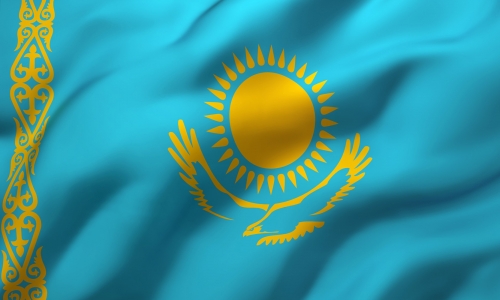
Alexandre Douguine: textes sur les événements du Kazakhstan
Tout ce qui se passe au Kazakhstan est le prix à payer pour s'être éloigné de Moscou
Alexandre Douguine
Source: https://www.geopolitica.ru/article/aleksandr-dugin-vsyo-proishodyashchee-v-kazahstane-cena-za-otdalenie-ot-moskvy
Les autorités kazakhes sont en partie responsables de la crise et de la tentative de coup d'État du début de l'année 2022. La Russie doit fournir à la république toute l'aide possible mais non pas gratuitement et seulement sous certaines conditions, déclare le politologue, leader du Mouvement international eurasien et philosophe Alexandre Douguine. Dans une interview accordée à Tsargrad, Douguine ne se contente pas de nommer la voie de sortie de la crise et les raisons de celle-ci mais répond également à la question de savoir ce que la Russie doit faire dans cette situation.
Une tentative de s'asseoir sur trois chaises
Tsargrad : Alexandre G. Douguine, quelles sont, selon vous, les principales raisons des troubles, des tentatives de prise de pouvoir et des actes de terrorisme au Kazakhstan ?
Alexandre Douguine: Il est nécessaire de comprendre que la politique internationale du Kazakhstan ces dernières années était basée sur une relation trilatérale - avec la Chine, avec la Russie et avec l'Occident. Et tant Nazarbayev, qui est l'architecte de cette politique, que Tokayev, qui est le successeur de Nazarbayev, ont estimé que cette "triple orientation" ne laisserait aucune de ces puissances mondiales devenir hégémonique et prédéterminer complètement la politique du Kazakhstan de l'extérieur.
Si les Américains exercent trop de pression, le Kazakhstan a recours à Moscou et, sur le plan économique, à la Chine. Quand la Russie a trop avancé ses pions - au contraire, l'anglais a été enseigné dans les écoles et l'économie chinoise a pénétré le pays de plus en plus profondément. Lorsque la Chine a commencé à parler de ses prétentions à prendre le contrôle de cette puissance plutôt faible économiquement, les facteurs américains sont revenus sur le tapis.
Il s'agissait d'une politique multisectorielle. C'était assez efficace à l'époque. Mais elle était différente de l'initiative eurasienne, que Nursultan Nazarbayev avait lui-même formulée dans les années 1990. En fait, l'équilibre entre multipolarité et unipolarité, entre l'Occident, la Chine et la Russie, s'est avéré très fragile du point de vue politique.
Couleur ou noir et blanc ?
- On entend beaucoup dire maintenant que la tentative de coup d'État a été largement inspirée de l'extérieur, que nous sommes confrontés à une nouvelle "révolution orange", que c'est simplement le tour du Kazakhstan. Pensez-vous que c'est vrai ?
- La politique tripartite du Kazakhstan a eu des résultats négatifs. Mais le plus important est que cette politique est allée à l'encontre de la déclaration d'unification de l'espace eurasien - principalement avec la Russie et avec les autres pays de l'EurAsEC et de l'OTSC. Nazarbayev et son successeur Tokayev ont ralenti de nombreux processus d'intégration. Bien que l'eurasisme ait été formellement déclaré comme l'objectif à poursuivre.
La rupture de l'intégration a rendu les relations avec Moscou problématiques. Environ le même modèle a été utilisé par Minsk. Et tout comme Lukashenko a obtenu ainsi sa révolution de couleur, maintenant le Kazakhstan, Tokayev et Nazarbayev ont obtenu leur propre révolution de couleur! Cela a été rendu possible parce que l'Occident a été autorisé à pénétrer trop profondément au Kazakhstan. Et bien sûr, il a fait son travail habituel.
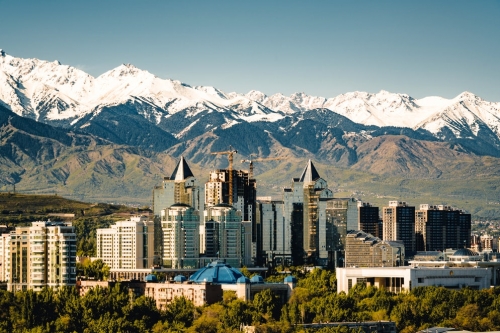
Il est certain que ce à quoi nous avons affaire au Kazakhstan est une révolution de couleur. Du point de vue géopolitique, il s'agit d'une extension du front occidental contre la Russie. L'Occident, comme il le dit lui-même, a peur de l'invasion de l'Ukraine par la Russie et de la renaissance de la Novorossia, le "printemps russe". Pour déjouer l'attention et disperser la volonté de la Russie, des attaques sont lancées le long du périmètre - non seulement en Ukraine, mais aussi au Belarus et en Géorgie.
Et maintenant, un autre front de l'Atlantisme s'ouvre contre l'Eurasisme, au Kazakhstan. Bien sûr, cette opération est dirigée contre la Russie. Les manifestants ont déjà avancé les thèses évooquant la nécessité pour le Kazakhstan de quitter l'Union économique eurasienne. C'est une révolution de couleur typique, parrainée par l'Occident à des fins géopolitiques, comme toutes les autres.
Tsargrad est prévenu ! Petit rappel: Alexei Toporov, en 2018, disait que "Nazarbayev finirait comme Ianoukovitch et Chevardnadze".
Les problèmes internes du Kazakhstan
- Au Kazakhstan, les gens considèrent que la crise est due à des problèmes internes de la république. Nous comprenons qu'ils sont là, mais lesquels, à votre avis, ont eu un impact significatif ?
- Les problèmes intérieurs sont le troisième facteur après la politique étrangère et l'ingérence occidentale. Ensuite, il y a certainement un conflit qui se forme au Kazakhstan entre Tokayev et Nazarbayev. Nazarbayev veut - il serait plus correct de dire qu'il voulait - contrôler toute la politique, tandis que Tokayev se sent progressivement plus indépendant. Il n'est donc pas exclu que le président kazakh lui-même soit derrière ces protestations.
Les premiers jours, nous avons assisté à une étrange réaction : le renvoi du gouvernement, l'ouverture de négociations avec les manifestants. Seul un dirigeant qui a un certain intérêt à ce que l'effondrement et la crise se poursuivent peut le faire. Peut-être que sur cette vague, Tokayev lui-même cherche à se débarrasser de Nazarbayev, celui qui l'a porté au pouvoir.
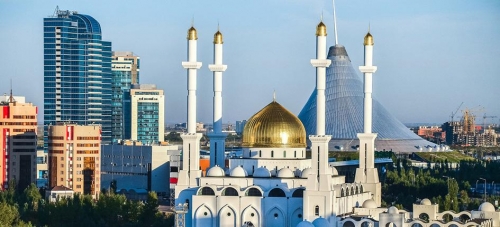
Le quatrième facteur est la situation sociale et économique problématique du Kazakhstan. L'absence de politique sociale, le caractère fermé des élites, l'absence d'une idée nationale et la transformation de l'eurasisme déclaré en un simulacre d'idéologie - tout cela a conduit à une société plutôt corrompue au Kazakhstan, où l'élite est intégrée à l'Occident et garde son argent dans des sociétés offshore.
La situation au Kazakhstan est typique
- Dans une certaine mesure, ces problèmes ont touché toutes les républiques post-soviétiques ?
- Bien sûr, ces régimes post-soviétiques ont cependant épuisé leur potentiel. Tôt ou tard, ils devront être remplacés par quelque chose. L'Occident veut qu'ils soient remplacés par un processus de désintégration et de démocratie libérale contrôlé par lui.
Tous les États de l'espace post-soviétique ont enfait moins d'une semaine d'existence. Ils ont vécu au sein d'un système unique au cours des derniers siècles - l'Empire russe, puis l'Union soviétique. Et maintenant, ils sont subitement devenus de nouvelles formations politiques.
Pratiquement aucun de ces États n'a jamais existé dans ses frontières actuelles. Ce sont des frontières conditionnelles, des frontières administratives. Par conséquent, pour s'établir en tant qu'État, il doit d'abord établir une relation avec Moscou, le principal facteur de stabilité et de prospérité.
En fait, au Kazakhstan ou dans toute autre république post-soviétique, il est tout à fait possible de créer un système efficace, orienté vers le peuple, avec une idée nationale et une idéologie multipolaire. D'autant plus que l'eurasisme est très populaire au Kazakhstan. Ils ont très bien commencé, de manière très convaincante. Et il n'y a pas eu de gros problèmes avec la population russe, et les relations avec Moscou sont restées bonnes. À un moment donné, il semblait que le Kazakhstan était l'antithèse de l'espace post-soviétique : si l'un des Etats post-soviétiques avait du succès, c'était le Kazakhstan. Mais il s'est avéré que la simple incohérence d'un eurasisme de pure déclaration émis par Nazarbayev a joué un tour cruel au Kazakhstan.
Plus loin de Moscou, plus près des problèmes
- Pour quelle raison la situation au Kazakhstan a-t-elle radicalement changé ?
- À un moment donné, les autorités kazakhes ont considéré Moscou comme un partenaire secondaire, même si elles ont continué à utiliser certains modèles économiques. Au lieu de promouvoir l'intégration, ils l'ont parfois sabotée. Si, dans un premier temps, Nazarbayev a été le créateur de ce modèle eurasien, construit sur les principes de l'Union européenne, et a été à l'avant-garde des processus d'intégration, il s'est progressivement retiré de ce rôle.
Ainsi, au lieu d'une intégration eurasienne efficace et d'un rapprochement avec Moscou, on a assisté à des processus de corruption de plus en plus nationaux et paroissiaux.
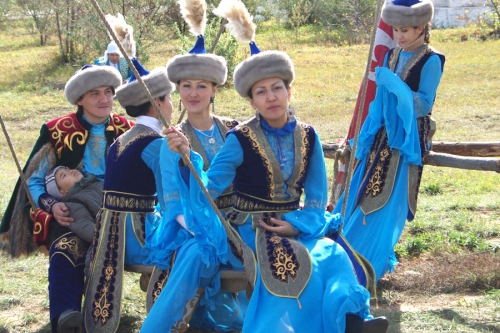
Je connais Nazarbayev personnellement. J'ai écrit un livre sur lui, j'ai une très bonne relation avec lui. Et jusqu'à un certain point, Nazarbayev avait une compréhension brillante de l'eurasisme. Il a construit sa politique exactement sur ce principe : si nous sommes d'accord avec Moscou, nous vivrons heureux pour toujours, tout ira bien. Si nous suivons l'intégration eurasienne, tout ira bien. Nazarbayev a écrit un article merveilleux et brillant sur la multipolarité monétaire. Nous défendons les grands espaces, nous défendons l'identité grande-eurasienne, une civilisation indépendante: dans ce cas, le Kazakhstan prospérera.
Mais dès qu'ils s'en éloignent, dès que les petites élites commencent à se battre entre elles pour certains aspects de l'économie, dès que l'argent est retiré du pays pour disparaître dans des zones offshore, alors les fonds occidentaux et les valeurs occidentales commencent à pénétrer dans le pays, et la langue anglaise commence à remplacer le russe. Une telle orientation ne relève pas du tout de l'eurasisme. Et vous en récolterez les fruits dans ce cas.
La Russie doit aider, mais pas sans raison
- Il s'avère que le Kazakhstan, à un moment donné, s'est apparemment détourné de la Russie. Que doit donc faire Moscou maintenant pour rétablir la stabilité et ne pas permettre une répétition de la situation actuelle ?
- Je pense que la Russie devrait aider le Kazakhstan à maintenir l'ordre. Nous devons contribuer à préserver l'intégrité territoriale du Kazakhstan, nous devons soutenir les dirigeants actuels, mais pas pour rien. Nous devons poser une condition très stricte : si nous vous aidons, alors vous devez en finir avec l'orientation à trois vecteurs, vous suivez strictement votre idée eurasienne - et nous nous intégrerons pour de bon. Alors nous vous aiderons.
Nous ne devons pas oublier que la Russie est le garant de l'intégrité territoriale de tous les États post-soviétiques. Cela a été prouvé à de nombreuses reprises. Si la Russie ne remplit pas cette fonction, si elle n'est pas appelée à préserver son intégrité territoriale, alors cette intégrité territoriale est attaquée. Nous le voyons en Moldavie, en Géorgie, en Ukraine, en Azerbaïdjan.
Ceux qui ignorent la Russie en tant que principal gardien de l'intégrité territoriale du pays, gardien qui a le plus de principes, en paient le prix.
- La Russie doit donc agir, mais sans les bonnes politiques du Kazakhstan, ce ne sera pas possible ?
- Oui. Si les dirigeants kazakhs ne peuvent garantir la poursuite du processus d'intégration et d'allégeance à la ligne eurasienne, la situation s'aggravera. Le sort de l'intégrité territoriale du Kazakhstan sera remis en question.
Bien sûr, la Russie n'est pas derrière tout cela. La Russie est précisément la victime de cette agression. Mais je pense que la Russie a déjà épuisé la limite historique pour tolérer toutes ces hésitations à la Ianoukovitch. La politique de Loukachenko a fini par hésiter elle aussi, mais la Russie ne le tolère tout simplement plus.
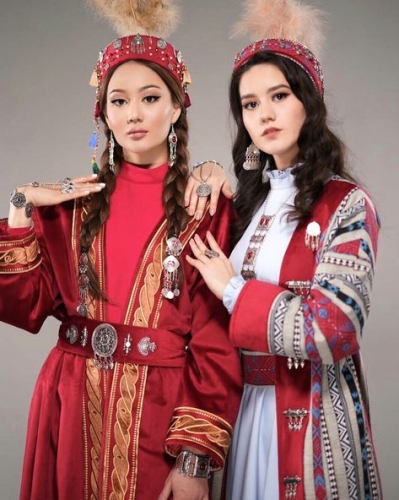
Si vous êtes nos amis, vous n'êtes pas seulement nos amis, mais aussi les ennemis de nos ennemis. C'est ce qu'on appelle une alliance eurasienne. Et si c'est le cas, ayez la courtoisie d'agir en conséquence dans le cadre des traités et dans la sphère internationale.
Si vous êtes membres de l'OTSC, alors les Américains devraient sortir du Kazakhstan. Pas un seul Américain, pas un seul représentant de l'OTAN, de l'UE. Si c'est le cas, nous vous aiderons dans toute situation difficile - non seulement sur le plan militaire, mais aussi sur le plan économique, politique et social. Mais si vous cherchez un endroit où vous serez mieux payé ou où vous ferez de meilleures affaires, je suis désolé. Cela ne s'appelle ni un partenaire, ni un ami, ni un frère - cela porte un autre nom.
Il est temps d'abandonner le mot "économique" de l'Union économique eurasienne. D'ailleurs, les mêmes Kazakhs ont déjà insisté sur ce point antérieurement. Nous devrions simplement parler de l'Union eurasienne comme d'un nouvel État confédéral. L'intégration eurasienne elle-même est mise à l'épreuve dans la situation du Kazakhstan. Oui, nous devons certainement soutenir le Kazakhstan. Mais pas pour rien.
https://tsargrad.tv/articles/aleksandr-dugin-vsjo-proishodjashhee-v-kazahstane-cena-za-otdalenie-ot-moskvy_474087
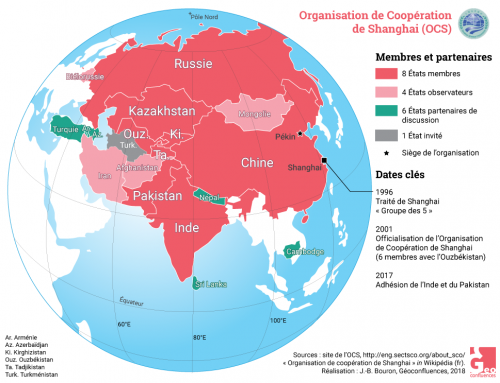
Reconquista eurasienne
Alexandre Douguine
Ex: https://www.geopolitica.ru/article/evraziyskaya-rekonkista
Les troubles au Kazakhstan ont mis en exergue le problème de l'espace post-soviétique à l'attention de tous. Il est clair qu'il doit être traité de manière globale. L'escalade des relations avec l'Occident au sujet de l'Ukraine et de la prétendue "invasion russe", ainsi que les "lignes rouges" définies par Poutine, font partie de ce contexte géopolitique.
Que voulait dire Poutine par ces "lignes rouges"? Il ne s'agit pas simplement d'un avertissement selon lequel toute tentative d'étendre la zone d'influence de l'OTAN vers l'est, c'est-à-dire sur le territoire post-soviétique (ou post-impérial, ce qui revient au même), entraînera une réponse militaire de Moscou. Il s'agit d'un refus de reconnaître le statu quo stratégique établi après l'effondrement de l'URSS, ainsi que d'une remise en question de la légitimité de l'adhésion des États baltes à l'OTAN et, par conséquent, de l'ensemble de la politique américaine dans cette zone. M. Poutine est clair : "Lorsque nous étions faibles, vous en avez profité et vous nous avez pris ce qui, historiquement, nous appartenait logiquement et à nous seuls ; maintenant, nous nous sommes remis de la folie libérale et des tendances atlantistes traîtresses des années 1980 et 1990 au sein même de la Russie et nous sommes prêts à entamer un dialogue à part entière en position de force. Il ne s'agit pas d'une simple revendication. La thèse est confirmée par des étapes réelles - Géorgie 2008, Crimée et Donbass 2014, la campagne de Syrie. Nous avons rétabli notre position dans certains endroits, et l'Occident ne nous a rien fait - nous avons fait face aux sanctions. Ni les menaces de provoquer une révolte des oligarques contre Poutine ni celles de déclencher une révolution de couleur au nom des libéraux de la rue (la 5ème colonne) n'ont fonctionné. Nous avons consolidé nos succès de manière sûre et inébranlable.
La Russie est maintenant prête à poursuivre la Reconquista eurasienne, c'est-à-dire à éliminer définitivement les réseaux pro-américains de toute notre zone d'influence.
Dans l'ensemble de la géopolitique, l'aspect juridique de la question est secondaire. Les accords et les normes juridiques ne font que légitimer le statu quo qui émerge au niveau du pouvoir. Les perdants n'ont pas leur mot à dire, "malheur à eux". Les gagnants, par contre, ont ce droit. Et ils l'utilisent toujours activement. Que le pouvoir qui s'impose aujourd'hui, sera le pouvoir juste demain. C'est ça le réalisme.
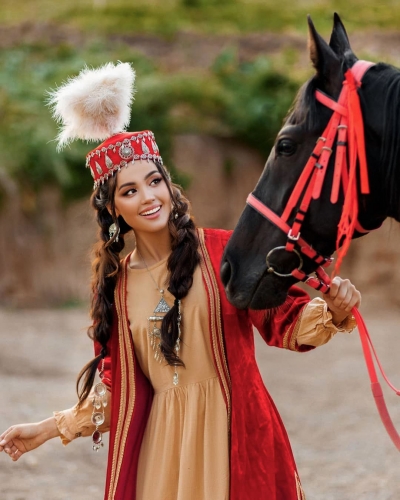
Sous la direction de M. Poutine, la Russie est passée d'un statut de looser en politique internationale à celui d'un des trois pôles complets du monde multipolaire. Et Poutine a décidé que le moment était venu de consolider cette position. Être un pôle signifie contrôler une vaste zone qui se situe parfois bien au-delà de ses propres frontières nationales. C'est pourquoi les bases militaires américaines sont dispersées dans le monde entier. Et Washington et Bruxelles sont prêts à défendre et à renforcer cette présence. Non pas parce qu'ils en ont le "droit", mais parce qu'ils le veulent et le peuvent. Et puis la Russie de Poutine apparaît sur leur chemin et leur dit : stop, il n'y a pas d'autre chemin ; de plus, vous êtes priés de réduire votre activité dans notre zone d'intérêt dès que possible. Toute puissance faible, pour avoir fait de telles déclarations, aurait été détruite. Poutine a donc attendu avec eux pendant 21 ans jusqu'à ce que la Russie retrouve sa puissance géopolitique. Nous ne sommes plus faibles. Vous ne le croyez pas ? Essayez de vérifier.
Tout ceci explique la situation autour du Belarus, de l'Ukraine, de la Géorgie, de la Moldavie et maintenant du Kazakhstan. En fait, le moment est venu pour Moscou de déclarer le changement de nom de la CEI en Union eurasienne (non seulement économique, mais réelle, géopolitique), comprenant toutes les unités politiques de l'espace post-soviétique. Les russophobes les plus obstinés peuvent être laissés dans un statut neutre - mais toute la zone post-soviétique devrait être nettoyée de la présence américaine. Elle devrait être éliminée non seulement sous la forme de bases militaires, mais aussi dans le cadre d'éventuelles opérations de changement de régime, dont la version la plus courante sont les "révolutions de couleur" - comme le Maïdan de 2013-2014 en Ukraine, les manifestations de 2020 en Biélorussie et les derniers développements au Kazakhstan au tout début de 2022.
L'Occident s'insurge contre notre soutien à Loukachenko, contre la prétendue "invasion" de l'Ukraine et, maintenant, contre l'envoi de troupes de l'OTSC au Kazakhstan pour réprimer les insurrections terroristes, islamistes, nationalistes et gulénistes, que, comme on pouvait s'y attendre, l'Occident soutient - comme il soutient ses autres mandataires - de Zelensky et Maia Sandu à Saakashvili, Tikhanovskaya et Ablyazov. En d'autres termes, les États-Unis et l'OTAN se soucient de ce qui se passe dans l'espace post-soviétique, et ils fournissent toutes sortes de soutien à leurs clients. Et Moscou, pour une raison quelconque, selon leur logique, ne devrait pas s'en soucier. C'est vrai, si Moscou n'était qu'un objet de la géopolitique et gouverné de l'extérieur, comme c'était le cas dans les années 90 sous la domination pure et simple de la 5ème colonne atlantiste dans le pays, plutôt qu'un sujet comme aujourd'hui, alors ce serait le cas. Mais le moment décisif est venu de consolider ce statut de sujet. C'est maintenant ou jamais.
Qu'est-ce que cela signifie ?
Cela signifie que Moscou met fin à l'interminable processus d'intégration eurasienne par un accord d'action plus décisif. Si Washington n'accepte pas de garantir le statut de neutralité de l'Ukraine, alors - pour citer Poutine - elle devra répondre militairement et techniquement. Si vous ne voulez pas une bonne réponse, ce n'est pas comme ça que ça marche. D'autres scénarios vont de la libération complète de l'Ukraine de l'occupation américaine et du régime libéral-nazi corrompu et illégitime, à la création de deux entités politiques à sa place - à l'Est (Novorossia) et à l'Ouest (sans la Podkarpattya ruthène). Mais en aucun cas moins. Et aucune reconnaissance de la DPR et de la LPR, bien sûr, ne sera suffisante. La "finlandisation" de l'Ukraine, dont notre sixième colonne a souvent parlé ces derniers temps, ne sera pas non plus achevée tant qu'il n'y aura pas un argument vraiment fort - c'est-à-dire une nouvelle entité non indépendante - sur ce territoire, toute la rive gauche, ainsi qu'Odessa et les provinces adjacentes.
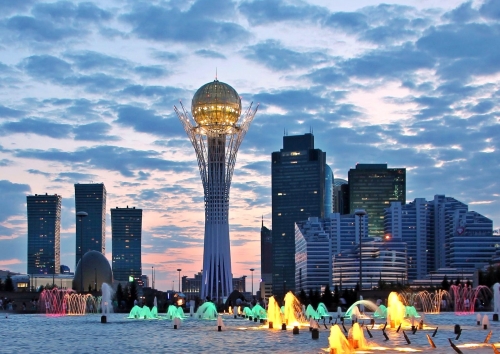
Oui, la décision est impopulaire, mais historiquement inévitable. Lorsque la Russie est dans une spirale ascendante (et c'est là qu'elle se trouve actuellement), les régions occidentales sont inévitablement - tôt ou tard - libérées de la présence atlantiste - polonaise, suédoise, autrichienne ou américaine. C'est une loi géopolitique.
Un tel exemple serait une grande leçon pour la Géorgie et la Moldavie : soit vous neutralisez, soit nous venons à vous. Et c'est tout. L'exemple des pays voisins permet de voir comment nous y parvenons. Et il vaut mieux ne pas tenter le sort - la Géorgie est passée par là sous Saakashvili. La tentative d'Erevan de flirter avec l'Occident s'est soldée par le feu vert donné par Moscou à Bakou pour restaurer son intégrité territoriale. Et puis nous avons la Transnistrie. Les signes sont partout. Et c'est seulement à Moscou de déterminer dans quel état ils se trouvent. Aujourd'hui, Poutine perd patience face aux provocations continues de l'Occident. Il est possible de décongeler un produit congelé. Et ce ne sera pas un petit prix à payer.
Maintenant le Kazakhstan. Nazarbayev a bien commencé - mieux que les autres, et même mieux que la Russie elle-même, qui était aux mains de l'agence atlantiste dans les années 90. C'est lui qui a avancé l'idée de l'Union eurasienne, de l'ordre mondial multipolaire, de l'intégration eurasienne, et qui a même rédigé la Constitution de l'Union eurasienne. Hélas, ces dernières années, il s'est éloigné de sa propre idée. Nazarbayev m'a un jour promis personnellement lors d'une conversation qu'après sa retraite, il dirigerait le Mouvement eurasien, car c'était son destin. Mais au cours des dernières années de son gouvernement, pour une raison quelconque, il s'est tourné vers l'Occident et a soutenu la nationalisation des élites kazakhes. Les agents de l'Atlantisme n'ont pas manqué d'en profiter et, par l'intermédiaire de leurs mandataires - islamistes, gulénistes et nationalistes kazakhs, ainsi qu'en utilisant l'élite libérale kazakhe cosmopolite - ont commencé à préparer un "plan B" pour renverser Nazarbayev lui-même et son successeur Kassym-Jomart Tokayev. Le plan a été lancé début 2022, juste avant les entretiens fatidiques de Poutine avec Biden, dont dépendra le sort de la guerre et de la paix.
Dans une telle situation, Moscou devrait apporter à Tokayev son soutien militaire total. Mais les demi-mesures du Kazakhstan en matière de politique d'intégration - Glazyev montre en détail et objectivement comment elle est sabotée au niveau des mesures concrètes par nos partenaires de l'UEE - ne sont plus acceptables. Tout comme l'hésitation de Lukashenko. Les Russes (OTSC) font, volens nolens, partie du Kazakhstan et y resteront. Jusqu'à ce que les terroristes soient éliminés, et en même temps, jusqu'à ce que tous les obstacles à une intégration complète et véritable soient levés. Et que l'Ouest fasse autant de bruit qu'il le veut ! Ce n'est pas son affaire : nos alliés nous ont invités à sauver le pays. Mais toutes les fondations et structures occidentales, ainsi que les cellules des organisations terroristes (tant libérales qu'islamistes et gulénistes) au Kazakhstan doivent être abolies et écrasées.
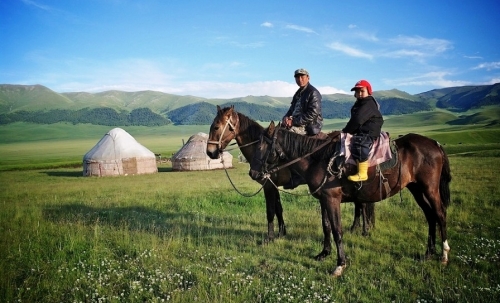
Lorsque la guerre nous est déclarée et qu'il n'y a aucun moyen de l'éviter, nous n'avons plus qu'à la gagner. Par conséquent, l'UEE ou, pour être plus précis, une Union eurasienne à part entière doit devenir une réalité. Minsk et la capitale du Kazakhstan, quel que soit son nom, ainsi qu'Erevan et Bichkek, doivent prendre conscience qu'elles font désormais partie d'un seul et même "grand espace". Il s'agit des amis et des problèmes qu'ils rencontrent sous l'influence de l'atlantisme, qui tente par tous les moyens possibles de saboter et de démolir les régimes existants - bien que relativement pro-russes. Ces problèmes prendront fin au moment où l'intégration deviendra réelle.
Dans ce cas, c'est le côté militaire qui s'avère être le plus efficace en la matière. Les Russes ne sont pas forts en négociations, mais ils se montrent meilleurs dans une guerre de libération juste - défensive, en fait, qui leur est imposée.
Ensuite, nous en arrivons logiquement aux États baltes. Leur présence au sein de l'OTAN, compte tenu du nouveau statut de la Russie en tant que pôle du monde tripolaire, est une anomalie. Il faut également leur proposer un choix : neutralisation ou... Laissez-les découvrir par eux-mêmes ce qui se passera s'ils ne choisissent pas volontairement la neutralisation.
Enfin, l'Europe de l'Est. La participation de ses pays à l'OTAN est également un gros problème pour la Grande Russie. Nombre de ces pays sont profondément liés à nous : certains par le slavisme, d'autres par l'orthodoxie, d'autres encore par leurs origines eurasiennes. En un mot, ce sont nos peuples frères. Et voici l'OTAN... Ce n'est pas une bonne chose. Il serait préférable qu'ils soient un pont amical entre nous et l'Europe occidentale. Et il n'y aurait pas besoin de Nord Stream 2. Notre peuple sera toujours d'accord avec son propre peuple. Mais non. Aujourd'hui, ils jouent le rôle d'un "cordon sanitaire" - un outil classique de la géopolitique anglo-saxonne, conçu pour séparer l'Europe centrale et l'Eurasie russe. De temps en temps, les vrais pôles déchirent ce cordon. Aujourd'hui, elle est temporairement revenue aux Anglo-Saxons. Mais si la montée en puissance de la Russie, comme sujet géopolitique, se poursuit, ce ne sera pas pour longtemps.
Cependant, les pays baltes et l'Europe de l'Est sont l'agenda géopolitique de demain. Aujourd'hui, le destin de l'espace post-soviétique - post-impérial - est en jeu. Notre maison commune eurasienne. La première tâche consiste à y mettre de l'ordre.
12:18 Publié dans Actualité, Eurasisme, Géopolitique | Lien permanent | Commentaires (0) | Tags : alexandre douguine, actualité, géopolitique, politique internationale, kazakhstan, asie centrale, eurasie, eurasisme, russie, asie, affaires asiatiques |  |
|  del.icio.us |
del.icio.us |  |
|  Digg |
Digg | ![]() Facebook
Facebook
samedi, 08 janvier 2022
Recension: Alexandre Douguine, Contre le Great Reset, le Manifeste du Grand Réveil
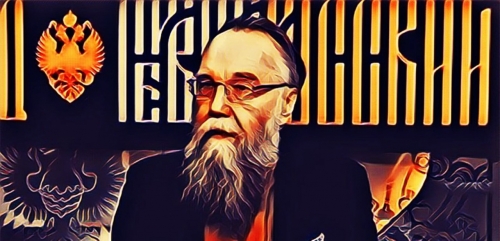
Recension: Alexandre Douguine, Contre le Great Reset, le Manifeste du Grand Réveil
Alexandre Douguine, Contre le Great Reset, le Manifeste du Grand Réveil, Ars Magna, 2021, pp. 70, € 15,00
par Claudio Mutti
En réponse au projet de ce qu'on appelle le Great Reset, projet présenté en mai 2020 par le prince Charles d'Angleterre et le directeur du Forum économique mondial, Klaus Schwab, Alexandre Douguine avance la "thèse du Grand Réveil" (p. 37). L'usage anglais de ce terme, Great Awakening, n'est nullement accidentel: il désigne les différents mouvements de renouveau qui ont eu lieu aux 18e et 19e siècles dans le monde protestant et est actuellement en grande circulation dans les milieux trumpistes, tant protestants que catholiques. ("Que peuvent faire concrètement les Fils de Lumière du Grand Réveil?" a demandé l'archevêque pro-Trump Carlo Maria Viganò à l'agitateur bien connu Steve Bannon).
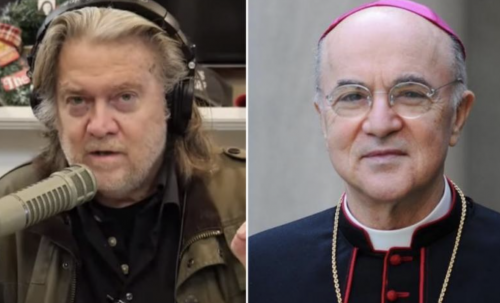
En fait, le Grand Réveil, explique Douguine lui-même, "vient des États-Unis, de cette civilisation dans laquelle le crépuscule du libéralisme est plus intense qu'ailleurs" (p. 47); et l'intensité de ce crépuscule serait démontrée, selon Douguine, précisément par le phénomène représenté par Donald Trump, "un centre d'attraction pour tous ceux qui étaient conscients du danger venant des élites mondialistes" (p. 37). De plus, poursuit Douguine, "un rôle important dans ce processus a été joué par l'intellectuel américain d'orientation conservatrice Steve Bannon" (p. 37), qui, selon Douguine, a été "inspiré par d'éminents auteurs antimodernes tels que Julius Evola, de sorte que son opposition au mondialisme et au libéralisme avait des racines assez profondes" (p. 37). (Sur la prétendue inspiration évolienne de l'agit-prop américain, voir AA. VV., Deception Bannon, CinabroEdizioni, 2019, passim).
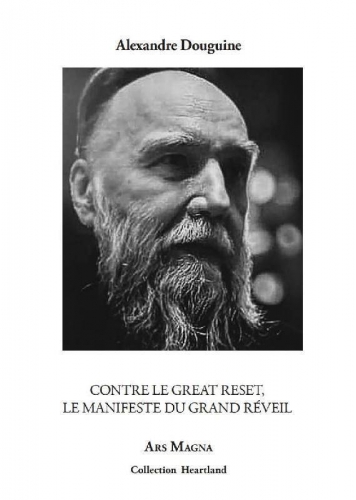
Selon la conception géopolitique qui caractérisait la pensée d'Alexandre Douguine avant que Donald Trump ne devienne président des États-Unis, si l'Eurasie se trouve exposée à l'agression continue de l'expansionnisme américain, cela est dû au fait que la puissance américaine est poussée vers la conquête du pouvoir mondial par sa propre nature thalassocratique (et non simplement par l'orientation idéologique d'une partie de sa classe politique). Puis, adoptant un critère conditionné davantage par des abstractions idéologiques que par le réalisme géopolitique, Douguine a indiqué que l'"ennemi principal" n'était plus les États-Unis d'Amérique, mais le globalisme libéral ; c'est ainsi qu'il a accueilli avec enthousiasme la relève de la garde à la présidence américaine, archivant en même temps ses plus de vingt ans d'anti-américanisme. "Pour moi, déclarait Douguine en novembre 2016, il est évident que la victoire de Trump a marqué l'effondrement du paradigme politique mondialiste et, simultanément, le début d'un nouveau cycle historique (...). À l'ère de Trump, l'antiaméricanisme est synonyme de mondialisation (...) l'antiaméricanisme dans le contexte politique actuel devient une partie intégrante de la rhétorique de l'élite libérale elle-même, pour qui l'arrivée de Trump au pouvoir a été un véritable coup dur". Pour les adversaires de Trump, le 20 janvier [2017] était la 'fin de l'histoire', alors que pour nous, il représente une porte vers de nouvelles opportunités et options".
Cette position n'a cessé d'être soutenue et développée par Douguine tout au long de la présidence de Donald Trump ; et si ce dernier (à qui Douguine a souhaité "Quatre années de plus" le jour même de l'assassinat du général Soleimani) a dû renoncer à une répétition du mandat présidentiel, "le trumpisme est bien plus important que Trump lui-même, c'est à Trump que revient le mérite de lancer le processus". Maintenant, nous devons aller plus loin (Now we need to go further)". C'est ce que l'on peut lire dans un article de Douguine du 9 janvier 2021 intitulé Great Awakening : the future starts now (www.geopolitica.ru), dans lequel l'auteur répète : "Notre combat n'est plus contre l'Amérique".
Le présent Manifeste du Grand Réveil constitue donc une reconfirmation de la position de Douguine, inaugurée avec le tournant pro-Trumpiste d'il y a cinq ans. On y répète en effet la thèse selon laquelle ce ne sont pas les États-Unis qui représentent l'ennemi fondamental de l'Eurasie: "Ce n'est pas l'Occident contre l'Orient, ni les États-Unis et l'OTAN contre tous les autres, mais ce sont les libéraux contre l'humanité - y compris cette partie de l'humanité qui se trouve sur le territoire même de l'Occident" (p. 40). Dans l'affrontement idéologique esquissé par Douguine, le présage le plus favorable est vu dans le fait que le Grand Réveil a été annoncé sur le sol américain: "Le fait qu'il ait un nom, et que ce nom soit apparu à l'épicentre même des transformations idéologiques et historiques aux États-Unis, dans le contexte de la défaite dramatique de Trump, de la prise désespérée du Capitole et de la vague croissante de répression libérale, (...) est d'une grande (peut-être cruciale) importance. (p. 49).
12:50 Publié dans Actualité, Eurasisme, Livre, Livre, Nouvelle Droite | Lien permanent | Commentaires (0) | Tags : actualité, politique internationale, livre, alexandre douguine, claudio mutti, eurasisme, nouvelle droite, nouvelle droite russe |  |
|  del.icio.us |
del.icio.us |  |
|  Digg |
Digg | ![]() Facebook
Facebook


